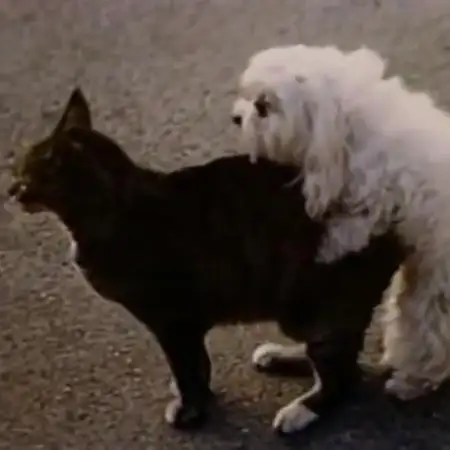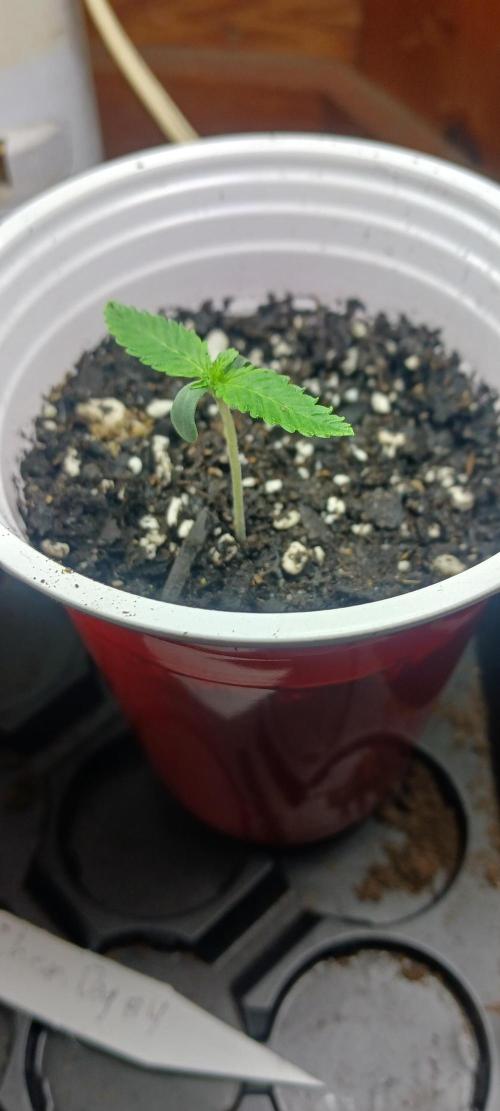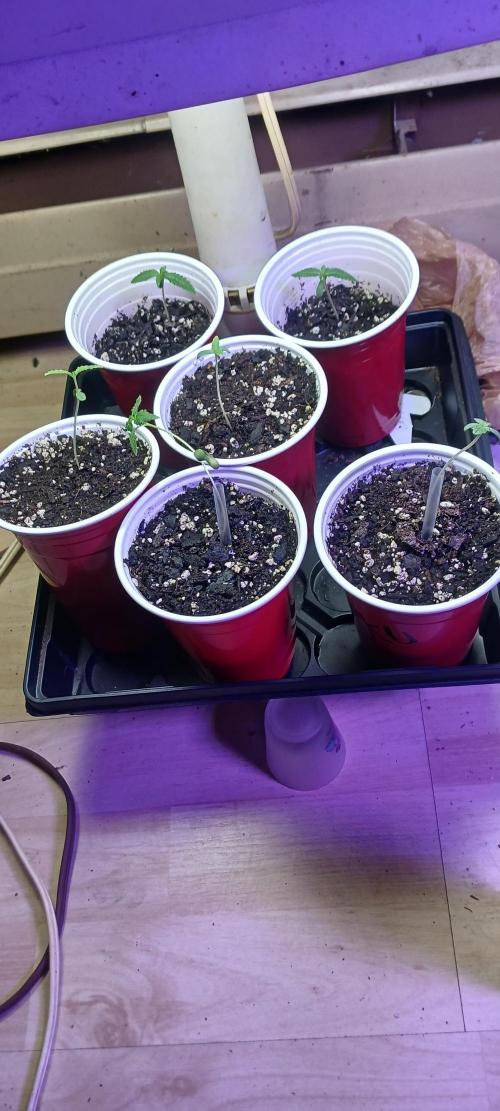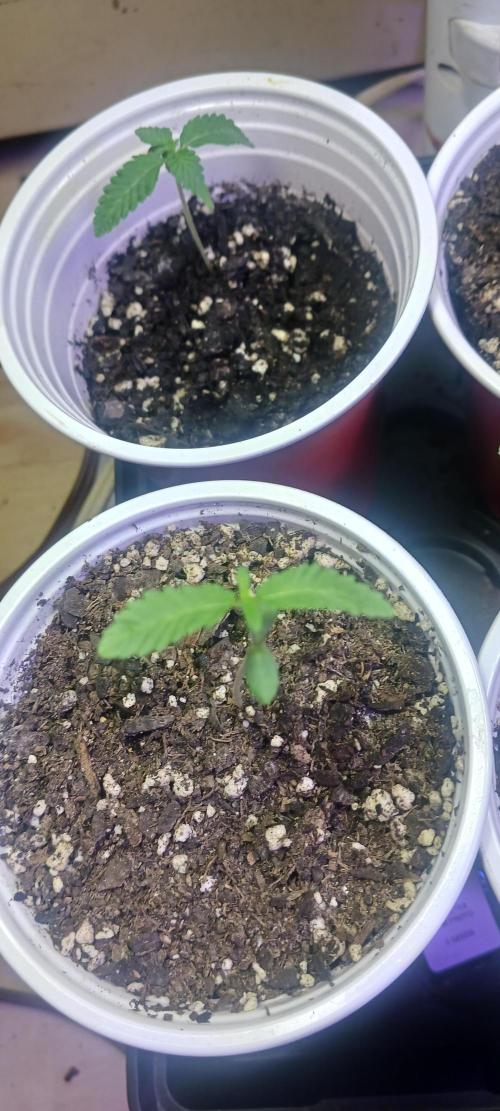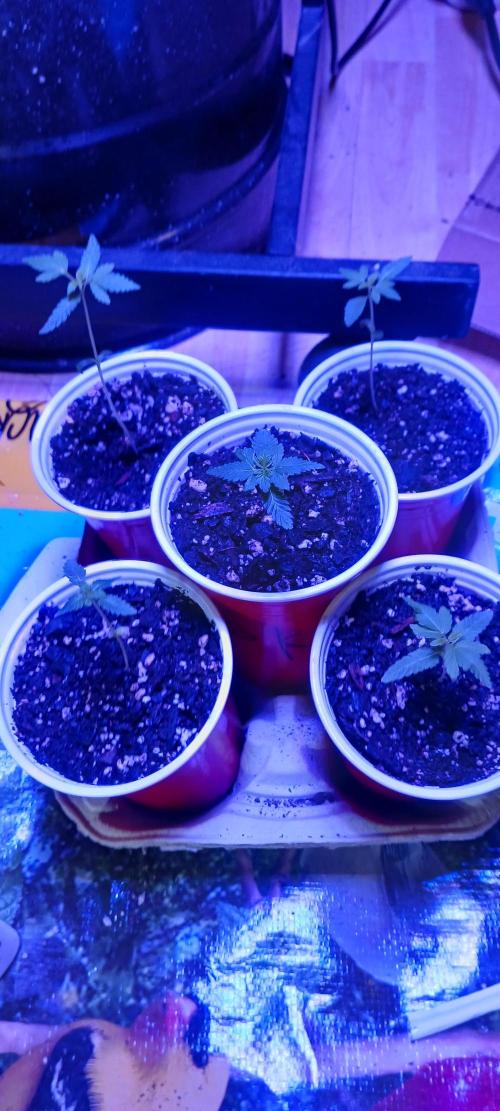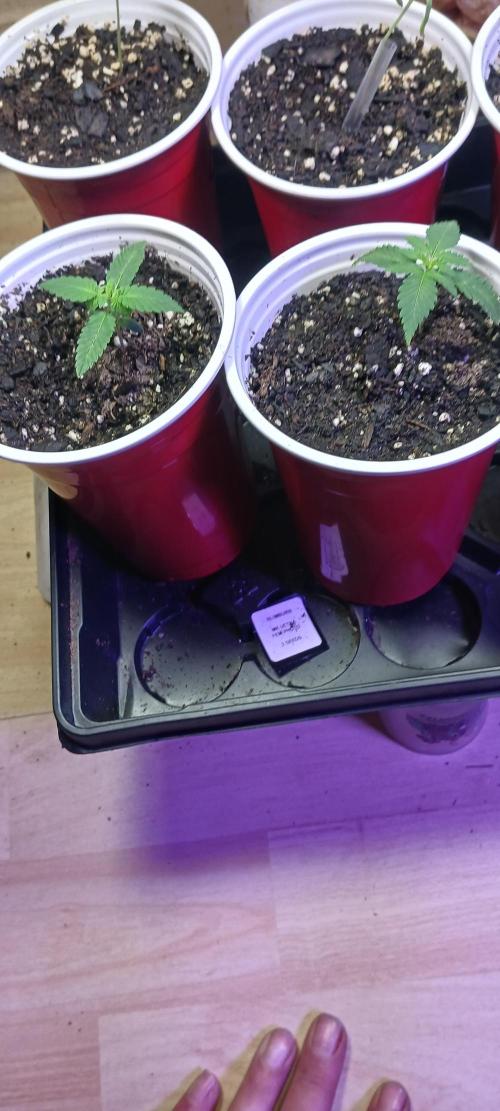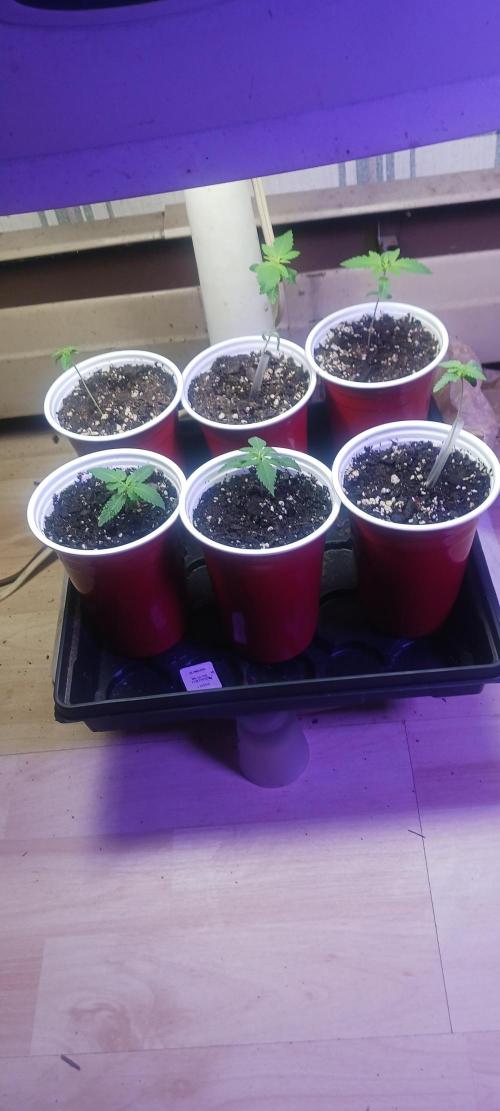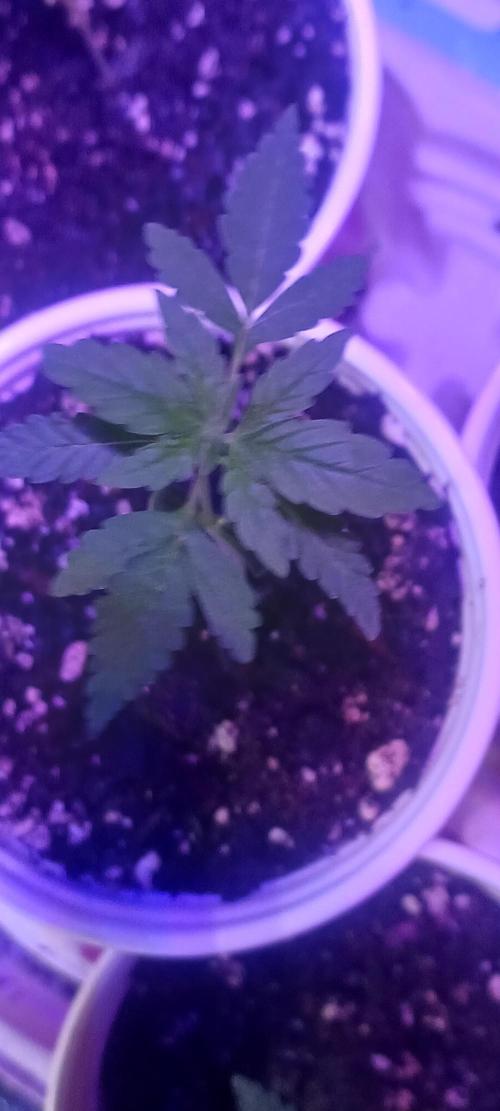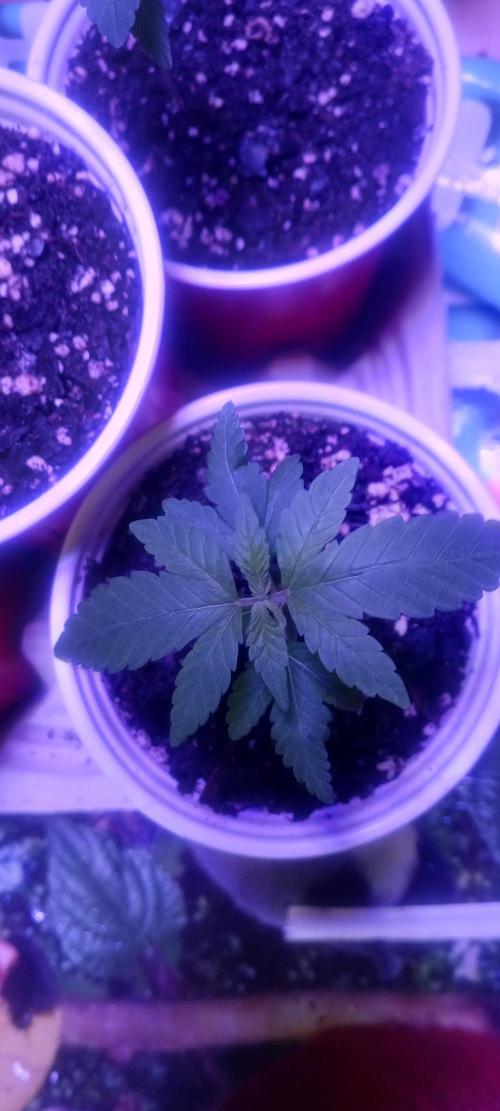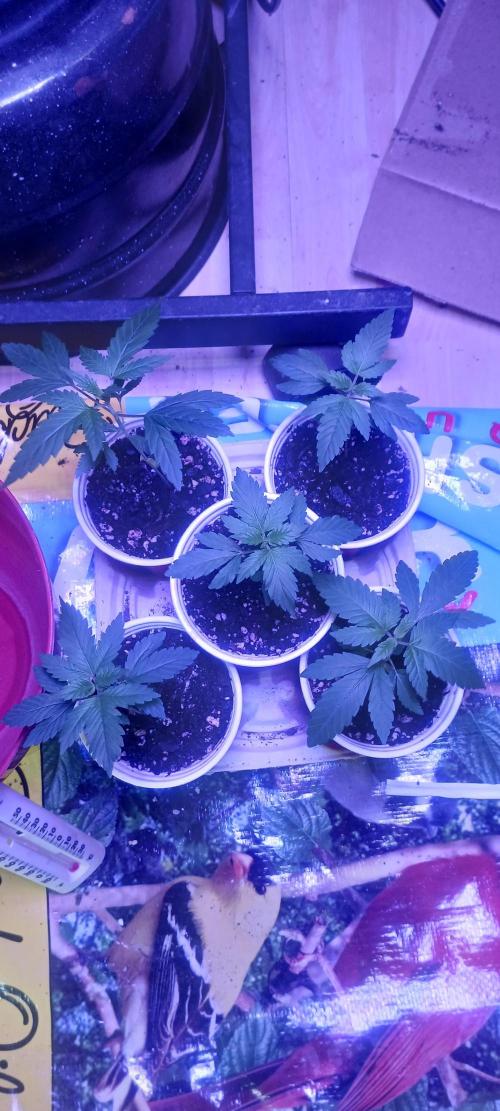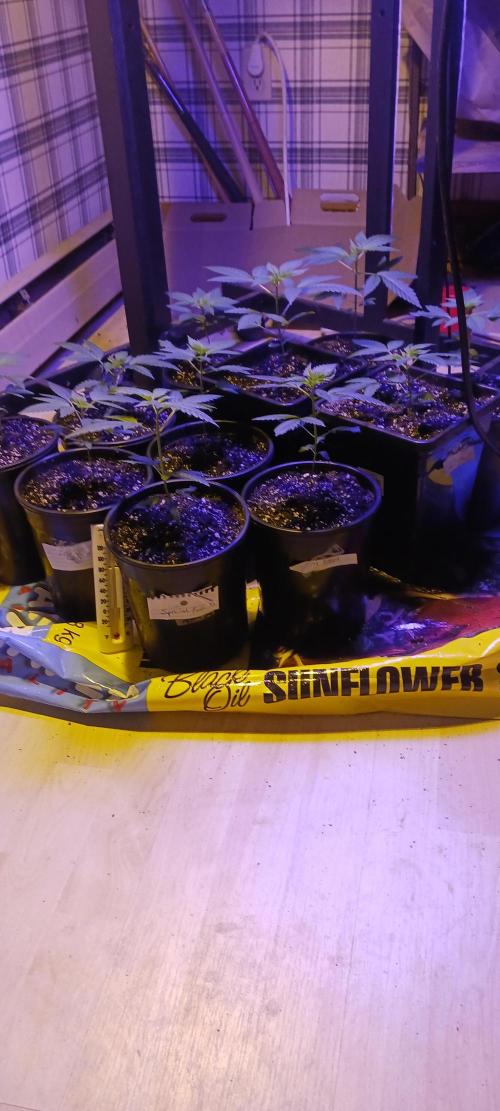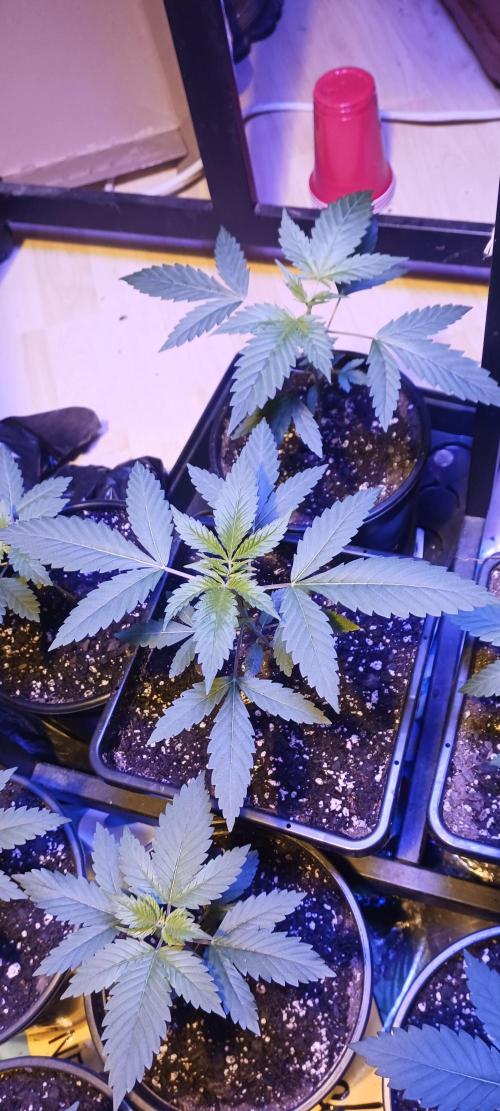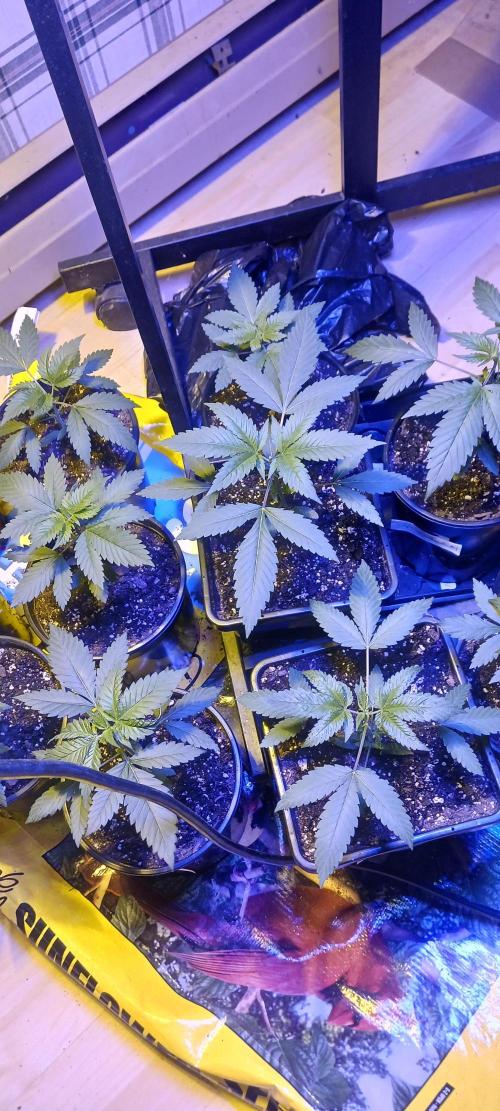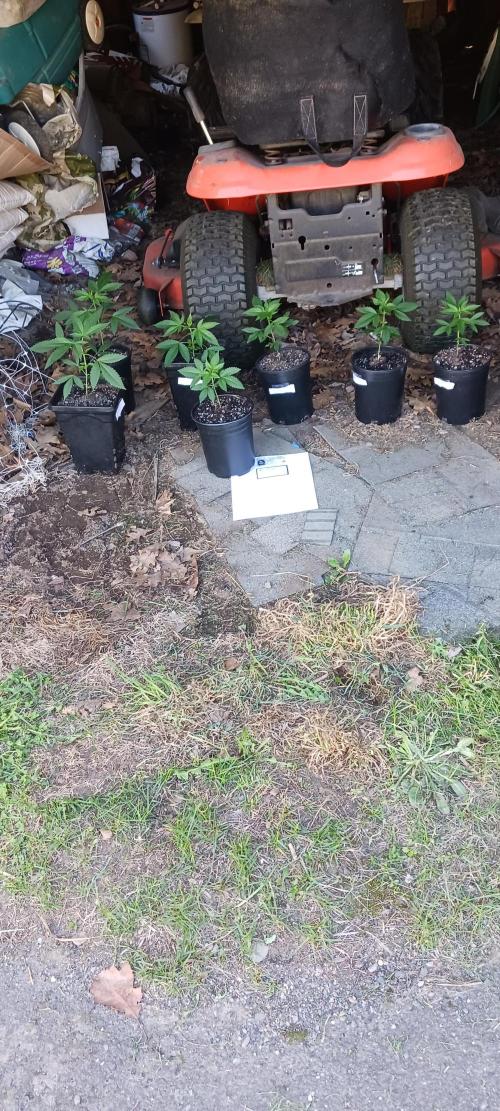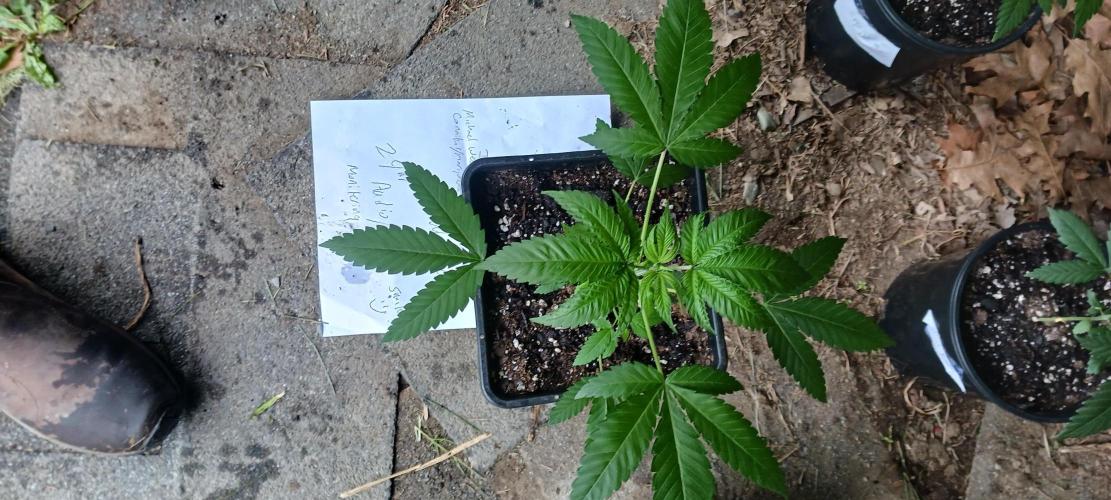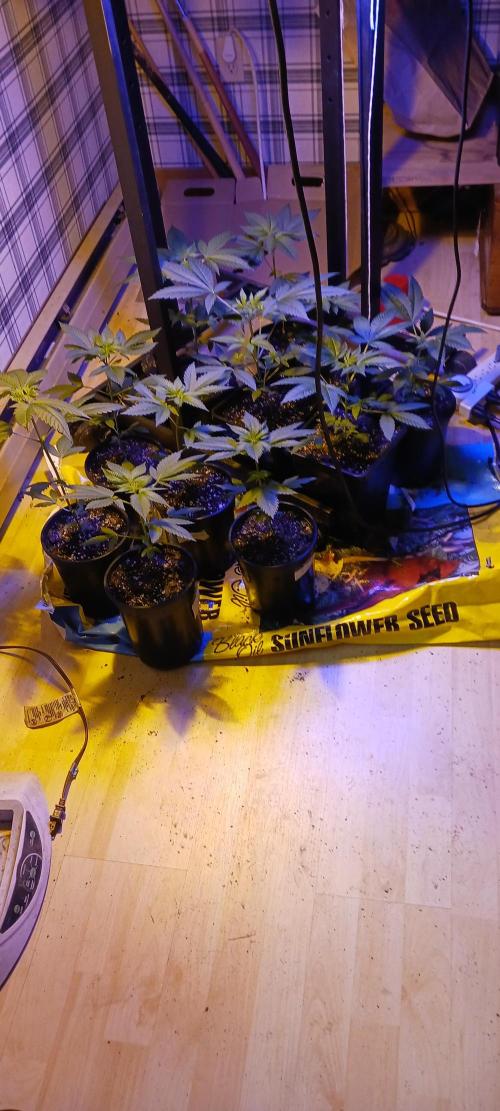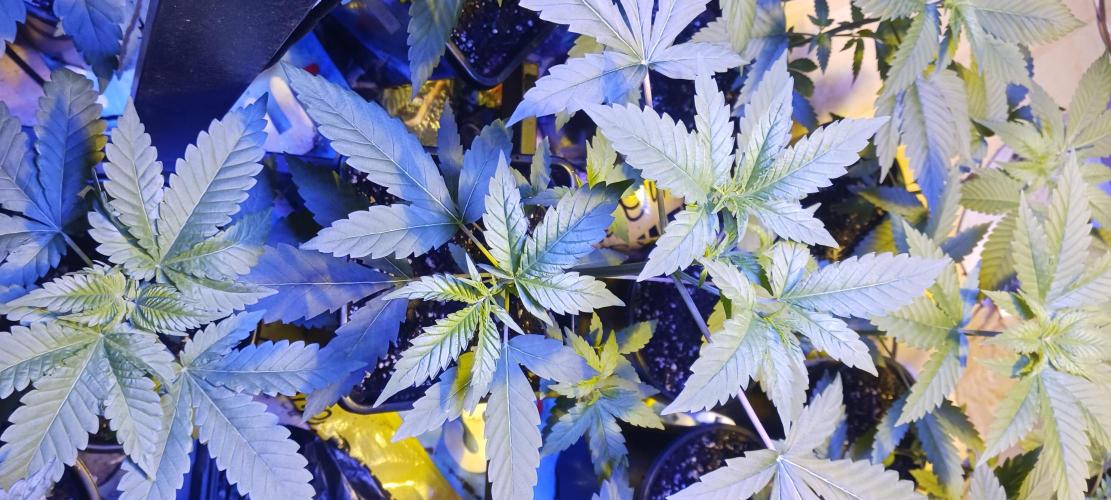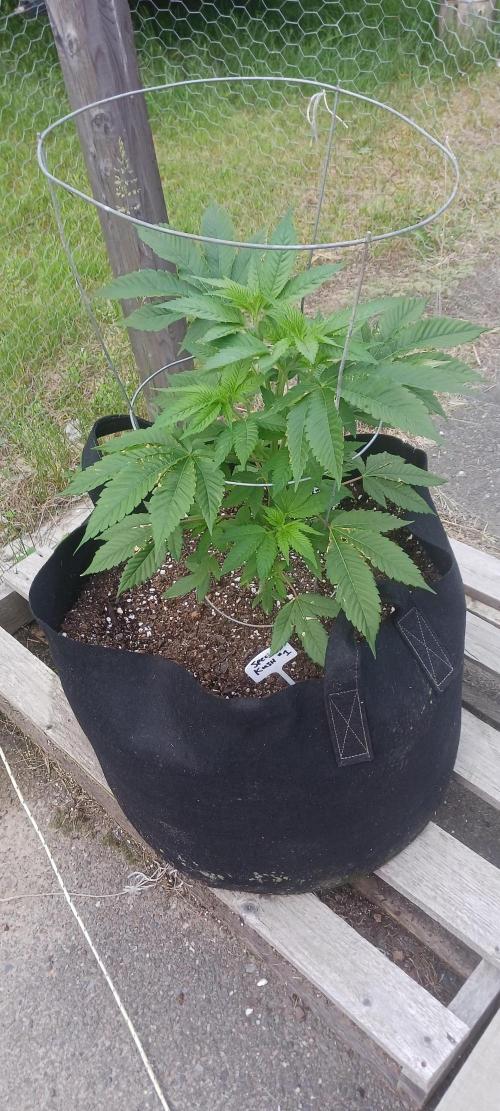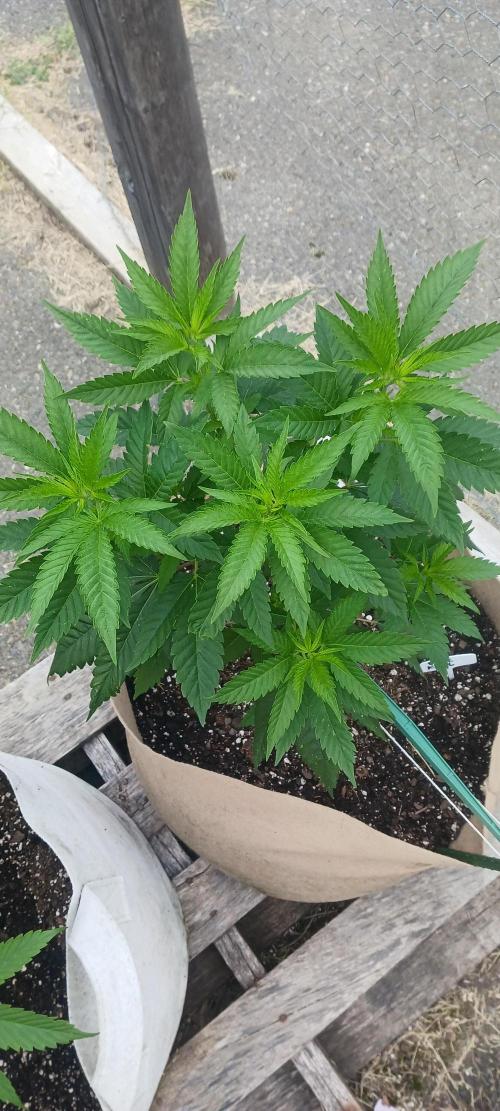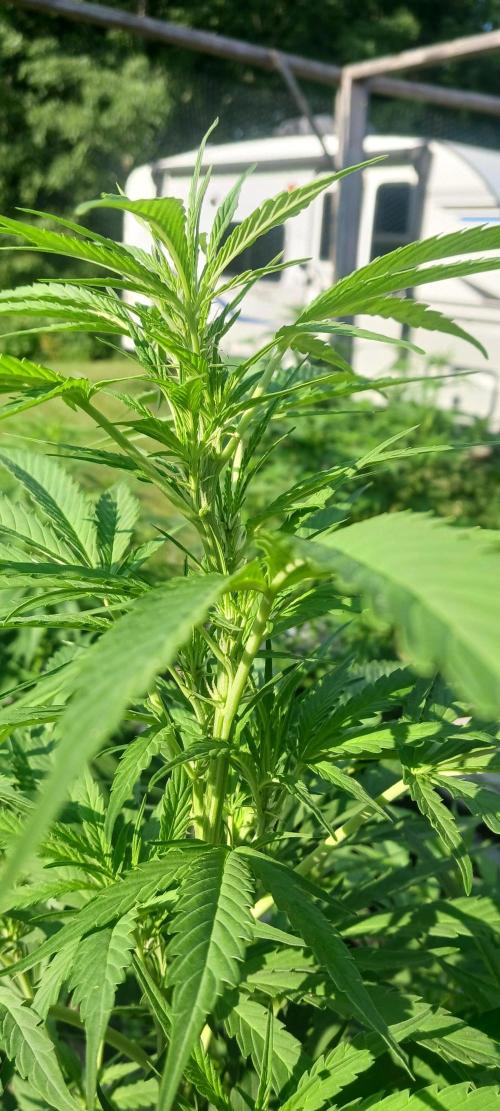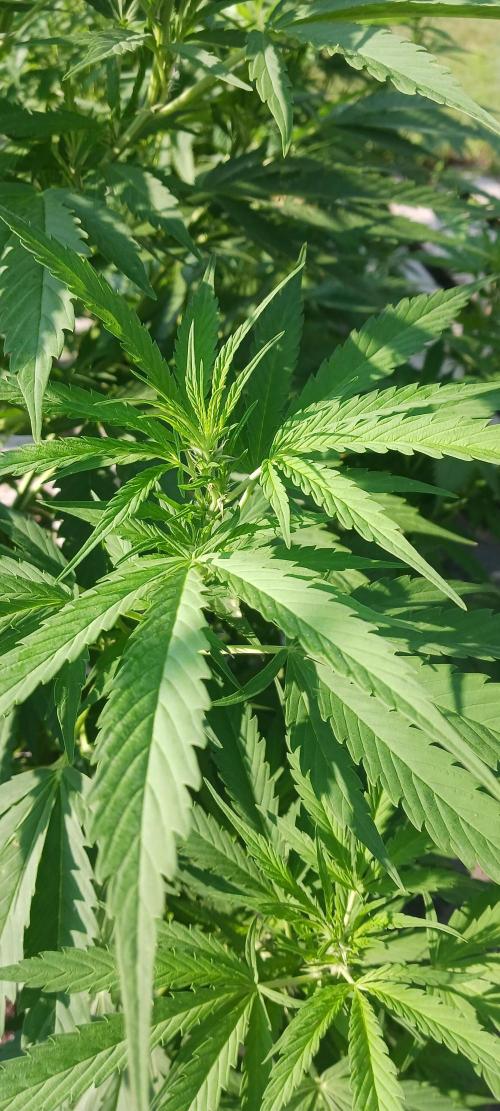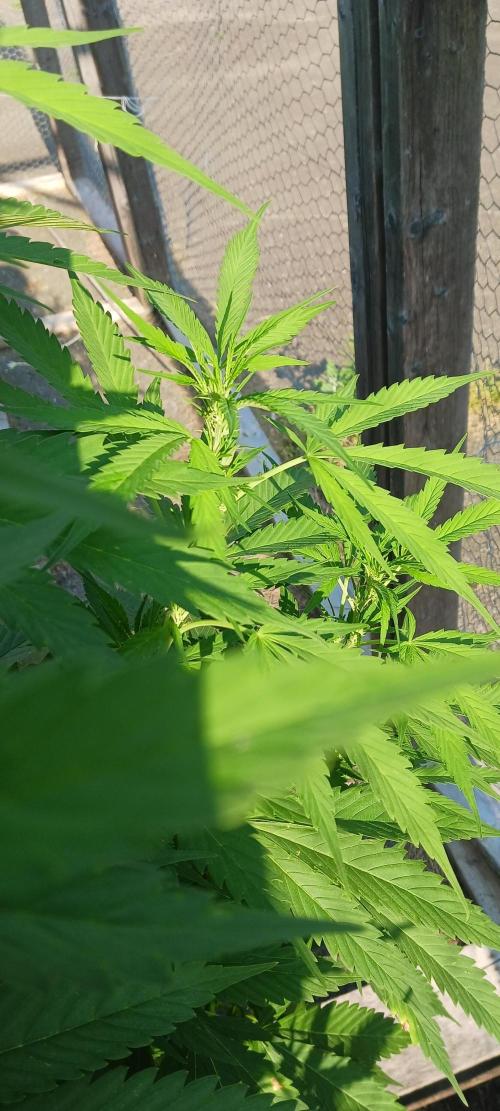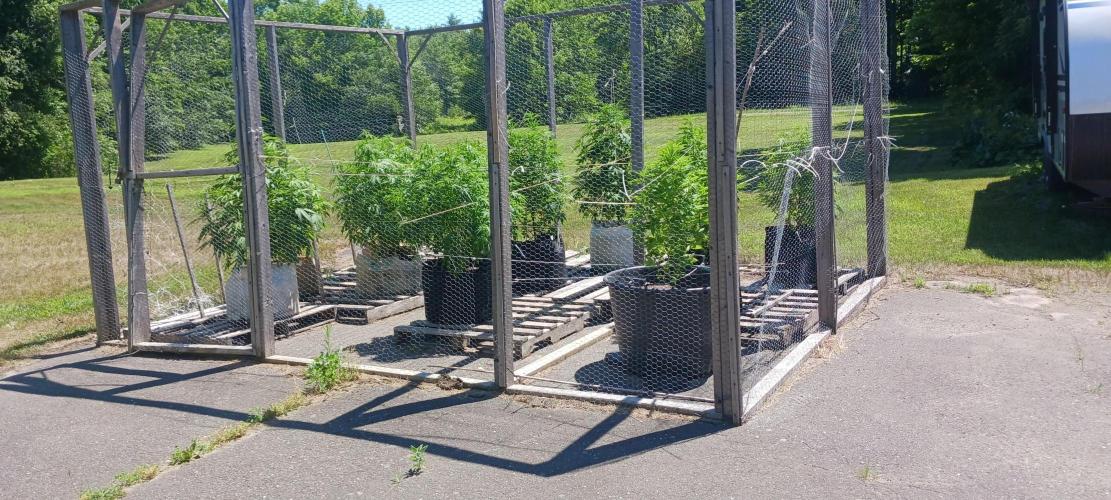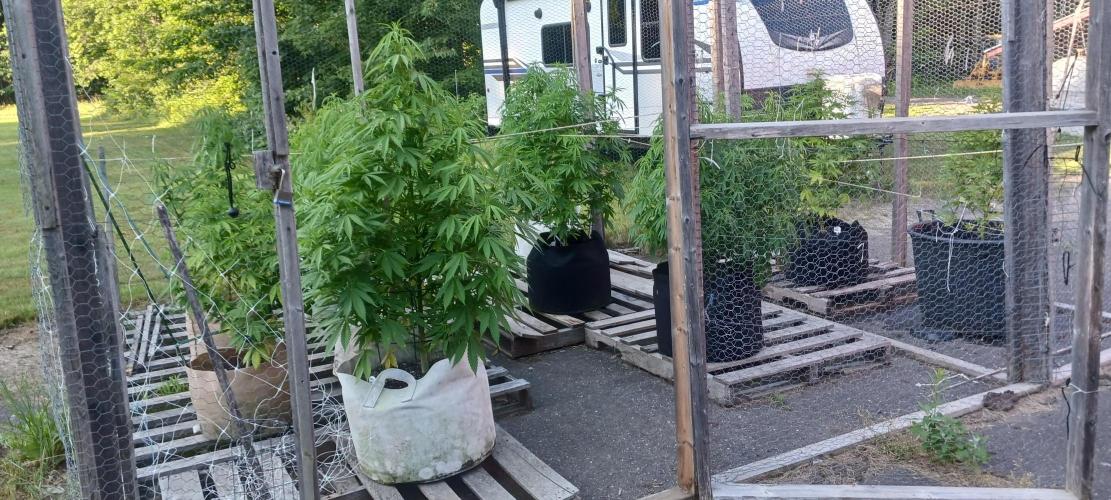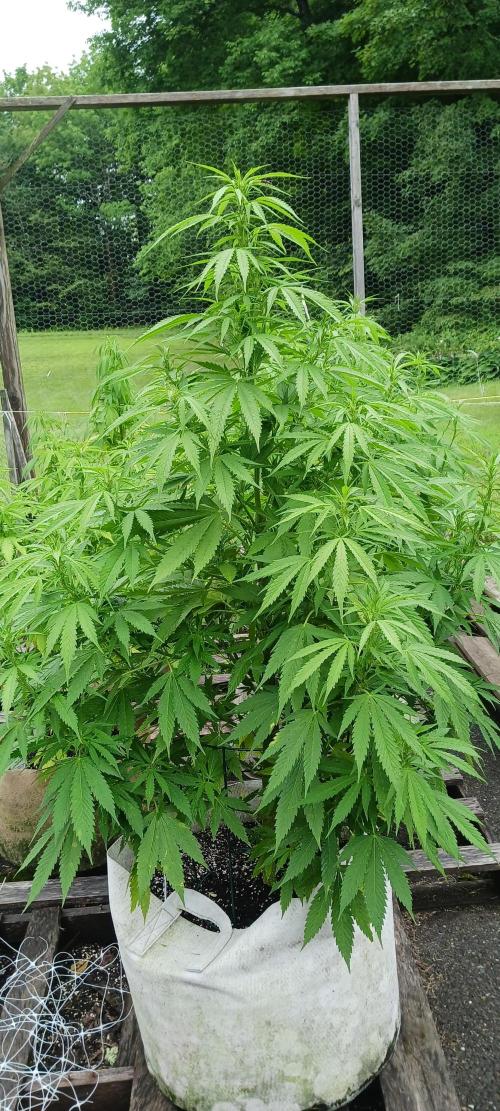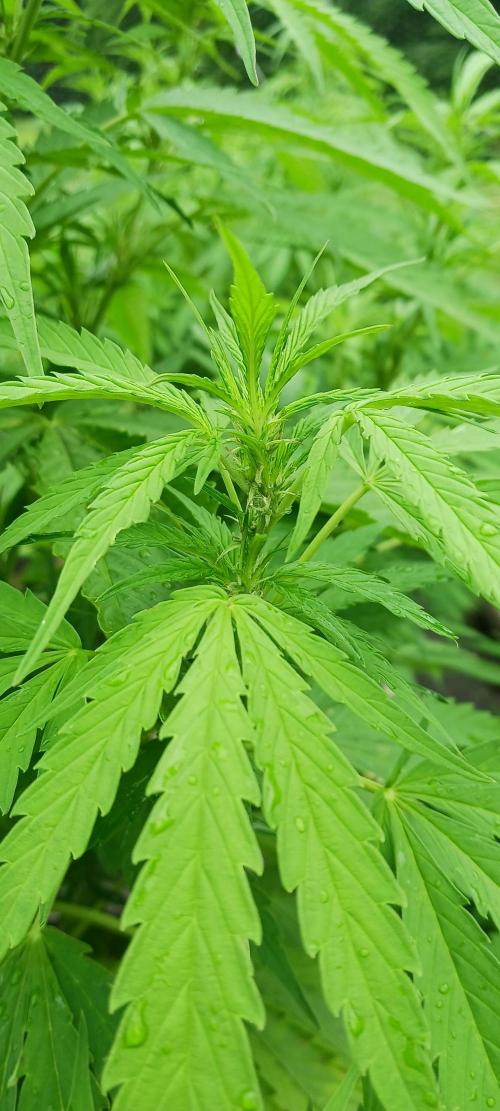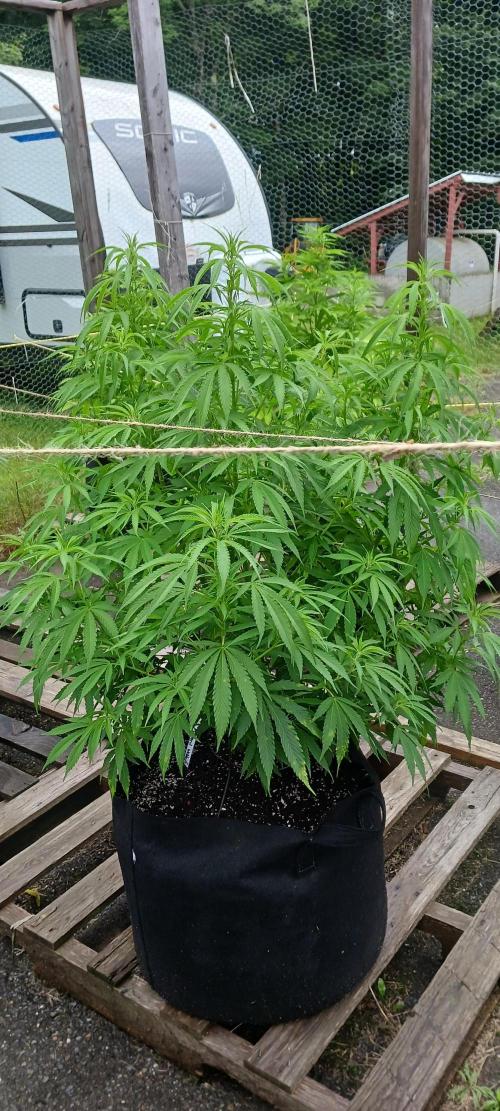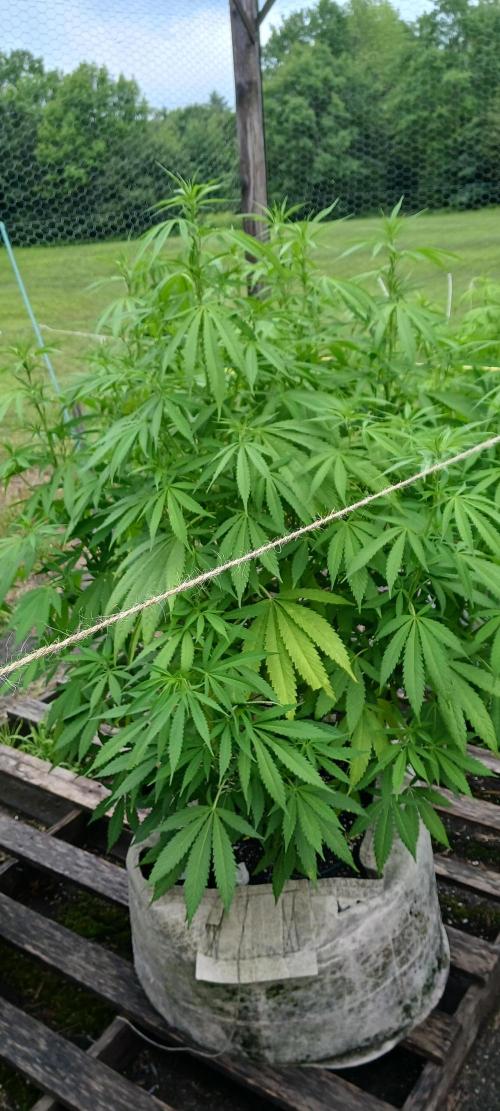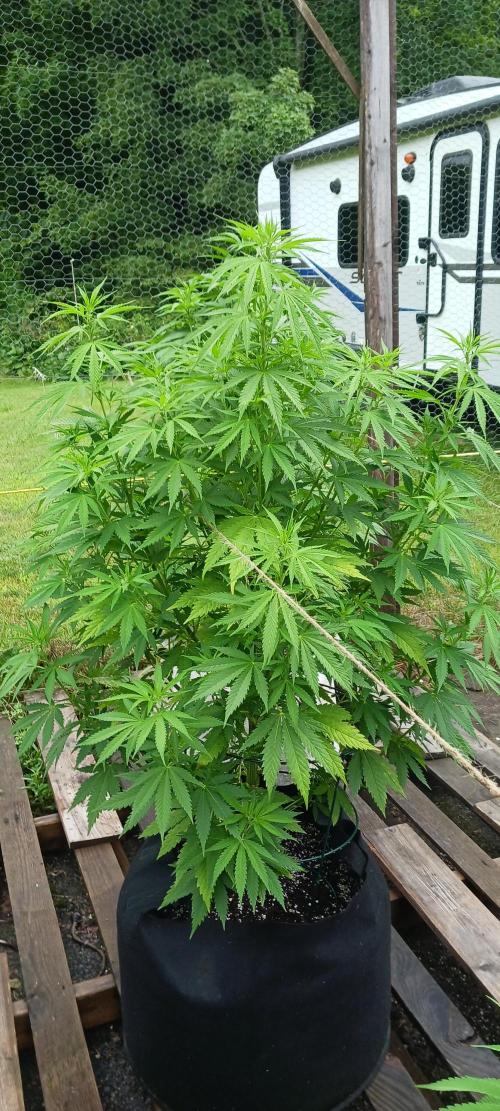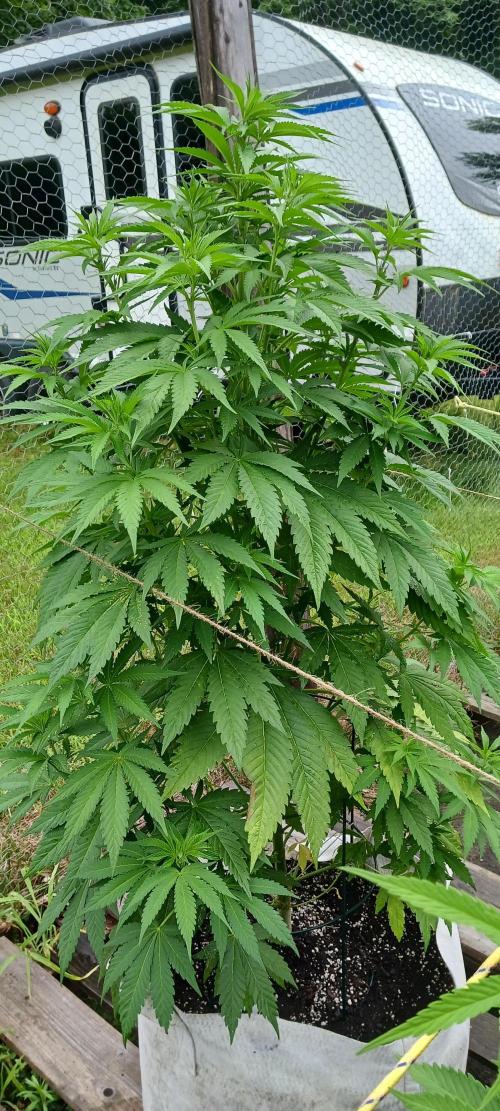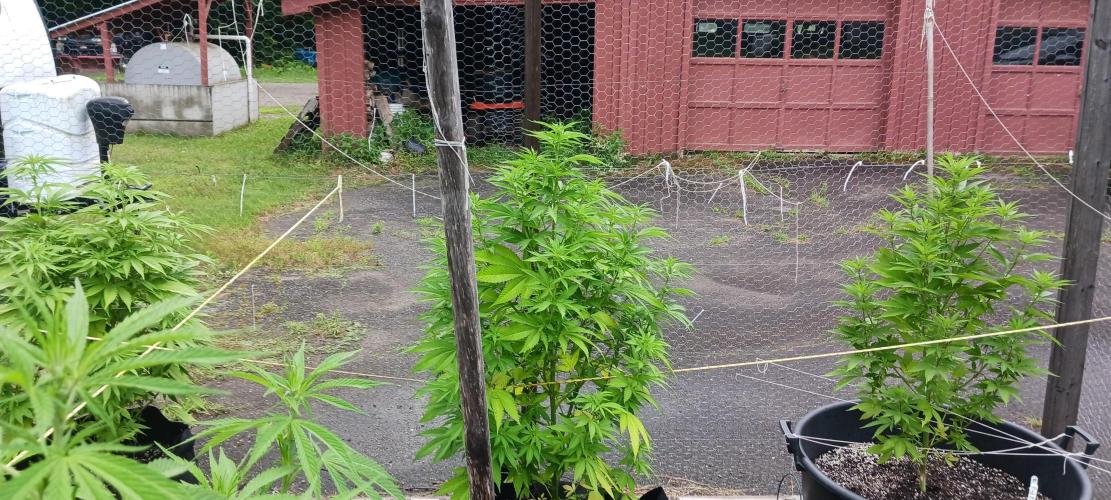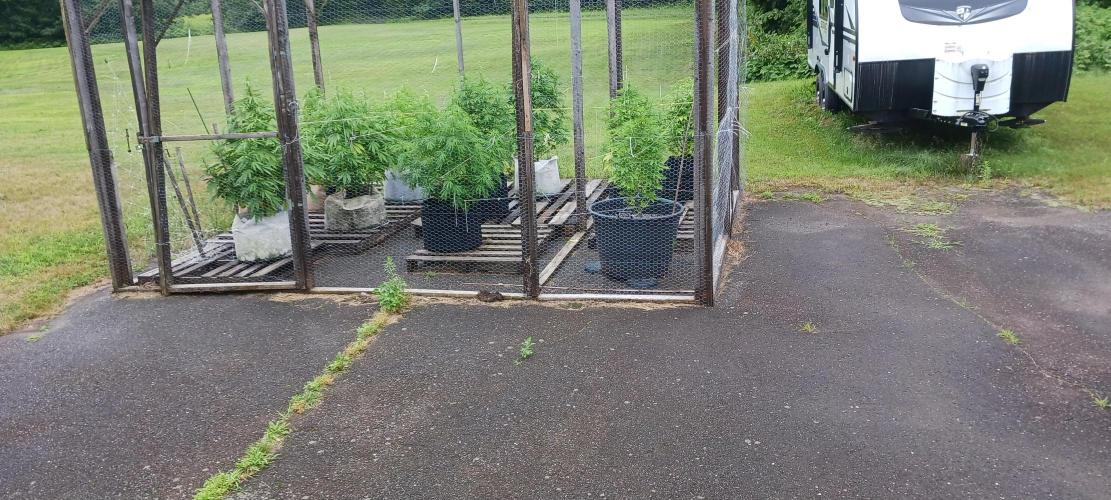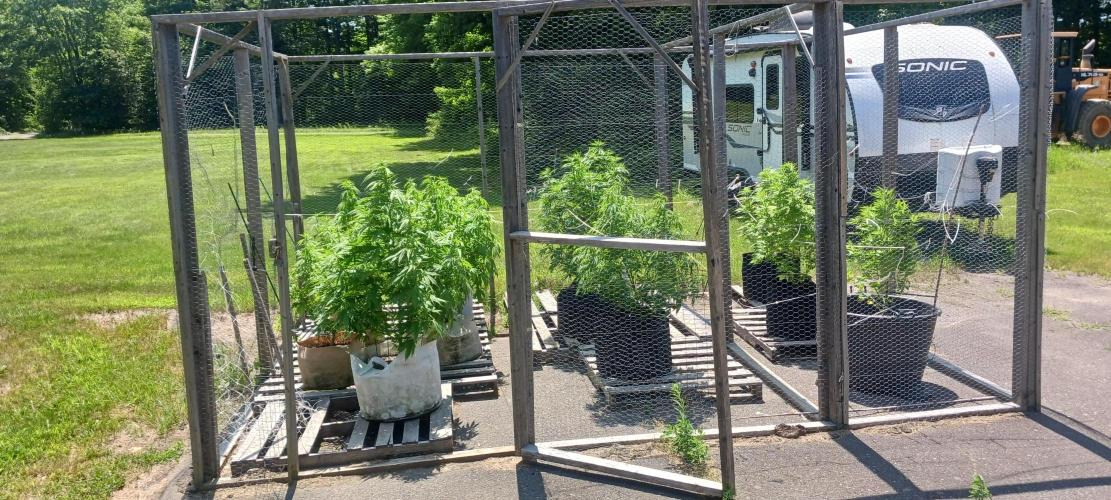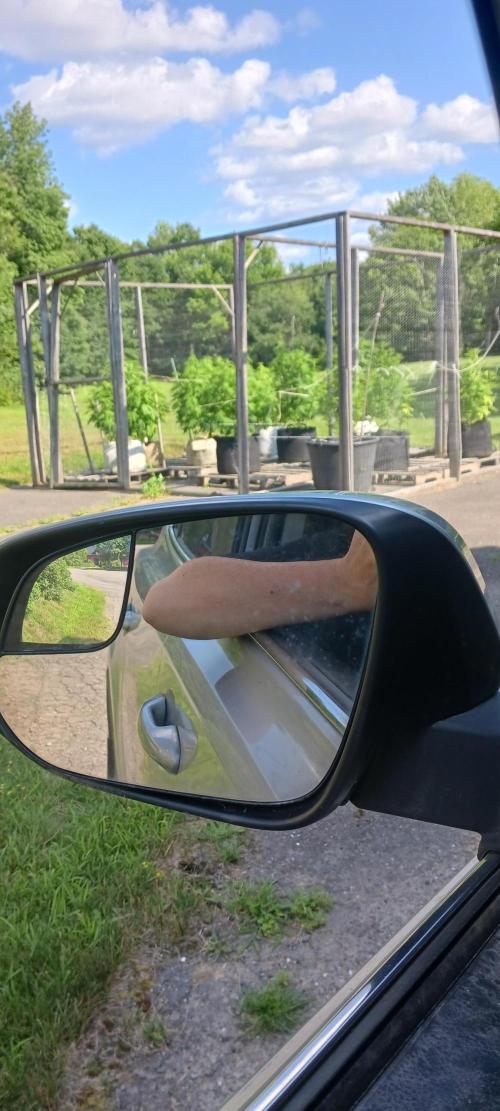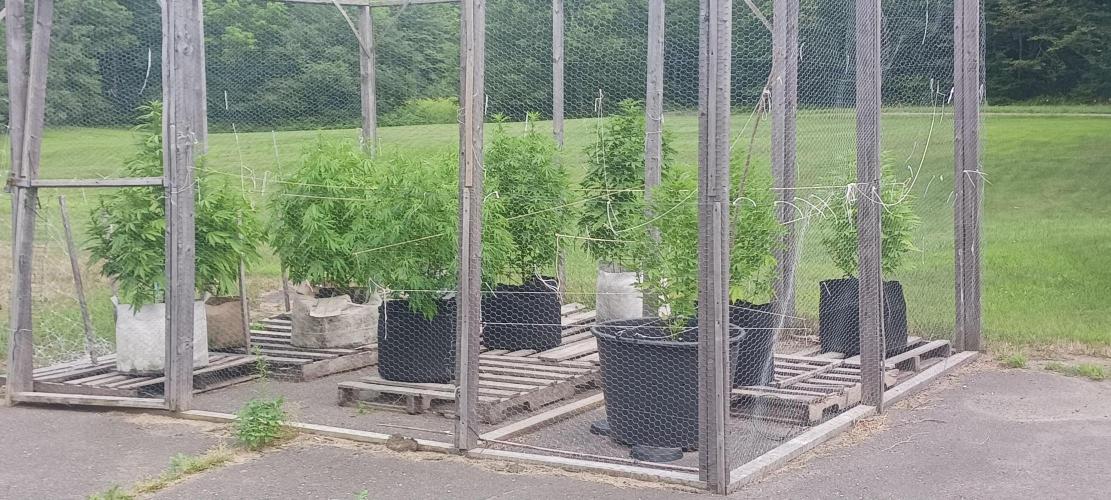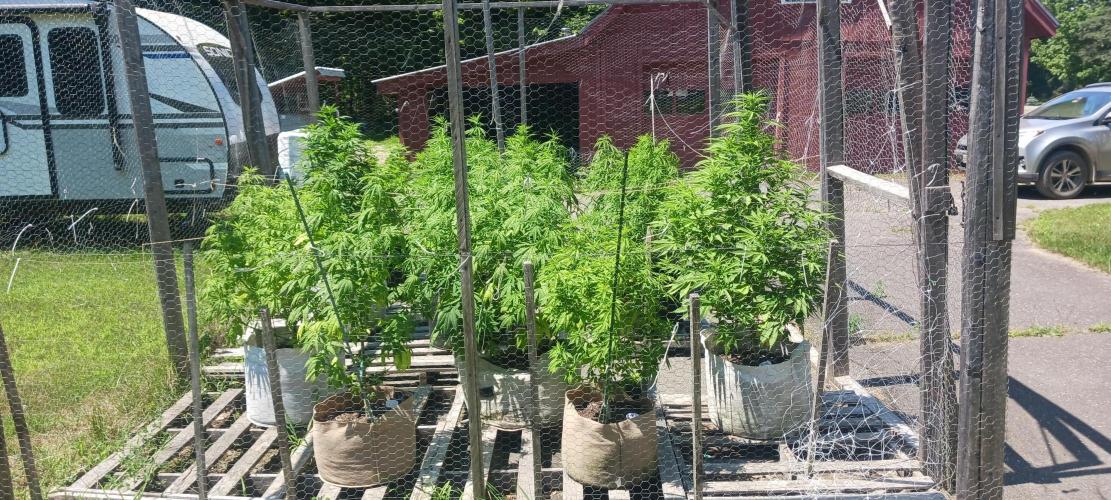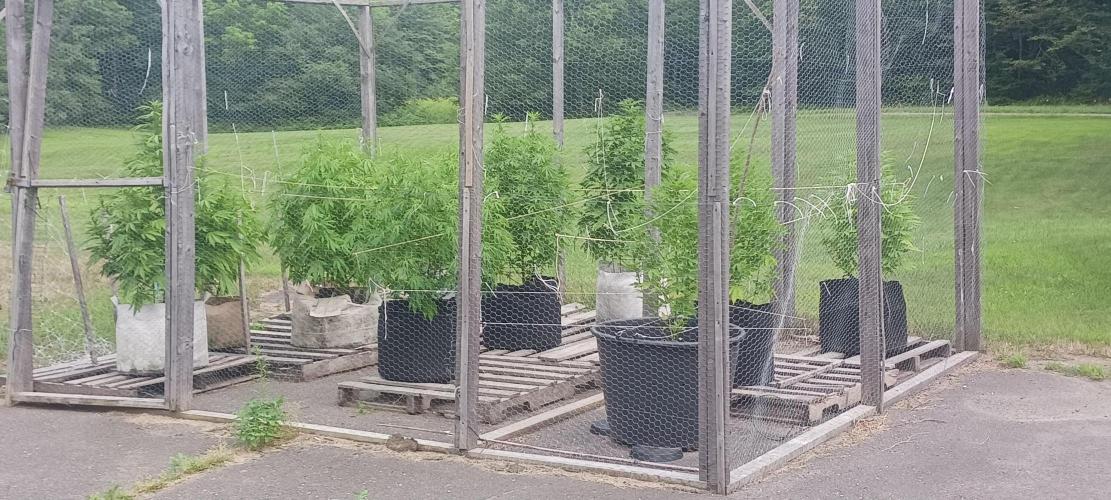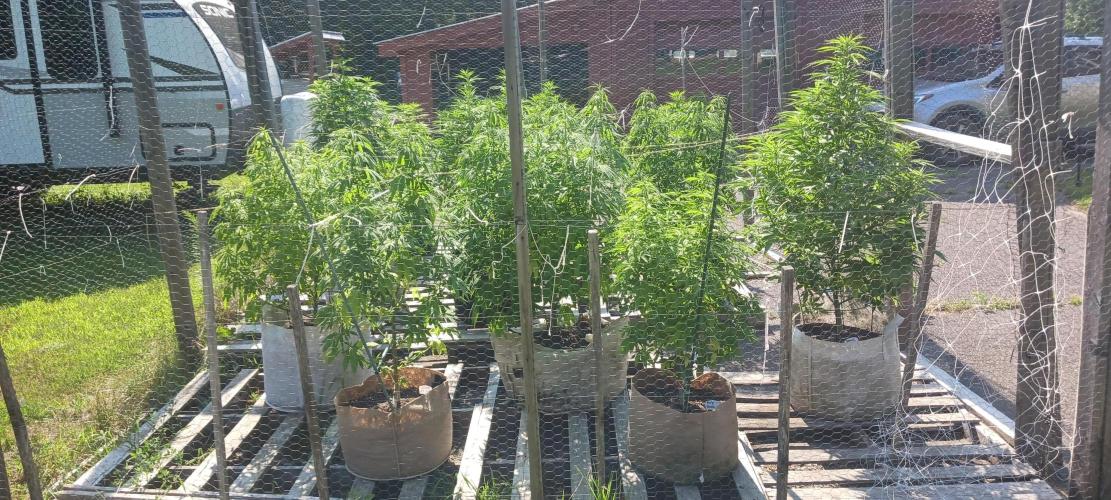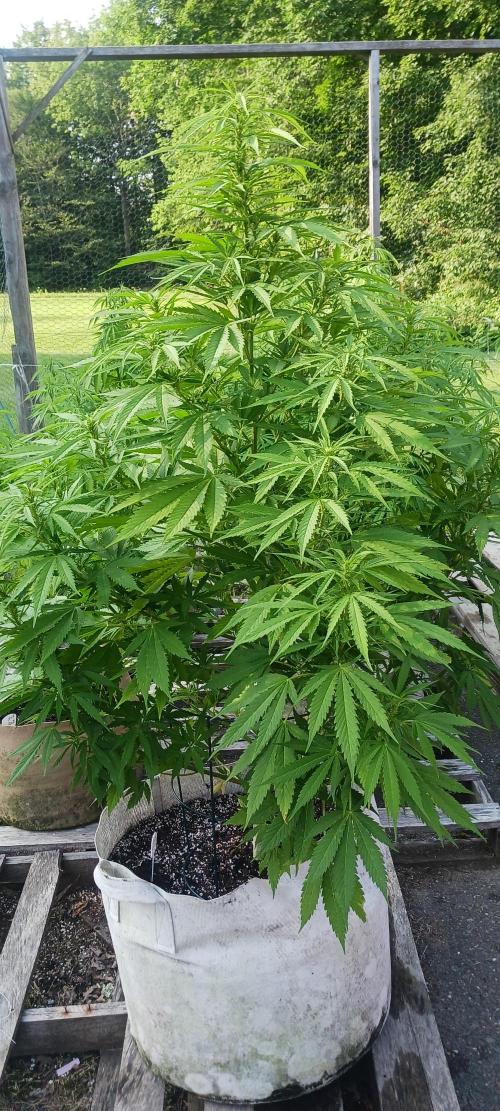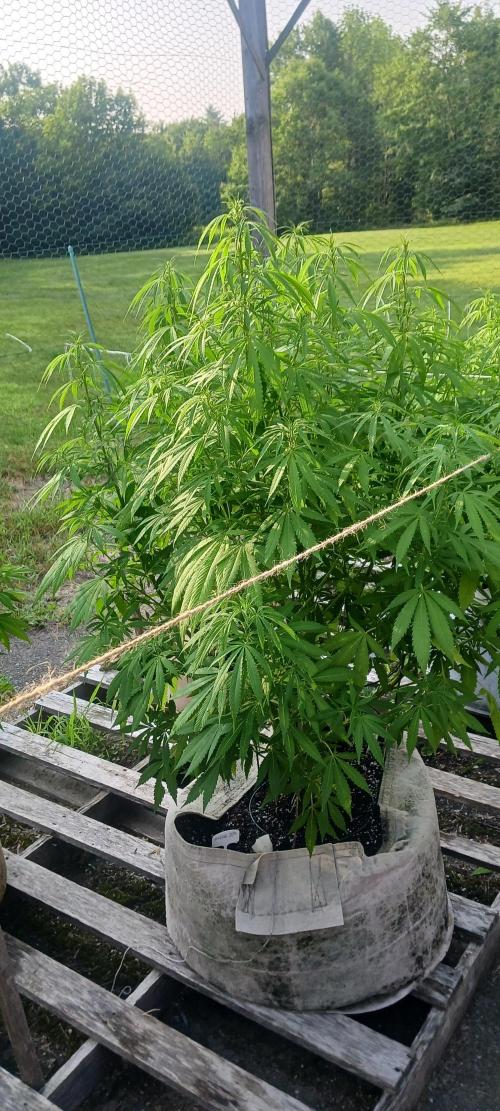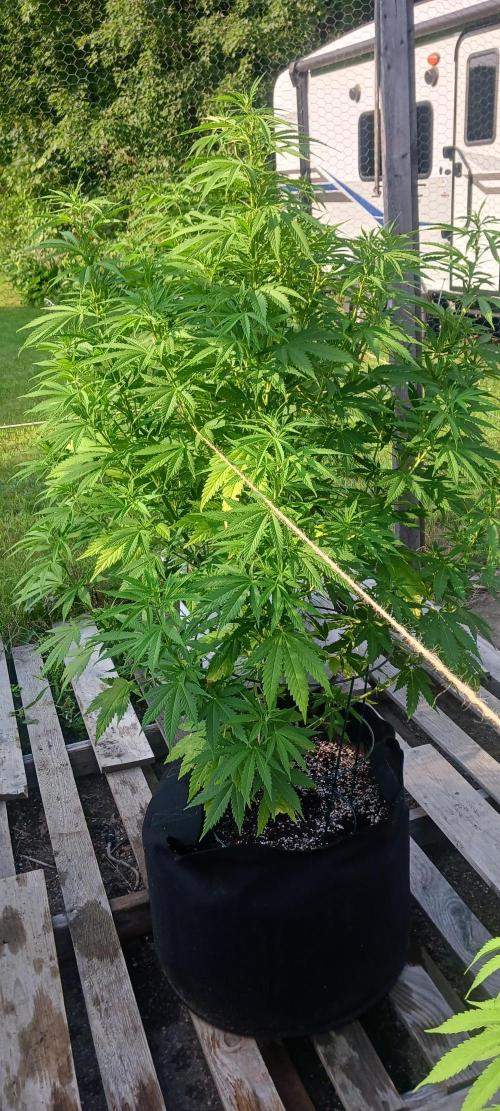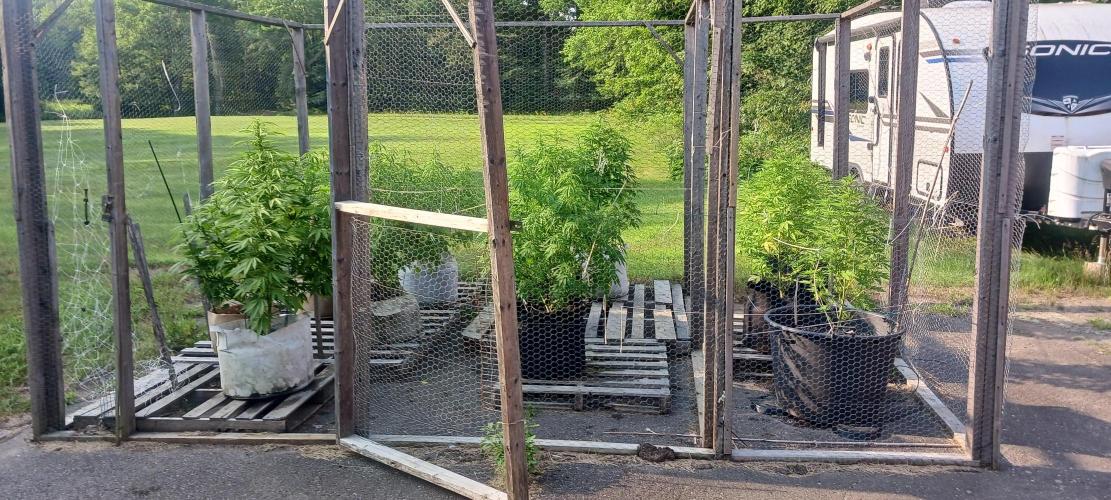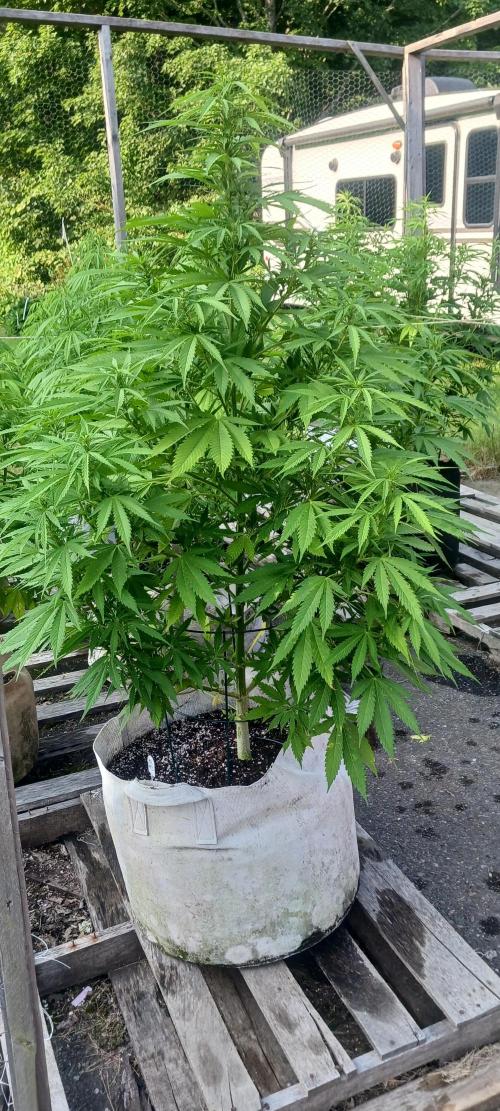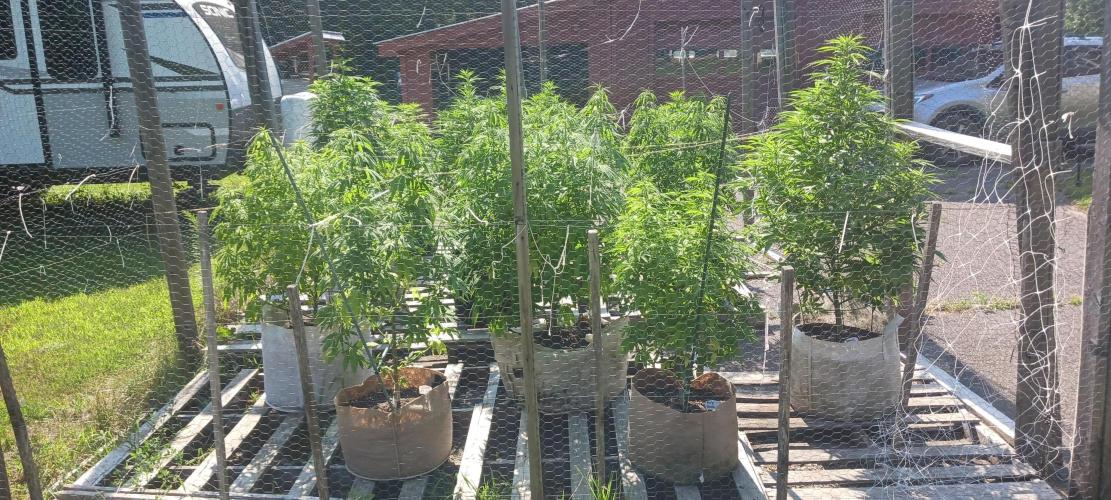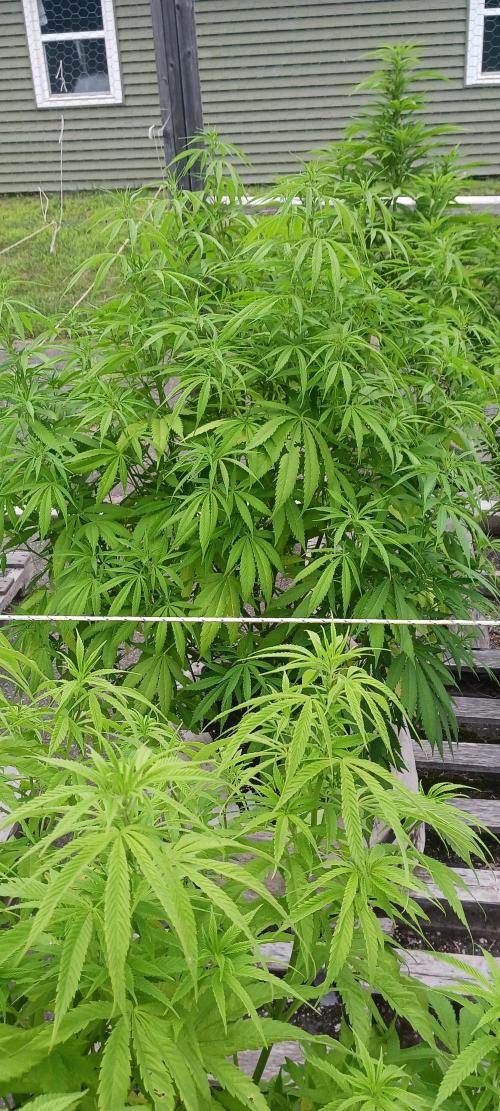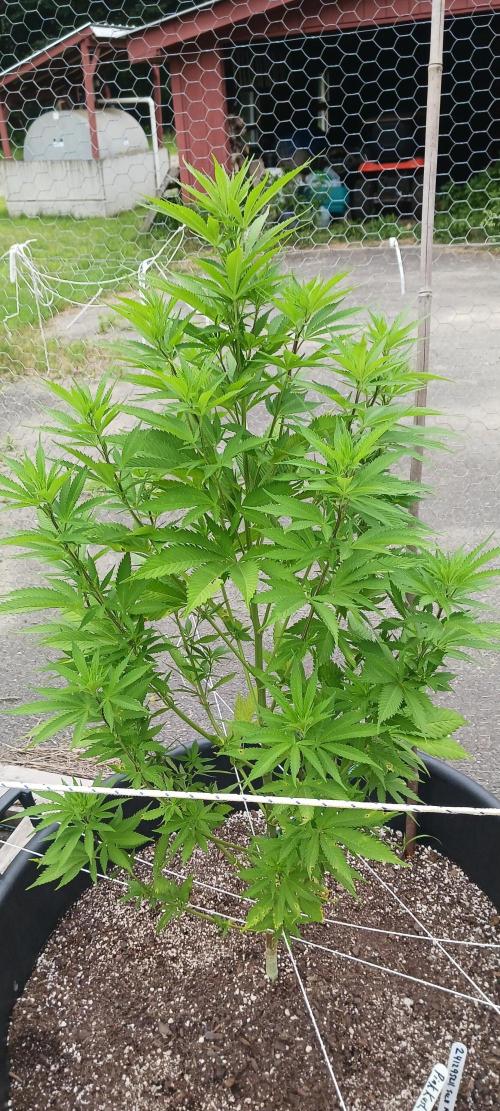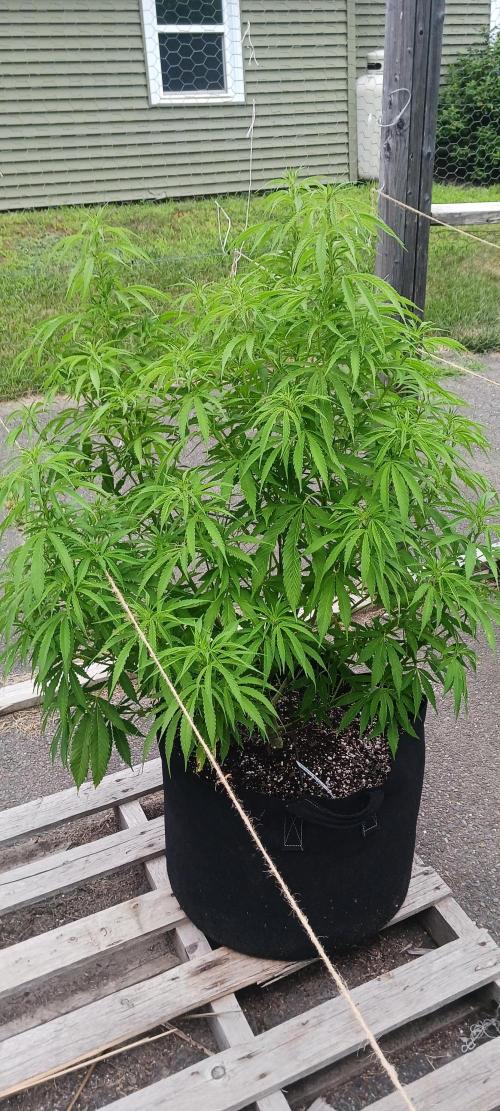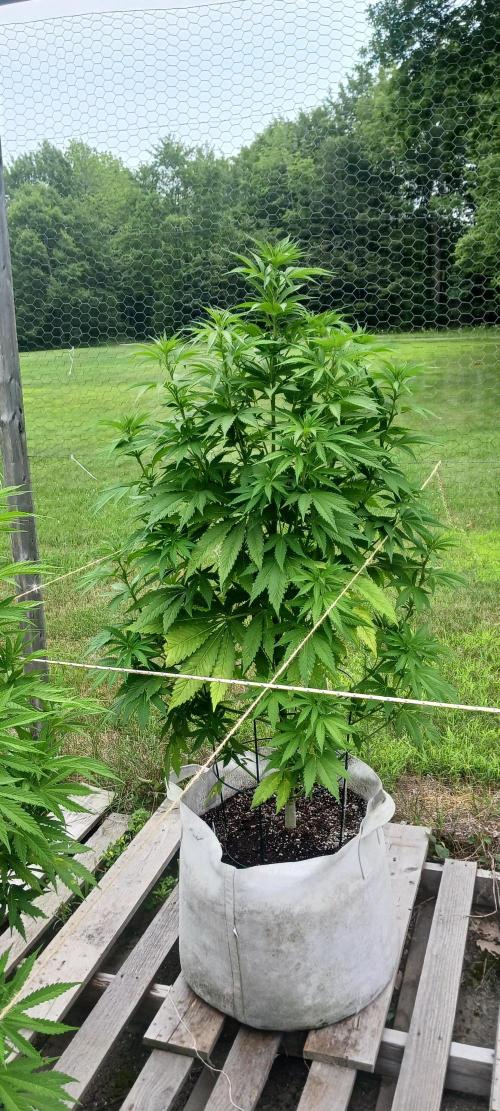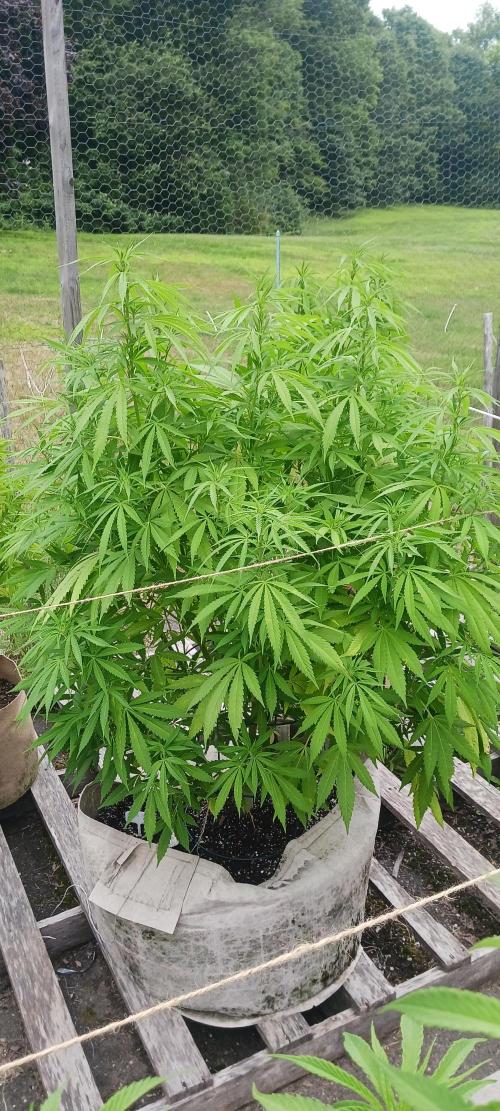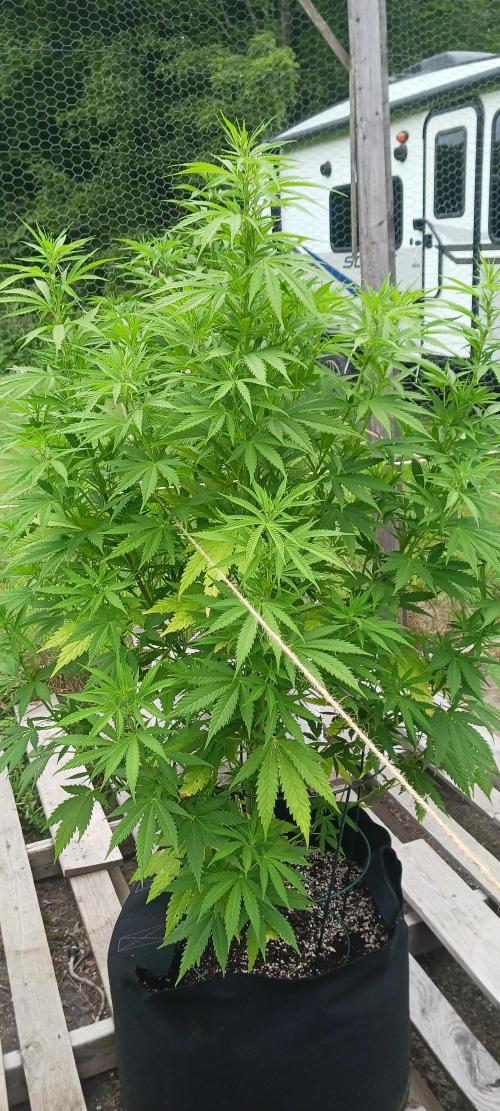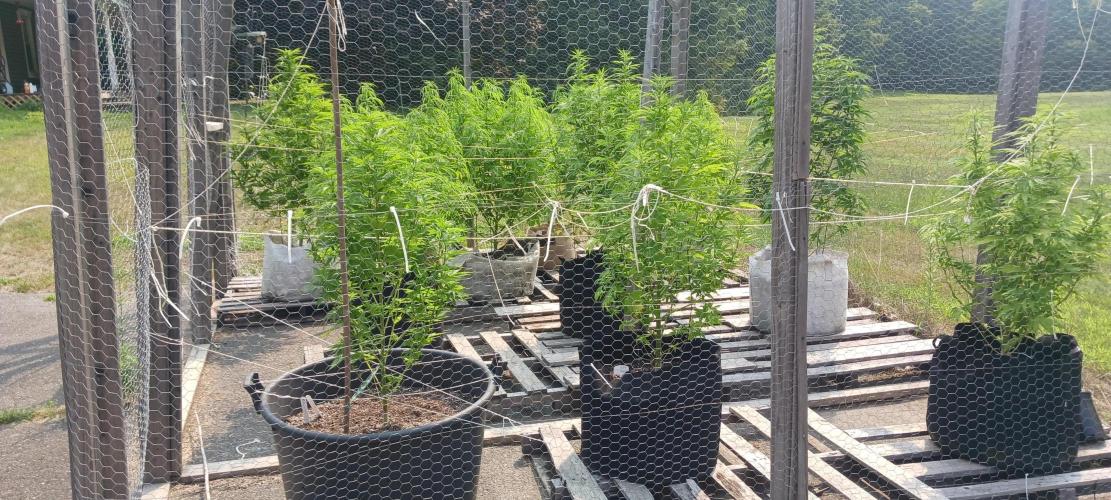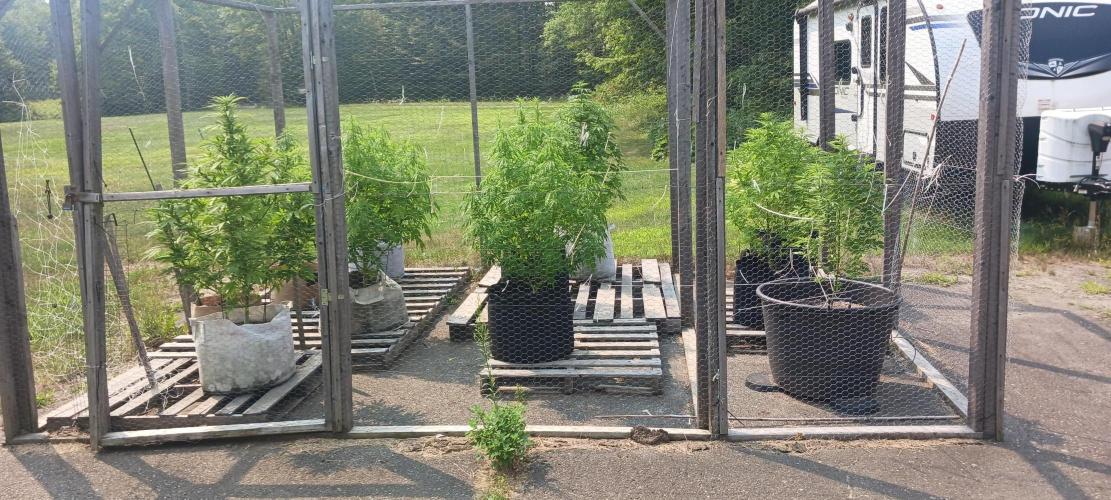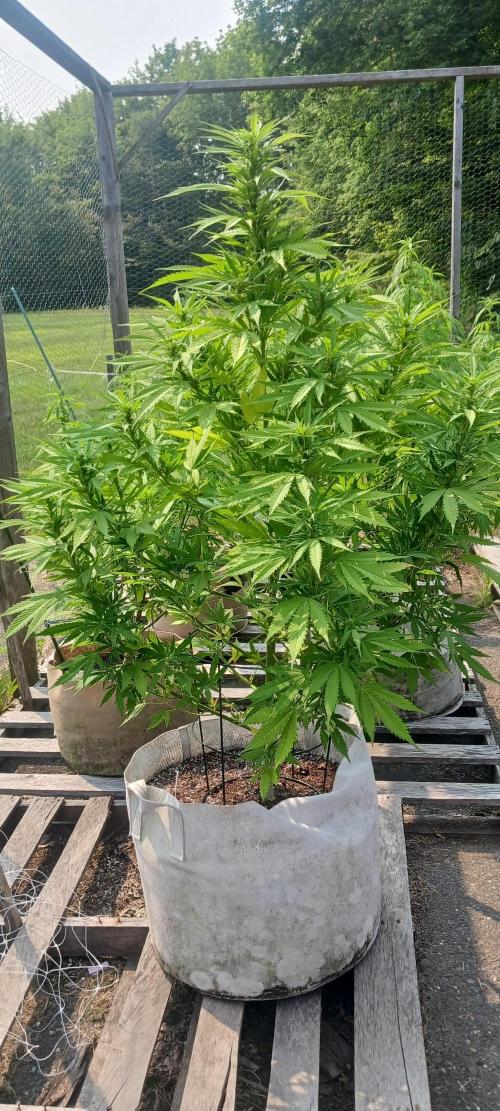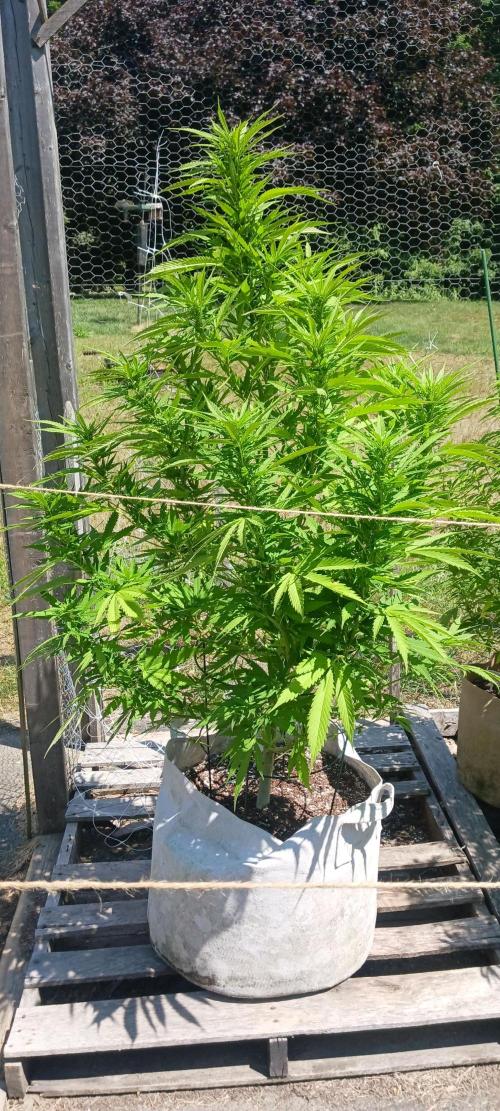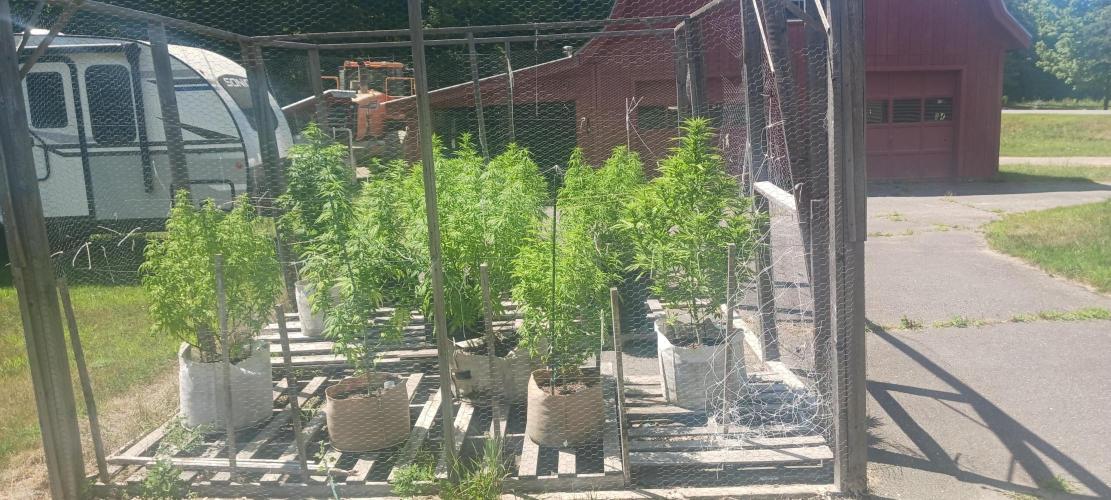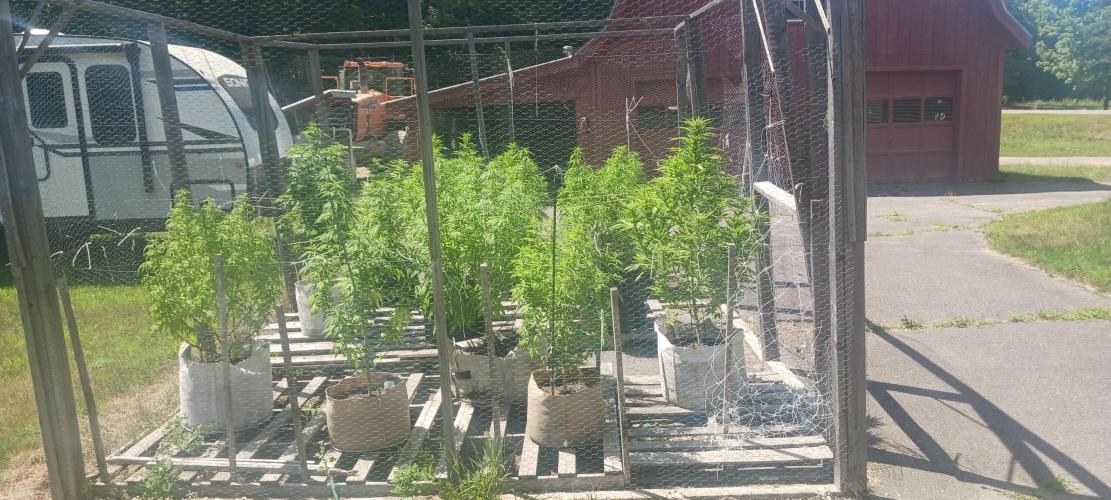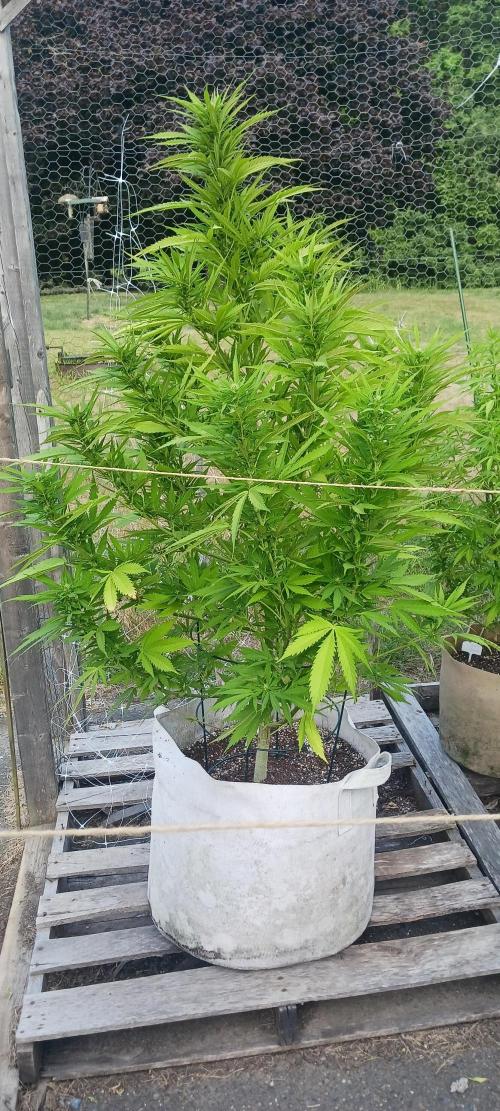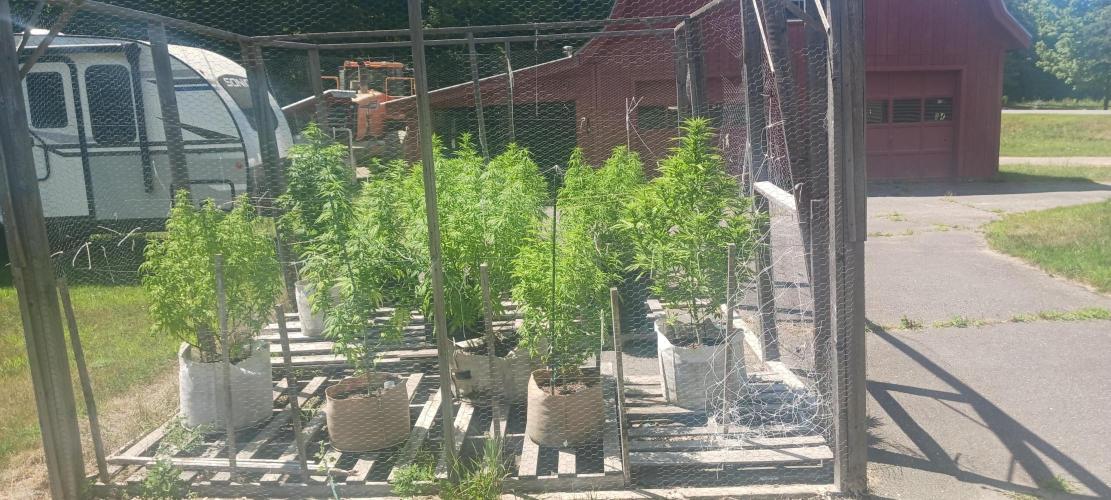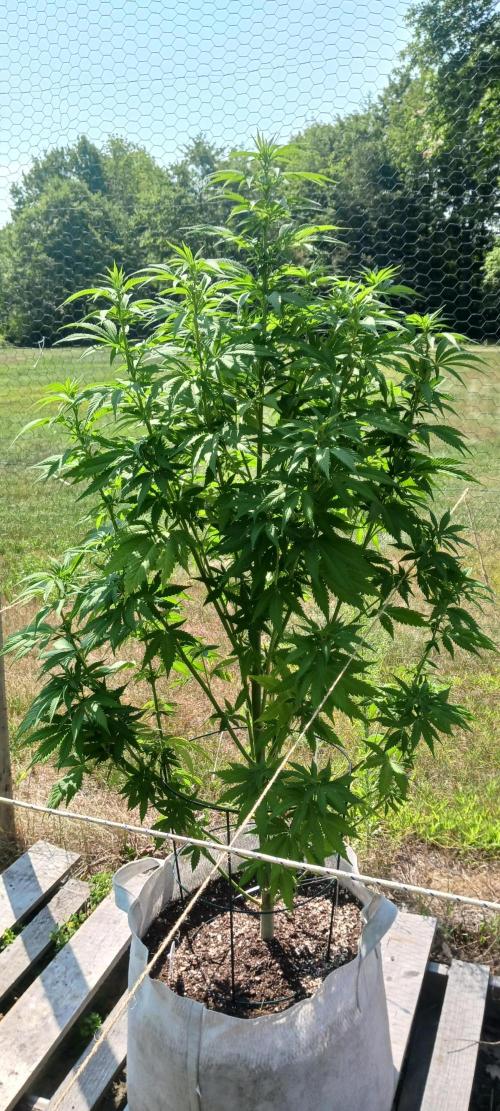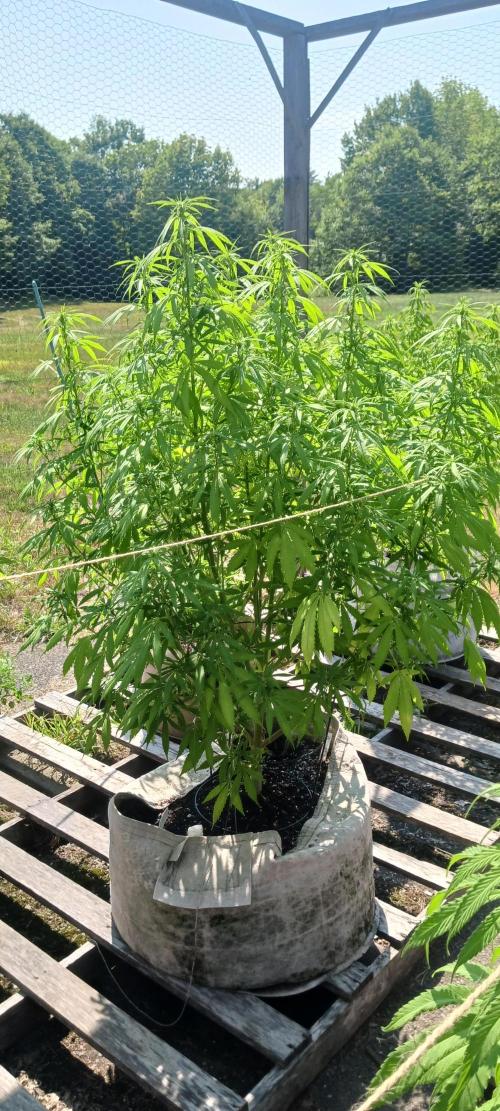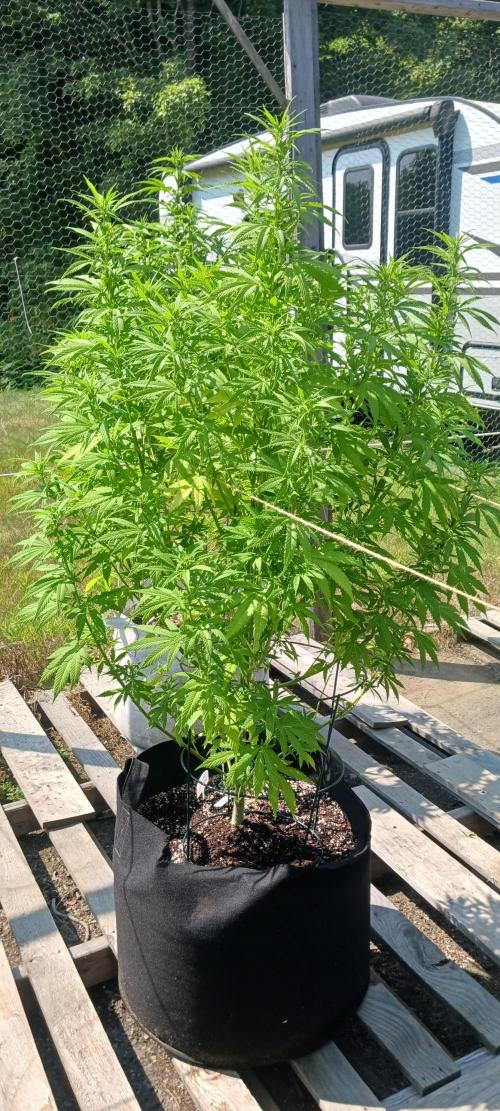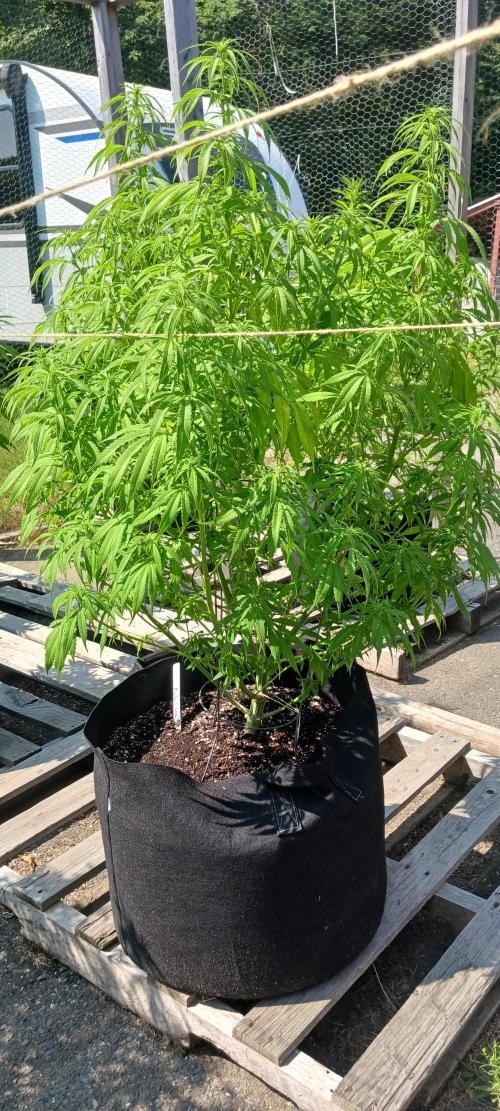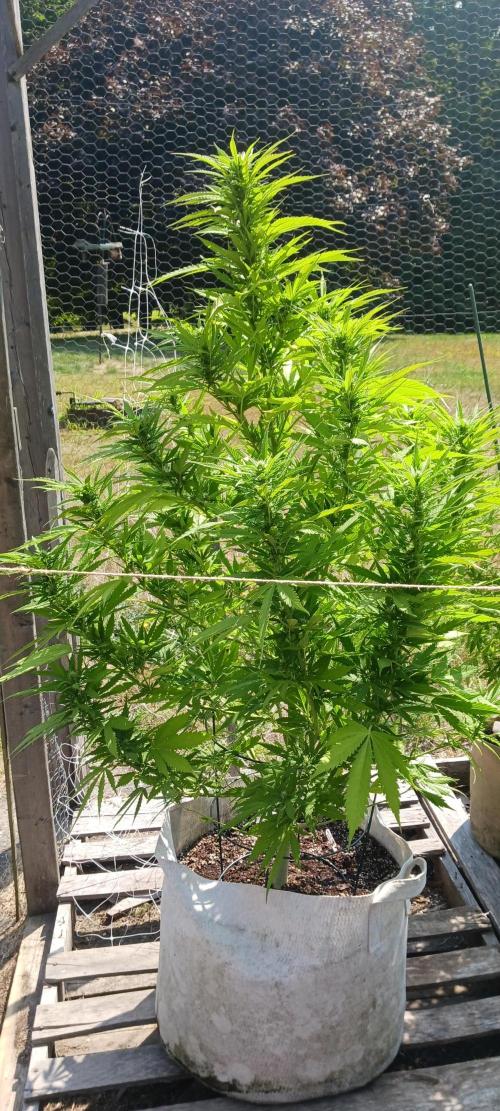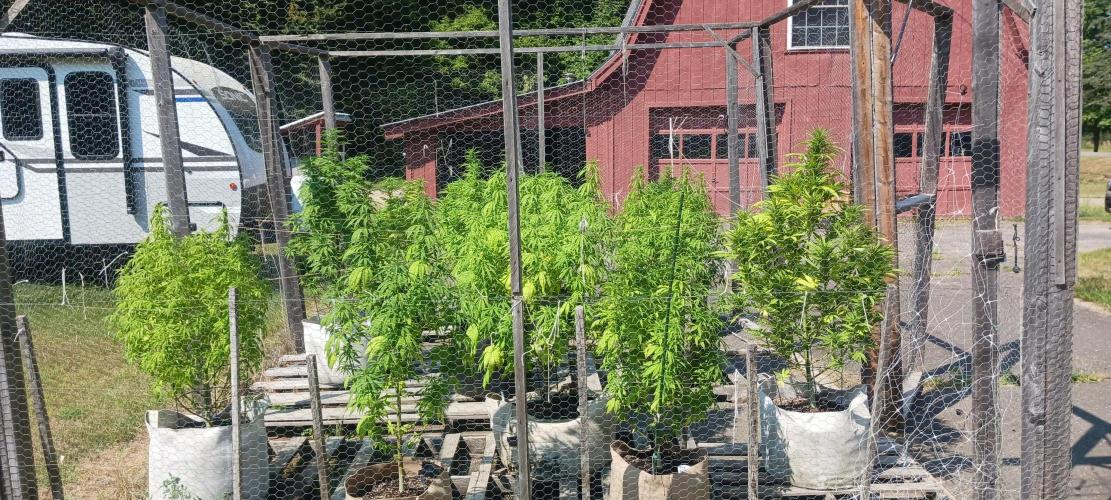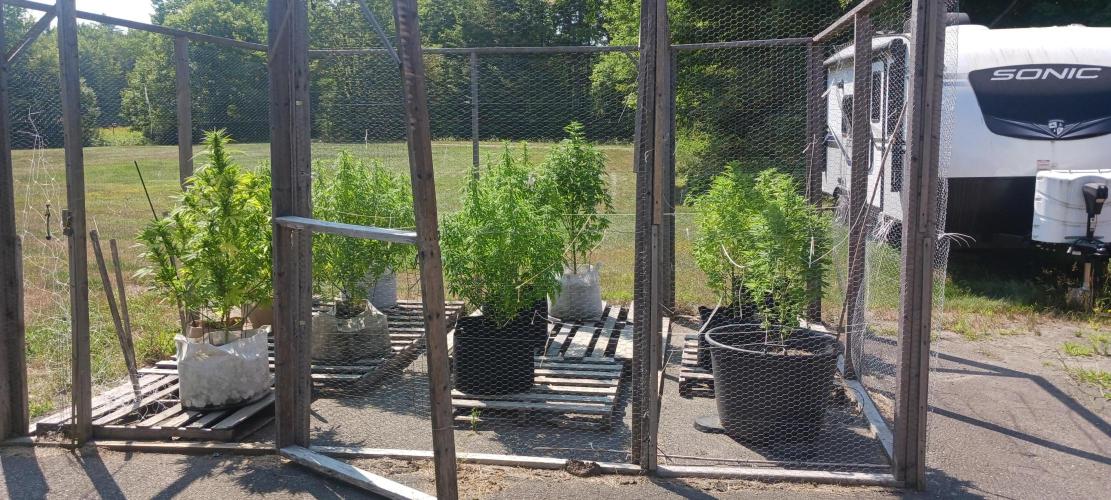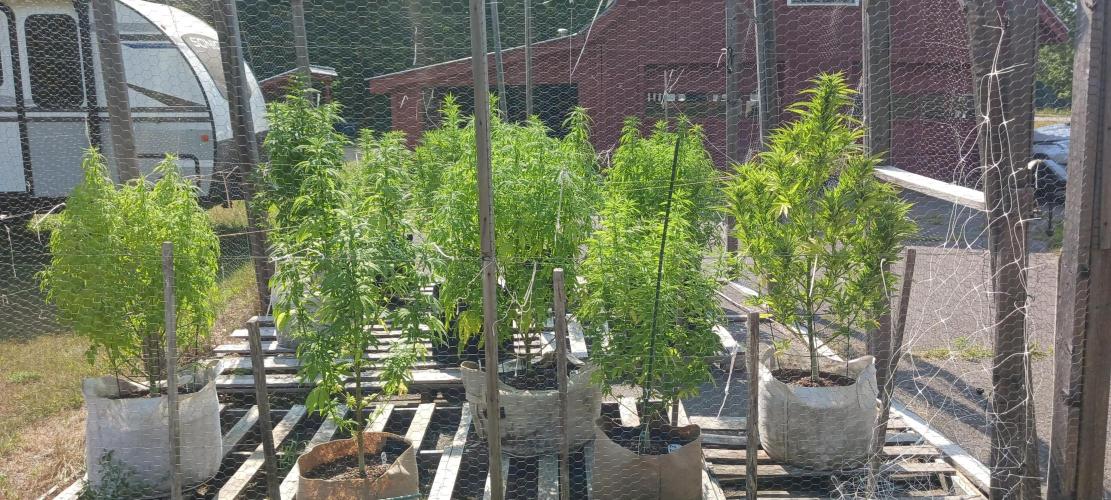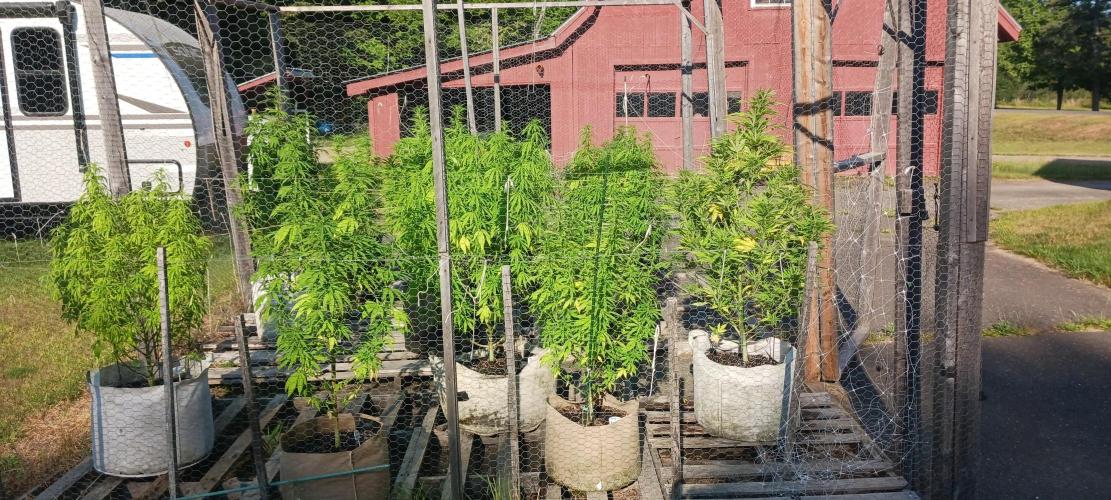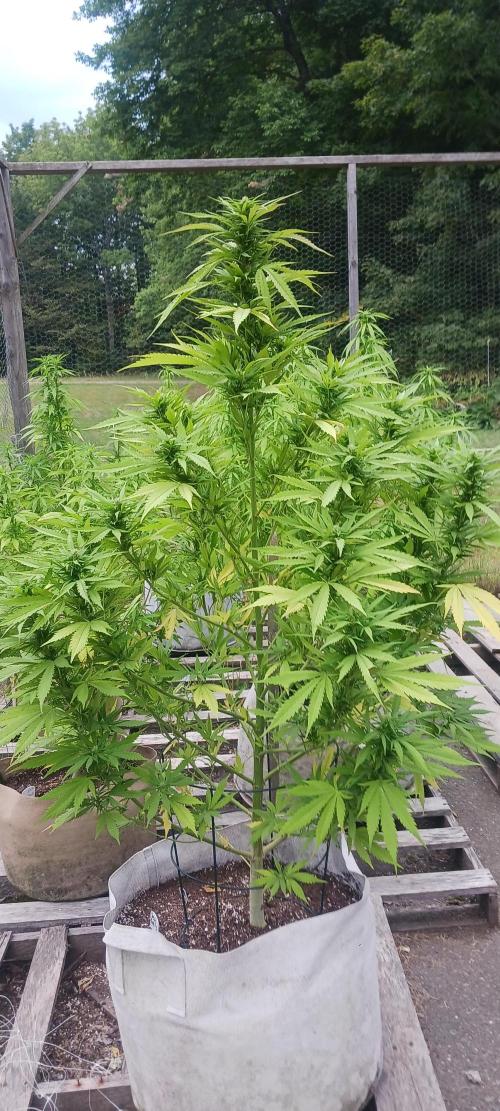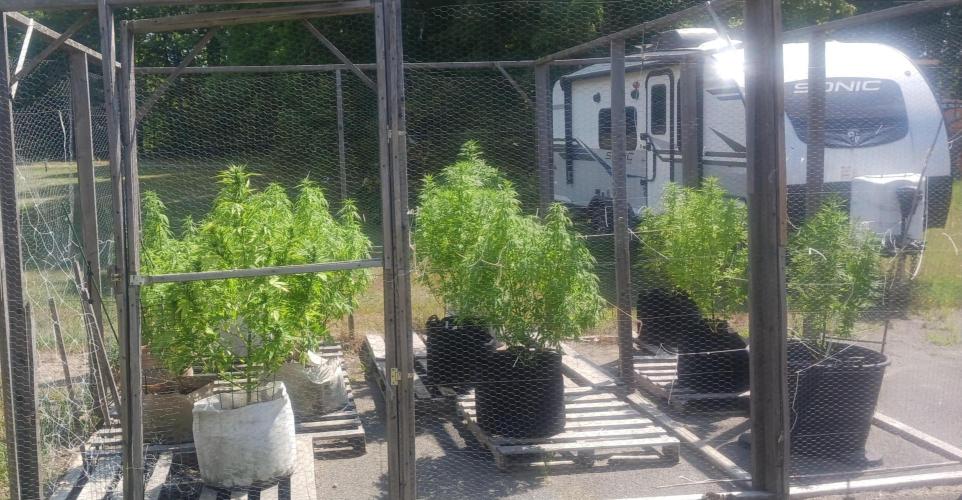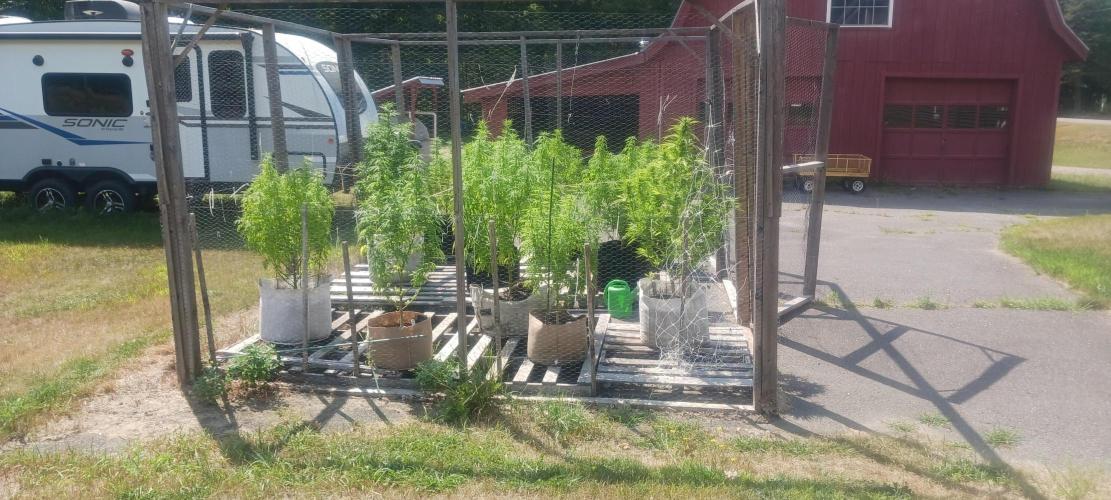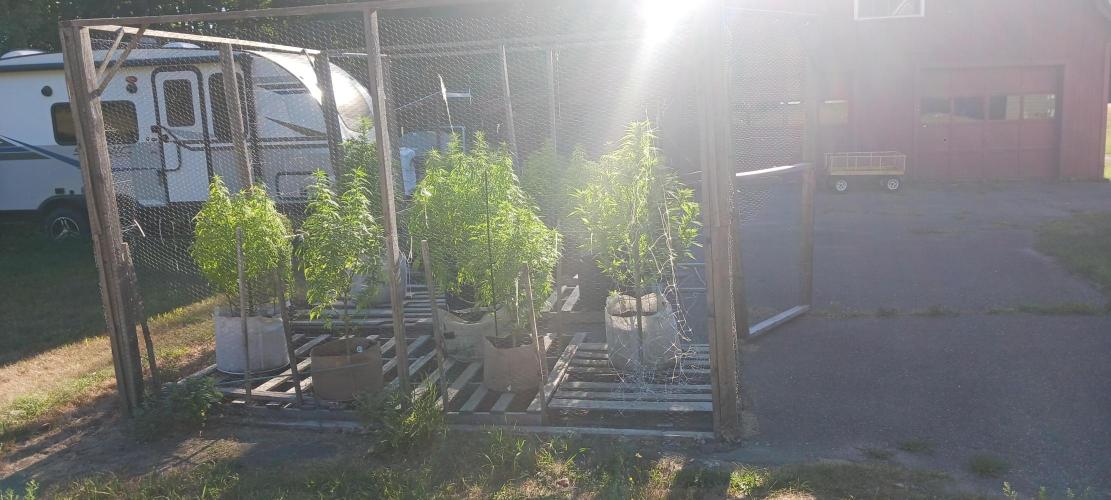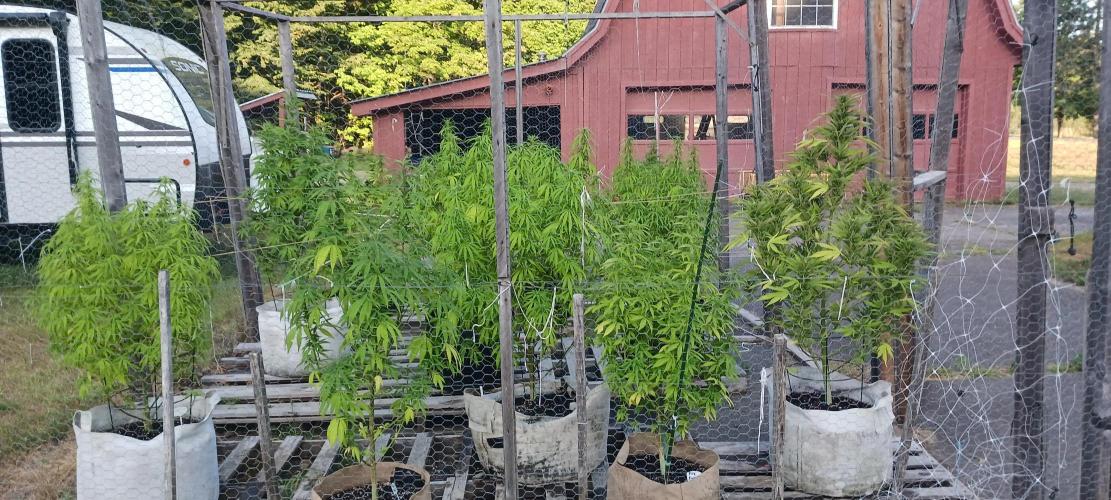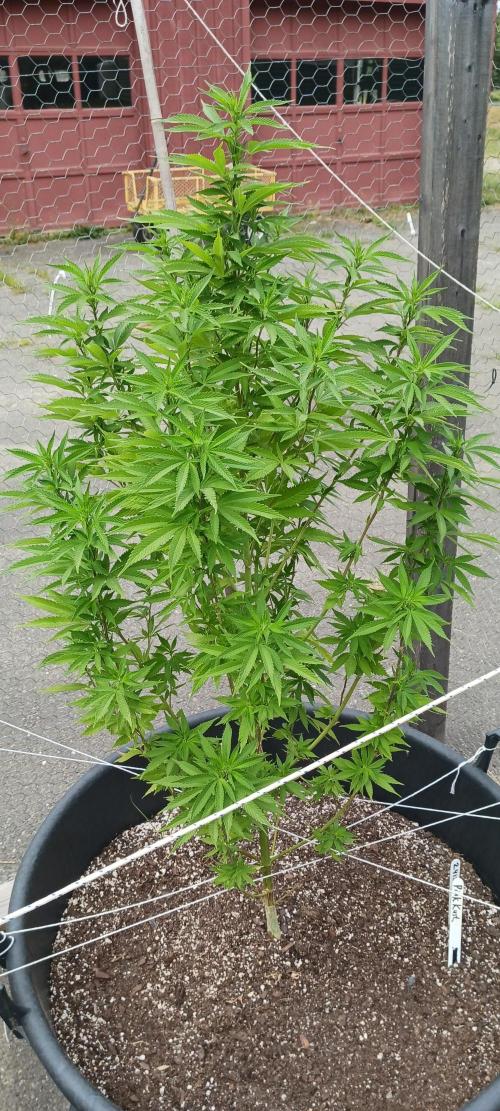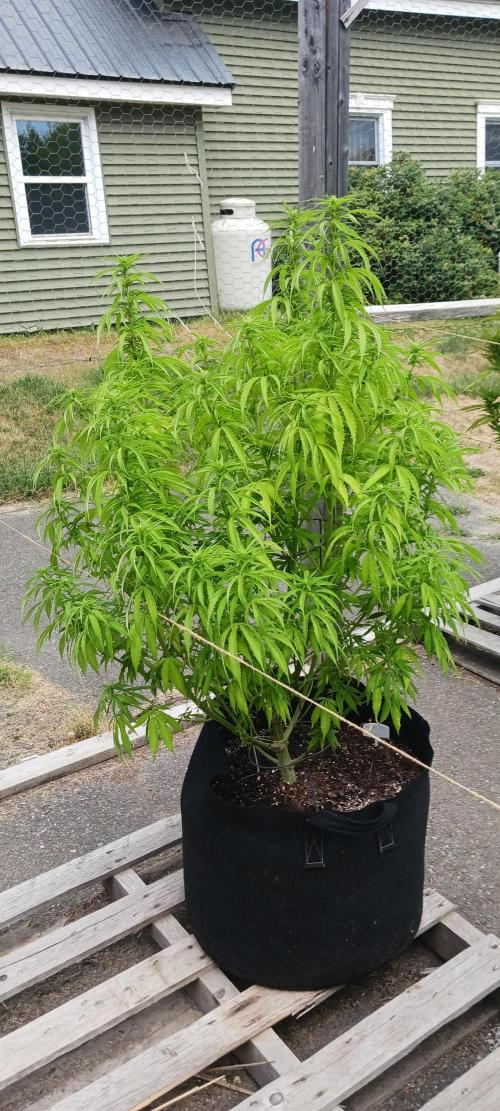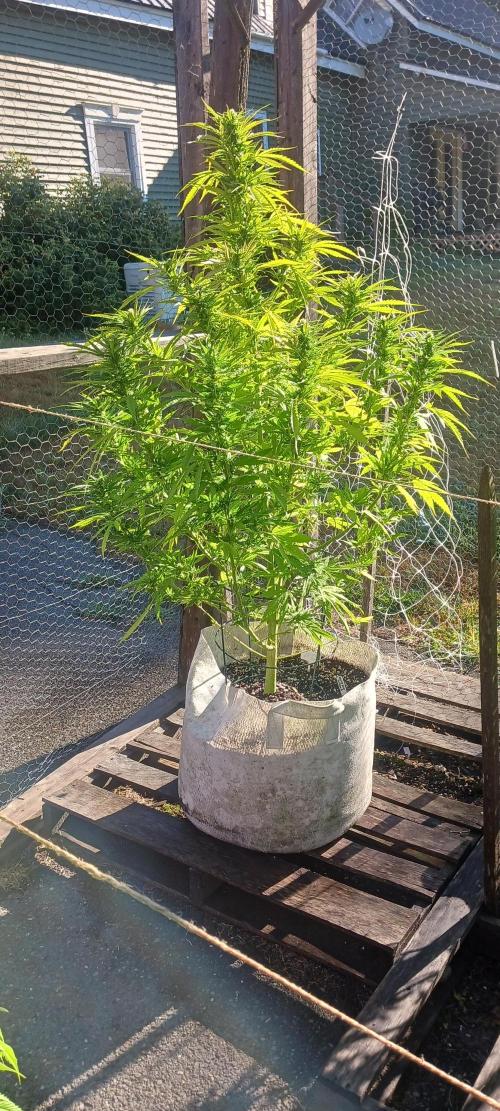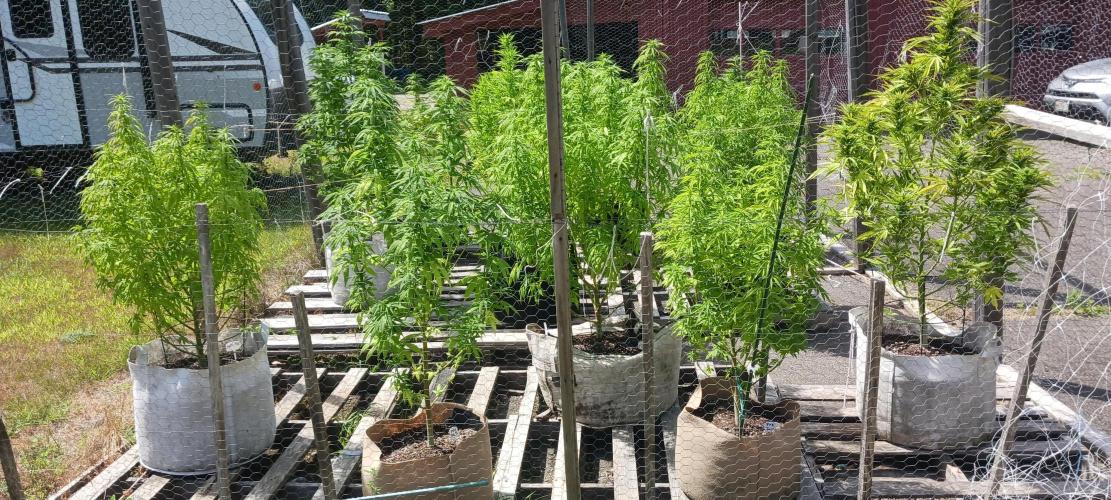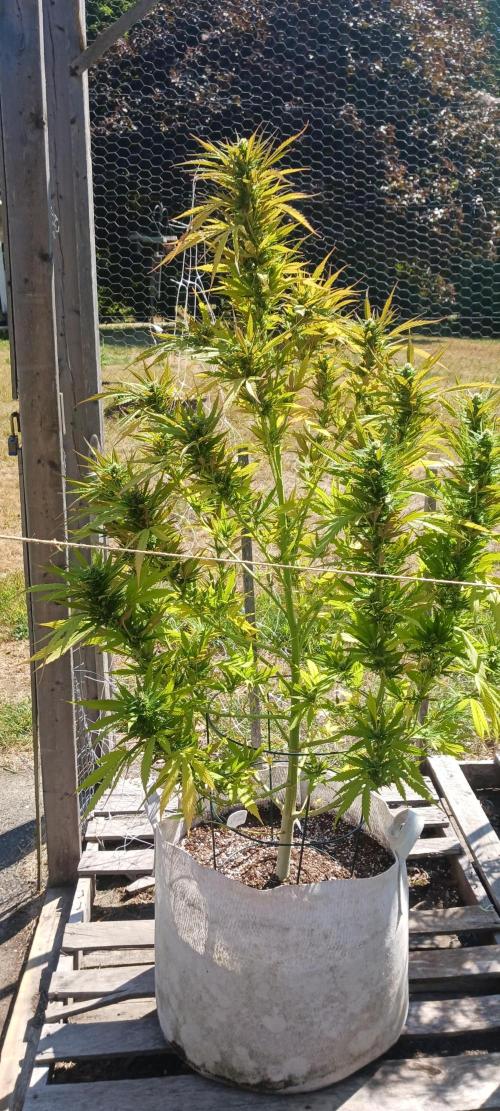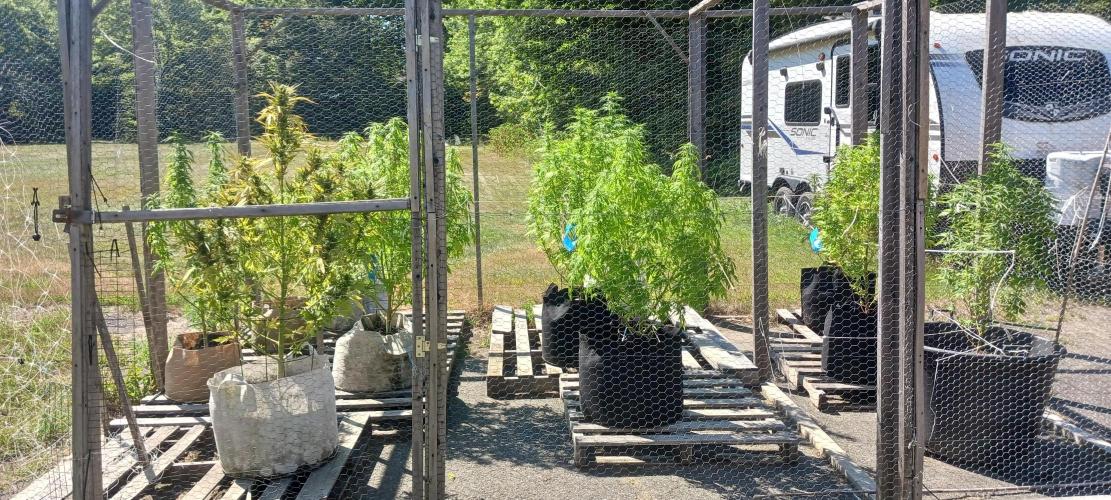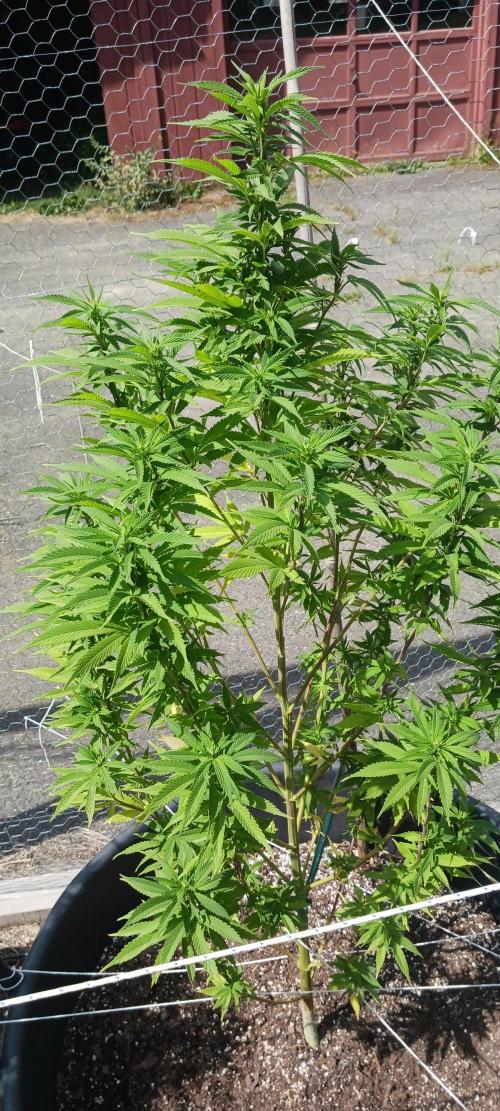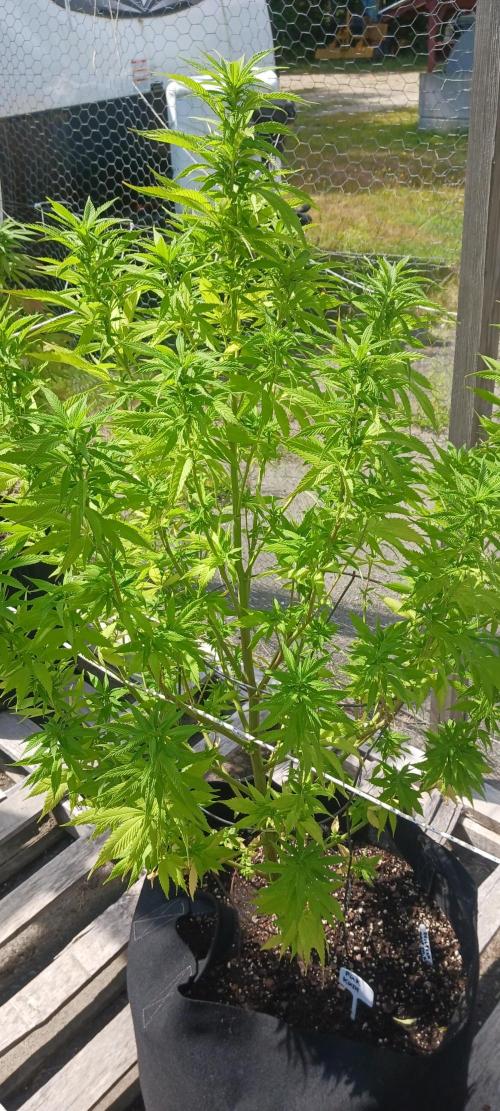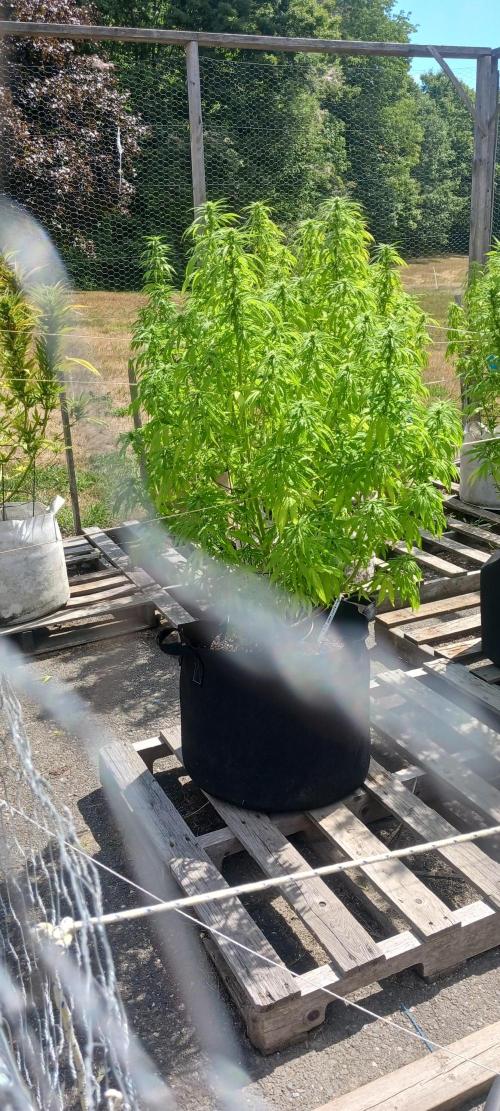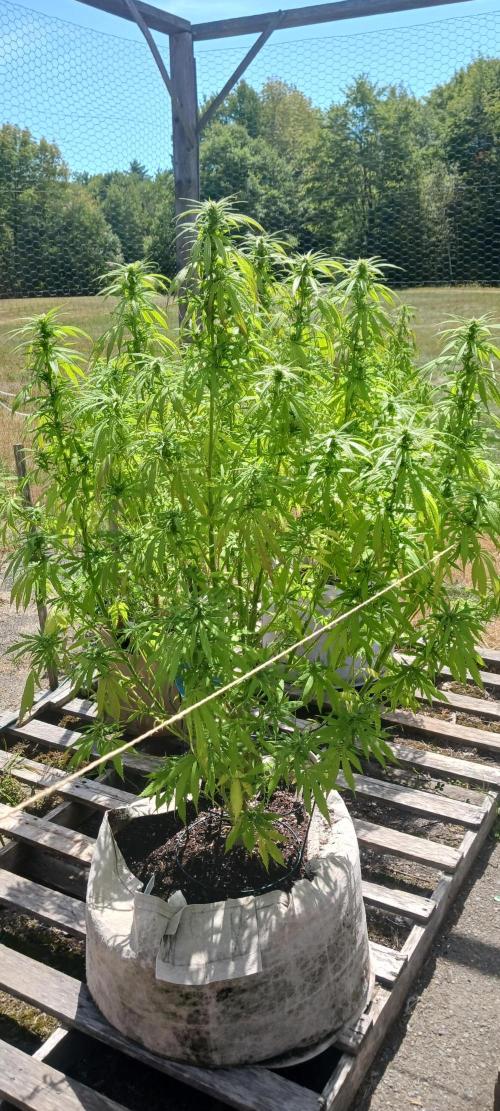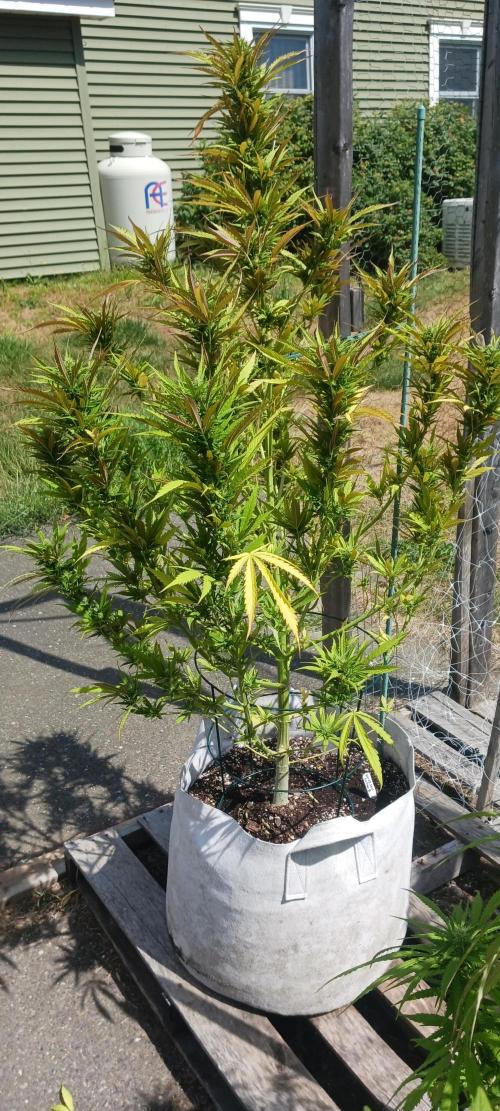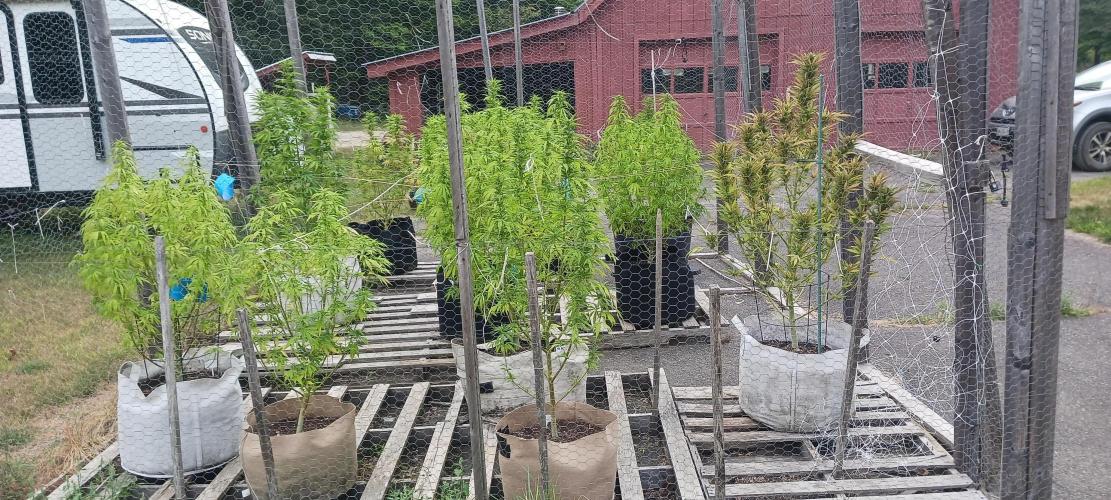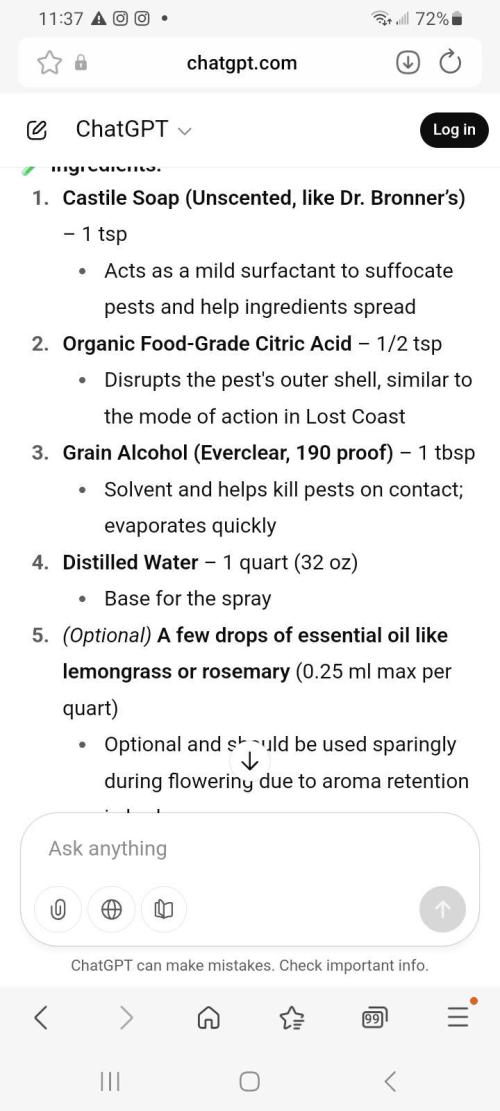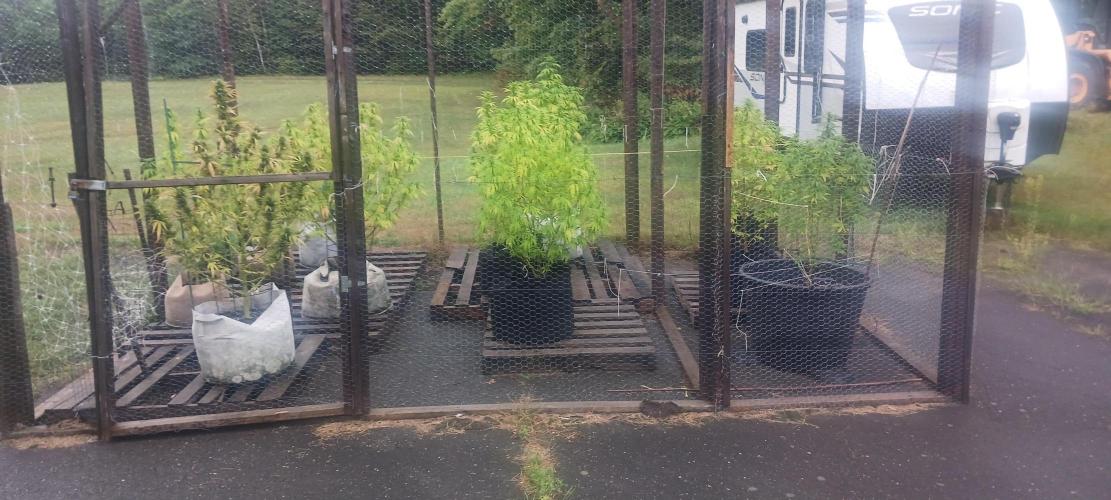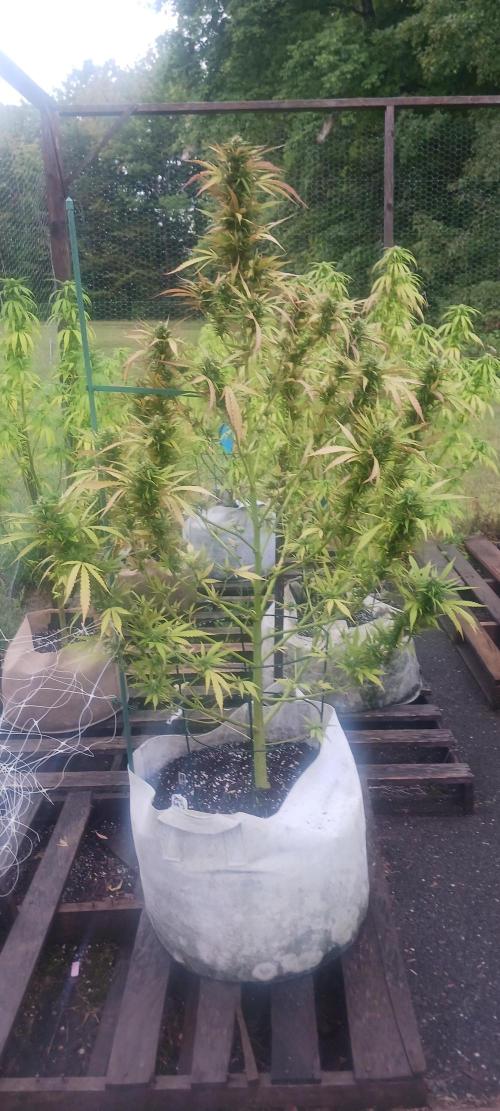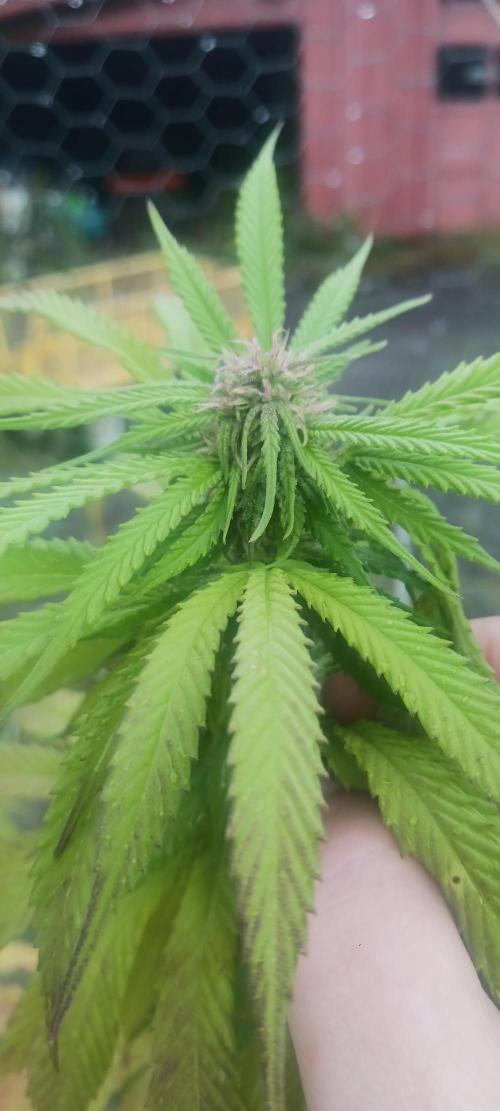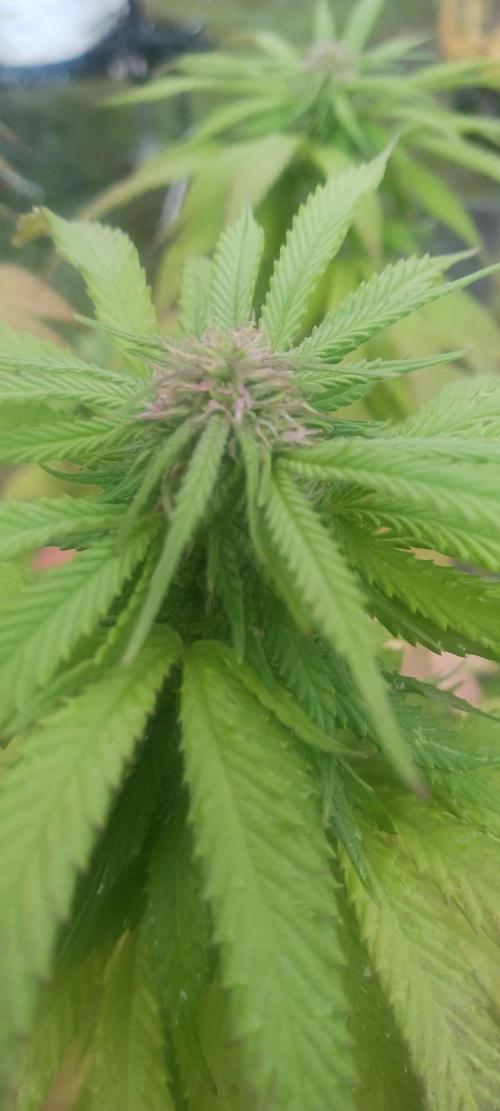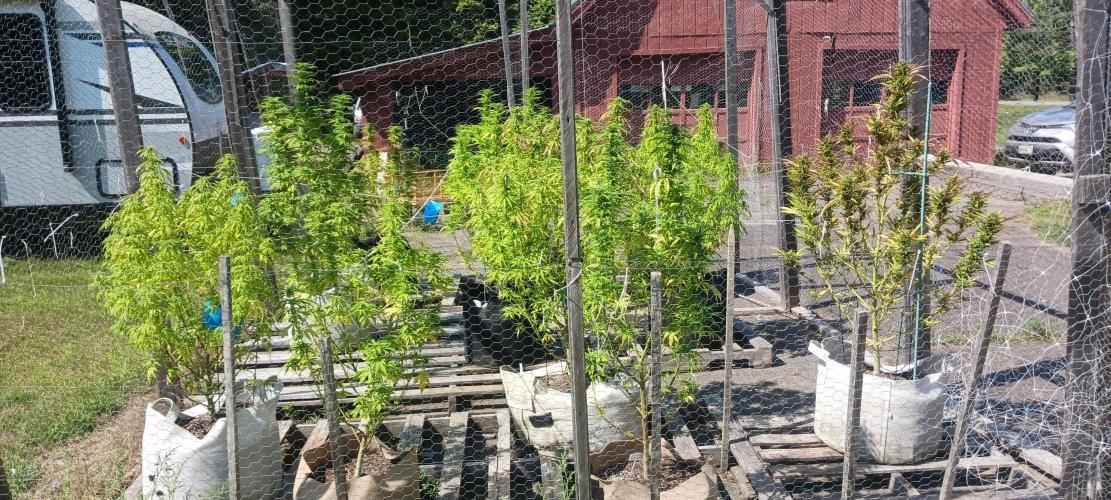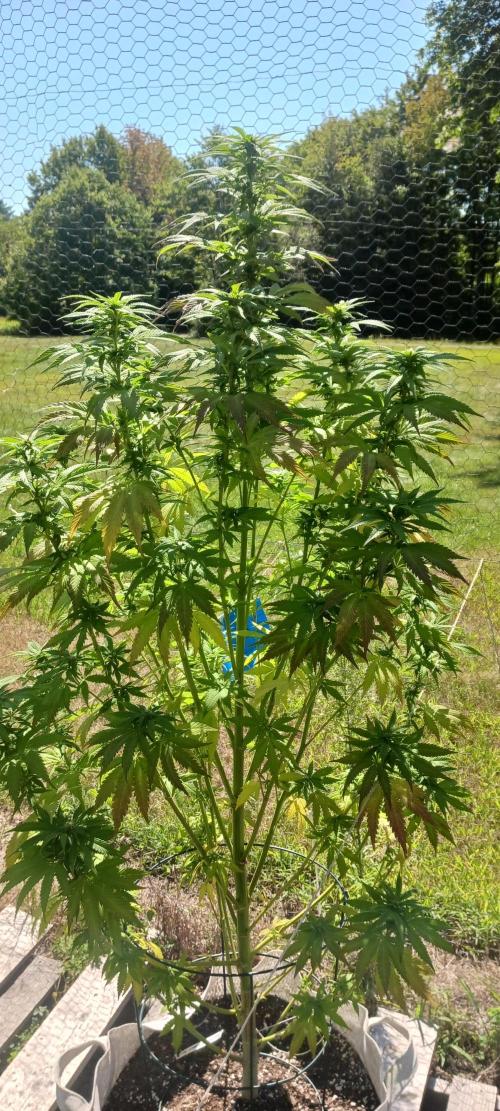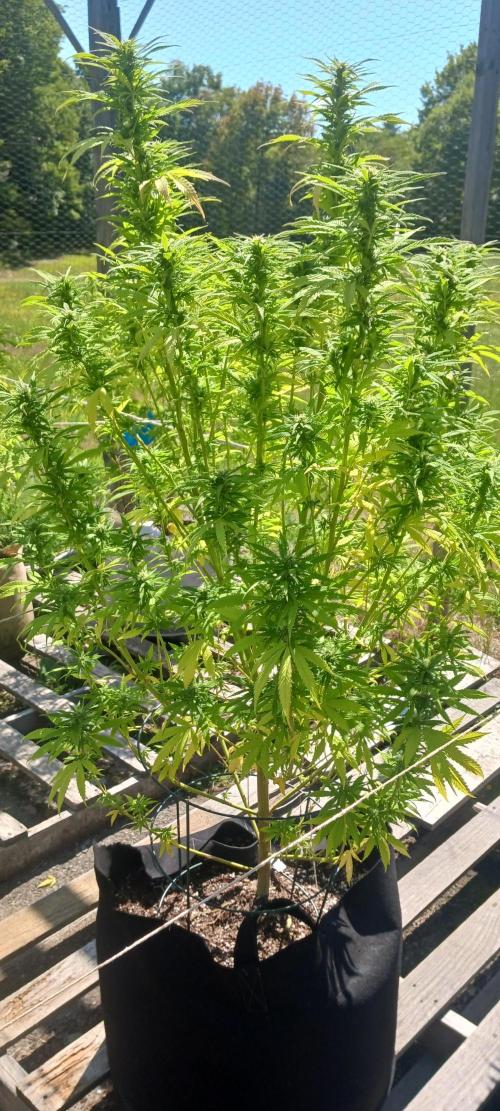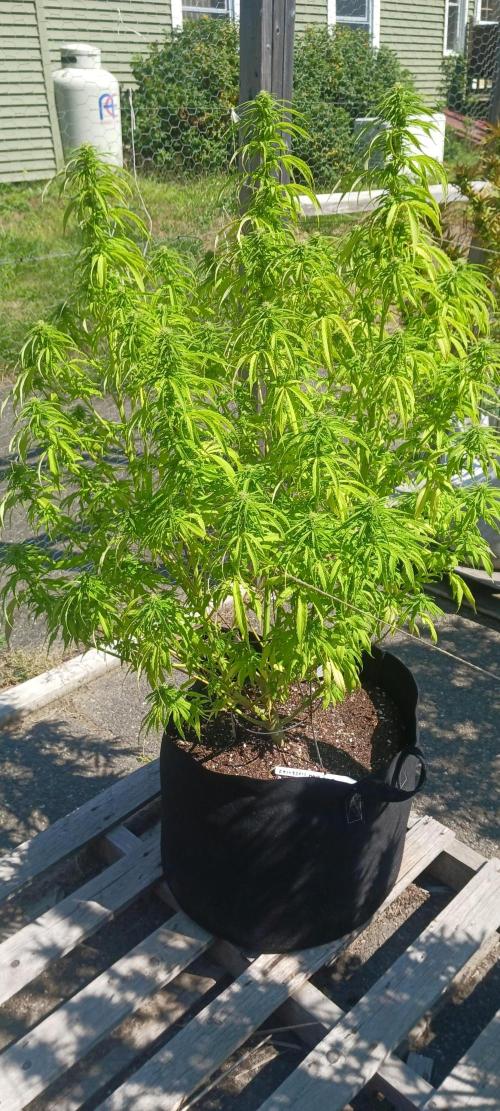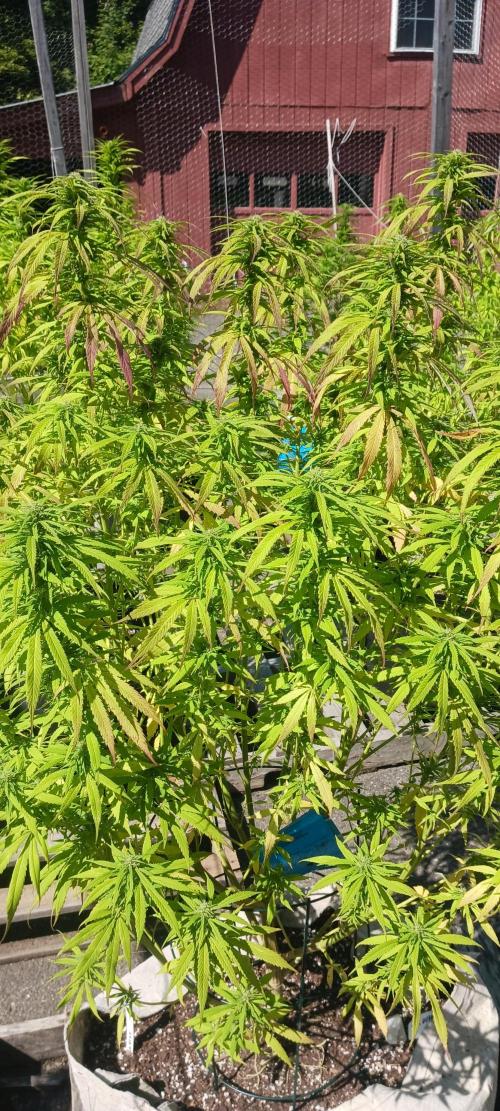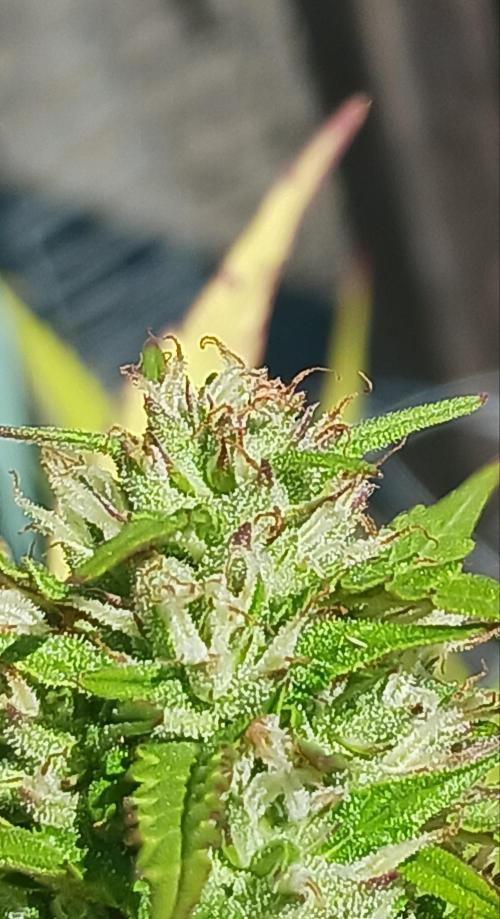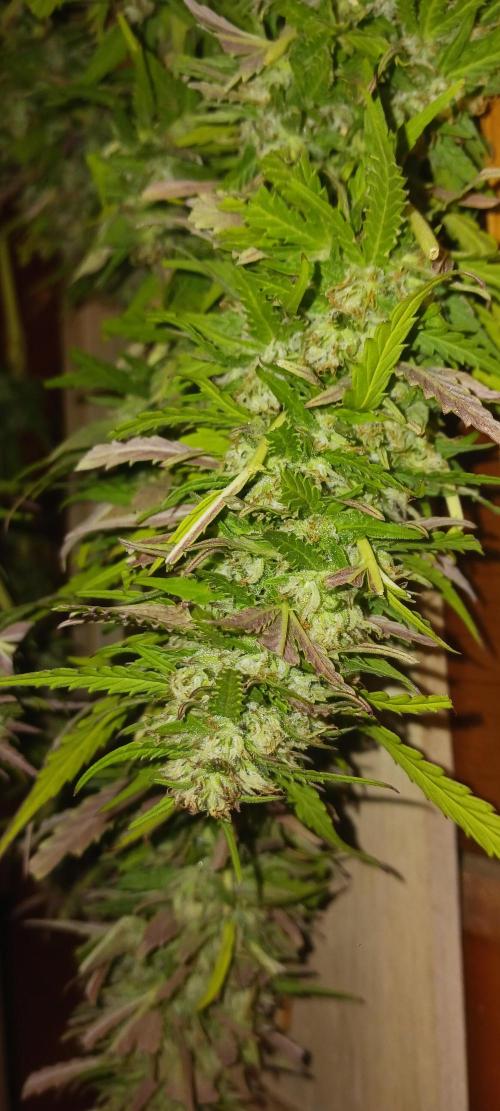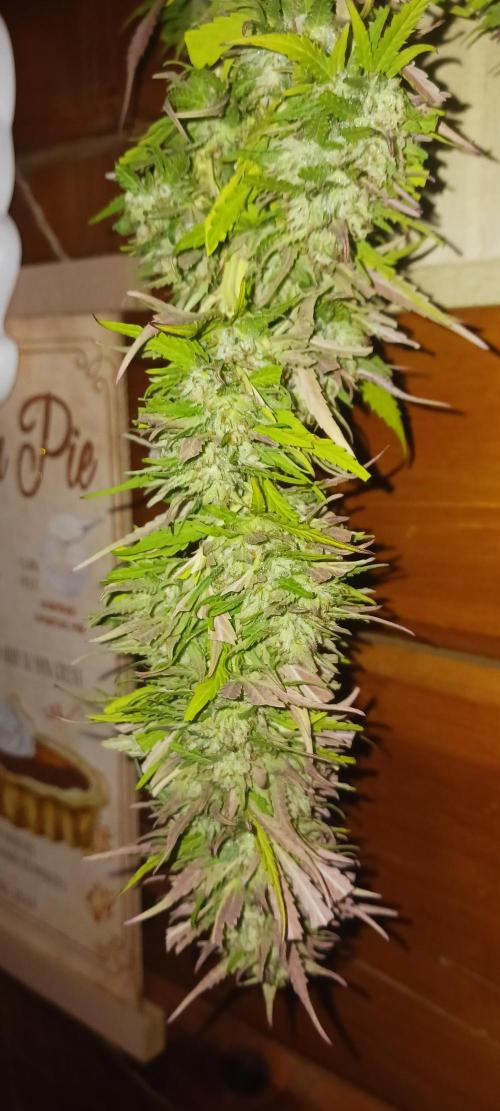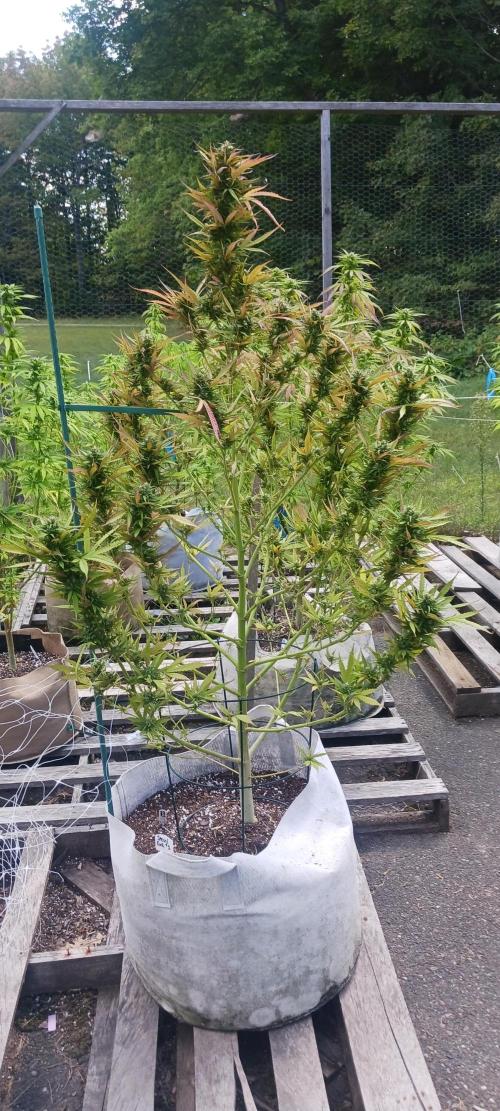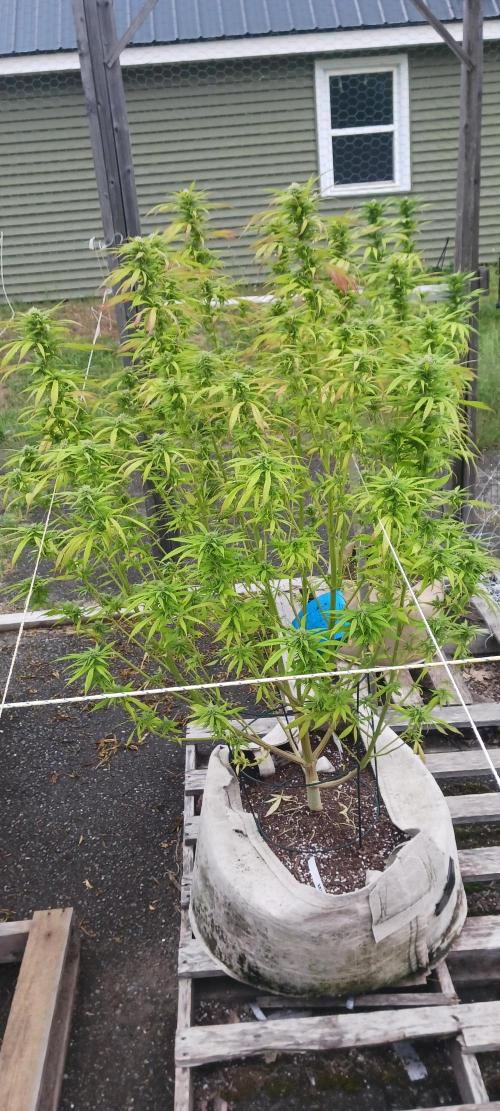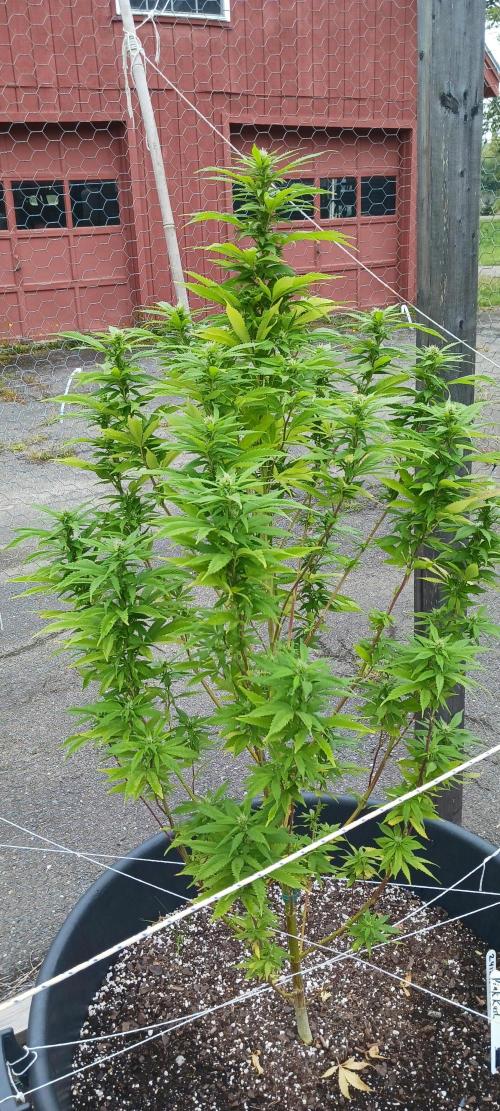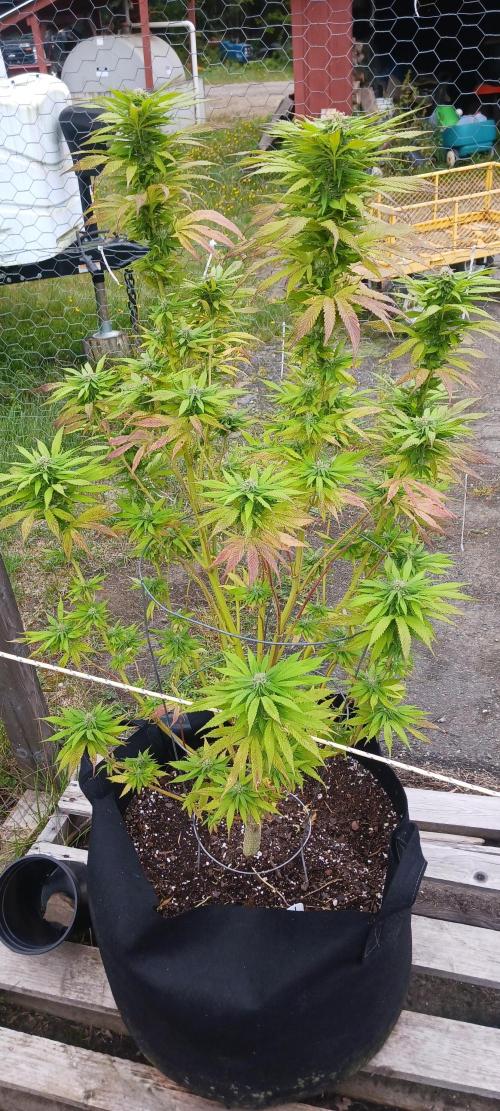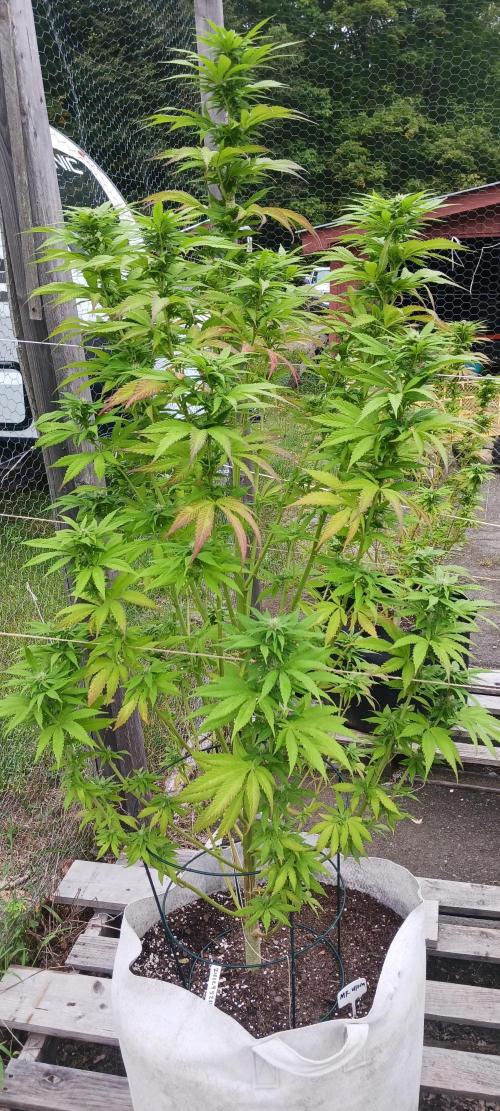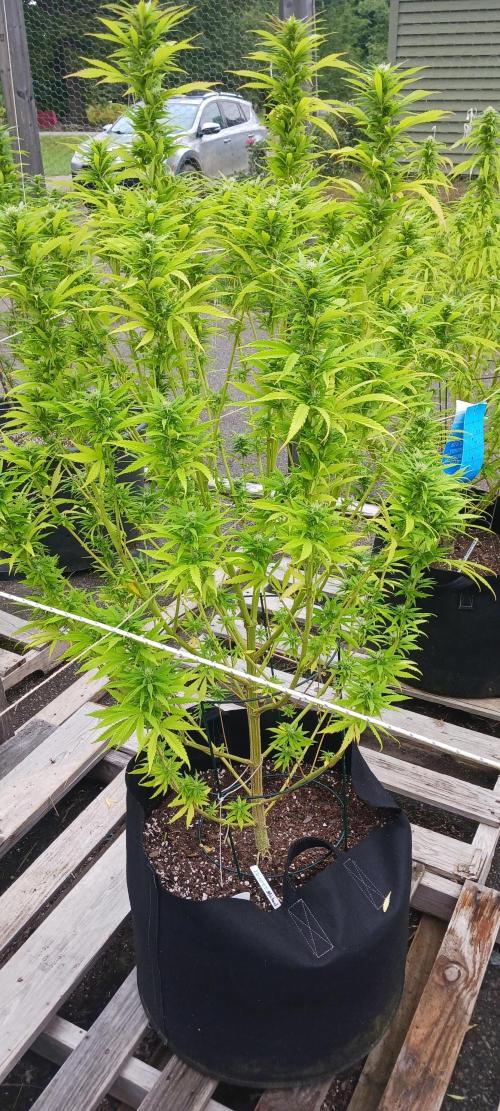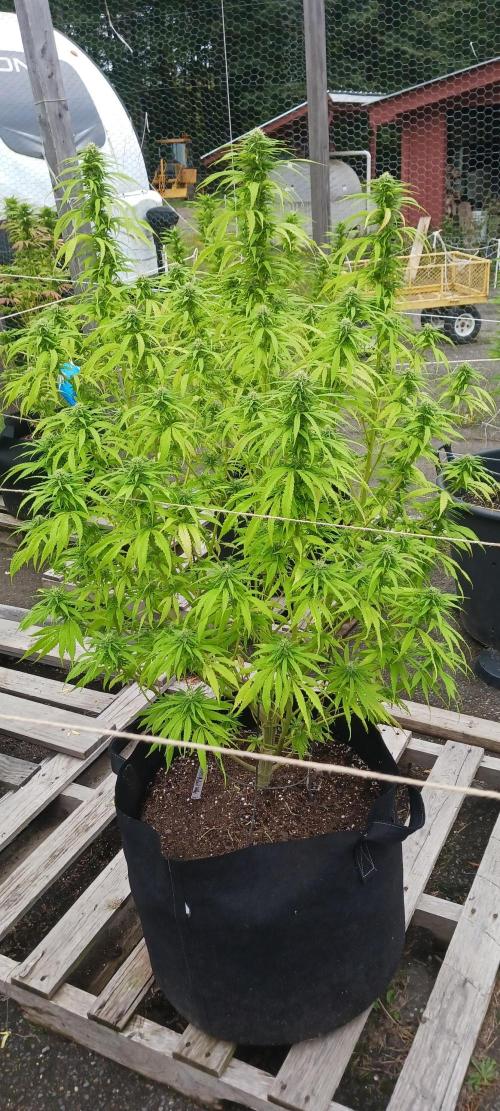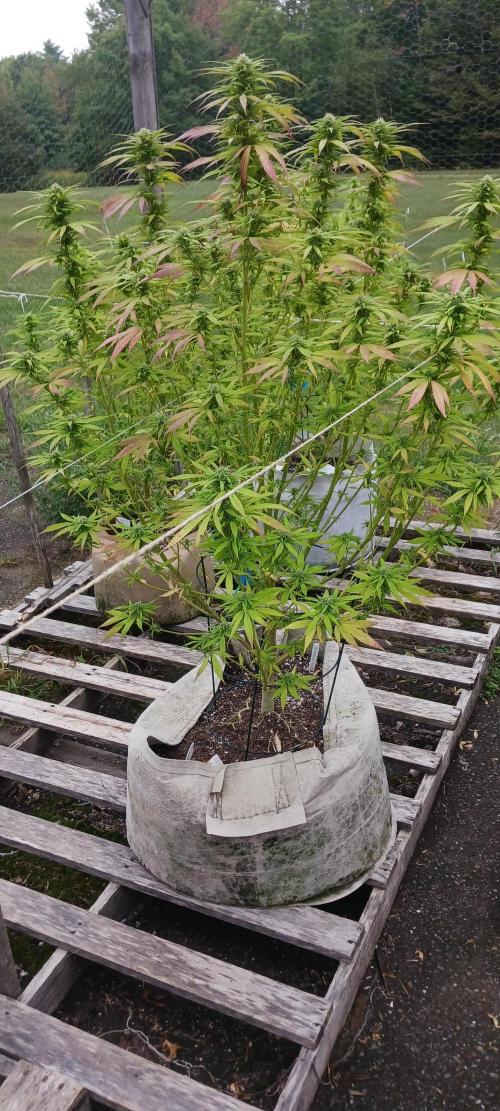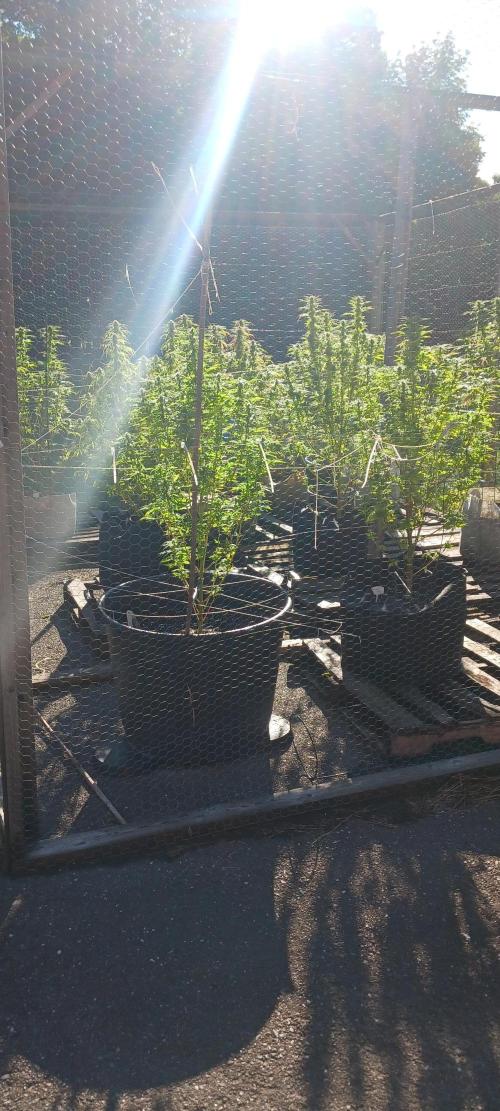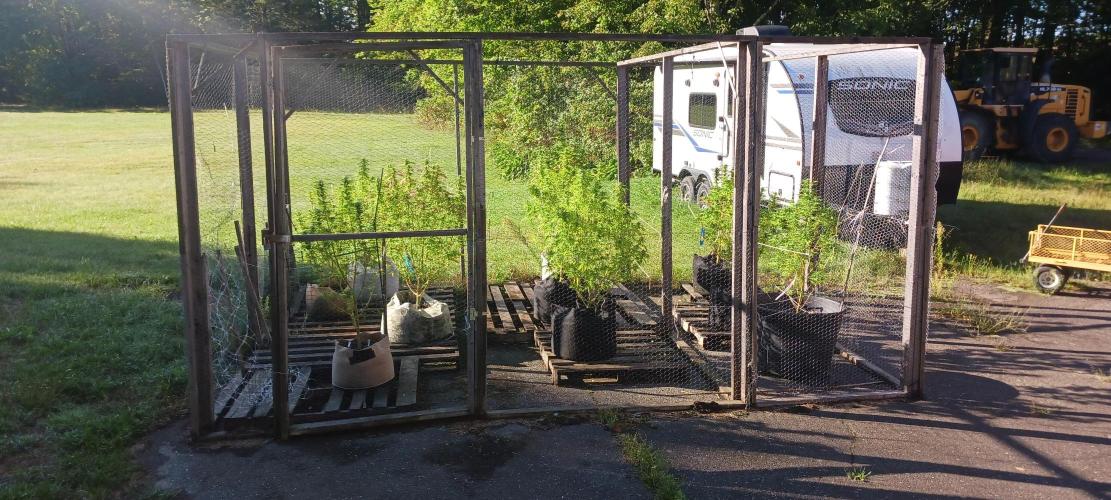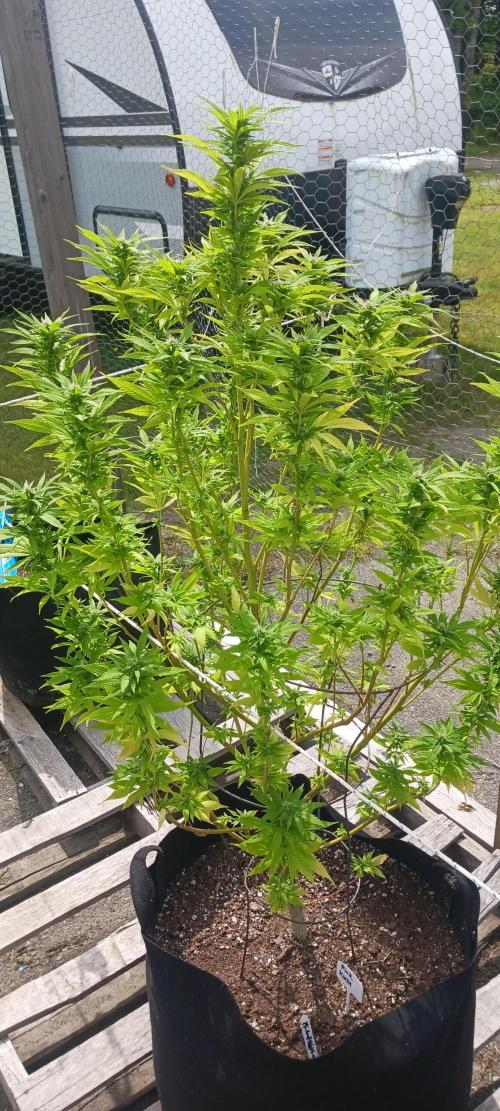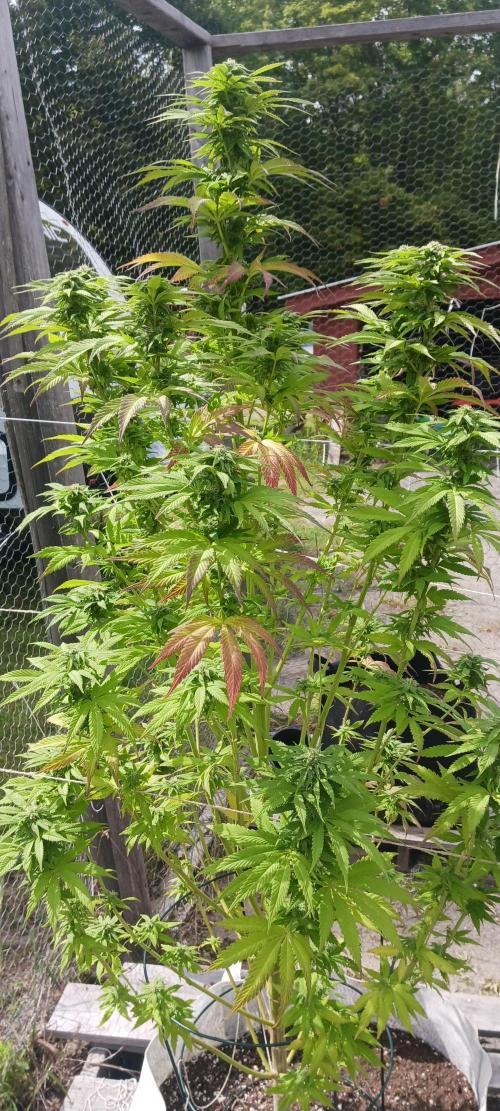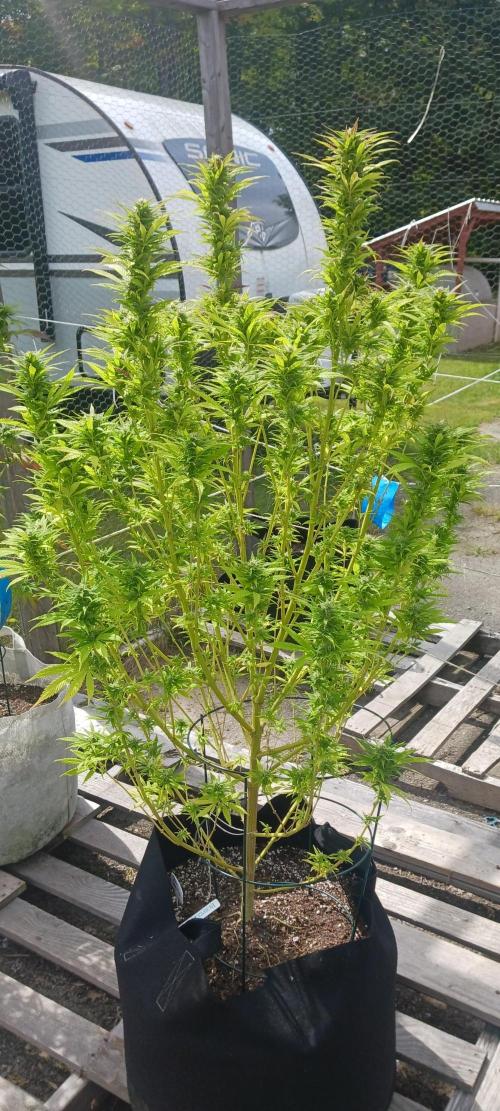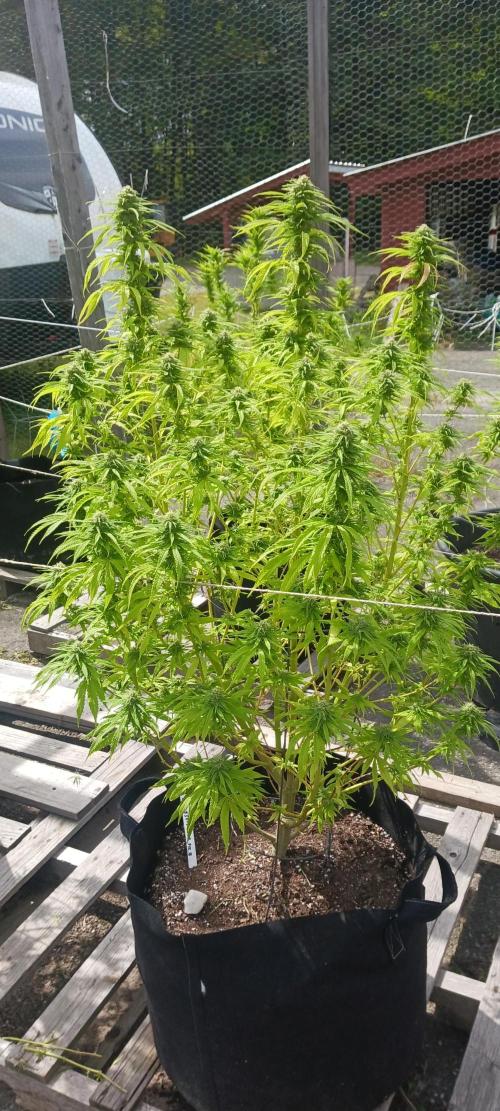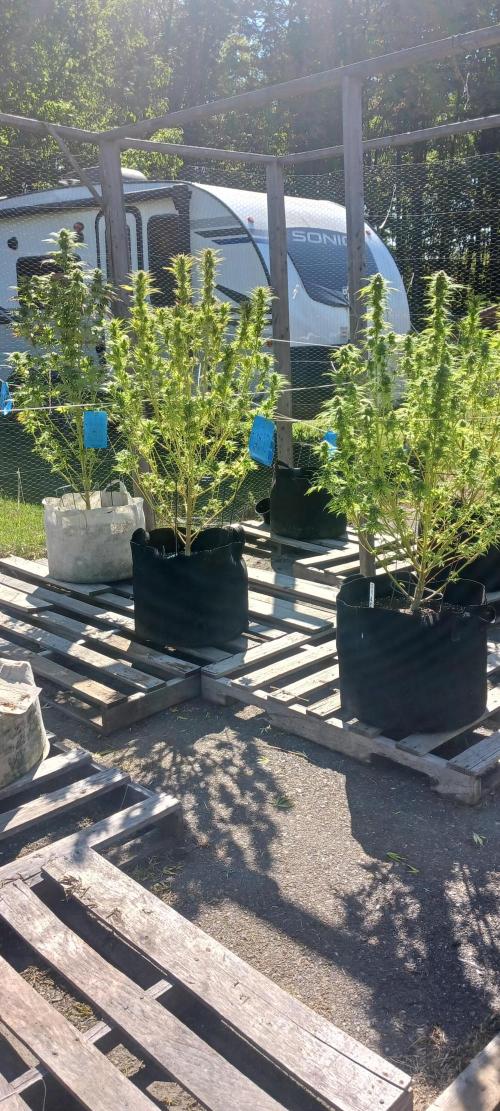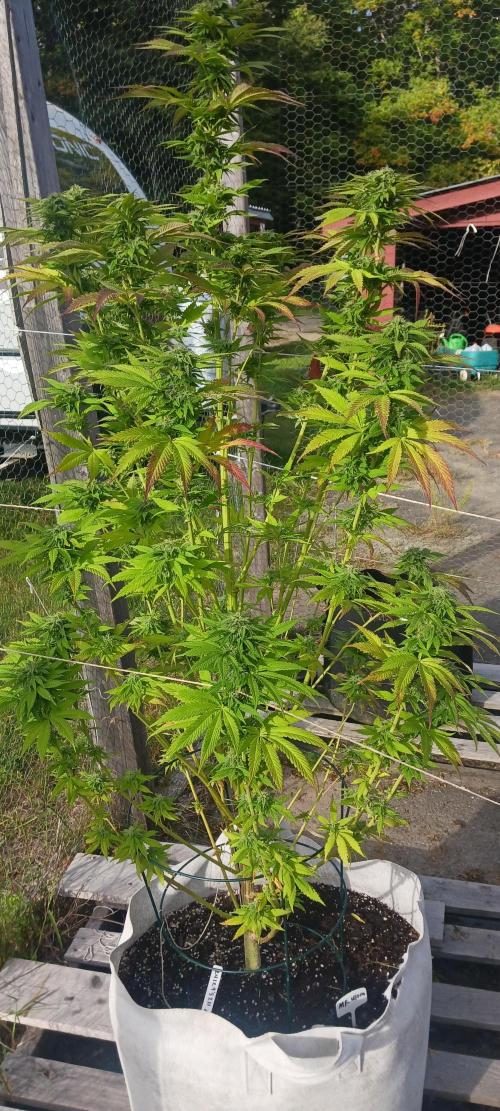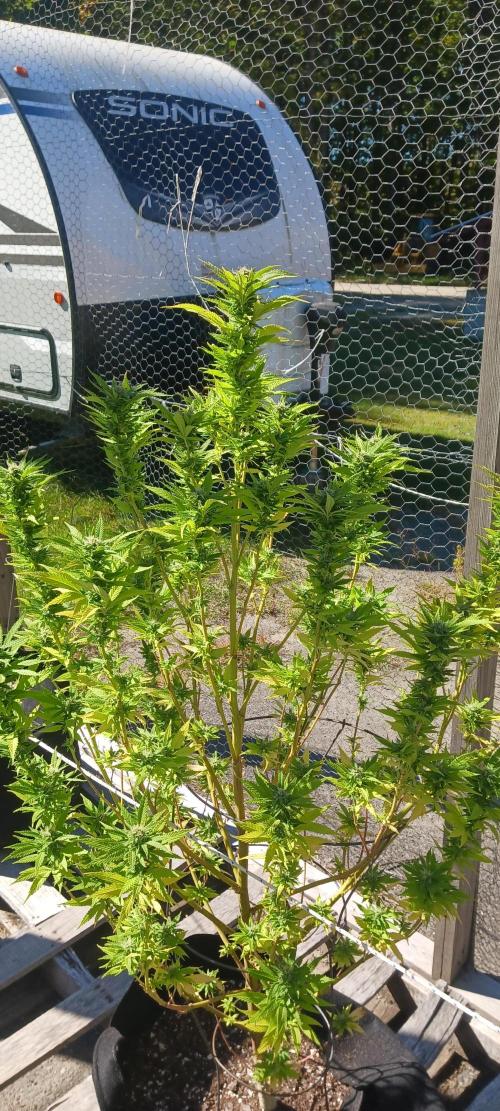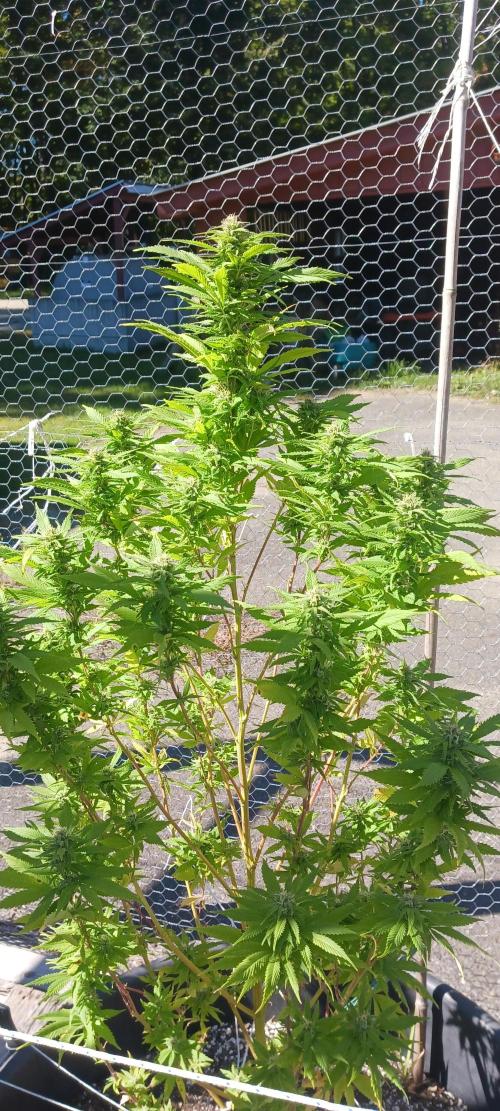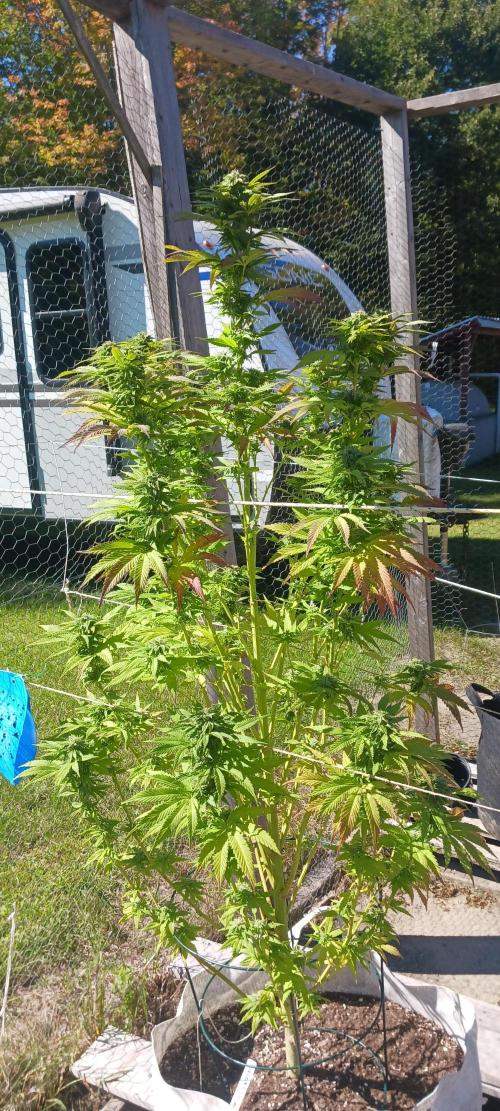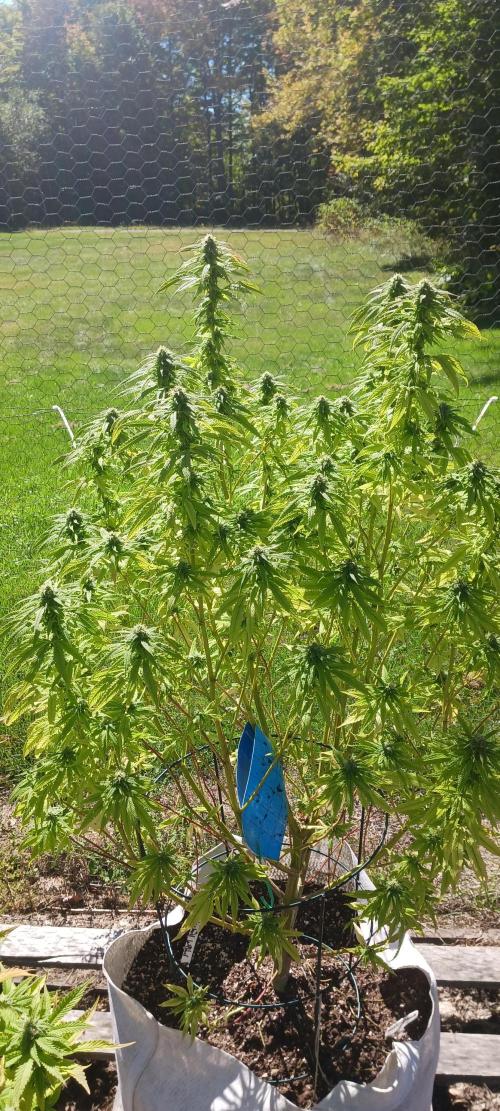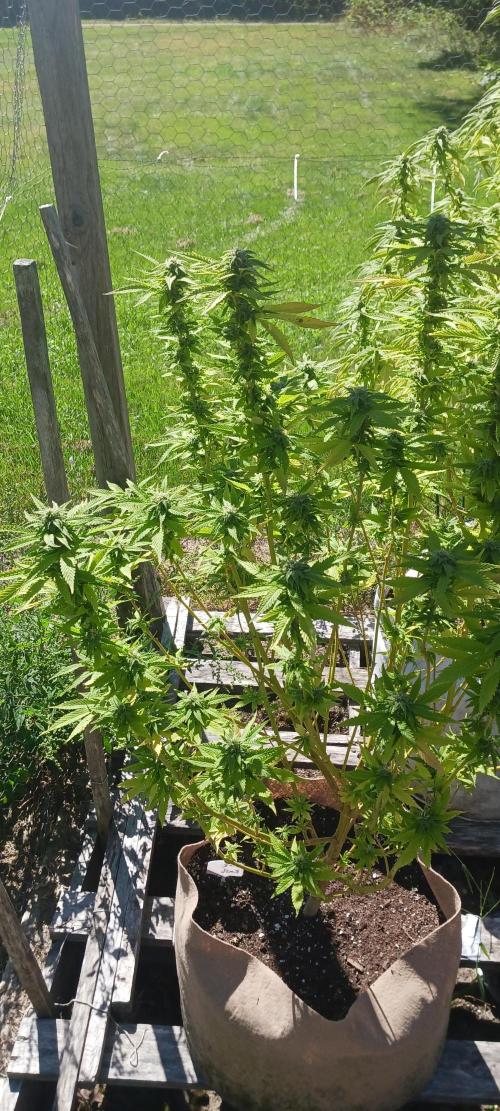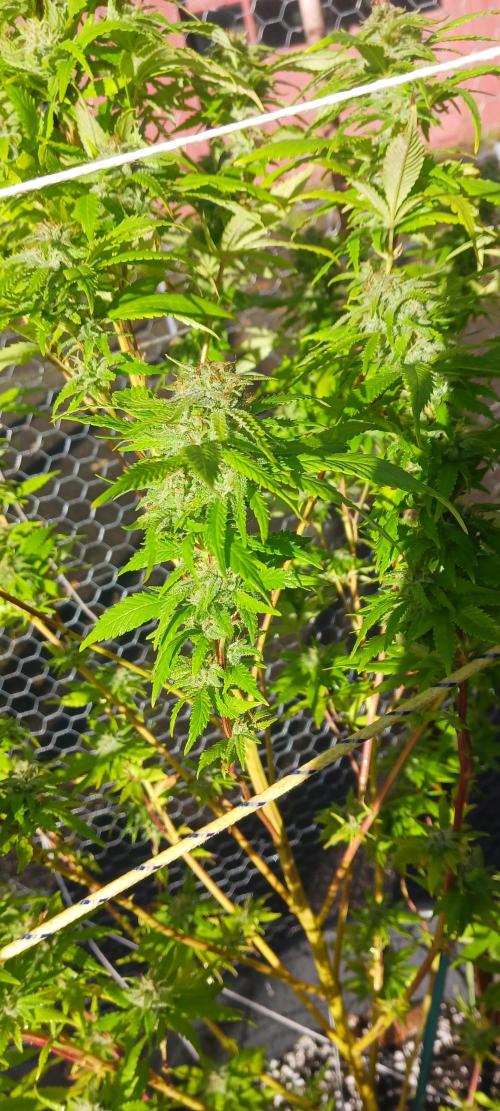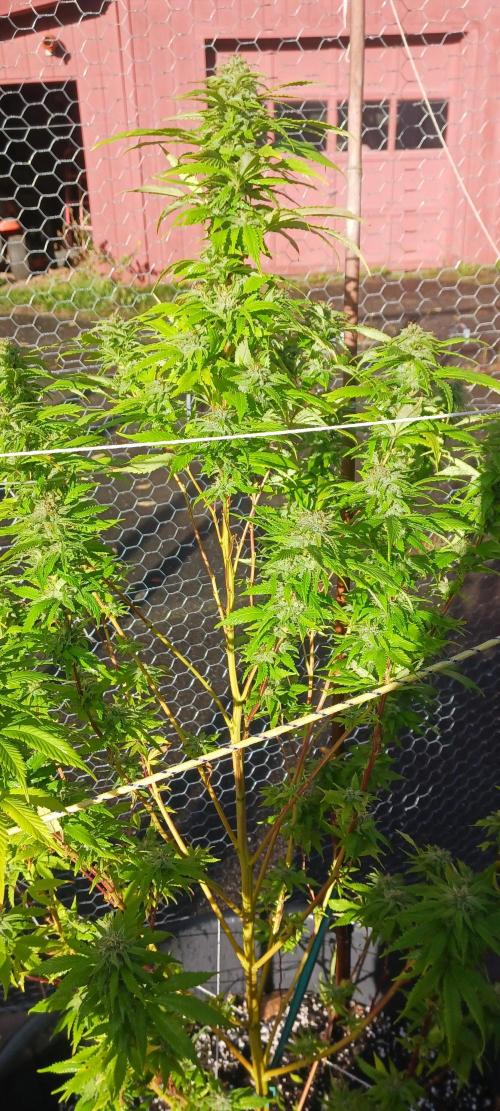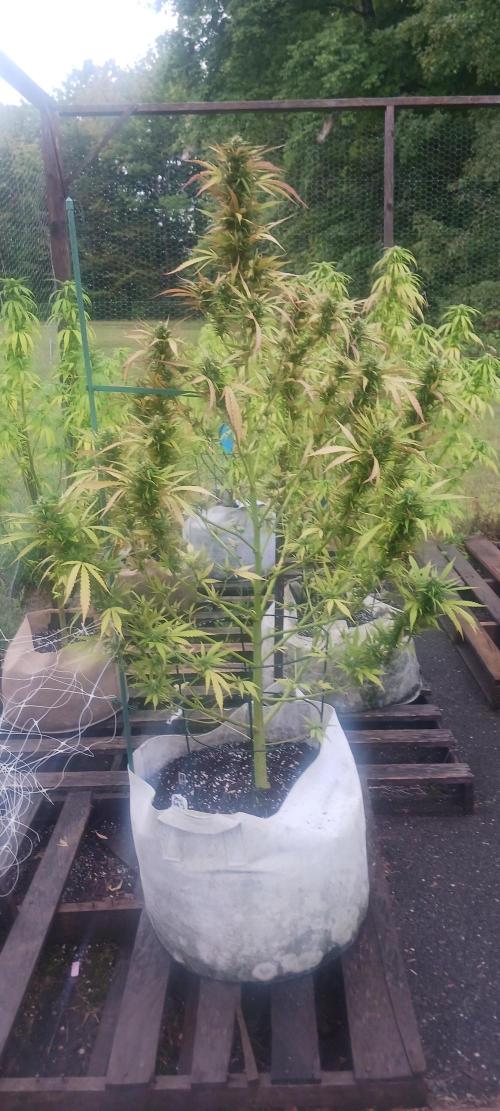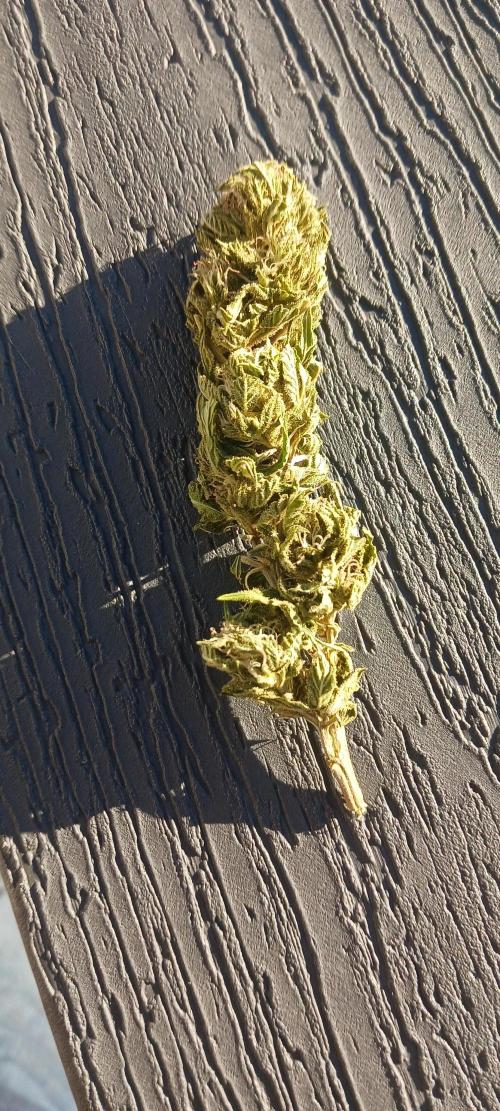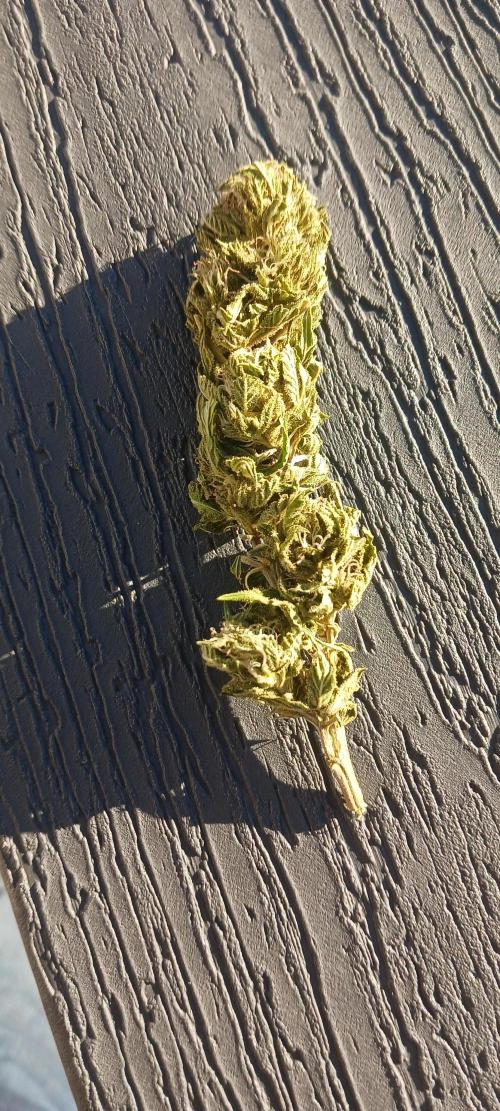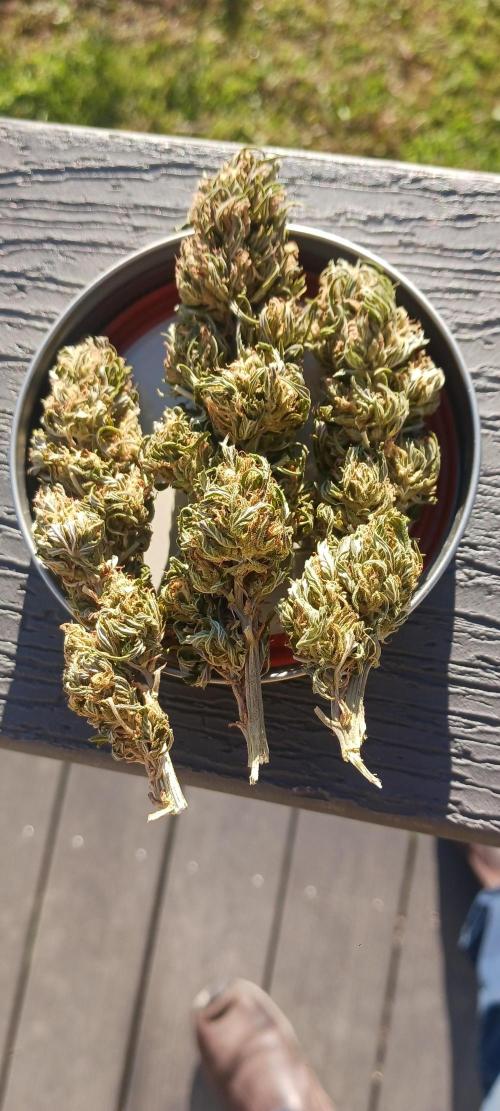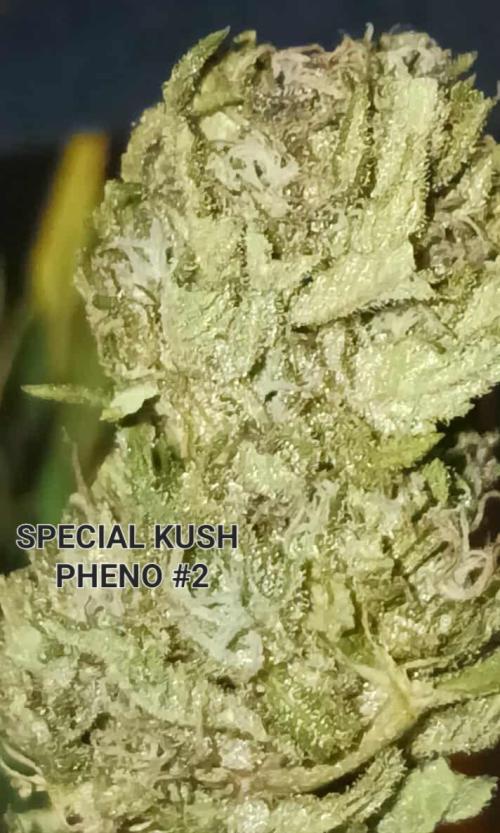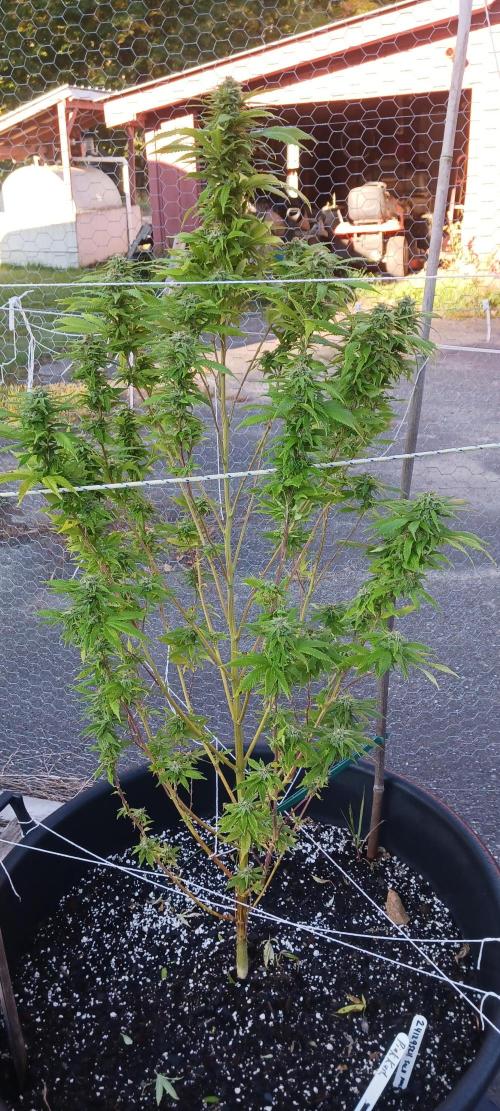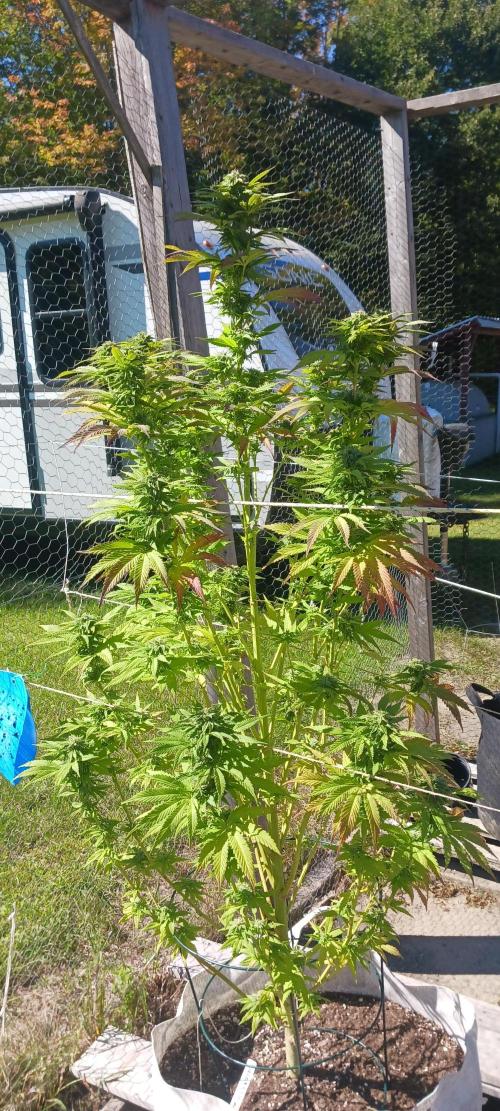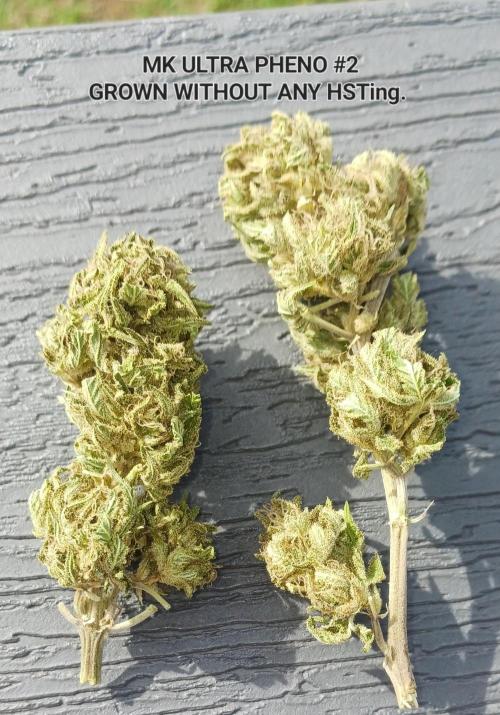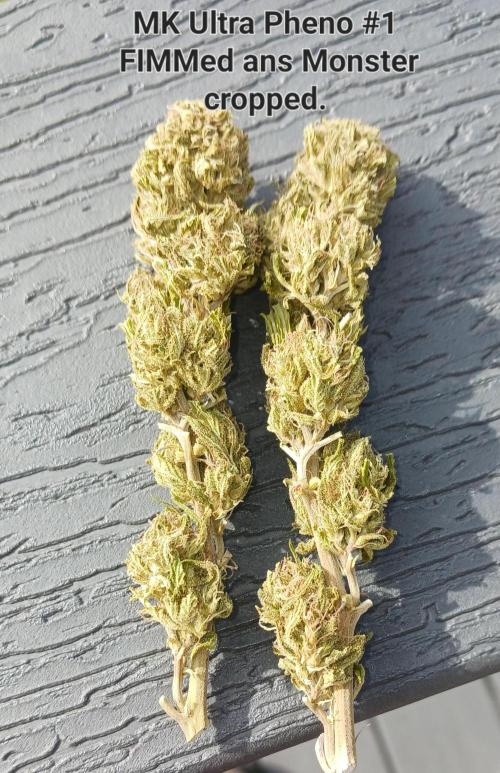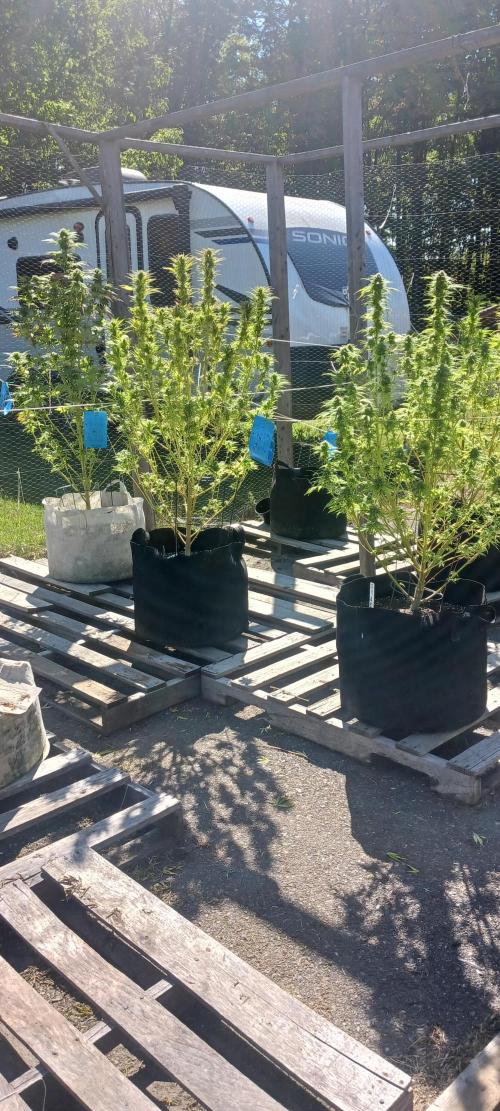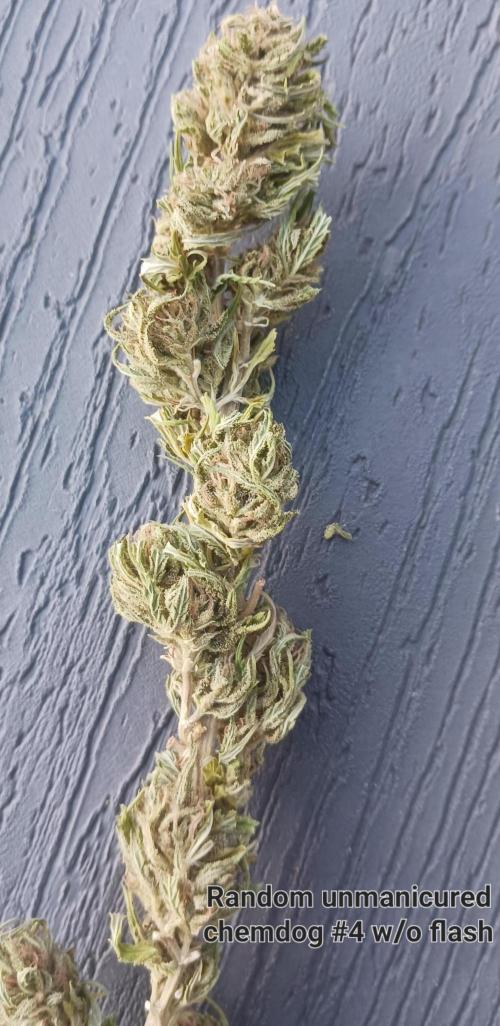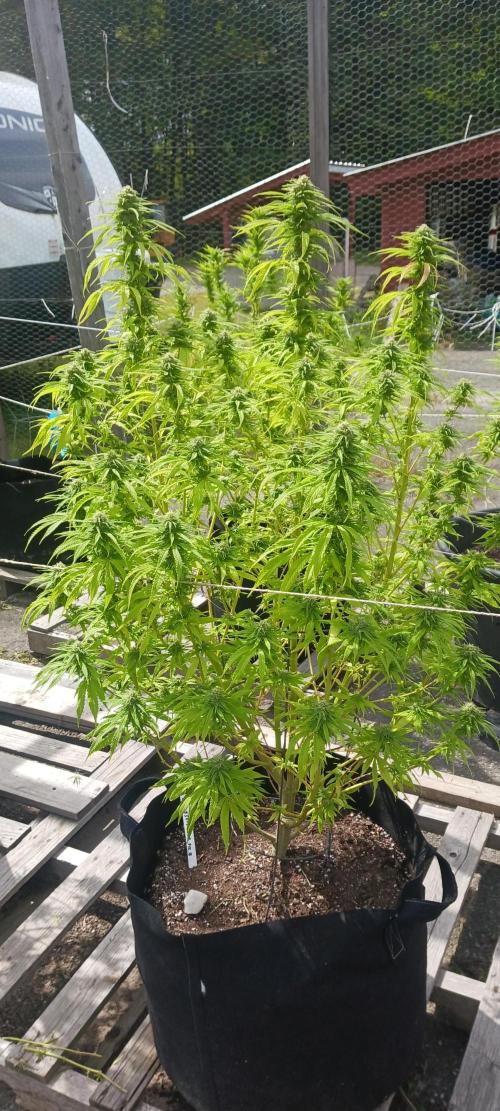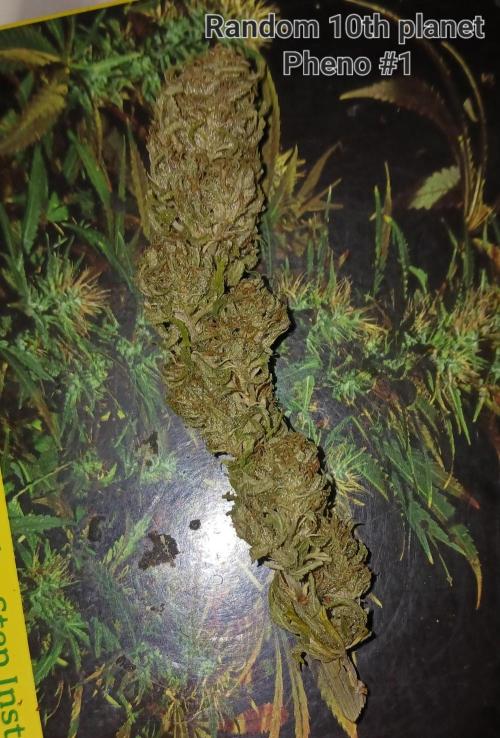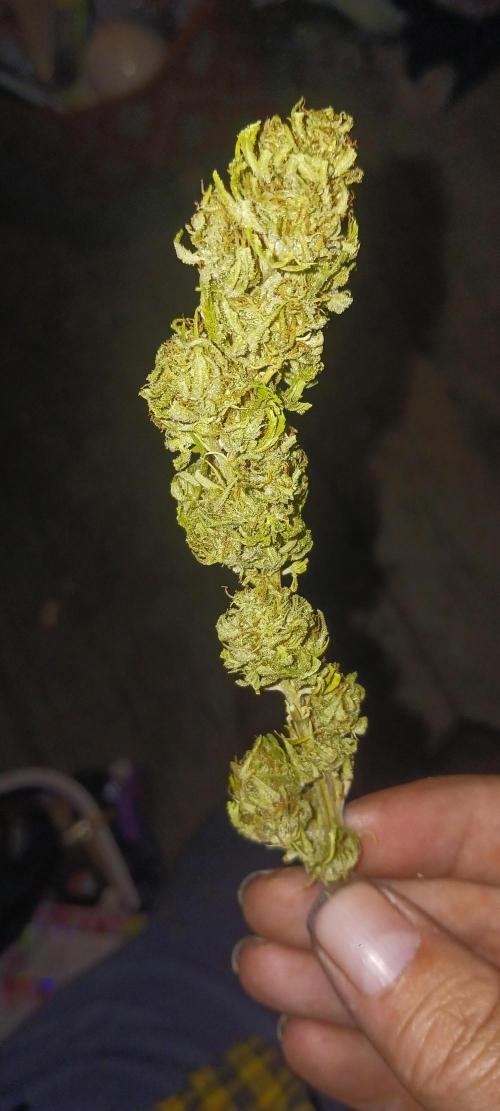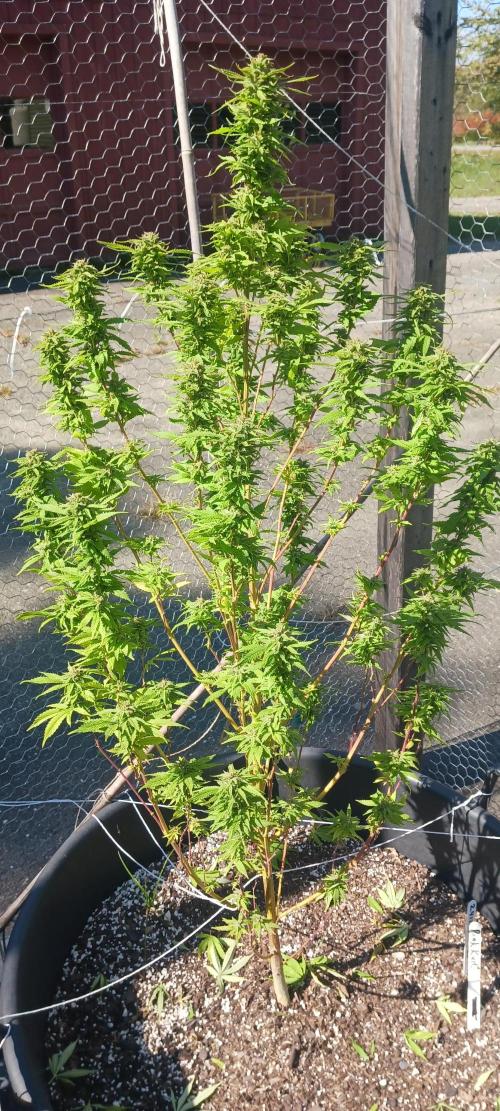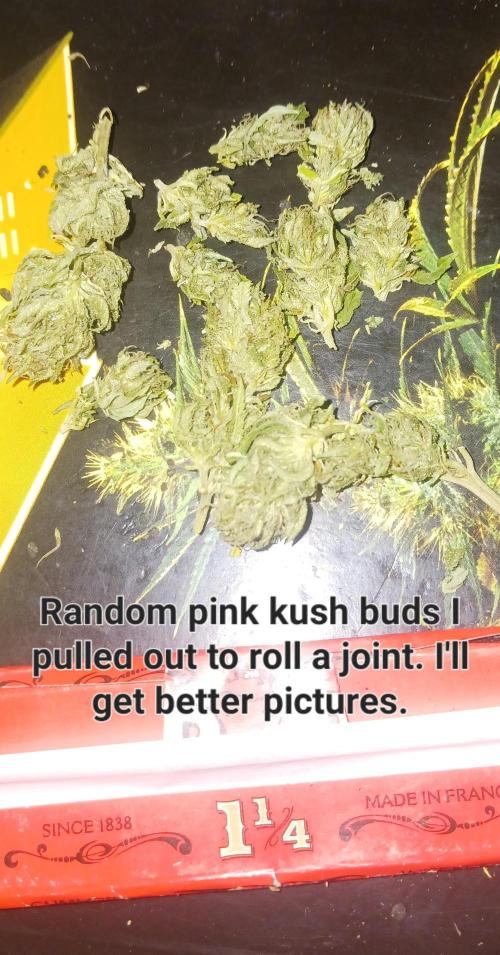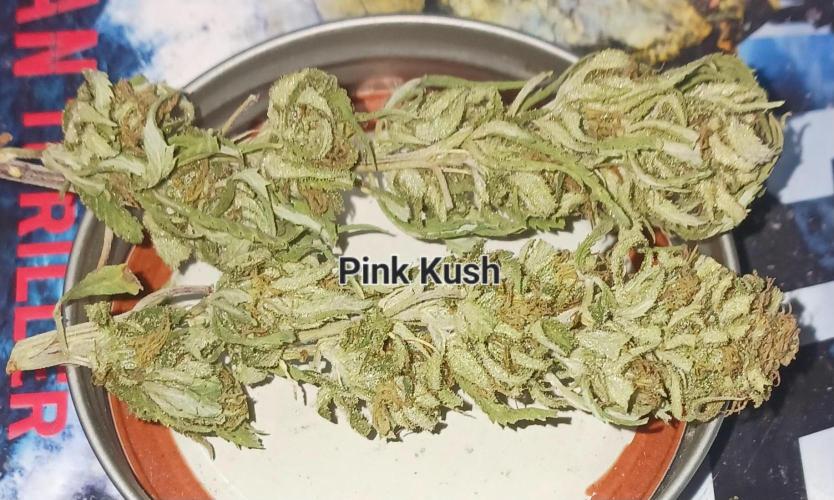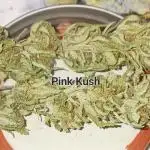The Grow Awards 2026 🏆 











































Maine Outdoor 2025

MK
Blimburn
Soil
Outdoor
Room Type
LST
weeks 11-16
Defoliation
weeks 12-27
Transplantation
weeks 6, 9-10
HST
weeks 7-8
FIMing
weeks 7, 9
Topping
weeks 7-9
76 liters
Pot Size
3.79 liters
Watering
Start at Harvest
G
Germination1y ago
masterofsmeagol 3/23 All seeds have been placed between wet paper towels to germinate. The folded pt is placed in a small zip lock bag which I spray the inside of the bag with a mister and breath into it before sealing. This has always worked good for me germinating. From here i think I'll do my normal routine and put them in peat pellets once they pop. Then they'll be placed under an aerograden with new lights. Once root development allows it I then transplant to solo cups. While vegging indoors they will be under a 1000 watt l.e.d light (ill update make and model), and one or two 150 watt hps lights depending on necessity. Final substrate is fox farm ocean forest, happy frog and roots organic 707. Containers are mostly 20 gallons with one 10g one 40g one 50g and one 30g. Planning to do the same this year as years past. May use coast of Maine Stonington Blend this year. Plants are grown in a "Grow Cage". This year I'm considering adding some netting and other improvements. However, I'm getting ahead of myself. I need them to germinate first. They don't go out until at least June 1st.
3/25 All special Kush #1 germinated and were transplanted into peat pellets. 4 of 5 pink kush seeds were germinated good enough for the transplant. One seed was further behind so I left that one for another night to catch up. Purple queen seems to be taking longer. Such small seeds but I can see a couple starting to open up.
4 likes
5 comments
Share
Used method
Paper Towel
Germination Method
1
Week 1. Vegetation1y ago
5.08 cm
Height
18 hrs
Light Schedule
21 °C
Day Air Temp
7.0
pH
91.44 cm
Lamp Distance
masterofsmeagol 3/30 It's been 7 nights since germination. The purple queen has ONE seed with a TINY taproot coming out. I've written to n.a.s.c and am waiting to hear back. All those Trop Cherry seeds popped in 24hrs so it's nothing I'm doing. I have other seeds arriving this week. I moved the 5 royal Kush and 4 Pink Kush to where they will veg until they can go outside. They are transplanted into Fox Farm Happy Frog and are under a 1000watt L.E.D with just the veg switch on. I want to make sure I don't burn them. When they get bigger ill add an hps.
3/31 I weighed a cup of dry soil and it came to exactly 200 grams. I then weighed the seedlings and they were either 10g over or under the DRY soil. I need to get them on a proper watering schedule. I watered everything with a shot glass. I also filled a pot with water under the light to increase RH. I'm bummed out that WHOLE pack of purple queen was junk. I hope North Atlantic Seed Company goes good for it. I still los all this time. And I thought MAYBE ONE might be popping but NOPE. I filled out the necessary paperwork and have seeds in the mail too. I have seeds here but Maine is a challenging climate and I want to run strains that will give me the best chance for success.
4/1 I made my FIRST stupid mistake of the year. When I was watering my seedlings I left the light off. Luckily they have a window thats south facing with blinds that let a little bit of light in. They look like they might be stretching. They are settling in nicely though. My other seeds touch down Thursday. Just 5 but still. Those trop cherry seedlings dropped their seeds right in the paper towel lol. It was just an experiment but I took a couple of them and put them in peat pellets. I doubt I'll grow them and normally I'd never let anything get so far in a papertowel. The purple queens still haven't and I doubt WILL pop. I took the one that LOOKED like it might have a taproot (under magnification) and another and put them in peat pellets under the aerograden light. I'll probably junk the trop cherry but I'm hoping I might salvage a couple purple queens. Worst case scenario I lose a couple peat
4/2 MY other seeds should arrive today. I weighed the cups and they didn't appear to need water. They seem to be stretching a little so u lowered the knight slightly. I'll take a picture and put it up. The trop cherry seeds turned into full fledged plants in the papertowel while the purple queen still hasn't germinated. Those were definitely a flop. I'm only growing strains that will flourish here. EDIT: MY OTHER SEEDS ARRIVED TODAY AND I'M PLANNING ON POPPING THEM. NORTH ATLANTIC SEED COMPANY CONTACTED ME AND WENT BETTER THAN GOOD ON THE ORDER. THEY GAVE ME enough (can't write dollar amounts I guess) for me to get a pack of 10th planet shipped for cents! They are awesome to deal with. This is the second time they've gone good for a mistake. Last time I made a typo on my address but they fixed it. Now I'm wondering if I should wait for the 10th planet to come or do those next year and pop the ones that came today. I'll give it some thought.
4/3 SEeds arrived yesterday. Chem dog #4 and mk ultra. I'm wondering if I should pop a few of these or if I should save them and wait for the 10th planet to get here. I'll think about it a little bit. Seedlings appear to be stretching. I'm considering flicking on the other switch. I'm pretty sure it wouldn't harm them abd they might grow a little faster. These trop cherry seedlings I'm going to give away are taking off wonderfully. Maybe I'll save one. Not much to report. Just indecision. Lost the internet so I don't know if the pics I took this morning will upload. Watered everything with a shot glass. Went to roll a joint and the pics disappeared. I'll have to upload them once internet is back. I kept checking my email for my tracking bit my intuition told me to pop 2 mk ultra and the chem dog #4. Right after i finished I looked online and there was my tracking number lol. Oh well, my intuition has really been on point lately. At least if these don't pop (which I highly doubt) than I'll be able to pop a few 10th planet seeds. Seeds got popped around 3pm.
4/4 Weighed cups and looks like they will need water tomorrow. I added some pictures and checked my diary where I did seeds before with the hps lights. My tatu 1000 watt equivelant (100 watts) light is what I've been using with just the veg switch on 36ins away as the manual says. I've noticed some stretching and I asked my commercial buddy what he thought. He was honest and told me he didn't know much about l.e.d's but that I've had great results every year using my other lights so he asked why I switched. That made me pause and think. I took down the tatu 1,000 watt equivelant l.e.d and replaced it with ONE 150 watt HPS. I'll observe the next few days. I'm sure it would've been fine either way but I've ACTUALLY used this before and had good results. When they get clone size I'll switch or ADD the light until the go outside. I'm not checking the seeds I'm attempting to pop until it's been 24hrs at least. 1 Chem dog #4 2 mk ultra. I feel better about the lighting switch. My intuition is telling me it's the right move. I'm much more familiar with HID lights.
EDIT: CHECKED SEEDS AT 5:30 26.5 HRS AFTER BEING PLACED IN PAPER TOWELS. BOTH MK ULTRA HAD POPPED. ONE ONLY HAD A TINY TAPROOT THOUGH SO I PUT IT BACK TO TRANSPLANT IN THE MORNING. CHEMDOG #4 HAD TBE LARGEST TAPROOT. BOTH WERE TRANSPLANTED TO PEAT PELLETS UMDER AN AEROGARDEN LIGHT LIKE IVE DONE WITH TBE OTHERS. I DECIDED TO GIVE THE OTHER MK ULTRA THE NIGHT TO DEVELOP A LITTLE LARGER OF A TAPROOT. IM SURE IT WOULDVE BEEN FINE.
4/5 Watered all the seedlings with a shot glass. I think it was the right choice to switch lights. I'm really unfamiliar with the L.E.D lights. Looking at the year I did seeds this light worked awesome. I just hope I didn't stunt them. A couple look a little stunted, but I think they'll come out of it.just LONG without much leaf growth. I mean the seedlings arent very old. Last time i didnt start veg until they wete larger. When the seedlings get clone size I'll add or switch the light. I got rid of all but two of the SOUR cherry. I thought it was Trop cherry but it's sour cherry. I took apart the pellet to see if it was growing ok. They were working developing nice roots below ground as I expected. I'm wondering if some may have a problem with peat netting. I'm sure everything will be fine. I'm hoping I don't need to remove any helmet heads. If I germinate more I may just go straight into soil. The other mk ultra was transplanted into a peat pellet. If they make it to cup transplant I'll add them to this diary. I MAY have done something to a couple of the seedlings under the HPS as it looks like a couple are stretching but don't have much leaf growth. Hopfully the light change will fix that. One has its true leaves but they are praying andit doesn't look great. Some look good like they are starting to take off. I'm probably worrying for nothing. These seeds weren't even put in papertowels until the night of march 23rd or somewhere around there.
3 likes
comments
Share
2
Week 2. Vegetation1y ago
5.08 cm
Height
18 hrs
Light Schedule
21 °C
Day Air Temp
7.0
pH
91.44 cm
Lamp Distance
masterofsmeagol 4/6 Woke to see two seedlings have lost their shell. Only one had a weird long curvy taproot that has come out of the soil. I'm not sure if I should perform surgery or just wait it out. I mean I can see the seed on top and the cotylden leaves. It's like it dips and can't hold the seedling up. The other mk ultra popped excellently and another has the seed visible. I'll do some research but I'm now doing away with peat pellets and going right into soil from now on. It seems like these just cause problems. The seedlings under the hps are doing better. I think it was smart to switch the light. I can see what MIGHT ve burns on a couple seedlings and TWO haven't developed there true leaves or are very stunted. So if those three don't make it ill be replacing them with the ones I just popped. I may pop tge other two mk ultra but more likely I'll wait the three days until my 10th planet comes. I took apart some of the sour cherry seedlings just to see how they were growing. Makes me feel better as it might not look that great on top but they were working on developing roots. I'll update later. I've got a lot going on in my life but I need to make sure I take care of my seedlings.
4/7 Pretty sure I watered today. I'll have to check but I know I did. Things are going better. I think that bigger light stunted them. The 2 mk ultra and 1 chem dog #4 sprouted and were in peat pellets. I transplanted them into solo cups with happy frog and put them on the outskirts of the light. I thought i might've lost one because the taproot came out of the ground and bent. I'm suprised it came out of it to be honest. And fast too! My Etho's 10th planet came so I'm thinking of popping a couple of those as well. They won't be stunted and this strain has done the best by me.
4/8 WATERED EVERYTHING WITH A SHOT GLASS BESIDES THE FRESH TRANSPLANTS. Forgot my water yesterday so I'll pop a couple 10th planet today. I MIGHT not lose any seedlings. They seem to be coming out of being stunted. The ones that WERE stunted anyway. However there are a couple I'm not sure of. Better safe than sorry. I'm getting excited. I'm going to bring the other hps light to my cousin and he'll fix it quick. That way I might not even need to switch to the L.E.D (that I'm not as familiar with.) I'm sure it will be fine either way. Clones did great under the l.e.d. I think it's just a bit much for seedlings. Which is strange since they sprout under the sun? I have the least experience dealing with seedlings as I usually but clones. I forgot to take pictures too. I have to go back over and ill take some. ADDED A FEW PICTURES AND POPPED 2 ETHO'S 10TH PLANET SEEDLINGS. THIS WAY I CAN SAVE A FEW AND ILL HAVE MOST OF KY BEANS FOR NEXT YEAR. IVE GOT A BUNCH OF AUTOS TOO BUT IVE NEVER GROWN ONE. ONCE THINGS SETTLE DOWN AND AFTER THIS SEASON I MAY TRY MY HAND AT INDOOR AND THOSE AUTOS WOULD BE GREAT FOR THAT. NOT SURE IF I SHOULD START A SEPERATE DIARY FOR THE 10TH PLANET OR JUST KEEP GOING HERE. IF I DID IT WOULD BE A SINGLE STRAIN DIARY SO I COULD ENTER CONPETITIONS. BUT DO I REALLY WANT TOO?
4/9 DIDN'T WATER. MISTED THE TOP OF THE FRESH TRANSPLANTS. HAVENT CHECKED THE 10TH PLANET BEANS YET. ITS NOT TIME. I may end up losing a couple seedlings. I'm not sure. They may just be stunted bit I could've damaged them when I removed the seed from the seedling. Only time will tell. That's why I popped the two 10th planet beans so even of I lose a couple seedlings, I'll have what I need for the year. It's like those couple are growing taller but the true leaves had barely formed and don't seem to be getting any bigger. They probably got burned and stunted. I'll monitor them. CHECKED THE 10TH PLANET AROUND NOONTIME. WASN'T THINKING AND IT HADN'T BEEN 24HRS AND ETHOS SAYS TO WAIT 36 HOURS BEFORE CHECKING. BOTH SEEM TO BE VIABLE SEEDS ONE HAS A TAPROOT AND THE OTHER HAS SPLIT OPEN. I'VE LEARNED MY LESSON AND IM GOING TO GIVE THEM ANOTHER 24 HOURS. NEXT YEAR IM GOING TO INVEST IN A HEATING PAD FOR SEEDLINGS.
Edit: What a change in weather from two years ago. I got that intuition feeling so I went to check the girls. They seem to be stretching but not NEARLY as much and are now getting some leaf growth. They were all within 10 grams of dry soil weight save for one that is a larger plant. That was 217. Everything got watered with a shot glass and the soil slowly soaked it up. I even had to water the fresh transplants. They have grown to the top of the cups! I filled in the Ched dog #4 with soil and watered. The mk ultra is larger and the soil was a little chilly. I put a little under the light to warmup so I can fill in the other two plants. Man I feel better seeing them out of their slump. I never should've started with that 1000 watt led without testing it. No matter what the box says. I'll take pics tomorrow.
4/10 Had a crazy morning. Didn't take pictures as it was a hurried morning. I filled the 2 mk ultra cups with soil and watered a shotglass. Looking at the first series of seeds I started, (the pink kush and special kush #1) two of the 3 seedlings that are stunted SEEM like they might make it. I might cull them anyway if growth doesnt pick up with the others. I'll see what happens. The first true leaves are coming apart when the were straight up amd stuck together. They looked done for. Luckily we have SUCH a long veg season that even if something is stunted, we have time for it to come out of it. If it will. Things are going well since switching to the hps light. I noticed some slight yellowing on the Chem dog's first true leaves, so I pulled the tray away from the light a little bit. The two mk ultras in the same tray are fine though. I may start a new diary for the tenth planet. Not sure but the 2 seeds attempted germinated and had a nice taproot. I transplanted them DIRECTLY into solo cups with a little Happy Frog soil and Myko's and slightly covered them before misting the tops. I cut a powerade bottle in half and it fits IN the cup perfectly a humidity dome. I misted the tops as well and put them under the asrgarden light until they break ground and get their true leaves. Man I can't wait. I know it's been a rough year for EVERYONE but I've had some particularly difficult situations. Can't wait for this season to start. Next time I go over I'll get some pictures but nobody really wants to see seedlings. They pretty much all look the same. At least I learned something. Oh and I took apart all the sour cherry seedlings that were growing and dissected them and found why a couple had problems. Seedlings are what I have the least experience with so when my whole pack didn't pop I wanted to see if it was me but it wasn't. All those other beans popped and I got some hands on experience dealing with seedlings so maybe a blessing in disguise!.
EDIT: WENT OVER AND CHECKED THE PLANTS. I WEIGHED THEM AND I ASSUME THEY WILL NEED WATER TOMORROW. I DID WATER 3 I THINK AS THEY WERE UNDER 200 AND HAD BIGGER PLANTS. EXCEPT THE ONE THAT LOOKS THE WORST. THAT SEEMS TO DRINK A LOT OF WATER. I THINK THAT MIDDLE ROW (2 SPECIAL KUSH 1 PINK KUSH) WERE STUNTED. HOWEVER, I CAN'T SEE WHATS UNDER THE SOIL AND THEY ARE GROWING TALKER AND DRINKING. THE TRUE LEAVES THAT ARE TINY AND LOOKED DONE FOR ARE PARTING AND THOSE PLANTS ARE STILL STRETCHING. I'M TRYING TO LOOK AT MY LAST DIARY I DID SEEDS WITH AND AM TRYING TO REPLICATE IT. ONLY THIS TINE WHILE I AM REDOING MY HOUSE AND MOVING AS WELL AS BEING A MEDICAL CARE GIVER. ENOUGH OF THAT. THE SNOW IS GONE. ITS A LITTLE DISCOURAGING LOOJING AT SMALL SEEDLINGS INSTEAD OF BIG CLONES BUT BY THE END OF THE SUMMER THE SEEDS WILL SURPASS ANY CLONE I BOUGHT AND I WONT HAVE TO DEAL WITH ALL THE PROBLEMS THAT CONE WITH CLONES. I NEED TO EMPTY AND CLEAN MY BAGS AND CLEAN AND STERILIZE MY GROW AREA. I ALSO NEED TO POISON THE CAGE AND BLOW ALL ORGANIC MATERIAL OUT AND POISON THE STRUCTURE ITSELF.
4/11 Seedlings are doing ok. I'm wondering if I should put up the other hps as thats what I did the year before when I did seeds. However they weren't "stressed" or "stunted." I think I MAY lose one but the other two had the true leaves stuck together and looked crispy. They've since started to open and I can see new growth. Other seedlings seem to be taking off and finally developing some leaves. The 2 mk ultra and 1 chem dog #4 didn't experience that other light and they seem to be doing great! Checked the 10th planet and one seed is poking out of the ground. I can't see the other one yet but it was a little further behind and I may have sowed it deeper. WATERED everything but the mk ultra and chemdog. I just misted the top of the soil.
4/12 WATERED ALL THE KUSH WiTH A SHOT GLASS. The mk ultra and chem dog didn't need it. Weighed cups and the lowest was 199 to about 207. The three stunted or (damaged) plants seem to be coming out of it. At least new growth is coming and they are drinking just as much as their siblings. I'll play it by ear and see how it goes. The jumped in size just since this morning bit phone was dead. Both 10th planet are now showing in the soil! Things are going good. I'm stoked!
2 likes
1 comment
Share
Grow Questions
masterofsmeagolstarted grow question 1y ago
Quick question. I popped a seed with a curly taproot but I made sure it was pointing down. I woke up to a taproot out of the soil (white with hairs) but the seed bended up again and shed its seed. Will it fix itself or should I transplant it? Thanks folks.
Open
1 like
Answer
00110001001001111Oanswered grow question 1y ago
This is why direct to substrate is a better option. Roots generalyl know up from down, but if flipping it around and handling it etc, it probably got 'confused.' Also, possible it just took path of least resistance.. something blocked it so it tried to go around etc.
maybe, a transplant is enough, but fiddling with it carries its own risks too. Seedlings are a bit picky about being fucked with and somtimes just stop growing when you do mess with them. Damaging the root is incredibly easy at this point. IF no fine hairs branching off and can easily seperate from the peat puck, maybe wise to re-plant and ensure the tap root isn't tangled at the top.
if you simply transplant and make sure the bury the exposed tap root, it should turn downward on its own, but it'll still be quite superficial at that bend. Any compaction or erosion and it gets exposed will simply turn exposed surface into stem eventually. Usually not too big of a problem, but the 'tap root' is not just some small stretch of exposed root. I don't know what kind of ramifications of a seedling haveing to develop a new tap root is, if that becomes necessary.. i'd assume it is at least a bit of delay.
This is why it's good to plant twice as many seeds as you need. Fuck the headaches, lol. cast them off and keep the good ones rolling.
likes
Complain
TruTraTrianswered grow question 1y ago
Other point of view...
Maybe the light wasn’t coming from directly above?
If she’s off to the side or shaded a bit, that might’ve confused her direction.
Anyway, roots moist + time 😜
likes
Complain
PiratePeteanswered grow question 1y ago
I'm on my first grow and this happend to me on 1 plant so put a handful damp soil over the top and its turned out exactly the same as it's sisters
Good luck!
likes
Complain
3
Week 3. Vegetation10mo ago
5.08 cm
Height
18 hrs
Light Schedule
27 °C
Day Air Temp
7.0
pH
91.44 cm
Lamp Distance
masterofsmeagol 4/13 10TH planet is doing phenomenal under those aerogarden lights. I'll wait a little bit then I'll bring them over with the others. I'm comparing the growth to the growth of the mk ultra and the chem dog as they are of a more similar age. I watered the 2 mk ultra and the chem dog #4. The others looked alright so I'll check later on. The three in the middle will probably be culled. The may recover but if they don't it doesn't really matter. I'll have what I need. I'm super excited for this season. I shouldve done more 10th planet. The "kush" seedlings are starting to take off. The leaves are finally starting to get bigger and they are developing new growth.
WENT BACK OVER AT 1:30. PLANTS WILL NEED TO BE WATERED IN THE MORNING. ONE PLANT WAS DOWN TO 199 GRAMS BUT IT HAS A LITTLE LESS SOIL IN THE CUP. THEY ARE GROWING AT A MORE RAPID PACE AND I DONT WANT TO INTERRUPT THAT. OTHER CUPS WERE LOW BUT NOT READY TO BE WATERED. I THINK EITHER WAY IT WOULD BE FINE BUT IM ERRING ON THE EDGE OF CAUTION. I MAYBE SHOULDVE WATERED THE DRY ONE BUT HINDSIGHT IS 20/20 AND I KIND OF WANT THEM TO BE ON A SIMILAR SCHEDULE. I GRABVED A TACK AND CHECKED THE DRAIMAGE IN THE BOTTOM. I ADDED A FEW MORE HOLES OB THE BOTTOM SIDE. I MAY JUST HAVE TO JUNK THAT MIDDLE ROW OF 3 I STRESSED BY DOING EXACTLY WHAT THE LIGHT MANUAL SAID TO DO. OH WELL I PLANNED FOR THAT WITH THE 2 MK ULTRAS AND THE CHEM DOG #4. ALL ARE DOING GREAT. SOME OF THE SOECIAL AND PINK KUSH ARE GETTING THEIR TERTIARY SET OF LEAVES SO THEY ARE PULLING OUT AND GOING TO TOWN. THE ITHER ONES (MK ULTRA, CHEM DOG, 10TH PLANET) THAT DIDNT GET STRESSED SEEM TO BE GROWING AT A FASTER RATE. I THINK I MIGHT TRY AN AUTO THIS YEAR. I HAVE A FEW BEANS. ILL THINK ABOUT IT BUT IT WOULD BE NICE TO HAVE FRESH WEED HALF-WAY THROUGH THE SUMMER.
4/14 WATERED ALL THE KUSH WITH A SHOT GLASS. THEY WERE VERY DRY. ONE WAS IN THE 180'S. I FOUND THAT ONE OF THE PLANTS THAT WAS STINTED HAS FALLEN OVER AND WAS LIMP AGAINST THE CUP. I IMMEDIATELY REMOVED TGE TWO SEEDLINGS THAT WERE BY FAR THE WORST AND I ASSUMED I WAS LOSING. I TOOK THE PEAT PELLET OUT AND THE TAPROOT HAD BARELY PENETRATED ONE AND HADN'T PENETRATED IT AT ALL ON THE OTHER ONE. IM NOT USING THOSE PEAT PELLETS AGAIN. ITS WIERD. I'VE NEVER HAD THIS PROBLEM BEFORE. PLANTS SEEM TO BE DOING GOOD. IM CONSIDERING STARTING ANOTHER SEED OR TWO. MAYBE AN AUTO.
Edit. I added mykos amd happy happy frog to the 10th planet in the solo cups. They are already to the top. I watered them with a shot glass of water amd some mykos.
4/15 I added soil to the top of the cup on kush plants and watered them with a shot glass. It seems like I may need to up the water as it's only lasting about a day. I'm seeing some slight stretching but I have no idea why. They are just seedlings and it's a 150watt hps light! Last year I used 2! I think they needed to stay under the cfl's a little longer and thatci nightve stressed them prematurelyremoving some helmet heads. Or maybe they are having problems breaking through the pear netting. I'll tell you one thing im NEVER using peat pellets again. I have other seeds and autos I could start if needed. I have what i need but if I lose a few more I'll be pissed. Maybe better to startca couole more. Those 10thvplanet are doing amazing and blowing past everything else. They look so healthy. I'm going to download a light meter on dad's iPhone and get some readings with all the different lights today.
4/16 I was able to download a FREE app for a light meter. Apple has one bit you have to pay for readings of any of the "good" lights. I had a very hurried morning and didn't take any pictures. That one special kush that was burned like the other two I threw away (or damaged when I removed the helmet head) is starting to look like it has some NEW growth. I've kept it but a little ways away from the others. I weighed all cups and they didn't seem to need water. I AGAIN packed dry soil into a cup to get a reading. Still 200. When they get within 10 grams of dry weight I'll water them. I measured and found I had the light further away than it should be. I lowered it to approx 3ft from the top of the canopy. I'll try to map the area and see what I'm getting for results. Then I'll plug in my L.E.D and see what I get. I only lowered the light because readings (that may be inaccurate) say it's not enough and two years ago when I used this light i used two. That is unnecessary I think for seedlings. I'm just trying to get them through seedling phase intact so I can move to veg and switch my light. Transplantvinto one gallons. This is where patience comes in. I'm sure everything will be fine. I just am a worrier.
4/17 I used that light meter to check the ppfd. It says it should be between 100-200 but it was only reading at like 65 and this was after I lowered the light. I'd need to go down a ways to get anywhere close. I tried to check my l.e.d and that was low so I can switch back fine. Especially with the light meter app. However the plants seem to be doing better and have tertiary leaves so I'm hesitant to change things when they seem like they are having a growth spurt. I may take the 2 mk ultras and put them with 10th planet since they are doing so good. Won't let me upload pictures. WATERED ALL THE KUSH WITH A SHOT GLASS.
EDIT: WENT BACK OVER AND USED THE PHONE APP METER ON THE LATEST IPHONE. I LOWERED THE LIGHT RO A LITTLE UNDER THREE FEET. THAT GAVE ME ABOUT 100-120 ON THE HOTTEST SPOT AND LESS FURTHER AWAY OBVIOUSLY. IM TAKING THIS WITH A GRAIN OF SALT. I MEASURED ME 100 WATT LED AND WITH BOTH SWITCHES ON I CAN REACH OVER 100 EASY FROM FAIRLY FAR AWAY. ILL BE MONITORING GROWTH AND DECIDING HOW TO MOVE FORWARD FROM THERE. I TOOK THE DOMES OFF THE 19TH PLANET BUT THE LEAF TIPS STARTED TO CURL. THE NEED TO BE HARDWNED OFF. THE CFL WAS TO CLOEE AND BRIGHT BUT MORE SO WAS THE RH OF THIS BUILDING WHICH IS PRACTICALLY NOTHING. ILL HAVE TO MOCE THEM WITH THE OTHERS. UNTIL THEN I POKED HOLES WITH A TAC ALL OVER THE DOME. THAT WAY IT CAN VENT A LITTLE BIT. I'LL SLOWLY ACCLIMATE UT TO THE LOW RH INDOORS BEFORE THE GO TO THE 100RH OUTDOORS LOL.
4/18 Didn't water this morning because things were over 20grams dry weight. Came back around one and weighed and most were within the 20 grams. One was under 200. I can see more growth since the light adjustment but I still see some stretching. But I've seen noticeable growth in a short period. I'm contemplating waiting to see what happens for a few days or to just switch to my l.e.d using my meter as a guide. Even though the box tells you how far to hang it. I'm bringing the aerogarden over to the grow tomorrow. I have a few more as well. I'm going to check that with the light meter and am considering putting the mk ultras and maybe the chem dog under that. I mean those are doing great. I poked more holes in the dome and have been exposing the plants to low rh and increased light. They don't have immediate effects anymore. I have the domes popped open too. They are gett9ng acclimated. Realistically I'm wondering if I should just pop more 10th planet or mk ultra or an auto but looking through my other diaries things will be fine. I worry to much and I usually grow clones. Outdoors. Plus most of my stuff was stolen so I'm making use of things the best I can. My money is going into good soil. I also checked the temperature at the hottest spot under the light and it was 80 degrees. This is telling my I can't really lower my light anymore. I've got some thinking to do.
EDIT: 10th Planet has done well all day without a humidity dome in this extremely low rh. I'm going to bring them and the aerogarden to the grow tomorrow. I have my l.e.d setup to test. I plan to use the light meter to see what is closest to the correct ppfd. A lot of it will be gut feeling too. I'm interested to see the reading on the new aerogarden bulbs. Those seedlings are doing awesome.
4/19 Didn't water this morning I don't think. I was hurried. Got back and found one seedling that had been growing some bigger leaves just flat on the cup. Luckily I had noticed it drooping (should've watered) and picked up a straw on the way home. It weighed 180 grams. Everything was low and I MAY have watered yesterday bit I don't think so. With this hps so close its bringing the temp up to 80. I checked the cfl aerogarden lights. Wow are those bright! I had to raise them to get in range. I put the mk ultra and chemdog under the aerogardeb light. It's about 300 bit it has a couple hot spots that bring it up to like 4k-5k. The 10th planet's loved it though and did great. I held my hand over the plants and it seemed ok. Now for the hps light and the pink kush and special kush #1. I put my tatu 100 watt (1000 watt equivelant lol) 248ns above the seedlings I had just watered. Since that hps dried everything out so much I gave them 2 shot glasses. I'll keep monitoring things. I feel like this is the best bet for me. If I fuck something up I'll have to pop more 10th planet and mk ultra ect. But I've got to make sure things are in the right range. If it stretches a little I'll just have to repot it a little sooner than the others. When they outgrow the solos they go to 1 gallon. Tomorrow I'm picking up AT LEAST a bag of fox farm ocean forest so I'll be ready for transplant when necessary. I need to get all my pots together and bring the other hps to my cousin to fix. However when they get bigger I might just use the l.e.d AND the hps if I had too.
2 likes
comments
Share
4
Week 4. Vegetation10mo ago
5.08 cm
Height
18 hrs
Light Schedule
27 °C
Day Air Temp
7.0
pH
91.44 cm
Lamp Distance
masterofsmeagol I STARTED ON THE DIARY WAY TO EARLY. I HAD TO POP ADDITIONAL SEEDS DUE TO AN ENTIRE PACK NOT GERMINATING. AFTER THAT I EITHER BURNT OR INJURED A COUPLE SEEDS REMOVING A FEW HELMET HEADS. IM FEELING BETTER ABOUT THIS SEASON NOW THOUGH THAT THINGS ARE FINALLY IN THE RIGHT CONDITIONS. IM CONSIDERING POPPING A COUPLE MORE 10TH PLANET JUST IN CASE. WE'LL SEE.
4/20 Happy 420 and Easter to everybody! Checked the girls this morning and at noontime. It was a good idea to switch lights. I'm seeing positive growth under both the duel 1500 lumen cfl's and the 1000 watt l.e.d. with an actual draw of 105 watts. The single 150 hps couldn't go low enough without raising the temp. I may add it layer after transplant in edition to the l.e.d. the plant I had to put a straw on has perked itself up and now has 3 fingered leaves. I'll have to bury up the stem a little on a few after they fill these solo cups. I WATERED everything that was under 20 grams dry weight which was most everything. I'm seeing a dramatic difference thus far. I'm wondering if I should start a couple more 10th planet in case one doesn't make it. The kush seedlings have finally showed a little more advanced growth then the seeds popped later which makes me feel good. It will be interesting to see how these turn out. They are going to be extremely resilient high yielding potent plants that will make it to harvest early. Words have power.
4/21 The lighting switch is working out good. When the plants fill out the solos I'll put the hps back up and use both until they go to their final spits outdoors. I watered everything under the led light which is all pink/special kush. I watered a couple in the aerogarden if the were under 20 grams of dry soil weight. I may have to up the amount of water but I'll be keeping an wye out. Still wanting to pop a couple more 10th planet. I've seen the first 3 fingered leaf. Can't wait for this season.
WENT BACK OVER AT 6PM AND EVERYTHING IS LOOKING GOOD. I HAVE THAT ONE PINK KUSH THAT STRETCHED AND I HAD TO PUT A STRAW ON IT IS PICK8NG UP WELL. IM JUST GOING TO HAVE TO BURU IT DEEPER WHEN I GO TO GALLON POTS. IT WAS NICE TODAY AND I GOT A LOT IF SELF CARE DOWN AND HAD SOME OTHER TROUBLES BUT SEEING MY GIRLS GROW UP MAKES ME HAPPY. IM GOING TO USE THE PAR METER AGAIN TOMORROW AND BEGIN CLEANING AND SANITIZING MY GROW AREA. I HAVE A LOT TO DO.
4/22 WATERED EVERYTHING AS IT WAS WITHIN 20 GRAMS DRY WEIGHT. Plants are improving. I'm FINALLY reaching REAL veg with a couple seedlings that have grown their first 3 finger leaves. I'm looking forward to the transplant to 1 gallon. They seem to explode after that. That and the few that stretched can be buried. Now it's time to hurry up and wait. The thing is, now that some have stretched they are growing leaves which makes it top heavy on a ciuplecdue to the elongated stem. Still looks good though. I also rotated the plants to minimize hot spots.
4/23 Things are doing well. I watered everything but two in the back of the aergarden that were still over 20-grams over dry weight and i added soil to the 10th planet cups. Not because they were stretching but just so I can weigh it with the others so I can water properly. I'll check on them later. The oldest seedlings have their first three fingered leaves. I've been shopping around for soil. I think I'll round up all my 1 gal pots and wash them as these will need a transplant in a while. I should check the ppfd again. I also need to ready my outdoor area and sanitize it. Plenty of stuff to do. May still end up popping a couple more 10th planet. Not sure.
EDIT: WENT OVER THIS AFTERNOON AND LOCATED ALL MY ONE GALLON POTS (AND A COUPLE OF THOSE SLANTED ONES THAT ARE A LITTLE MORE THAN A GALLON). FPUND THE 3'S TOO BUT IM GOING INTO ONES THEN HOME BABY HOME. AT LEAST THATS THE PLAN. I EMPTIED LAST YEARS GROW BAGS AND BURNED THE LAST OF TEO CANNABIS STALKS. I STILL NEED TO DEEP CLEAN THE CAGE. I JEED TO SPRAY THE PALLETS WITH THAT PESTICIDE THAT KILLS EARWIGS (THE ONES I CANT REPLACE). I ALSO NEED TO GET ALL THE LOOSE SOIL THATS FALKEN OVER THE YEARS AND THE LEAVES OUT OF THE CAGE. LEAF BLOWER AND A RAKE WILL TAKE CARE OF THAT. I HAVE A BRUSH BURNER AND I WAS THINKING ABOUT USING IT BUT THEN REALITY SUNK IN. AT LEAST I GOT SOME WORK DONE. WASHED UP NIDE AND PUT ON HAND SANITIZER TO CHECK ON THE GIRLS. THEY LOOK GREAT TO ME. I QUICKLY SHOT TWO PICS AND BEAT FEET. I SHOULDVE NOT GONE IN AT ALL BUT THAT WAS THE POINT OF ME GOING THERE. TO CHECK IN THE GIRLS. IM SURE THEY'LL BE FINE.
4/24 Had to go back and water. I watered the two in the ag that weren't watered before. Most of the cups under the l.e.d were right on the cusp (220, 218 ect.) I watered a couple and left the others that weighed a tad more and misted the top with a spray bottle so it won't totally dry out. I'll check later but they are growing at a rapid pace now. I'll probably end up watering. I'll probably have to up the volume. I think I'm going to go get a bag of ffof to put in the house and warm up. That way I cam transplant whenever I want. I'll check around for prices.
EDIT: Went to the local grow store and bought 3cf of Fox Farm Ocean Forest which will be mixed with the 2cu bag of Happy Frog I already have when I transplant into the 1 gallons pots. I got prices for all the soil so now I just need to figure out how many bags of each I need. I want to get it early so it's still there. I'll be doing my math.
Went back over and and as predicted the three cups under the led were "almost" within ten grams of dry weight. They probably could've waited (212, 211, 208) but they are close to breaking the ten grams over dry limit that seems to be doing good for me. I showed my commercial buddy cause he hasn't seem them a while and I could tell he was impressed. I'll take pictures tomorrow. I cleaned the cage a little bit more. My buddy thinks going into 1 gals is the better option than going into 3's. If I have to then it would just be the bigger plants and I have a few gallon and a half ones I'll use for the bigger plants. Still debating whether to pop more seeds and pheno hunt or just go with what I've got. What I've got is looking good. I just don't want to lose any. Might be smart to start a couple extra.
4/25 WATERED EVERYTHING I think. I might think about increasing water volume of water I give at a time. I'll probably stick with whats working since I use the scale anyway. The kush under the l.e.d dries out faster than the cfl. They both are working good and I'm getting some good node development. The earlier plants are actually looking like a pot plant. I may start next week with a weak nutrient solution like ancient amber or the first fox farm one. Worked on some more of the cage. I'm ready to go!
4/26 WATERED EVERYTHING BUT THE BACK ROW OF THE AEROGARDEN WHICH WERE STILL IN RANGE. Plants are getting big. Transplant with the kush might be next week. 10th planet is doing incredible for being so young. Mk Ultra doing good as well. I thought about popping a few more and then pheno hunting but I'll probably stick with what I've got. I'm loving what I'm seeing.
1 like
comments
Share
5
Week 5. Vegetation10mo ago
5.08 cm
Height
18 hrs
Light Schedule
27 °C
Day Air Temp
7.0
pH
91.44 cm
Lamp Distance
masterofsmeagol 4/27 I'm fairly certain that I watered everything. If not I only would've held off on a smaller plant that was about 17 grams over dry weight. Pretty sure I did them all though. Having a scale makes watering in these cups SO much easier. Had a rough few days with a lot going on so i uavent been writing as much. Transplant will be happening soon. Most plants have or are close to having there fourth node. I'm not going to top/FIM until after transplant and they've settled in nicely. The Kush plants are getting close to needing that transplant. I'm waiting for the leaves to go beyond the edge of the cup. Despite the fact that some havecthree fingered leaves hanging on their own stem. The transplants will go into 1/2 happy frog half ocean forest. All in all things are going good. Some plants will probably be transplanted this week. Plants in this diary are different ages.
4/28 I watered what needed it by the scale. A few were close but within range so I left them alone. I'll check later in the day and water when they are within range. It sucks sometimes because I need to make that decision over just a few points sometimes. I usually do it based on plant size and response. Oh well, these girls are out of seedling stage thats for sure. Realistically this week is closer to week one of veg then the seedling emerging on day one when i started this. I just wanted to get this diary started. Then I had to get replacement seeds as some didn't germinate. These girls are looking pretty good so ill probably save the other beans i have for next year. I MAY do a lilac/diesel auto from Ethos when it gets warmer but we'll see. I am wicked excited for this season. Planning to clean and sanitize grow area and wash pots today. Everything seems to be doing amazing.
4/29 I watered a few but many weren't in range yet. I'll be there later this afternoon and check again. Boy things are going good. Planning to grab the rest of my soil this morning. Things are popping off. Transplants will be coming soon. I just want that big rootball first before they go in the 1 gals. I picked up my soil but they shorted me 3 bags of haply frog. It was like a war zone there. Construction everywhere and people hollering at each other over the mechanical racket. Only the drive through was open. I did some quick calculations to reach what I needed for soil bit after they told me to go back in because "they didn't have it." I stop and get out and it went back on my card. Apparently they were hassling my legally blind disabled wife to move the car. She offered them the opportunity to do so but they would need to deal with me after. I wasn't in anyone's way. The car behind me went around me just fine. Anyway I remembered the little local store one town over. Ten minute drive and they have a deal where if you buy 5 bags of hf you it's only SLIGHTLY more than 3. I headed out that way but had to come home due to an emergency. They've got a bunch and they aren't in the city. I'll make it over there this afternoon or in the morning and pick up the rest of my happy frog. No roots organic 707 this year. It's the same price as ocean forest and I really like ocean forest. Lots see how they do with just happy frog and ocean.
4/30 Watered the front row of the aerogarden. Others seemed to be within range. Pretty sure I watered everything under the L.E.D. Things are moving forward. I've got a lot of work to do. I'm going to pick up my remaining soil. I need to clean and sterilize grow bags and the 1 gallon pots and I need to clean and sanitize the grow cage itself and do any little repairs that may need it. So far I'm pretty happy. I don't want to make a mistake and transplant to early. I think we may have an early season this year. It's been nice the past few days.
5/1 It's been hot the past few days. It's looking like we are going to have an early season which is totally OK with me. I WATERED TODAY. I think I did the entire aero garden. I watered the majority under the l.e.d as well. I think when it gets that close (weight wise) it doesn't REALLY matter whether they get that shot glass or not. As long as the weight is like 217 or something. Some plants have leaves going over the sides of the cup. I transplanted to early last time with seeds. Not REALLY to early but they could've stayed in the cups longer. And they take up less space that way but within a week I bet these girls will be transplanted and spending some time outside. I'm looking forward to it.
5/2 Plants are looking great. Watered everything I think. Some weights were high (e.g. 216) but I watered them anyway. I'm starting to be able to squeeze the cups and feel the roots. After I run these few errands and bring wife to the soctors I'll get the rest of my soil and I'll clean my 1 gal pots. The past few days they could've gotten some sunlight. It's been really nice out. Raining today.
EDIT: PICKED UP THE REST OF THE SOIL FOR THE SEASON. PLANTS ARE DOING GOOD. SINCE THE FIRST BATCH WAS A LITTLE STUNTED SOME OF THE OTHERS ARE IN SIMILAR STAGES. I "COULD" TRANSPLANT NOW BUT ITS EASIER DEALING WITH THEM IN THE SOLOS. AS SOON AS I TRANSPLANT THEY'LL JUMP IN SIZE. I'LL NEED TO PUT AT LEAST ONE HPS LIGHT UP AS WELL. HOWEVER, IT'S BEEN NICE ENOUGH HERE THAT THEY'LL BE ABLE TO SPEND TIME OUTSIDE DURING PART OF MOST DAYS. LAST TIME I DID SEEDS I WENT WITH 3 GALLONS BUT IM GOING INTO 1'S THIS YEAR WITH FINAL GROW BAGS RANGING FROM 20G-50G. I USIALLY USE A MIX OF FFOF, FFHF, AND ROOTS ORGANIC 707 IN EQUAL PARTS. THIS YEAR I'M USING ONLY THE FOX FARM SOILS. IVE DONE THIS BEFORE WITH GOOD RESULTS.
5/3 WATERED EVERYTHING BUT ONE TENTH PLANET AND THE ONE BEHIND IT WHICH I BELIEVE IS CHEM DOG #4. I'M FAIRLY CERTAIN I WATERED EVERYTHING UNDER THE L.E.D. These girls are ready for a new home. There's a couple that I Gould hold off on but some are at the point where they NEED A transplant. IT would be much easier to light and carry around in these cups but I want to veg indoors and on nice days bring them outside to harden off. There's only a COUPLE slow starters that could wait but only a couple. I have this year's soil. Just need to wash the pots and mis the soil and transplant. Today is busy but tomorrow is open so I'll be playing it by ear.
1 like
1 comment
Share
6
Week 6. Vegetation10mo ago
5.08 cm
Height
18 hrs
Light Schedule
27 °C
Day Air Temp
7.0
pH
91.44 cm
Lamp Distance
masterofsmeagol 5/4 I stupidly watered everything this morning. They were pretty much perfect weight for transplant......then I watered them. Oh well. If that's the worst mistake I make I'll be ecstatic. Went back over and found my 1 gal and 2 of those wierd slanty airports that tapers and holds like a gallon and a half and washed them. I mixed up 12 gallons of soil in a garbage bag and mixed it thoroughly with my gloved hands. It's mixed good. Looking at my plants in sadness thinking, "today could've been the day" and noticed a Special Kush of average size I didn't water that weighed in the 220's. I was happy. I filled the pit arpund a cup before removing it leaving the perfect hole. Mykos and water were poured in. Plant came out of the cup REALLY easy. Suprisingly easy. This wasn't totally dry. I was amazed it came out so easy so I kinda rolled it around looking at the roots. I started lowering it in the hole and I felt something break away but it webt DIRECTLY into the hole made for it. I tucked some soil around it but it was pretty tight from packing it around the empty cup. Didn't take a picture but the plant is fine. That was an average size plant too. So I may have to give some of the strains I popped later a little longer before I transplant. After everything's been transplanted I'll need to change lighting again. I think I'll open the window and use the hps and the l.e.d on the days and nights cThat's these girls won't be hardening off. I so wanna go plant those others but my intuition tells me to wait until morning and it's been serving me well. A couple can stay in cups longer. Not much longer but still.
5/5 Transplanted everything but two this morning into 1 gals with 1/2 happy frog half ocean forest. Mykos and water used during transplant. Found put the l.e.d was on for 24hrs for a while. I made sure the timer switch was ON but it was a different cord plugged in. Oh well. All transplants went perfect. I'm picking up an adapter for the outlet so I can plug the power strip into the timer and only use one timer. I had to hang the 150watt hps back up with the 1,000 watt equivelant 105 true watts. I hope this lighting setup works. Chemdog #4 and One MK Ultra will be transplanted later today or later in the morning. I also opened the shade to the south facing window. Shits getting real.
EDÌT: I FINISHED TRANSPLANTING THE LAST TWO PLANTS AND PICKED UP THE ADAPTER SO I COULD HANG THE HPS NEXT TO THE L.E.D. THEY WERE FIBE WHILE I WAS GONE. EASIEST TRANSPLANTS EVER. THEY ALL LOOKED PERKY AND HAPPY SIX OR SEVEN HOURS POST TRANSPLANT. I OPENED THE CURTAIN TO (SOUTH FACING WINDOW) BUT I MADE SURE THE PLANTS WEREN'T IN THE DIRECT LIGHT. EVEN THOUGH IT WOULD PROBABLY BE FINE. LAST TIME I HAD SEEDLING IN DIRECT LIGHT. I'LL PLAY IT BY EAR BUT IM HAPPY.
EDIT 2. Went back over to meditate by the stream and do my qigong. It's 75 and BEAUTIFUL today. The girls will be going out for a few hours on days like this. Anyway when I went in I was surprised to see everything looking nice and happy with praying leaves. Nothing is in direct sunlight but damn that window let's in a lot of light.
5/6 Girls LOVED the transplant! They seem to be all happy. No stress. Easiest transplant I've done. Leaves are praying upwards so I think the lights are approx tje right distance. They'll be going outside soon to harden off. It's been in the 70s but it's rainy now. I'll play it by ear according to weather. I'll continue to monitor lighting and I may lower the hps.
5/7 The soil was super dry when I went over this morning. Everything looked awesome though. I used about a half gallon watering. I don't want to water to run off. I want to keep the nutes IN the soil. It's also easier to fix an undet watered plant than an over watered one. It came out to about a half gaterade bottle on the biggest and half that on the smallest. I'll gradually increase water after I monitor the response. The water sat on the soil for quit a while so they definitely needed it. Looking good so far.
5/8 Soil lookeddry this morning. I think I'm going to up the water. Last time I dod seeds I gave like a pink. Some plants still had a little dampness where I watered that I could see. Others looked dry but happy. I gave the REAL dry bigger ones a small circle around the rootball. Just in case. I'm thinking of lowering the hps slightly so it's at least level with tje L.E.D. That window being open gives tons of light. If u moved them slightly left they'd get DIRECT sun most of the time. I'll be bringing them outside soon to start hardening them off.
EDIT: WENT TO CHECK THE GIRLS AT 5 TO MAKE SURE THEY WERENT DRIED OUT. THESE GIRLS ARENT JUST GETTING BIGGER BY THE DAY THEYRE LOOKING BIGGER FROM MORNING TO NIGHT! ITS BEEN RAINING LIKE CRAZY BUT WE WILL HAVE GREAT WEATHER NEXT WEEK AND I'LL BE BRINGING THEM OUTSIDE. I'M SUPER HAPPY WITH GROWTH SO FAR. ILL PROBABLY HST (TOP/FIM) AT THE NEXT NODE. I WANT THEM TO SETTLE IN NICELY BEFORE STRESSING THEM.
5/9 I may have stupidly uploaded doubles of pictures from today. Soil LOOKED real dry. I gave the plants their first real watering. I still went light. Almost a gallon with all plants. I know many say I should be watering to runoff but I want to keep the nutes in the soul as long as I can I don't want to overwater. I always start out careful. Once they show they xan tolerate it I'll increase water next time. This weekend it will be raining but after that we are getting some real good weather and I'll he taking the girls out to begin hardening off. I also need to take a look and top/FIM the plants now that they are settled. Also need to wash grow bags and sanitize outside.
5/10 It's pouring out. Horrible night and morning but this is about cannabis. After the watering ALL the plants shot up in size! Substantially. Leaves are over the sides of containers. I think I'm somewhere close with the watering schedule. I may bring the hps light down a little. I also NEED to start HST. I need to FIM and/or top these girls. Unfortunately I've been dealing with medical problems of my wife so I haven't got to it. If I get some sleep I may do something this morning or in the afternoon.
1 like
comments
Share
Used techniques
Transplantation
Technique
7
Week 7. Vegetation9mo ago
30.48 cm
Height
18 hrs
Light Schedule
27 °C
Day Air Temp
7.0
pH
60.96 cm
Lamp Distance
masterofsmeagol 5/11 I DID NOT WATER. A COUPLE LOOKED DRY BUT STILL HAD HEFT AND I COULD FEEL MOUSTURE IN THE SOIL. I should've taken more pictures. I forgot it's a new week. Oh well. I'll be back over and I'm planning to bring the girls outside for the first time if it warms up a little more. It's windy as fuck but I can put them in the garage with the doors open. As long as that's not the direction of the wind. I raised the L.E.D light and lowered the hps. I also TRIED to FIM a 10th planet and an mk ultra. I may have just topped them. We'll see how it turns out before I do anything to the others. Pink kush grows slow and compact. Very similar to my experience with purple punch. I have two plants that have slightly twisted leaves. Nothing else is wrong with anything. Looking at the stippling on the leaf I think it might just be either low humidity or slight wind burn or a combination of the two. Now that I've looked again I think it might just be the first 5 finger leaf on those pink kush that I mat have mistaken. I'll keep an eye out. I feel better having done some research. I'll put some more pictures up and I'll update what it is that I get done.
EDIT: WENT BACK OVER AROUND THREE. EVERUTHING LOOKED GREAT AND THE LEAVES WETE PRAYING ON SOME. I MAY NEED TO WATER SELECT PLANTS TOMORROW. I'LL PLAY IT BY EAR. LOWER THE HPS AND RAISING THE LED WAS A WISE CHOICE I THINK. OH AND THE "TWISTED" LEAF I WAS WORRIED ABOUT IS NOTHING. JUST THE FAN TO CLOSE AND A FOMBINATION OF LOW HUMIDITY AND MINOR HEAT STRESS. ITS BEEN TAKEN CARE OF. I WANTED TO BRING THE GIRLS OUT TODAY. ITS SUNNY AND 60° BUT THE WIND IS WHIPPING! WE'VE GOT GOOD WEATHER COMING UP THOUGH WITH TEMPS IN THE 70'S. I THINK TOMORROW ILL CLEAN/SANITIZE THE CAGE AND WASH/SANITIZE THE GROW BAGS.
5/12 Looking and lifting some of the pots I found some that were pretty much totally dry. I watered the majority of all the plants. If soil was moist I left it alone. If it looked a little dry I gave it a little water. I didn't measure the water but it wasnt even ALL of what I had left from LAST WATERING (which was like a qtr gallon If that). I just don't want to over water. The ones that I went light on last time were the ones that were dry. Plants seem to explode after watering but this wasn't nearly as much. Everything is looking great. It's easy to tell these are all indicas due to the structure and leaf shape. Much different than even the Chem Dog #4 which doesn't LOOK as "indicay" as some of the others. I wanted to bring them outside today but it's only 50 out. I'm not going to make the same mistake as years past and stress the plants. When we get a nice warm day I'll bring them out. Other plants are ready to be topped or fimmed but I haven't done it yet. Also need to clean the cage and wash the bags.
5/13 It's 60° at 9am so I think the girls will be going outside for a little bit. Didn't fully water but I used what was left of the gallon and gave them that. Some are much drier than others. I'll probably give them a full watering tomm. I only gave them a little today because I didn't want them drying out. I FIMMed a Special Kush today. WE'LL see how the hst turns out.
EDIT: WENT AND BROUGHT THE GIRLS OUT FOR FOUR HOURS IN INDIRECT SUNLIGHT. THE TENTH PLANETS WERE THE ONLY ONES THAT LOOKED LIKE THEY HAD AN ISSUE. JUST MINOR HEAT OR LIGHT ISSUES WITH A COUPLE FAN LEAVES. EVERYTHING ELSE SEEMED LIKE THEY SHOT UP IN SIZE. THE LARGER CONTAINERS STILL SEEM KINDA MOIST BUT SOME ARE DRY. I NEED TO GET ON A STABLE WATER SCHEDULE. ITS HARD WITH DUFFERENT PLANTS OF VARYING SIZES. STILL HAVE A LOT OF WORK TO DO.
5/14 One plant was super light today and was a little droopy. I WATERED EVERYTHING TODAY USING APPROX A HALF GALLON. I brought them outside for the second day. I left them out for about 3hrs. It's hot today. I'm still floored that chatgtp gave me exact directions for hardening my plants off at my exact location taking the weather into consideration! That is awesome. They're all doing good. Pink kush is the slow starter this year. Kind of like purple punch was. The only plants that had ANY damage on them was the two 10th planet's and its not really damage. It's just a LITTLE mottling on the leaf and the serrations pointing down. It's weird because this strain did great here last time. The Special Kush #1 and the Pink Kush would probably be fine to leave out soon. Hindu Kush parents make those strains extremely resilient. The one chem dog #4 looks out of place with all tjis big fat indica leaves. I'm hoping the topping and fim-ing will take. It looks like it will.
5/15 Everything is looking great! I have some work to do bit then I'll be over to bring the girls out for a few hours. I'll edit this when I do.
EDIT: BROUGHT THE GIRLS OUT FOR THREE HOURS TODAY. I THOUGHT THE TENP WENT DOWN TO 73 BUT TUAT WAS INDOORS. OH WELL. THEY STILL DID GREAT! THEY WERE ALL LOOKING OUT OF THE LEAN-TO LIKE SUNFLOWERS! THE STRAIGHTEN OUT AFTER BEING UNDER THE GROW LIGHTS. I'M PLANNING TO CONTINUE TO HARDEN THROUGHOUT THE WEEK. STILL NEED TO CLEAN BAGS AND GROW AREA. I HAVE 'A' CAMERA DOWN. TRIED TO FIX IT TODAY BUT I WOULD GET RO THE LAST PART BUT THE CAMERA WOULDNT READ THE QR CODE ON MY PHONE. I EMAILED THE COMPANY BUT IF I DONT HEAR BACK BY TOMORROW AND I CANT FIX IT ILL JUST BUY ANOTHER CAMERA TO ADD TO THE SYSTEM. ITS THE OLDEST CAMERA I HAVE AND ITS DONE ME 5 GOOD YEARS. MAYBE ITS TIME TO RETIRE IT.
5/16 I watered a few of the girls this morning with a small ring around the pot. I brought them outside and am leaving them for 3.5 hours today in the lean-to. They get indirect light without all the wind this way. I'll slowly increase the hours outside until there is enough daylight for them to go outside without revegging. When I put them out I noticed that a few were light and since it was close to 80° I watered most everything. I used under a half gallon. I'll see how they do from here and then move forward. I fixed my down security camera and secured my cage. Now I just need to finish hardening off, clean/sanitize bags/environment and put them in tjeir final homes. I'm not rushing it though. I've learned my lesson with that.
5/17 Plants did great yesterday and were perky and praying this morning. It was HOT yesterday too. Got into the low 80's. It's 57° degrees at 9am and it's overcast and sprinkling. I haven't decided if I'm going to bring the girls out today. It might be a good day to try some direct sunlight. I'll update whatever I decide to do.
2 likes
comments
Share
Used techniques
HST
Technique
FIMing
Technique
Topping
Technique
8
Week 8. Vegetation9mo ago
30.48 cm
Height
17 hrs
Light Schedule
-9 °C
Day Air Temp
7.0
pH
60.96 cm
Lamp Distance
masterofsmeagol 5/18 It's not raining now but it's supposed to later. The plants are protected though. I have brought them out to continue hardening. It's only 57 degrees but they'll be alright. I used what little water was left in the bottom of the gallon to lightly water what looked like it needed it most. I mixed up another gallon and I'll check them again before they go in for the night. These plants are getting hardened off properly. I've had some pretty serious problems when I try to transition to quickly. I don't see ANY problems (knock on wood) thus far. Pink kush reminds me of purple punch. It grows similarly and starts off slow. I hope it turns the corner like the purple punch did and make up for it with the quality of flower. I topped/fimmed a special kush #1. I'll update when I bring them in for the night. This week I'll clean/sanitize the cage and the grow bags.
EDIT: PLANTS SPENT A LITTLE OVER 3 HOURS IN THE LEAN-TO WITH INDIRECT SUNLIGHT AND EXPOSIRE TO OUTDSIDE AIR, TEMPS AND RH. I DIDNT WATER WHEN I BROUGHT THEM BACK IN. I'LL CHECK TOMM MORNING AND SEE HOW THEY LOOK. IT HAD JUST STARTED TO RAIN LIGHTLY WHEN I BROUGHT THEM IN. THEY ARE PRETTY SHELTERED FROM WIND AND RAIN IN THE LEAN-TO.
5/19 It's thunderstorms out with high winds so the girls will probably stay in today. They look like they are acclimating well. I can see where some of the FIMS took. I redid one I think. I'll update later if do anything.
5/20 Everything looked AMAZING this morning. Boy that MK ULTRA has get some thick branches already forming.
Another shitty rainy day. I consulted chatgtp and it was on the same page as me. No real benefit to expose my girls to 47° Temps, cold rain qnd wind. It will be shitty a couple more days. I'll evaluate things later. WATERED EVERYTHING TODAY. TOPSOIL WAS DRY. I USED APPROX 2/3 OF A GALLON ON EACH PLANT.
5/21 I've got a super busy day. I left early and it was to cold to put the girls out. It's 55° at 9:30a.m. It may rain off and on but I think the girls would do okay in the lean-to. I need to get them ready and hardened for their forever homes. Time seems like it's flying. We are getting close to being able to put them out without risk of reveg. Plus I'm not subjecting my girls to un needed stress for no reason. I'll update what I do.
5/22 Plants were dry this morning. I used what was left in the gallon jug to water all the plants. I don't wantcto overwater and I'd like to keep the nutes in the soil where the plant can absorb them. Not just leak out the bottom. They are all growing at an incredible pace. It's currently 49°F at 9:45. It's overcast with a chance of rain. We are at what was suppised to be the high for the day. If we get above 55 I'll bring the girls out and continuing hardening. I guess it's not going to he an early season. Won't be long though and these girls will be in their final homes. I'm impressed with what I've seen so far.
EDIT: ITS 4PM AND THE SUN JUST PEEKED OUT FOR A FEW MINUTES AND IS GONE AGAIN. PLANTS LOOK FANTASTIC. IM SO GLAD I KEPT THEM IN DURING THESE 40 LOW 50 DEGREE WET DAYS. IT'LL ONLY STRESS THEM IMO SINCE THEY LOOK SO GOOD. AS SOON AS THIS RAINSTORM AND COLD WEATHER PASSES WE SHOULD HAVE DECENT WEATHER. JUST A FEW MORE DAYS WHERE HIGHS ARE IN THE 40'S. I FEEL BAD FOR THOSE PEOPLE THAT SAW THOSE HIGH 70-80 DEGREE DAYS AND PUT THEIR PLANTS OUT. THEY ARENT DOING GOOD. JUST LOOKING AT THE FOLIAGE AROUND AND I CAN SEE TREES THAT ARE JUST LIMP. THE BLOSSOMS ON THIS SPECIES LOOK LIKE A CANNABIS PLANT IN VEG WHEN IT GOT COLD SHOCKED. ANYWAY MY BODY IS KILLING ME. I GOT A LOT DONE. AND I SOAKED MY BAGS FOR 40 MINS IN A MICTURE OF DAWN, H202 AND WATER. PRIOR I USED A WIRE BRUSH TO GET ALL DIRY AND STUFF OFF I COULD. THEN I SOAKED THEM AND AFTER I RINSED THEM. I COULD SEE THE H2O2 DOING ITS WORK. REALISTICALLY I SHOULD GET NEW BAGS. ITS JUST NOT IN THE FINANCES RIGHT NOW. OH WELL. THEYVE BEEN SANITIZED AND WASHED AND ILL GO OVER THE ONES THAT ARE STAINED AGAIN JUST TO MAKE SURE I DONT SPREAD SOMETHING.
5/23 What a miserable day. It's 44° and pouring out. I put a screenshot of tbe weather and you can see that after the next few shitty days we are getting sunny weather in the 70's. Light is long enough for them now. I need to dial back the timer morecto get them acclimated. I just have to clean up the cage and they are ready to go. Bags are sanitized. I'm going to spend some more time getting some algae off a couple. These plants are flourishing. I am happy I picked 1gal over 3gal before the transplant. It's turned out perfect thus far. Really looking forward to this. Oh and I watered everything a LITTLE bit as it was dry. Enough to get it through until they get a full watering before going outside. I also attempted a FIM on the other 10th planet. The FIM on the mk ultra worked and I've got at least three tops.
5/23 WATERED ALL PLANTS WITH APPROXIMATELY A HALF GALLON. Plants were all super light and dry. I keedcto water more volume at a time. This is easier than fixing overwatering. Things are getting tight in here. Plants are getting huge! The FIMs and Toping that ive done took. That big mk ultra has 4 or 5 tops on it! Plants look super healthy. Good weather is coming. They'll be in their forever homes shortly. It's working out perfect. Some of these plants look like they'll need a transplant soon. Still need to clean up the grow cage but that will only take a minute. Also need to fix a tear I made in a grow bag but again thats just normal small shit. If you look at the snap shot of weather I took you can see the weather is going to improve greatly. This is when I'll do the majority of work. I'll update anything else I do.
EDIT: ITS 51° AND RAINING OFF AND ON. I MADE A "TEMPIRARY FIX" FOR THE GROW BAG THAT I HAD RIPPED. IT RIPPED FROM THE HANDLE DOWN AND A LITTLE DIAGONALLY. I THOUGHT ABOUT SOWING IT BUT OPTED FOR THIS EASIER METHOD. I POKED HOLES BIG ENOUGH TO SLID SMALL ZIPTIES THROUGH THE TORN PART OF THE BAG. I USED THEM TO "SUTURE THE BAG BACK TOGETHER. I THOUGHT IT TURNED OUT GREAT. I THEN USED GORILLA TAPE AND PUT A PIECE DIAGONAL OVER THE SMALL ANGLE. I DID THE SAME ON THE OPPOSOTE SIDE BEFORE RUNNING THE GORILLA TAPE FROM THE BOTTOM OF THE TEAR OVER THE BAG AND INTO THE INSIDE (COVERING THE VERTICLE STRIPS AND ZIPTIES). THE TAPE IS JUST SO I DONT LOSR SOIL AS THE ZIPTIES PRETTY MICH DID THE JOB. I ALSO USED A BUNCH OF H2O2, WHICH I POURED OVER THE ALGAE ON THE BAGS IT WAS PRESENT ON. IT FIZZED UP AND I WAS ABLE TO REMOVE ALL STAINS FROM SOME BAGS. I WORKED THEM ALL OVER AGAIN AND DOSLOSGED EPOTS AND SANITIZED ANYTHING THAT LOOKED LIKE IT NEEDED IT. ALL I HAVE LEFT IS TO CLEAN THE CAGE. AFTER WATERING THE PLANTS THIS MORNING THE JUNPED VISIBLY IN SIZE WITH LEAVES PRAYING TO THE HEAVENS. IM GLAD I HAVE TWO LARGE SOUTH FACING WINDOWS WHICH I HAVE OPENED THE BLINDS. I THIBK ITS ONE MORE DAY OF THIS AND A FEW MORE HARDENING THE GIRLS AND ILL BE ROCKING AND ROLLING. WHICH IS GOOD CONSIDERING THESE PLANTS ARE GETTING BIG. DONT WANT THEM TO GET ROOTBOUND. FORGOT CAMERA SO DIDNT TAKE PICTURES.
2 likes
comments
Share
Used techniques
HST
Technique
Topping
Technique
9
Week 9. Vegetation9mo ago
30.48 cm
Height
15 hrs
Light Schedule
27 °C
Day Air Temp
7.0
pH
Normal
Smell
70 %
Air Humidity
18 °C
Solution Temp
13 °C
Night Air Temp
masterofsmeagol 5/25 Some pics may be repeated because I forgot to add a new week. Waited until about 11 to bring the girls outside. They were definately dry on top so I used the rest of the gallon to water them. When going outside I noticed a specific kush plant that's lighter than the rest. I really need to up my water volume on these big plants. They are also getting close to not liking it in the 1 gal. and are ready for a transplant. I cleaned the cage so as soon as the weather permits these girls will be outside in the direct sunlight. Basking in the sun in the cage to finish hardening before going into their final homes which will be 20-30 gal smart pots and a 50 gal grow pot. Well SOME of them are ready for transplant. The link kush seems to take its time but it looks extremely indica-E. Weather looks like it will be amazing this week so I'm obviously stoked. Wouldn't suprise me if these girls were outdoors be the end of the week!
EDIT: THE GIRLS STAYED OUT FOR 3.5 HOURS AND LOOKED FANTASTIC. TUEY GOT SOME INTENSE SUN, EXPOSIRE TO THE HIGH RH AND A LITTLE EXPISURE TO THE HIGH WINDS. SPECIAL KUSH SEEMS TO BE THRIVING. I THINK IT WILL DO WELL IN THIS CLIMATE. THAT ONE MK ULTRA IS GROWING AT A RIDICULOUS RATE. I WATERED THE PIBK KUSH THAT WAS LIGHT. I CANT WAIT FOR THE UPCOMING WEATHER. I CAN EXPOSE THE PLANTS TO SOME DIRECT SUNLIGHT AND SEE HOW THEY HANDLE IT. I CAN ALSO GET THE GROW BAGS READY WITH SOIL MOXED AND THEM IN THE RIGHT LOCATION THE DAY BEFORE THE TRWNSPLANT TO FINAL HOME BUT IM GETTING AHEAD OF MYSELF. IM HAPPY THUS FAR. I also added another half hour of darkness so the plants will be closer to actual daylight times. They're down to 16.5. I'd like to have them lower by now but it is what it is. If some reveg I'll deal with it.
5/26 Plants seem to grow an inch I'm a day. MOST are getting to the point where they want to stretch their feet out. Good thing they'll be going in their final homes as soon as they are hardened off completely. I brought them out around 8 this morning. I have to be back at noon but I'm uncertain if leaving them out that long is a good idea. I'll probably have to check them in an hour or so. They're in the lean-to but THAT gets direct sun until the sun rises high enough in the sky to block it. I put them in here rather than the cage so they can build a tolerance to these harsh winds. Topsoil was dry as fuck. I watered everything. I focused on those that SEEMED the lightest and the largest plants. That MK Ultra plant I fimmed is going to be MASSIVE. I'll update what I do as I do it. Oh I also cleaned the bags twice and they are hanging inside the cage with the direct uv rays hitting any part that's discolored. I MIGHT do one more cleaning but I doubt it. Twice is enough. Technically three times but still. I want things to go right. It looks like I've got some pretty good phenos.
EDIT: I PULLED IN (BLOCKING VIEW FROM PART OF THE DRIVEWAY OFF) BECAUSE THAT WAS CLOSER TO MY PLANTS. I GET OUT AND START ADMIRING MY PLANTS AND LOOK ACROSS THE STREET TO SEE TWO STATE TROOPERS AND SOME DETECTIVE ACROSS THE STREET. DAD SAID AN AMBULANCE CAME BUT LEFT WITH NO LIGHTS ON. THEY WERE TALKIMG TO THE COUPLE SEPERATELY. I ATE LUNCH AND THEY WERE STILL THERE. MY HOT WIFE WENT OUT AND THE ALL STARTED FUCKING RUBBER NECKING. MEANWHILE I BROUGHT THE PLANTS INSIDE WITH THE SMALL COVER MY S.U.V PROVIDES LOL. PLANTS WERE LEFT IN DIRECT LIGHT UNTIL IT ROSE HIGH ENOUGH TO CUT IT OFF TO THE LEAN TO. PLANTS SEEM LIGHT. WELL SOME DO. I NEED TO GET A GOOD WATERING SCHEDULE DOWN. JUDGING BY HOW THESE PLANTS TOOK IT TODAY I THINK THEYLL BE OUTSIDE IN FOREVER HOMES WITHIN A WEEK.
5/27 Just poked my head in and checked on them real quick. NO damage whatsoever from all that time in the sun. I left them inside this morning so I can bring them out later in the day to see what happens. I'll add pics later and update what I do.
EDIT: BROUGHT THE PLANTS OUT TO THE CAGE AT A LITTLE BEFORE 10AM AND LET THEM BASK IN THE 85° SUN. THE WIND WAS A LITTLE ROUGH ON THEM. IT WAS ACTUALLY THRASHING THEM BUT MY INTUITION SAID 'LEAVE THEM BE' SO I DID. I DID MORE CLEANING AND FIGURED OUT SPACING IN THE CAGE AND I MIXED A 30GAL GROW BAG AND 2 20GAL GROW BAGS WITH A 50/50 MIX OF FOX FARM OCEAN FOREST AND HAPPY FROG. SOUL WAS MIXED WITH A GRADE STAKE AFTER BEING PUT IN A GALLON AT A TIME (TO ENSURE EQUAL PARTS) AND FINALLY MISED BY HAND. TAKES A LOT OF WORK. IM NOT GOING TO BE AS PICKING WITH THE OTHER ONES. I STILL HAVE MY 50 WITH SOIL IN IT. MAINLY DUE TO LAZINESS AND THE PAIN IN THE ASS IT IS TO MOCE THE FUCKER. PLUS IF IM LOW ON SOIL (WHICH IM NOT) THAT WAS GOOD SOIL AND THE PLANT HAD NO PROBLEMS SO I GUESS IF NEEDED IT FOULD BE REUSED. I NORMALLY JUST EMPTY THAT FIRST AND MIX A SHIT TON OF SOIL IN THERE AND SHOVEL IT IN THE BAGS. THIS WAS MUCH HARDER. PLANTS GOT CLOSER TO 2 HOURS OF DIRECT SUNLIGHT BEFORE I MOVED THEM TO THE LEAN TO. I WILL UPDATE WHEN I HRING THEN IN BUT DESPITE THE HARSH SUN AND WIND THEY SEEM FINE.
EDIT: BROUGHT THE GIRLS IN AT TWO BECAUSE MY WIFE HAD AN APPOINTMENT. NO DAMAGE WHATSOEVER. I THINK IF I USE THIS WEEK TO INCREASE DAYLIGHT HOURS AND UP THE WATERING THESE PLANTS WILL BE READY TO GO IN THEIR HOMES. A FEW ARE BIG AND DEF READY TO STRETCH THEIR FEET.
5/28 With the increased sun some these plants are out growing their containers. PLANTS SPENT APPROX AN HOUR AND A HALF IN DIRECT 85° SUN. EVERYTHING SEEMED FINE AND I WAS GOING TO LEAVE THEM FOR THE DAY IN THE CAGE. THEN I NOTICED THE BIG MK ULTRA'S MAIN STEM (IT GOT FIMMED BUT THE MAIN ONE) WAS STARTING TO DROOP A LITTLE. I PICKED THE PIT UP AND DESPITE A LITTLE BIT OF MOUSTURE ON THE TOP THE PIY WAS LIGHT AS A FEATHER. PLUS SETTING ON THE THEM ON THE TAR WASN'T THE BEST IDEA EITHER. I MISED UP SOME WATER AND WATERED THE PLANTS THAT SEEMED LIGHT. I NEED TO PICK UP LIKE ONE MORE BAG OF OCEAN FOREST FOR MY 50 GAL. I'M GOING TO TRY TO FINISH MY OTHER TWO 20'S AND THE TWO 10'S TONIGHT SO I'LL KNOW WHAT IM LACKING. ITS BASICALLY JUST THE 50. IF MY INTUITION SAYS ITS OK ILL TALE THE "COOLER" DAY TOMORROW AND TRANSPLANT THE THREE PLANTS TGAT ARE GETTING TO BIG FOR THERE POT. ÌF NEEDED I MIGHT GET SOME SCREENS TO USE AS A "BLIND" SO THE PLANTS DONT GO STRAIGHT TO FULL SUN ALL DAY.
EDIT: TJAT HUGE MK ULTRA REVOVETED NOCELY ONCE WATERED AND PUT IN THE SHADE. IT NEEDS TO BE TRANSPLANTED. I MAY DO ITCTOMORROW. PLANTS HAVE GOT TO BE CLOSE TO HARDENED. I MIXED ALL MY SOIL AND FILLED ALL THE GROW BAGS WITH THE MIX. I FINISHED CLEANING THE CAGE AND REMOVED BAMBOO AND TRELLISING. TOMORROW IS GOING TO BE A MILD DAY AND PERFECT FOR TRANSPLANT. SOME OF THESE GIRLS ARE GETTING VERY BIG. I RAN OUT OF SOIL AFTER THE LAST 10GAL GROW BAG. ITS NOT FILLED "ALL" THE WAY AND I GAVENT FILLED MY 50 GAL. I'LL GET THE REST OF THE SOIL I NEED FOR THAT 50 TOMORROW.
5/29 The store only had the 1.5cuf ffof so I held off and I'll check the local one tomorrow. Today is perfect weather for transplant but it unfortunately doesnt fit my schedule. They looked so happy i just let them take the day off and left them inside. I have a few things to do tomorrow so i doubt I'll get to it. I'm planning for Saturday to be my transplant day. Everything but the 50 is ready. If things change it could be later today or tomorrow but at least by the weekend. Hoping they dont reveg. I may just light dep a few of them which would require less soil. I'm planning on doing that with the two tens.
5/30 Today was the day. It was cloudy and supposed to rain and shower overnight into the morning. However about two plants in clouds parted and we got straight blue skies and sun. Oh well. I think it was the right time. Everything is in smart pots 10g-30g. I couldn't finish the last plant as I ran out of soil and plant find the last support and I would've had to reuse soil. I'll get more soil tomorrow and that pink kush will go in the 50. I'm fucking tired. I think this was the right move. All plants were transplanted with mykos.
5/31 We got the rain I was expecting. It poured last night. Plants and the cage itself were fucking soaked! I'm suprised they held up as well as they did! The one pink kush in the lean-to is unfazed. They did great through that hard rain. It's raining today off and on but the whole next week is going to be perfect. This weather RIGHT NOW is perfect for the fresh transplants. Sucks we got that hard rain but they took it well. Picking up soil today to either transplant the last pink kush today or more likely tomorrow after this rain ends. If the plants made it through that hard rain last night they can deal with the showers today. I can't wait to see how they look when the rain stops and they get some sun. They'll have gotten a big boost of nutes and I'm hoping will explode in growth. We shall see.
EDIT: THIS "SHOWERS" FORECAST HAS TURNED INTO TORRENTIAL RAIN. I LABELED THE STRAINS WITH TAGS (PREVIOUSLY I JUST HAD THE 1 GAL POT WITH A ROCK IN IT NEXT TO THE PLANT) AROUND 11:30 AMD THE BACK SIDE OF THE CAGE WAS FLOODED. THAT GARDLY EVER HAPPENS. ONLY WITH SEVERE STORMS. LUCKILY EVERYTHING IS ABOVE GROUND ON PALLETS. I TRIED TAKING A VIDEO WITH MY PHONE BUT IT WAS RAINING SO HARD IT SHUT THE VIDEO OFF PREMATURELY. I NORMALLY WOULD BE ALL NERVOUS AMD WORRYING BUT THERE'S NO WIND, PLANTS HAVE NO DAMAGE AND LOOK PRETTY GOOD DESPITE JUST BEING TRANSPLANTED AMD MAKING IT THROUGH THIS STORM. ITS ONLY SUPPOSED TO RAIN FOR ANOTHER 3 HOURS. ILL GO SHAKE THEM OFF AFTER THE RAIN. TOMORROW THE LAST PINK KUSH WILL BE GOING IN THE 50.
Edit 2. Went back over at about 2:45 after it stopped raining and shook off the plants. After seeing my lilac bushes down I wad a little nervous bur there is absolutely NO damage and ALL the plants seem to have made it through unscathed. From here we have at least a week of great weather. Now it's just overcast. Perfect for fresh transplants. I'm excited. I think this will be a good year. The last pink kush may need to wait until Monday to be transplanted as the local store is closed on Sunday and I dont feel like driving all the way into the nearest town when I need to go on Monday anyway. That plant missed the whole storm and just rode it out in the lean-to. Looks just like it did when it was inside. It needs to be transplanted though. Maybe my dad will go tomm and I can convince him to get it.
NEW WEEK: Site won't let me add a new week so i guess I'll gontinue here and do less days when it gets fixed. It's raining but it's only going to rain for another hour or so. I'm very suprised the plants are doing as well as they are having gone through the storm. Looking at the loan plant invthe lean-to had me questioning whether I made the right decision. I think I did. It was 51 at 8am and it was misting. Plantsclooked good considering what they had been through. Granted the ONE PINK Kush I have left in the lean-to wasn't subjected to any of this hard rain or anyv9f the wind. It was cold when I checked it but it looked great. I'm grabbing the soil tomorrow for the last transplant. She's going in the 50. I think I did a good job with strain selection this year. I wish I hadn't fucked up some of the seedlings. Special Kush looks like it will do well here. They all do actually. Hopfully I can start a new week soon. Lost my knife and went over to look for it and despite the shitty conditions the plants seem to be GROWING. I can't wait forcthe good weather coming this week. Plants got some rain and overcast sun before being subjected to that full sunlight. I'm looking forward to this. I hope the fix this shit soon.
STILL WON'T LET ME ADD A NEW WEEK. RAIN FINALLY STOPPED AND PLANTS SEEM TO BE DOING GOOD. THEY'LL LOVE THIS WEATHER COMING UP.
6/2 STILL CAN'T ADD A NEW WEEK! Watered the last pink kush which is doingcgreat having waited the storm out in the lean-to. Grabbing soil to transplant that today. This week's forecast looks great so I'm expecting lots of growth.
4 likes
3 comments
Share
Used techniques
Topping
Technique
FIMing
Technique
Transplantation
Technique
Grow Questions
masterofsmeagolstarted grow question 9mo ago
Is anyone else having difficulty starting a new week? It won't allow me to start a new week on my diary. Thanks!
Open
likes
Answer
00110001001001111Oanswered grow question 9mo ago
There have been other similar questions lately.
try a pc/laptop if on a phone or try a different browser.. turn off addons, etc... it seems that some have problems and others do not.
likes
Complain
All_our_small_plantsanswered grow question 9mo ago
Das ist leider manchmal normal hier das die Web spinnt und mann 1 bis 2 Tage keine neue Woche starten kann oder keine neues Tagebuch beginnen kann, dann passiert es auch das mann fragen stellt und diese erst nach tagen auftauchen. Must leider damit leben wenn du die seite nutzen willst. Vielleicht wirds irgendwan besser.
likes
Complain
10
Week 10. Vegetation9mo ago
30.48 cm
Height
15 hrs
Light Schedule
27 °C
Day Air Temp
7.0
pH
Normal
Smell
70 %
Air Humidity
18 °C
Solution Temp
13 °C
Night Air Temp
masterofsmeagol 6/2 I'm on my laptop and I was apparently able to start a new week. All the pictures and videos from earlier are on the other week. I think i'll just make this a shorter week to get back on track. I'll try to save this and then see if it works with my phone. Wish me luck. Oh and the weather is awesome! I got what I needed for soil and transplanted the last Pink Kush into the 50 gal pot. That plant avoided all the stress of the storm and is supported well. If this works i'll add stuff later today or tomorrow. I also did some minor repairs on the cage and added more soil to some of the bags as the hard rain had compacted it.
6/3 Yes! It worked! I got a new week by using my laptop. Plants are still a little overwatered from all that rain but it's blur skies and sunny. The weather is going to be good this week. It was 44 this morning but the plants seem to be handling it. After all the rain and the nutes they've gotten they'll jump in growth after a nice sunny day. The high winds yesterday helped to start drying out the grow bags. I'll update as I do things. We are off and running!
EDIT: PLANTS LOVED THE SUNLIGHT! THE 10TH PLANET HAS A FEW CRIBKLED LEAVES FROM WHAT ITS WENT THROUGH BUT BOTH PLANTS HAVE GROWN SUBSTANTIALLY AS YOU CAN SEE. THE MK ULTRAS ARE RECOVERING NICELY BUT ARE THE SLOWEST. AS THE BAGS DRY OUT THE PLANTS SEEM TO CONTINUE TO DO BETTER. CHEM DOG, SPECIAL KUSH AND PINK KUSH SHOW NO SIGNS OF STRESS OR TRANSPLANT SHOCK. THEYVE GROWN SUBSTANTIALLY AS WELL. I'M ALSO HAPPILY SUPRISED (REALLY THE WRONG WORD BECAUSE IVE GROWN THIS STRAIN BEFORE) RESILIENCE OF THE 10TH PLANET
6/5 I must've fucked up dates somewhere. I've been sick. It's been sunny since that rain. Plants have loved it. I saw the first signs of burn today. A couple tiny white spots on the edges of a couple leaves. Other plants are really not showing any signs of stress. I split a gallon between the two tens and the biggest special kush that was the lightest bag. I was thinking about watering because it's been so hot (73 @ 9am now) but I figured I'd wait and see how it goes. Plants are in big containers and have had their fair share of rain. I'll keep an eye out.
EDIT: I LOOKED THROUGH SOME OLD DIARIES AND REMEMBERED THAT THESE PLANTS WENT FROM A 1 GAL TO EITHER 10GAL (ONLY 2) 30GAL (1) 50GAL (1) AND THE REST 20GALS. THEY DEFINATELY DO NOT REQUIRE THE AMOUNT OF WATER A PLANT THATS ROOT BOUMD IN A 3GAL NEEDS. THESE THINGS SEEM OBVIOUS BUT IT TOOK ME SEEING THE DIARY TO REMEMBER. EVERY YEAR THERE'S A BIT OF A LEARNING CURVE STARTING OUT. IT'S HARDER DOING MULTIPLE STRAINS BUT WHO WANTS TO GROW JUST ONE STRAIN? ESPECIALLY ON AN OUTDOOR RUN. FOR INSTANCE THE LARGEST PLANT PRIOR TO TRANSPLANT WAS THE MK ULTRA I FIMMED AND PUT IN THE 30GAL. THAT PLANT IS ONE OF THE ONES THAT STRUGGLED THE MOST AND THE ONLY ONE TO REVEG. ITS RECOVERING NICELY AND HAS PICKED BACK UP. THE KUSH'S SEEM LIKE THEY ARE GOING TO DO GREAT HERE. THEY DONT HAVE A SCRATCH ON THEM. THE 10TH PLANET'S HAVE A LITTLE BIT OF TACOING GOING ON BUT THEY ARE GROWING GREAT! I'M GLAD I HELD OFF WATEEING EVERYTHING. I WENT BE WEIGHT. PLUS THEY WERE SEVERLY WATERLOGGED AND THESE PLANTS NEED TO STRETCH THEIR ROOTS. THE TWO TENS SEEMED LIGHT AND A BIG SPECIAL KUSH WAS SLIGHTLY LIGHTER THAN THE REST SO THIS MORNING I SPLIT A GALLON ON THE TWO TENS AND GIVING A SMALL RING AROUND THE KUSH PLANT. ITS SLIGHTLY OVERCAST BUT ITS 85°. IT'S BEEN HOT AND SUNNY. WINDY TOO. THE WIND HAS ACTUALLY HELPED. IF NOT FOR THE WIND DRYING OUT THOSE GROW BAGS ID BE IN TROUBLE. IVE GOT TO KEEP IN MIND THE SIZE OF THE PLANT WHEN I DO DECIDE TO WATER.
6/6 Wow it rained hard yesterday! I am certainly glad I didn't water. Severe thunderstorms and torrential rain. One pink kush in the ten I watered is a little limp but it will dry out quick. It's 74 at 9am. Plants have been through everything weatherwise but haul. Luckily so far there's no damage. Plants are growing rapidly and increasing in size noticeable on the daily. One mk ultra and the 10th planet's look like they might be revegging. Shooting off those three pronged leaves. Either way it will be fine. The kush plants seem ok so far. Other than a couple tears in the leaves and a couple small burn marks these plants look great. I'm glad I mixed the ocean forest. Without the 707 the soil is hotter.
6/7 I didn't get a chance to shake the plants off this morning. I noticed a few more three prong leaves shooting off but that's fine. Monstercropping it is. I'm not waiting until June 21st to put my shit outdoors. I got back and finally shook them and checked them out (they were looking beautiful) and my dad's old employee (a neighbor and grower who's an English man with a thick accent) pulled in to compliment me and my work last year. Not really compliment me but to see if I was doing clones. I'm not. He bought clones he said from a store so I didn't allow him to enter the grow. It's funny. Even if you offer "a cutting" to someone it seems like "it's not good enough." Not only do they want that they want you to root the mother fucker for them for nothing! This guy's a good dude and he's always done right to me and my dad but still. It's good to keep neighbors happy and with the reveg I'll have lots of stuff that WILL need to be pruned. I mentioned that and he said "well I've got a spot ready right now." Almost like I could miraculously use my fingers to cut a SMALL bottom branch and just root it and hand it to him. Some people are strange. I left without taking any pictures (despite the beautiful scene) to get away. I'll be back over later. It was raining last night. It's overcast now. I haven't even had to water yet! The plants are settling in GREAT! I'll get a video on today.
UPDATE: IT'S BEEN RAINING SINCE NOON. MOSTLY STEADY RAIN BUT SOME HARD RAIN AND SOME SOFT PLANT LOVING RAIN. LUCKILY IVE GOT GOOD DRAIMAGE AND MY BAGS DRY OUT FAIRLY WELL. I START A NEW WEEK TOMORROW. IM GOING TO HAVE TO CHECK THE WEATHER MORE OFTEN.
2 likes
comments
Share
Used techniques
Transplantation
Technique
11
Week 11. Vegetation8mo ago
30.48 cm
Height
15 hrs
Light Schedule
27 °C
Day Air Temp
7.0
pH
Normal
Smell
70 %
Air Humidity
18 °C
Solution Temp
13 °C
Night Air Temp
masterofsmeagol 6/8 Haven't had to water yet (besides the two tens and I should've held off). It's an overcast day. Perfect for the plants. I've noticed more off shoots of 3 pronged leaves so a few plants will reveg but thats fine. I'm happy with how things are going thus far. These are certainly very resilient strains. I've done some SLIGHT LSTing.
EDIT: IT'S BEEN A NICE DAY TODAY. A LITTLE OVERCAST BUT SUNNY AT TIMES. PERFECT WEATHER FOR THE GIRLS. THEY ARE LOVING IT OUT THERE!
6/9 And the girls are lookin' Fiiiiiine. In all seriousness everything is doing pretty good. Even that overwatered pink kush runt in the 10gal is coming out of its little funk. Some of my FIM's turned out amazing! With the reveg of some of these I'll definately have my hands full. Very grateful for smart pots and well draining soil! We've gotten some harsh rain but the girls all seem fine. It's the wind today that's a little worrisome. I may stop over later. I COULD put up tarps around the cage as wind blocks (and have before in the past) but it increases the humidity of an already extremely humid day. These girls are strong. I'm sure they'll be fine. I've found that the tarps typically hurt worse than they help.
6/10 56° at 9am. Shook the plants off. Medium wasn't soaked though. Luckily we had some wind. It's not raining now but it's going to have showers for half the day. Tomorrow is supposed to be in the 80's and sunshine so if that comes through things might workout alright. I still haven't had to water this year besides that one gallon on the tens. If I do something I'll update. I'm considering light stepping the two pink kush's in the 10's. I'll need to do more research.
6/11 BEAUTIFUL DAY! Windy too which helped dry the grow bags. Plants are growing at a rapid rate. I've yet to have to water. A few more days like this and I'll have too. It was in the 80's and is still 75 at 5:30. Bags still have heft to them and I can still feel moisture. They got tons of rain. I'll keep an eye on them. Thus far I'm pleasantly surprised (knock on wood).
6/12 Everything looked great this morning. It's a little overcast and 69° @ 8:45. I mixed water planning on watering but decided against it due to the weight I was feeling. My wife said it rained hard last night for a little while but the topsoil was dry. It did look disturbed though. Luke it got PELTED with rain. The medium looks dry but there is still some weight to the grow . I'll be back over later and I'll check things out. Overall plants have made a great transition even in this bi-polar weather extravaganza.
EDIT: WENT BACK OVER AT NOON AND EVERYTHING WAS LOOKING WONDERFUL. ITS 80° AND SUNNY WITH A STRONG WIND. THAT'S WHY I FIGURED THE PLANTS WOULD NEED TO BE WATERED. APPARENTLY THOSE THUNDERSTOTMS WITH SHEET RAIN HAVE KEPT THEM WATERED. AS PREDICTED THE TWO 10GAL POTS AT THE FRONT OF THE CAGE WERE A LITTLE LIGHT AND THE TOPSOIL WAS REAL DRY. MY MK ULTRA IN THE 30GAL LOOKED LIKE IT COULD USE SOME WATER AS WELL AND I FINALLY GAVE SOME TO THE 10TH PLANET IN THE FRONT ROW. BOTH THOSE PLANTS WERE BIGGER THAN THE REST AT TRANSPLANT AND IN A SLIGHTLY LARGER CONTAINER. THE FRONT ROW SEEMS TO DRY OUT FASTER FOR SOME REASON. I HAD 3 GALLONS MIXED UP TO START WATERING BUT AFTER CHECKING EVERYTHING ELSE I DECIDED TO GIVE THE FRONT ROW (THE ONLY ONES THAT WERE LIGHTER) A LITTLE WATER. I USED TWO GALLONS FOCUSING ON THE KUSH'S IN THE 2 10'S. THIS WAS MY WAY OF MEETING IT IN THE MIDDLE. IVE LOOKED AT PREVIOUS DIARIES AND I THINK I MADE THE RIGHT DECISION. NO RAIN IN THE FORECAST FOR A WHILE. I NEED TO REMIND MYSELF THAT PLANTS THIS SIZE USE MUCH LESS WATER THAN WHEN THE BAG IS ALL ROOTS.
6/13 It's windy as hell! I would've thought that the bags would be dried out by now! I went around and it seemed like they still had weight. It was also cold last night and is 63° and sunny at 11am. It's not getting any hotter. I DID water the two plants in the back row as they seemed a LITTLE lighter than the others. I split a gallon between those two and didnt water the rest. I figured I'll let tje wind dry them out some more. I know what they feel like when they are totally dry. I don't want to get to that point but it's easier to fix than over watering. I'll update later today.
EDIT: I FORGOT MY PHONE BUT I USED ANOTHER TO TAKE A VIDEO BYTCI CANT ADD IT. PLANTS STILL HAD SOME HEFT BUT WERE LIGHTER THAN EARLIER. I DECIDED TO WATER AFTER A PRETTY THOUROUGH ANALYSIS. I GAVE EACH PLANT A HALF GALLON EXCEPT THE 50GAL WHICH I ABSTAINED. WIND IS STILL HIGH. I even got on my laptop to try to add a video but it won't allow me to do it here EITHER. Come on grow diaries. Up your game.
6/14 GROW DIARIES STILL WONT ALLOW PICTURES OR VIDEOS. TRIED MY LAPTOP BUT STILL NO DICE. Weather has been sunny but in the 60's. I'm glad I watered. I can tell the plants liked it. Everything looks amazing 10th planet 2 in the second row is getting massive. I noticed something with the pink kush in the middle of the back.i originally FIMed it but I didn't think it took so I fimmed it again a little later on. Go8ng through the plants I found that there's a point that has like three tops on it but the thick stalk continues up and there are FOUR or FIVE more TOPS!!! I've never seen anything like this! I'm interested to see how this one turns out. Man I wanted to put some pictures up. Everything is doing so good. Maybe when I start a new week it will let me. I need to start low stress training and I need to put up trellises. Plants have also survived sustained high winds.
EDIT: WENT OVER AT 5PM AND WATERED THE TWO TENS WITH A HALF GALLON EACH. THE OTHERS "LOOK" REALLY DRY BUT I ADDED MORE SOIL TO THE BAGS A COUPLE DAYS AFTER TRANSPLANT (A WHILE AGO. DONT KNOW IF THAT HAS ANYTHING TO DO WITH IT. I ASSUME ITS THAT THE PLANTS HAVENT FULLY FILLED THE BAGS AND THUS TAKE LONGER TO DRY OUT. I PLAN TO CHECK WEATHER (NO RAIN UNLESS ITS CHANGED) AND WILL WATER EVERYTHING TOMORROW. STILL CANT ADD PHOTOS. PR9BABLY WONT BE ABLE TO START A NEWXWEEK EITHER TOMORROW. I HAVE A BUNCH OF GREAT PICS. OH AND IN ONE BAG I SAW WHAT LOOKED LIKE CORYLEDON LEAVES. I PULLED IT OUT AND IT WAS LIKE A TUBER. I DUG DOWN AT THE EDGE OF THE GROW BAGCWND WHETE THEY HAD BROKE SURFACE AND PULLED THEM OUT. ITS FUCKING BIRD SEED. I SAW THE BITCH THAT MOWS THE LAWN MOWING INTO MY CAGE. I'LL BE SPEAKING WITH HER. LUCKILY I KEEP A GOOD EYE ON KY PLANTS. PLANTS THAT WRRE SHOOTING OFF 3 PRONGED LEAVES SEEM TO BE REVERTING BACK. IF THERE WAS REVEG IT IS CERTAINLY NOT HURTIMG ANYTHING. CANT WAIT TO SHOW HOW THE GIRLS HAVE GROWN!
3 likes
comments
Share
Used techniques
LST
Technique
12
Week 12. Vegetation8mo ago
91.44 cm
Height
24 hrs
Light Schedule
21 °C
Day Air Temp
7.0
pH
Normal
Smell
70 %
Air Humidity
18 °C
Solution Temp
13 °C
Night Air Temp
75.71 liters
Pot Size
masterofsmeagol 6/15 Everything was dry this morning but the bags STILL had some heft. Much lighter though so I decided to water. I didn't realize how cold the hose is so I'll have to usecthe water inside or premix it. I watered everything at least a half gallon. Things are going great. I'll update as I go.
UPDATE: IM GLAD I WATERED. ITS 73° OUT AND NICE AND SUNNY.
6/16 Foggy morning has turned into a sunny day! Plants are doing amazing. So glad I watered. I took a shit ton of pictures but they don't seem to be uploading. VERY FRUSTRATING TO TAKE THE TIME TO TAKE PICS AND VIDEO ONLY TO HAVE IT NOT UPLOAD. It's working now. I canceled out after I uploaded everything. Trying to upload again now.
EDIT: EVERYTHING IS FIXED. I UPLOADED A BUNCH OF STUFF. PLANTS IN THE BACK AND THE FRONT SEEMED DRY AND LIGHT. I GAVE THE TWO 10'S AT LEAST A HALF GALLON. I GAVE THE THIRTY A GALLON AND SPLIT THE REMAINDER WITH THE 20'S. I MIXED UP 5 GALLONS. EVEN THOUGH THE PLANTS IN THE MIDDLE WERE DRY THEY STILL WERE FAIRLY HEAVY. IT IS SUNNY AND 80° WITH STRONG WIND. I'LL WATER THE OTHERS IF NEEDED BEFORE WE GET SOME RAIN. WE HAVE RAIN IN THE FORECAST SO ILL KEEP AN EYE OUT. IM VERY IMPRESSED WITH THE GROWTH IM SEEING. I NEED TO DO SOME MORE LST SOON AND PUT UP A TRELLIS.
6/17 I'm glad I watered those plants. Everything is looking GREAT! I didn't get pictures as I was in a hurry. The 3 plants in tje middle are dry on top bit about as heavy as the others. The wind doesn't go through them like the others. I would've watered but they looked happy and we are supposed to be getting rain. I'll be back over later and re-evaluate.
EDIT: I GAVE THE THREE IN THE MIDDLE ABOUT A HALF GALLON EACH. EVERUTHING IS LOOKING FANTASTIC. I LSTED SOME. ITS SUPPOSED TO RAIN TONIGHT AND A LITTLE BIT WITHIN THE DEW DAYS BUT NOT WHAT THEY NEED. IM JUST TRYING TO NOT OVER WATER. IM REALLY HAPPY WITH WHAT IM SEEING.
6/18 It's overcast with showers. Rained hard last night and it's been raining off and on this morning. I probably could've made it without watering the three in the middle but I didn't want to chance it. Plus the rain doesn't add up to much anyway. Plants were soaked this morning. Soaked me just shaking them off. I'll update later. This year has been really good so far.
6/19 Overcast and Maineing out (tiny sprinkles tuat appear intermittently). Plants love it. Apparently I've reached my photo limit. At least that's what the app says. AT least I got SOME of these pictures and the video up. I can't belueve the increase in size both vertically, laterally and width. Branches are long and thick. This rain, sun, rain, sun type weather is creating some monsters. Can't wait to see the result. Still on the fence about light depoing. One thing I DO need to do is put up trellises. It sucks if I can't upload anymore pictures or videos. If I see something great I'll just delete a dfferent picture.
6/20 Not raining but still overcast. 71° at 9:15. Plants are still doing amazing. I've dedoliated some damaged old leaves. I can see some plants have shot a few pistols but I don't think reveg will be a big problem. Some have no signs of reveg. A couple spit out a few three finger leaves but that could be from the environmental stressor. I kept my second mk ultra without topping or fimmed. It's stalk is enormous and just the LEAFLETS are bigger than my wrist. ENORMOUS fan leaves. I think this is going to be a great year.
6/21 It's about 80° and clear skies. Bags are a little warm. They still have some heft to them and it's going to rain tonight with showers tomorrow. Those 10's dry out quick so I split a gallon between the two as they were light as fuck. The rest of the front row was a LITTLE lighter than the rest (the big mk ultra in the 30 looked like it wanted some water) so I gave the other three in the front about a half gallon each. It's noontime. I know it's not the best time for watering but sometimes you need to do things when "you're" able to. Plants are looking amazing. Tried to stick a 10th planet branch under a support buf I took it back out. It wad way to kuchvof an angle and the plants will stretch during flower. I pulled it out and there's still a little bend in the stem but nothing that won't return to normal on its own.
4 likes
comments
Share
Used techniques
LST
Technique
Defoliation
Technique
13
Week 13. Vegetation8mo ago
91.44 cm
Height
15 hrs
Light Schedule
27 °C
Day Air Temp
7.0
pH
Normal
Smell
80 %
Air Humidity
18 °C
Solution Temp
13 °C
Night Air Temp
75.71 liters
Pot Size
masterofsmeagol 6/22 Some pictures didn't upload but that's probably a good thing. As long as the video went up its good. I need to take less pictures. I'm glad I watered the plants in the back with a premixed gallon last night as we didnt get nearly the rain I thought we would. It's small showers throughout the day. The plants are getting enormous. A couple have revegged. Mostly the 10th planet. The others aren't anywhere near as impacted. Boy are some of these stalks thick. I chose to keep a couple plants that could be grown naturally without topping or fimming. I like to see the structure of the tree bit with humidity like this 98%rh it's easy to get botrytis. That's why it's good sometimes to have multiple bid sites so your proverbial eggs aren't all in one basket. But you do end up with a massive cola. I think that mk ultra with the big fan leavescis just going to be one giant bud. That's what it's looking like. Oh and today is the summer solstice. Longest day of the year.
6/23 WATERED EVERYTHING. USED FIVE AND A HALF GALLONS. EVERYTHING GOT AT LEAST A HALF GALLON. Despite the rain we got and the bags still having some heft I decided to water. It's 80 at 9am. It's supposed to he in the upper 90's today and coukd break 100° tomorrow. I hate that the grow bags are black. That's way to hot for the plants. I should find some empty soil bags and wrap the black fabric for a couple days. A sunscreen might help but I doubt much. We'll see how it goes.
6/24 It's 90° at 9am. It's supposed to break 100° amd stay there a while. Up to 106°. Plants looked awesome this morning. I wasn't sure what I'd find. Today is the worst of the days. If it didn't break 100 yesterday it was damn close all day and the girls look GREAT. I WATERED AGAIN TODAY. I USED 6.5 GALLONS TO WATER THE GARDEN. It was nice cool well water too so they should like that. Branches are getting longer and I'm training as the get bigger. I need to put up the trellis but I'm not doing it in this heat.
EDIT: 90° @ 6PM WENT OVER AND AS PREDICTED THE TWO TENS WERE DROOPING. IM WONDERING IF THEY WILL BE ABLE TO FINISH IM THOSE TENS. LAST YEAR I HAD ONE THAT WAS HUGE IN A TEN BUT IT JUST DEVELOPED INDIVIDUAL CALYXS WITHPUT CONNECTING. CHECK IT OUT ON LAST YEARS DIARY. IF THATS THE CASE I SHOULD KIGHT DEP THEM BECAUSE THEYRE GETTING BIG. I WATERED THE TWO TENS WITH ABOUT A HALF GALLON AND I USED WHAT WAS LEFT OF THAT COLD WELL WATER ON THE 10TH PLANET IN THE 30. SHITS LIGHTER THAN USUAL BUT LOOKING PRETTY GOOD. THE REST CAN WAIT UNTIL THE MORNING FOR THEIR WATERING. TOMORROW TOPS OUT AT 85° WHICH WILL BE MUCH BETTER. IM LOVING MY STRAIN CHOICES RIGHT NOW.
6/25 It's super humid out but much cooler. I think it's like 80 at noon time. I had to water the two tens this morning. I didn't really HAVE to but I did. I filled up my watering can that says it holds 1.5 gallons (but it seems like more) and watered the two tens at least a half gallon and focused the rest on the 10th planet in the 30 and the other one up front that gets lighter than the rest. I was fully planning on watering EVERYTHING this morning but I could feel moisture in the soil and they had weight. I'm pretty sure I made the right decision. Especially with humidity so high. Either way I'll check tonight.
EDIT: WENT TO THE GROW AT APPROX 2:30PM. I HAD BO IDEA HOW HOT IT WAD OUTSIDE. IT WAS 87° BUT THE HUMIDITY IS DAMN NEAR 100%! I HAD WATERED SHIT A KOT LATELY AMD WANTED TO WAIT UNTIL THE MORNING. THE TWO 10'S (WITH GIANT PLANTS THAT IM NOT SURE CAN FINISH IN TENS) WERE DRY AND LIGHT. A COUPLE SPECIFIC PLANTS WETE A "LITTLE" LIGHTER THAN THE REST. I MIXED UP THE WATERING CAN WHICHVIS 2.5 AND ANOTHER GALLON. I USED THE WATERING CAN ON THE PLANTS IN THE FRONT. THE CHEMDOG #4 WAS SIGNIFICANTLY LIGHTER THAN THE REST SO I GAVE IT MOST OF A GALLON. THE PLANTS THAT ARE STILL HEAVY ARE GOING TO HAVE TO WAIT LONGER BEFORE I WATER THEM.
6/26 This morning I came over to substantially lighter bags. I watered everything but the 50 with 5.5 gallons of water. Plants amd roots are getting heavier. My intuition told me to water that 10th planet but it was still wasn't TOTALLY dry. This happens a few times a year during hot stretches. It will be fine by the time I'm back. I've also noticed that the pink kush in the 50 (the only one that didn't use ALL new soil) is a substantially lighter green than every other plant in the garden. Boy I'm glad that heat wave is over. It's 67° at 9:30 that's much better. I'll update as I go. I'm still thinking about light depping the 10s.
EDIT: HASN'T BROKE 70 YET AS OF NOONTIME. I THINK I MAY HAVE GONE A LITTLE OVERBOARD WITH THE WATER. TH8NGS LOOK ALRIGHT AMD THERE'S A GOOD BREEZE SO EVEN IF I DID THEY'LL DRY OUT QUICK. SO MUCH GROWTH SO FAST! THE MK ULTRA WITH THE BIG FAN LEAVES LOOKS A LITTLE SAGGY BIT IT WILL COME OUT OF IT. THE 10TH PLANET THAT WAS DROOPING LOOKS A LITTLE BETTER. IT DID REVEG AND IS STEAIGHTENING OUT TROM THAT. I DEFOLIATED SOME SPOTS TJAT LOOKED LIKE SEPTORIA. BUT THERE WERE BURNS AND DISTORTED LEAVES FROM BEFORE SO ITS HARD TO TELL. JUST A COUPLE LEAVES WITH THAT DOT. TIME WILL TELL. ITS PAST TIME TO GET MY IPM GOING ANYWAY. DURING ONE OF THESE COOLER DAYS IM GOING TO HAVE TO PREEMPTIVELY TREAT MY PLANTS. EITHER BT, CAPTAIN JACK OR PLANT DOCTOR IS WHAT I HAVE ON HAND AT LEAST. I HAVE CITRIC ACID AND K BICARB BUT HOPFULLY NONE OF THAT WILL BE NECESSARY. THE WIND IS FAR TO STRONG FOR A MITE POPULATION TO GET OUT OF CONTROL WHICH IS AWESOME. IM MAINLY WORRIED ABOUT THE PATHOGENS.
6/27 Rained last night but I don't think very much. Its much cooler. Went from 100 to 70 in a day. Plants did good to take those fluctuations. They are still SLIGHTLY overwatered with the mk ultra with the big fan leaves being the MOST over watered. There's a breeze today though and it's sunny blue skies. I think showers ate possible tomorrow at 4a.m. and it says showers throughout tomorrow to which sucks. I was hoping to get a couple nice days to dry the plants out. The 10s are light again but the soil is still moist. It's hard when it's so hot to water the correct amount. At least it is for me. Killed a couole moths and a pillar. I noticed the first sign of pest damage so it's time to get out and start the IPM. I'm hoping for no pathogens. I'll update as I go along.
EDIT: IT'S 75° AT 11:30. That mk ultra with the massive leaves still looks overwatered. One of the plants in the 10s looks the same but that one is light but the soil is moist. The MK ULTRA is still holding some weight and the soil is still damp. It's not the AMOUNT of water I've given them that's the problem it's the FREQUENCY that ive HAD to water that messed me up. Going from 70° to 100° overnight for several days kinda messed me up. It's improving though. I lifted it and it doesn't seem TO heavy. The soil is still slightly moist. I hope that I don't get so involved with thinking the plants are overwatered that they are actually under watered. I think I need to increase volume when watering and treat each vacant differently (which I have for the most part). I'm usually very measured and careful but it is what it is. No more water for a little while. Other than thecshowers at 4a.m. and the showers expected tomorrow. Surprisingly the small time I was away allowed the plants to show a pretty drastic improvement.
EDIT #2 WENT BACK DOWN AT FOUR TO CHECK THINGS OUT. THE MK ULTRA I WAS WORRIED ABOUT IS DOING MUCH BETTER. EVERYTHING (SANS ONE IN 10) IS LOOKING MUCH BETTER. I DUG DOWN AND CAN TELL THERES MOISTURE IN THAT SOIL IN THE TEN THATS A LITTLE DROOPY. THATS WHY ID RATHER UNDER WATER TGAN OVER WATER. UNDERWATER AND YOU JUST GIVE THEM A DRINK AND THEY PIP RIGHT BACK. WE ARE SUPPOSED TO GET SHOWERS TOMORROW EARLY MORNING. HOPFULLY NOT MUCH. MY INTUITION TOLD ME TO HOLD OFF ON WATERING THAT PLANT IN THE TEN. THE OTJER IS THE SAME WEIGHT AND LOOKS GREAT. WASNT PLANNING ON GOING DOWN SO UNFORTUNATELY I DIDNT HAVE MY PHONE ON ME.
6/28 Rained hard last nightcand showers all day. Plants don't look to bad off though. I think I wad watering to frequently with not enough volume. That AND the fact that we are having 35° temp swings. That has made it hard for me to keep the plants on any k9nd of a schedule for watering. I believed that plants were overwatered but since we've gotten all this rain some seem to have slightly improved. These are resilient strains and will probably be alright. I took a quick video. I'm REALLY CONSIDERING light depping the two tens.
6/29 It's been maineing out. Overcast and misting. We got hammered on overnight the night before and all day yesterday. I was completely wrong and would've made a fool out of myself if not for mother nature. I guess those plants were UNDERWATERED not OVERWATERED! It was hard to tell though with the 30° Temps swings. Either way I got this shit now. I've killed and seen some birds dart in and grab a few pillars. I see a little bit of pillar damage so plants MAY get a treatment of bt tonight. They're watered and healthy after all.
5 likes
comments
Share
Used techniques
LST
Technique
Defoliation
Technique
14
Week 14. Vegetation8mo ago
91.44 cm
Height
15 hrs
Light Schedule
27 °C
Day Air Temp
7.0
pH
Normal
Smell
80 %
Air Humidity
18 °C
Solution Temp
13 °C
Night Air Temp
75.71 liters
Pot Size
masterofsmeagol 6/30 I messed up and put 8 days last week so I'll have tp do a six day week to get back on schedule. Pounded rain last night I guess. Very intense but very brief. As you can see in the video the plants are found great. A few have revegged so I'll need to defoliate the middle. I could make a TON of clones but it's pretty late for that. I might clone a couple outstanding plants to keep the genetics. Still seeing some pillar damage. Might do bt tonight. I'll keep this updated.
7/1 Super hot yesterday. Reached 90°. We are getting SOME rain today and thunder showers day after tomorrow. Bags still had some heft and everything looked good. I went back aroundcand found about half were at the point of needing water. He'll, they probably all did. My watering can is 2 gallons not 1.5 as advertised. So that means I used 5 gallons on the garden (not watering the 50) focusing the more water on the lightest bags. That tenth planet I'm seeing more septoria like leaves. This makes enough for me to be fairly positive ill need to treat it. I have plant doctor but I think copper works better. I also see more pillar damage so I've gotta apply something. I also need to lst more and I keep to clean put the interior of the plants so they don't get pm.
EDIT: IT WAS 80° and no rain at 6:30. Humidity close to 100% bit plants look AMAZING! I'm hoping this may be my best year yet! I won't grow a bigger plant than tjat blue cheese in the 50 but so far everything is looking good. I may add some nutes to the pink kush in the 50 due to tje slightly less green color. I assume it's just because the other soil is all New amd this was a mix. I defoliated lightly to prevent pm but I have more to do. I just wanted to get a video of the girls looking good.
7/2 82° at 9am. Glad I decided to water even thoughvi watered yesterday. I need to up my volume. Thirty degree temp swings don't help much either. I said I used 4 gals but I used 5. I had one phed already. I'm hoping this will be one of my best years. IT looks like it! I won't have that MONSTER blue cheese in the 50. It was the smallest plant anyway and shows the difference between using NEW soil and mixing old soil WITH new soil. It's a much lighter green. Still need to apply bt and do a little more defoliation.
EDIT: IT'S 90° WITH LIKE 100% RH. PLANTS LOOK A LITTLE HEAT STRESSED BUT OTHERWISE PRETTY DAMN GOOD. EVEN MY FATHER MENTIONED (KNOCK ON WOOD) "THAT I DONT HAVE ANY SHOT ON THEM THIS YEAR." LOL. I UPLOADED A VIDEO TO SHARE. HOPE YOU GUYS ARE HAVING AS MUCH FUN AS I AM!
7/3 83° at 9:40a.m. I need to increase my watering volume so I don't need to water every day. I used 5 gallons to water everything but the 50. I think I'm underwatering. However it was supposed to be severe thunder storms with torrential rain, high winds and hail. I'll gratefully take this hot sunny day instead. However in the future I think I'm not goingvto add in the predicted rainfall in my schedule. Unless it's a torrential down pour obviously. Everything g is still looking good and I've still got some work to do.
EDIT: ITS 5PM AND NO "GOLF BALL SIZED HAIL. WE GOT A BRIEF RATHER INTENSE SHOWER. AT LEAST THE GIRLS GOT SOME WATER. IM GERY GRATEFUL THAT WE DIDNT GET THE STORM AND HAIL THAT WAS EXPECTED.
7/4 Didn't even get a chance to inspect the plants this morning as the wife had a medical emergency. My father called me (as I was about 5 mins away in route) telling me my plants were drooping and one was "really bad." I figured that since i had watered consistently the past few days and it was only 70 not 90 that they would be OK until noon. Boy was I wrong. I've upped my watering volume. I watered EVERYTHING with at least a gallon. I may have only given the tens 3/4s. Everything was back up by the time I left but the one on the end. I had forgotten flat I hadn't watered that one and needed to mix another gallon to water that plant. Thats why that plant looks worse on the video. I think my watering is going to need to increase to more than a gallon but it's a good start. I'll keep this updated.
7/5 Had to leave early again but I'll be back before noon. The wind is still whipping! I DID go around the cage and lifted every pot to make sure they were heavy. Even with the heavy wind the bags still were heavy. I really need to get some shit done this weekend. Last day of this week. Still haven't applied bt or done the pruning that needs to be done. I'll update as I go.
EDIT: MY INTUITION WENT OFF AND I DODNT WATER TODAY SINCE I HAD JUST INCREASED VOLUME. THESE ARE MONSTERS THOUGH. I WENT OVER AT LIKE 1PM AND FIVE WERE DOWN. SOME SEEMED FINE. THE WIND IS REALLY STRONG THOUGH. CAUGHT ME TOTALLY BY SURPRISE. IM NOT EVEN TOTALLY SURE HOW MUCH I WATERED I WAS GOING SO FAST. IT WAS EITHER 17 OR 20 GALLONS. I KNOW THAT TJE PROBLEM PLANTS ALL GOT TWO GALLONS AS WELL AS SOME OF THE OTHERS. EVERUTHING IS BACK UP AND LOOKING GOOD THOUGH! IM REALLY CONSIDERING LIGHT DEPPING THE 10S. I DONT WANT A REPEAT OF THAT PLANT WITH ALL CALYXES LAST YEAR.
5 likes
2 comments
Share
Used techniques
Defoliation
Technique
LST
Technique
15
Week 15. Vegetation8mo ago
91.44 cm
Height
15 hrs
Light Schedule
32 °C
Day Air Temp
7.0
pH
Normal
Smell
90 %
Air Humidity
18 °C
Solution Temp
13 °C
Night Air Temp
75.71 liters
Pot Size
7.57 liters
Watering Volume
Nutrients 3
CalMag
0.65 mll

Big Bloom
2.6 mll

Grow Big
1.3 mll
masterofsmeagol 7/6 Plants looked great thos morning. I WATERED A GALLON to the 50 and split one between the two tens. Top of the bags are still moist amd they still have some heft. I'm hoping this will at least carry me 48hrs. These are BIG plants and the wind goes right through those bags and dries them out. I'd rather have that though than worry about overwatering. I noticed some minor deficiencies on a couple plants so it's time to start the nutes. Calcium I'd guess. Just a beginning stage but it's time. Next feeding they'll get some food too. I'll still monitor during the day to make sure they ront dry out. It's amazing how fast they come back after they dry out but it stresses them.
EDIT: I WENT OVER AROUND 2OM AND IT WAS OVERCAST AND 83°. ALL THE PLANTS LOOKED GREAT AND ALL OF THEM WERE STILL SLIGHTLY NOIST EXCEPT THE 10TH PLANET. THEY ALL HAD SOME HEFT TO THEM TOO. THE SUN IS OUT BRIGHTER NOW BUT IT MAY RAIN TONIGHT AND CONSIDERING HOW GOOD THE PLANTS LOOKED I THINK IVE FOUND MY CORRECT WATERING RATIO. IM NOT GOIMG TO 9VET WATER IN THESE GROW BAGS WITH ALL THIS WIND. I NOTICED SOME FOUR LINED PLANT BUG MARKS ON ONE OF THE LITTLE PLANTS AND REMOVED A FEW LEAVES FROM THAT THIRSTY 10TH PLANET THAT COULD BE SEPTORIA. IM GOING TO TREAT IT BUT I HAVENT DECIDED WITH WHAT YET. I MEAN I NEED TO MAKE SURE ITS NOT JUST PESTS OR WATER SPLASHES FIRST TOO. I'VE BEEN PRETTY SANITARY THIS YEAR. IF I HAD A PLANT THAT DIDNT RESPOND TO TREATMENT AND IT WAS INDEED LEAF SEPTORIA I THINK ID RATHER SACRIFICE THE PLANT THAN RISK SPREADING IT. IM PROBABLY JUMPING THE GUN BUT I NEED TO BE READY IN CASE THAT'S THE CASE. IF NOT FOR LOCAL LAWS I WOULD THE PLANT ISOLATED. BUT IM TALKING I PULLED MAYBE FOUR LEAVES OUT OF THE LEAFIEST BUNCH AND INSPECTED EVERYTHING.
7/7 We got thunder storms last in the afternoon and last night. For at least 45 mins it rained harder than I've EVER seen it. Pure sheet rain. It turned over to heavy rain before moving out. The plan was to water everything this morning and start feeding. As I said in the video the soul was still moist amd the bags still had some heft. Not like I just watered them though. I stopped by a local dispo on my way home and talked with the best grower I personally know (thanks Junior) and his advice was the same as what I was planning. I planned on going around noon to check them. He said I could probably wait until like six and then when I do water give them like a 1 1/2 gallons to make up for that monsoon we had earlier. I showed him the video and explained how I have been watering. My intuition feels good about this. I may go check on them earlier but I don't think it's necessary. As usual I'll update as I go.
EDIT: AS SUGGESTED (WELL I SPLIT THE DIFFERENCE) I WENT OVER TO FIND ALL NY PLANTS LOOKING GORGEOUS EXCEPT THE 10TH PLANET REVEG THAT WAS A "LITTLE" SAGGY. I LIFTED THEM AND FELT THE SOIL IN THE BAGS. I DECIDED ON WATERING AS PLANNED EVEN THOUGH IT MIGHT HAVE MADE IT UNTIL NORNING. THIS WAS MY WATERING DAY ANYWAY. HOWEVER I ONLY WATERED 1 GAL PER 20 1.5 FOR 30 AND .5 FOR 10. I THINK THAT WILL WORK OUT GREAT WITH THE UPCOMING COOLER TEMPS. IT WAS SO HOT. DIDNT HAVE TIME BUT SHIT IS LOOKING GOOD.
7/8 Finally that hot streak has broken. It's in the 70s and it rained a little last night. Had to use an iPhone and send it to me because my phone was dead. My plan worked out great and everything is looking fantastic. We may get some rain tonight but I'll be watching the forecast. I DO need to feed and may do that. I might wait until next week. I also need to figure out what to do about that four lined plant bug. The birds that perch on my cage do a good job getting pests. Knock on wood I haven't seen many. I killed one pillar and there's just that four lined plant bug. That's really the only damage. I'd Hate to spray my girls with a bunch of shit over ONE bug. We shall see and I'll keep this updated.
7/9 Phone was dead this morning. Went back over later and defoliated a little bit. On reveg ive found a few spots that look like it could be septoria. Could be splash up or a million other things too. The birds have been taking care of pillars. I've found two this season which were promptly killed. Everything looked good. We are in much cooler weather now. Still high 70s with at least 90%rh. Could have showers but I need to keep up with my watering. I kept with the increase and watered everything with 2 gallons. With the exception of the 50 and the two 10's the 50 I skipped and each 10 got 1 gallon. Now it's time for a shout out. I get my seeds from North atlantic seed company. They have a sister company @dirtybirdgenetics which produces amazing strains that flourish in Maine. N.A.S.C has always used me good but this will be my first dirty bird grow next year. None of this was necessary but it's greatly appreciated. The hand written note put a huge smile on my face.
7/10 Rained last night. Phone won't charge so I used an iPhone and uploaded some pictures and a video. Plants are looking good but I've noticed "a" leaf with pillar markings. It's time to start feeding. I'm not sure if I'll start tonight or next watering. I'm not really sure. Any deficiencies are minor. I need to check my supply and see what I'm going to use. I'm suprised I haven't seen any wpm (knock on wood) with rh so high and "rolling mists". Happy 7/10 to those that indulge in oil.
7/11 Hurried morning. Watered this morning. I watered the ones that drink more with two gallons and a couple that were heavier got 1.5 gallons and the 10's got about a gallon apiece. I also fed for the first time this year. Plants are still in that transition stage and are starting to stretch. I still have nutes left on hand. I used I tsp grow big, .5 tsp cal mag and 2 tsp big bloom (per gallon) just to see how they react. I mixed two gallons and gave everything a little less than a powerade bottle I think is 1.75 pints. I can tell that some of the leaves aren't as lush green as they were. It's time to start feeding. Probably past time. Next year I'll probably go organic all the way bit this year I'm just going to be doing the same thing I have in years past. If it's not broke don't fix it. I have liquid kool bloom and some other nutes for later on in flowering. I'll be looking at nutes today but I'll probably stick with what I've been using. I also am considering plant doctor for the 10th planet that LOOKS like it may have a small case of septoria and I'm not even sure. It looks like splash back to me but we'll see. No wpm so far though. The birds are really doing great with pest control. I'll still be using BT a little bit later on.
7/12 Plants looked great this morning. I decided that if I treat its going to be with plant doctor. Most plants have hairs so I'm reluctant to use copper. I'm reluctant in general. But the plant that seems to expose a leave or two is a reveg and will be the first one thatci treat. I also went to get nutes and found my grow store turned into a "feed" store. I bought some fresh big bloom as that's all that was available. Then after purchase the cashier explained they still HAD the NUMERIOUS shelves of nutes (pretty much everything) but it took up to much room and was "spilling" the legit are wasting store space on packaged seeds opposed to the high end nutes they are known for. Whatever. I'm doing what my buddy said and to do what I do every year. If its not broke don't fix it. I'm think9ng of treating with plant doctor tomm. Or next watering.
EDIT: ONE MORE VIDEO. WENT OVER AROUND FOUR AND PLANTS ALL LOOK HAPPY. THEY LIKED THE NUTES BUT I ASSUME I'LL HAVE TO UP THE REGINEN. SEEING HOW THE WEATHER IS COOLER ILL PROBABLY WATER EVERYTHING A LITTLE LESS. ILL TREAT THE INFECTED 10TH PLANET WITH PLANT DOCTOR AFTER I WATER. PLANTS ARE IN THAT ASPARGUS STAGE AND QRE EXPERIENCING SOME STRETCHING. I'VE DEALT WITH SEPTORIA A FEW TIMES. IF I WAS ABLE TO ID ISOLATE THE PLANT. I GO MYLTIPLE TIMES A DAY AND MAKE SURE THETE IS NO INFECTED GROWTH. LUCKILY (OR POSSIBLY UNLUCKILY AS IT MAY HAVE CONTRIBUTED TO ITS INFECTION) ITS A REVEG SO IT HAS LITERALLY TONS OF FOLIAGE. INSTEAD OF PRUNING IVE JUST REMOVED THE LEAVES THAT A SORE LANDED ON. I CANT WAIT TO WATCH THESE GIRLS FLOWER.
4 likes
2 comments
Share
Used techniques
LST
Technique
Defoliation
Technique
16
Week 16. Vegetation7mo ago
91.44 cm
Height
15 hrs
Light Schedule
32 °C
Day Air Temp
7.0
pH
Normal
Smell
90 %
Air Humidity
18 °C
Solution Temp
13 °C
Night Air Temp
75.71 liters
Pot Size
7.57 liters
Watering Volume
Nutrients 3
CalMag
0.65 mll

Big Bloom
2.6 mll

Grow Big
1.3 mll
masterofsmeagol 7/13 It's maine-ing out. Overcast and misting. I guess it rained last night but not much. Today is my watering day although I think they could've made it until tomorrow. These drastic temp changes makes it hard to get a STEADY routine in place. I watered everything in the 20's a gallon the 10's 1/2 gallon. The 10th planet in the front was still heavy so I didn't water it. I'll keep an eye on it. Temps are much milder. I noticed a few more septoria leaves on the 10th planet which I promptly defoliated. This pheno is flowering. I could've put this week as flowering as several plants have started. I also saw ONE leaf on my chem dog that had septoria on it. ONE f-ing leaf! I was planning on treating this early anyway so I mixed one gallon of plant doctor 3 tsp gallon/gallon which was the recommendation. I'll monitor this plant and continue treating it the next two weeks. I may do foliar too but the mixture is different. It's a systemic so I don't think that matters as much. Considering getting mulch to protect from spores on the soil. My plants look GORGEOUS. I Hate to use such a nice plant as a guennie pig but I'm not going to sit here and watch it progress. I'm lucky it's really not that bad and that it's on a reveg. There's so many leaves that I would be forced to prune anyway. I'm seeing two MAYBE three leaves a morning but I want to get this under control. Last year u let a plant with septoria go and it finished but went to extracts. I've got a pretty good feeling about this plant doctor. I've used it before with good results. Only time will tell though.🤞
EDIT: WENT OVER AT ABOUT 1PM. ITS 2 NOW AND BLUE SKIES AND SUNNY. IM SUPER GLAD I WATERED AND EVEN MORE SO THAT I APPLIED THE PLANT DOCTOR HOW I DID. THE GIRLS ALL LOOKED AMAZING. THE TENTH PLANET I TREATED WITH PLANT DOCTOR LOOKS THE BEST IVE EVER SEEN IT. I FOUND ON LEAVE DEEP ON THE INTERIOR WITJ A SMALL SPOT BUT ITS SOMETHING IM SURE I MISSED THIS MORNING. IF THIS WORKS THIS GOOD ILL BE APPLYING IT TO EVERYTHING EVEN IF ITS JUST PREVENTATIVE.
7/14 Rained last night andcwas still sprinkling when I went over. Amazingly the 10th planet that I treated with the plant doctorcmix had ZERO visible signs of septoria. I did find one leaf on Mt chem dog and two on my mk ultra with the big leaves. It could've been calcium deficiency but I really doubt it because I think I saw THAT as well. I'm going to wait a day or two and if there are still no negative results and the plant is still looking good I'm going to treat AT LEAST the two others that MAY be infected. It's a systemic and can be used proactively and supposably breaks down into p and k after stimulating immune response. I'll monitor a little longer but as it stands I think I'm going to treat the other two just in case. I also need to start feeding. I've watered a lot more than I normally do so obviously the soil won't last as long. This has been some tricky weather but I'm happy with how things are progressing. I probably should've changed this to the first week of flower as several plants are popping pistols everywhere.
EDIT: WENT OVER AROUND NOON AND MIXED UP TEO GALLONS OF PLANT DOCTOR PLANNING TO TREAT THE TWO PLANTS BESIDE THE 10TH PLANET. EVERYTHING LOOKED SO PERFECT AND TOMORROW IS MY WATER DAY SO I DECIDED TO HOLD OFF AND APPLY IT WHEN IT NEEDS WATER ANYWAY. I DID NOTICE THAT PLANTS SEEM TO BE FLOWERING MORE AGGREWWIVELY THAN BEFORE. THINGS ARE GETTING INTERESTING.
7/15 It was water day. The girls looked great this morning. I watered everything at least a gallon and 1.5 for the thirstier plants. I treated my big fan leaf mk ultra and my chem dog #4 with the same Plant Doctor mix as i did tge 10th planet beside it. I havent seen ANY septoria on that plant since application and it looks better than ever. I watered them with a half gallon of phed water before doing a soul drench with the gallon of Plant Doctor @ 3tsp/gal. I'm not seeing much septoria but plants are starting flower and I want to nip it in the bud. This product can be used preventatively and I went by the guidelines for medical marijuana. It was 70 earlier this morning. I'll update as I go forward.
EDIT: WENT BACK OVER AT 3 AS THE TENPS WERE PIST 90 AND HAD BEEN ALL DAY. I POSTED A SHORT VIDEO BUT EVERYTHING IS LOOKING GREAT. THE PLANT DOCTOR SEEMS TO HAVE HELPED SUBSTANTIALLY. DIDNT FIND ONE SEPTORIA LEAF. STILL IT WILL TAKE A WHILE TO WORK FULLY BUT IM GLAD I DIDNT CHICKEN OUT AND I APPLIED THE RIGHT AMOUNT. IM GOING TO KEEP AN EYE ON THINGS BUT I MIGHT JUST TREAT EVERYTHING PREVENTATIVELY WHICH IS JUST HALF A TSP A GALLON I THINK. IT DEF TRIGGERS A RESPONSE IN THE PLANT. I LOVE IT WHEN SHIT JUST WORKS OYT AND YOU END UP PLEASANTLY SURPRISED. NEXT WATERING ILL PROBABLY DO NUTES. IM DEBATING WHETBER TO TRELLUS OR JUST USE STAKES AND STRINGS ACROSS THE CAGE AS NEEDED. OH WELL. OVER 90 IS TO MUCH FOR ME TO BE OUTSIDE FOR TOO LONG.
7/16 Plant Doctor is doimg its job. I saw a couple septoria leaves on chem dog but it was interior amd I could've missed it. It takes a little bit to get going. I think I'm going to treat the rest of the garden with at least the preventative dose of 1tsp per gallon. I'll wait and see if this keeps it from popping back up. It almost got to 100 yesterday. It was 80 early this morning. I mixed up two gallons of water and gave the thistiest/lightest a half gallon. I'm hoping that will hold everything over until tomorrow which is water day. I'll have to check but I think it might be time to feed too. I def should make sure to treat tjis septoria before focusing on nutes. It says you can mix it with nutes but I'm leary of doing so. I'd rather apply them at seperate times. I'll watch the garden and of I NEED to water I will. I'm hoping what I did will be enough.
EDIT: WENT OVER AROUND ONE. IT WAS 93° WITH SUPER HIGH HUMIDITY. IM GLAD I SPLIT THAT TWO GALLONS WITH THOSE FOUR PLANTS THATS FOR SURE! THEY'D PROBABLY BE DROOPED IF I DIDNT. EVERYTHING WAD PRAYING TO THE SUN GODS. WELL, EVERYTHING EXCEPT THE MK ULTRA IN THE 30 AND THE 10TH PLANET. THEY ARENT DROOPING THEY JUST LOOK NORMAL. THEY ARENT "PRAYING" LIKE THE OTHERS. THEY ARE DEFINATELY A LITTLE LIGHT AND ARE LOOKING FORWARD TO THEIR WATERING. AND THEIR FEEDING. THATS FOR SURE. I WAS SUPER HAPPY WITH WHAT I SAW GOING OVER AND THE GIRLS WILL BE ABLE TO HOLD OUT UNTIL THE MORNING. ONE IN SPECIAL KUSH (WHICH GROW AMAZING AND LARGE HERE) IS IN A 10 AND I EVEN GAVE IT A LITTLE WATER THIS MORNING BUT ITS DROOPY. I COULD STILL FEEL A LITTLE BIT OF MOUSTURE EVEN THOUGH IT WAS LIGHT. IT CAN WAIT UNTIL THE MORNING WITH THE REST. IF IT WAS DROOPING BAD I WOULDA WATERED IT. I DONT GET WHY IM HAVING PROBLEMS FINISHING PLANTS IN 10GAL SMART POTS. YEARS AGO I COULD FINISH SOMETHING IN A 5GAL BUCKET! BUT NOW ITS LIKE THE PLANTS I GROW GET FAR TO BIG TO FINISH FLOWERING ON THESE TINY BAGS. ILL MONITER. HOPFULLY IT WILL BE FINE. IF I HAVE TO I SUPPOSE I COULD CUT THE BOTTOM OFF AND PUT THEM IN THE GROUND OR MORE SUBSTRATE BUT THATS NOT SOMETHING I REALLY WANT TO DO. I CANT WAIT TO SEE YOU THESE GIRLS TURN OUT.
7/17 I'm glad I gave those few plants that extra water. It hit 100 yesterday. Plants made it through it OK. It's 80 at 9am. I watered the garden even though it's supposed to rain with a chance of thunderstorms. Everything got at least a gallon. The mk ultra reveg in the 30 got 2gals as did the thirsty special kush on the end. I've figured out which plants use more water and I try to give them a little more. I also fed today. I was hesitant to feed the plants I treated with plant doctor, but I did anyway. 1tsp grow big 2tsp big bloom .5 tsp calmag. I've noticed pistles coming together on a few plants and forming buds. Next week will definitely be labeled flower. The plants treated with plant doctor LOOK great! I've found a few septoria leaves on a couple other plants. No big deal. I was going to treat the rest of the garden preventatively but if a couple more are infected I'll just add them to the rotation. I just need to make sure I follow-up with the next few treatments. Can't say enough good about this plant doctor.
7/18 Well this fucking sucks. It's 35mph wind gusts and windy as hell. It might've rained last night but if it didn't rain much. I spent the morning "trying" to put up little strong or rope supports to help the girls. I ran a rope across the front of the three on tje back to suppirt them. That one works good. I have one going the other way the entire length which helps support some. Then I took string and ran it around each side of a row for supports. So far no observable damage abd the plants all looked awesome. They've been through a lot and are big tough hardy plants. They'll make it through tjis no problem. I'd be more worried if they had big wet flowers on them but by then I'll have the proper supports and maybe a trellis up. I feel for them this morning and I hope that wind doesn't dry out my bags!
EDIT: SPIDY SENSE STARTED TINGLING AROUND ONE SO I WENT AND CHECKED. I GUESS WILL POWER ALONE WONT MAKE IT SO THE PLANTS MAKE IT TO WATERING DAY. WIND GUSTS HAVE BEEN HIGHER THAN 35MPH AND IVE SEEN REPORTS OF 25MPH SUSTAINED WIND. I DONT KNOW WHAT IT IS HERE BUT IT DRIED OUT SOME BAGS AND WAS TURNINGVPLANTS SIDEWAYS. BOTH 10TH PLANETS (THEY DRINK ALOT OF WATER) AND THE MK ULTRA REVEG WERE BADLY DROOPING. THE REST "MIGHT" HAVE MADE IT UNTIL MORNING BUT WHATS THE POINT? I ALSO HAVE TO LEAVE EARLY TOMORROW TO TAKE THE WIFE TO THE DOCTORS. WHAT I DECIDED ON WAS TO WATER THE PLANTS THAT DRINK THE MOST 2 GALS AND GIVE THE OTHERS TGATXWERENT DROOPING AND LIGHT 1.5. I GAVE THE TWO IN THE TENS A HALF GALLON EACH. THERE ATE TWO PLANTS AT THE BACK (SPECIAL KUSH AND PINK KUSH) THAT I DECIDED TO HOLD OFF AND WATER TOMORROW. I NOTICED SOME LEAVES WITH THE COMMON "IF THE BROWN SURROUNDS YOUR PLANT IS DROWNED" SO IF THE PLANTS HAVE A LITTLE WEIGHT, LOOK GOOD AND HAVE PRAYING LEAVES THEN I SHOULD PROBABLY WAIT TO WATER. THEY ARE ALL GETTING BEATEN TO SHIT BY THIS WIND STORM. IM SURPRISED THERE IS NO DAMAGE. THESE PLANTS ARE VERY STRONG. RESILIENT. I DIDNT WATER THE 50 EITHER AND IM UP IN THE AIR ABOUT WATERING IT TOMORROW.
Edit 2 I went over around six once the wind died down a little. All the plants I didn't water look great. It's jist the reveges that took it the worst and has some fading leaves. I fixed it with nutes but it doesn't fix the leaves already pale. The reverse mostly are the ones seeing any stress from this storm. The large special kush in the front has buds like an inch long now. Soon it will be time to treat with plant doctor again.
7/19 Well that was a ridiculous windstorm that lasted all day. It was 54 when I was there this morning. I watered the two kush's in the back with a gallon and the 60 with a gallon. Now it's 9 and 70 but it's not supposed to be as hot. This weather is crazy. I defoliated some leaves from the 10th planet that I treated first with plant doctor. Tomorrow it's due for its second treatment. The other plants are only a couple days different and are doing good. Next watering I think I may treat everything. It's a small enclosure. That would be the smart move. I'm having some leaves yellow up on two of the plants that reveged. It sucks because I know I've overwatered a little on occasion but that's because it's 100° with strong wind running through my bags and drying them out. I give them their 10% so its not that I'm not giving enough at a time. I've also noticed some random pest damage. I'm considering using citric acid as I have it on hand and it supposably also helps with septoria. If I do it it will be a diy of Dr. Zymes. The way I look at it is these are outdoor plants. This isn't a sterile environment and shit like this is going tp happen. I saw a leaf that was almost totally eaten. Probably jpn beetle or grasshopper/cricket but they certainly got a good meal! I need to spend more time in the garden.
EDIT: WENT over around noon to check things out. Windy and 77°. It LOOKS like the two 10th planet's and the mk ultra reveg are picking up a little. I think they suffered not only wind stress but over watering do to these 100° that can drop to 60° in a day. Those super hot days I even left them until they drooped before I watered but still wasn't good enough. They're in transition though so they use the most water. Plus those 3 are the ones that revegged. It's getting to be close to the one week mark where I do the second treatment of plant doctor. I may hold off a day to get everything on the same page. I'm thinking about treating everything. If some were good I'd guess they wouldn't be after that horrible wind storm. Plants LOOK good though. I defoliated a couple septoria leaves and a few overwatered or yellow leaves.
5 likes
comments
Share
Used techniques
LST
Technique
Defoliation
Technique
17
Week 17. Flowering7mo ago
91.44 cm
Height
15 hrs
Light Schedule
27 °C
Day Air Temp
7.0
pH
Normal
Smell
90 %
Air Humidity
18 °C
Solution Temp
13 °C
Night Air Temp
75.71 liters
Pot Size
7.57 liters
Watering Volume
Nutrients 3
CalMag
0.65 mll

Big Bloom
2.6 mll

Grow Big
1.3 mll
masterofsmeagol 7/20 Went over this morning to plants soaking wet and heavy rain. Went back around 4pm and plants actually look really good. The rain has stopped for a bit and the girls looked great. Apart from some septoria leaves I needed to defoliate on the first plant I treated. I also noticed a few others on other plants so it's spreading albeit slowly. I treated the three in the middle with their second dose of Plant Doctor at 3tsp/1gal. One gallon administered to each plant via root drench. I think I may treat the other plant showing signs with a diy Dr. Zymes using citric acid as the active ingredient. That way I Gould start treatment right away without having to rely fully on plant doctor. Plus it would kill any pests. Ive seen damage but the birds do a number on them. I dont want to spray my plants with a bunch of chemicals if I don't have too. I shouldve replaced the pallets and cleaned the cage better. I think I did a good job sanitizing as I have no wpm. Just this septoria I probably got when the lady mowing the lawn cut all tjis fucking grass and blew it in my pen, throwing bird seed and I'm sure tons of disease into my grow bags. I literally had to harvest a bunch if fucking sunflowers. It looked like my plants had been mulched. Just with small disease carrying shrubs. At some point some of this stuff has to be on purpose. You CAN'T be that stupid. A couple kushes in the back look hungry. I think I may need to up my feed. I've written to much. I'll keep this updated. Thanks if you made it this far.
7/21 I guess it rained last night. Oh well. It was blue skies for hours before dark. It must've rained late/early morning. I'm sure the app of plant doctor will be fine. Like I said I'm considering using citric acid as a foliar spray to help with the septoria and clean up any pests. I don't have enough pests to warrant spraying. I just don't want to put all my eggs in the plant doctor basket. Today is overcast and windy. The wind has really assisted in spreading this virus. I remove anything I see infected immediately and since these plants are reveges they have plenty of leaves. Plants are really stretching. I know I talk about the septoria a lot but realistically if someone looked through my garden they'd have a hard time spotting it. I don't want to exaggerate the problem but I don't like dealing with ANY fungus or molds.
7/22 It was 55° this morning when I went over. I defoliated some septoria leaves and a few that were fading or damaged. I saw almost a whole leaf eaten so it's probably a good idea to move forward with citric acid. I can add that to the plants I've already treated with plant doctor. This is the first year it's been so noticeable. It's the reveg 10th planet that started this off. Oh well. I've dealt with MUCH worse. Plants LOOK good (other than septoria leaves (on bottom of plant). Today is water day for me but it's been raining and it's a lot cooler today. Bags still had weight to them. I want them to have a proper wet dry cycle. Temps top out at 75° so I'll monitor during the day and if something NEEDS WATER I'll give it to it. I'm suprised I have ZERO WPM. The septoria is much more identifiable but pm is usual present in these conditions bur I don't have a spot of it. I may do some defoliation today. I also need to add supports for flowering but one thing at a time.
EDIT: Went over around noon. 70°. Bags seem to be holding weight (it was easier to tell as ONE plant was substantially lighter than the rest) so I decided to hold off on watering. At least until tonight. There are three plants (at least that are going to NEED water). They look phenomenal now though and we've had lots of rain. Plan is to go over later and get the light ones and mix the water for the others so I can administer it in the morning quickly. I have an early doctor's appointment but I don't to overwater or water unnecessarily just because. But when you grow alone sometimes you need to do things when your able. I have people there that would help if I asked. And I have before but its late . I'm very grateful. I defoliated quite a few septoria leaves. They were all from the bottom of the plant. A couole wete bottom interior. I know there are worse things to contend with but still a pain.
EDIT #2 WENT BACK AT FOUR AND PLANTS LOOKED FANTASTIC AND STILL HELD WEIGHT. THE REVEG MK ULTRA IN EARLY FLOWER "MAY" HAVE STARTED TO DROOP AND "SEEMED" LIGHT. THE LARGE SPECIAL KUSH FUETHEST IN FLOWER BY THE DOOR WAS ALSO EXRRENELY LIGHT. I HAVE AN EARLY DOCTORS APPOINTMENT BUT DONT WANT TO OVER WATER MY PLANTS JUST BECAUSE IM IN A HURRY. ITS COOLER THIS WEEK. 70 TODAY AND HIGH OF 80 TOMORROW BUT DAD SAID THATS NOT UNTIL THE AFTERNOON. I MIXED UP ENOUGH WATER TO WATER EVERYTHING IN THE MORNING IF IT NEEDS IT. I HAVE AN IMPORTANT DOCTORS APPOINTMENT EARLY THAT WILL TAKE ME AWAY AND IM FEELING A LITTLE ILL SO I WANTED TO GET DONE WHAT I COULD TODAY. WATERED THE TWO THAT NEEDED IT WITH TWO GALLONS A PIECE (30GAL REVEG MK ULTRA AND THE BIG SPECIAL KUSH IN FRONT I DIDNT TOP THATS FLOWERING THE FASTEST. EVERYTHING ELSE CAN WAIT.
7/24 Surprisingly the plants still held weight this morning! The looked pretty good too! However its going to be highs in the 80's for the next 7 days. Since the plants still had some heft to them I watered everything just a gallon. I gave the 10s a half gallon and skipped the 50gal container plant. I think this is a good happy medium. I'm still seeing random septoria leaves but still no WPM. I defoliate daily sometimes a couple times. I need to get a minute to myself and add a foliar spray. I'll start with a dih Dr. Zymes while I'm looking into other products like bicilus (i have bt but its a different bicilus) or trichodermia. I need to feed sometime this week too.
7/25 Plants looked great this morning. I watered the 10th planet on the end that hadn't been watered in forever. I think I had been overwatering during those 100° days. I didn't water today as everything looks great and they don't seem to need it. I'll check later today. I did water the pink kush beside the 50 as it was much lighter (1/2 gal) to get it on par with the others. I'm starting to see pest damage as well so I think an app of Dr. Zymes would be a good idea. Both for pests and septoria. Plants are REALLY stretching. One special Kush is far ahead of the others.
EDIT:WENT OVER AT NOON AND 4PM. PLANTS LOOKED GREAT APART FROM MIRE SEPTORIA ON THE 10TH PLANET. I NEED TO WATERING DIFFERENT IN THESE TEMPS. IT WAS BREEZY AND 80° BUT THE BAGS DIDNT FEEL TOTALLY LIGHT AND THE PLANTS LOOKED AWESOME! THE HUGE EARLY FLOWERING SPECIAL KUSH IS PRETTY DAMN LUGHT BUT ITS PRAYING AMD LOOKING GREAT. I DECIDED TO WATER AND FEED IN THE MORNING AND HOPFULLY APPLY A DR. ZYMES PRODUCT ON THE ENTIRE GARDEN IN THE EVENING. PLANTS LOOK HUNGRY AND I HAVE RANDOM PESTS. ITS MOSTLY FOR THE FUNGACIDE ASPECT. PLANT SOCTOR SEEMS TO BE WORKING GREAT ON TWO OUT OF THE THREE I USED IT ON. THE THIRD IS A REVEG AND HAS TONS OF FOLIAGE I NEED TO ADDRESS AND CLEAN OUT. IT SEEMS LIKE IT WILL SPIT OFF SOME SEPTORIA LEAVES A DAY OR TWO BEFORE ANOTHER APP IS DUE. I'M LOOKING INTO MY OPTIONS. IF ANY OF YOU HAVE A SURE DIRE WAY TO DEAL WITH LEAF SEPTORIA IN EARLY FLOWER HIT ME UP! IM NOT TOO WORRIED THOUGH. I CAN SUPPRESS IT ENOUGH IF I HAVE TO EVEN IF I GOTTA SPRAY THE LEAVES WITH THAT 9.0PH ALKALINE WATER.
7/26 Supposed to be REALLY hot with thunderstorms. I watered the two thirstiest with a gallon and a half. Everything else got a gallon (but the 10th planet on the end that was still heavy and the 50). I fed everything too. I SHOULD'VE done the DIY Dr. Zymes spray but I wanted to keep feeding and adding an unknown foliar spray seperate in case of any reactions. A day before plant doctor is due to be applied again the 10th planet in the 20 starts showing signs of septoria again. I've defoliated quite a few septoria leaves. I'm not giving up. I assume I'll do something tonight and I MAY just look to see what I can find on Amazon. Luckily my plants still look beautiful. I hope it continues and I can stay on top of it.
7/27 Wow everything looked amazing this morning. EVERYTHING. The runt in the 50 has septoria but it was such nice fine Kong branches. I haven't treated tjat plant with anything. Plant Doctor app is due tomorrow. That product is working wonders and saving my crop. I'll pull a leaf or two here or there but this keeps it suppressed at least. For the most part. I think I might just treat everything with preventative doses and ANYTHING I've seen with a spot a cure dose (even though I know it's not "cured" but it's "supressed"). Plants I think are almost over the stretch. I have one special kush pheno that is much further in flower than the others. I can't wait to see what the flowers look like.
EDIT: WENT OVER AT FOUR TO CHECK ON THE GIRLS. THE REVEGS ARE A LITTLE DROOPY AND A LITTLE LIGHT BUT THEY CAN MAKE IT UNTIL MORNING. IM SURPRISED BY THE DIMINISHOMG NUMBER OF SEPTORIA LEAVES IM SEEING AND IM WONDERING IF THAT HAS ANYTHING TO SO WITH THE CUT DOWN ON WATER. IM CONSIDERING TREATING EVERYTHING IN THE GARDEN TOMORROW WITH AT LEAST A PREVENTATIVE DOSE. IM STILL PLANNING ON DOING THE DIY ZYMES NEXT WEEK THAT WAY IT ATTACKS IT ON BOTH FRONTS. TOMORROW WILL BE THE THIRD APPLICATION FOR THE 10TH PLANET REVEG. I'M VERY GRATEFUL FOR MY GARDEN AND HAVING THE TIME TO MAINTAIN IT. IM SUPRISED I DONT HAVE PM THIS YEAR BUT THERES NOT ONE SINGLE SPOT. KNOCK ON WOOD. IF I DO ZYMES ILL PROBABLY HOLD OFF ON BT. ITS EARLY FLOWER. THE MAKE IT OR BREAK OT TIME. THE TIME ALL THE THINGS THAT CAN RUIN YOUR YEAR COME REARING THEIR UGLY HEAD. IM GOD THOUGH. THIS YEARS GOING TO BE GREAT. I CAN FEEL IT. IT IS DONE.
4 likes
comments
Share
Used techniques
Defoliation
Technique
18
Week 18. Flowering7mo ago
91.44 cm
Height
15 hrs
Light Schedule
27 °C
Day Air Temp
7.0
pH
Normal
Smell
90 %
Air Humidity
18 °C
Solution Temp
13 °C
Night Air Temp
75.71 liters
Pot Size
7.57 liters
Watering Volume
Nutrients 4
CalMag
0.65 mll
Genhydro
0.65 mll

Big Bloom
2.6 mll
masterofsmeagol 7/27 My phone ran out of storage and wouldn't let me take a video. I tried deleting several other videos bit that didn't work either. Finally I wad able to upload a few RANDOM pictures from the "website" camera. But no video. Everything looked so beautiful tjis morning too. Not watering was the right choice. I defoliated a couple septoria leaves on the reveg 10th planet that wad about to receive its third dose of Plant Doctor. The chem dog #4 and mk ultra this will be their second treatment. Seeing the positive impact of the product and finding a few septoria leaves I decided to treat every plant in the garden with plant doctor. I'm still going to do the diy Dr. Zymes but Plant Doctor had been working good and I want to suppress as much as possible. Everything looks great. I started by giving the thirstiest plants a half gallon of water. I then did a root drench of 3tsp per gallon on every plant but the 10gal. A gallon of solution was used on each plant. I really feel like this is a good mood. Previously AFTER I applied Plant Doctor the plants would have a noticeable positive effect shortly after. I'm hoping this will be the case here. I think stretch has stopped. I have one special Kush that has buds already but EVERYTHING is in early flower. I'll fix the phone and get a video up there.
EDIT: WENT BACK AROUND ONE TO DO A LITTLE DEFOLIATION. EVERYTHING LOOKS REALLY GOOD TO ME. I DID DEFOLIATE A COUPLE SEPTORIA LEAVES. BUT REMOVING A LEAF OR TWO FROM A MONSTER REVEG IS NOTHING. REALISTICALLY I SHOULD BE REMOVING MORE FOR BETTER AIR FLOW. THATS SOMETHING ILL NEED TO DO. SO HAPPY THINGS ARE DOING GOOD. EVERYTHING IS IN VARIOUS STAGES OF FLOWER. NEXT FEED ILL BE USING A BLOOM NUTRIENT. NOT SURE BUT PROBABLY LIQUID KOOL BLOOM.
7/28 Didn't have much time this morning. I've got a wife with medical problems and I'm trying to redue my house before the end of the summer so I'm busy to say the least. Still no pm. Not many pests either. The rose bushes behind them have been DEMOLISHED by jpn beetles. I see no negative active reactions from treating everything with plant doctor 3tsp/gallon. The first plant I treated with it was that 10th planet and its gotten three treatments and looks great. I'll get a spot here or there once in a while but for the most part it's supressed. I have some pruning to do. Everything os in early flower but that one special kush is pretty far ahead.
EDIT: SINCE IT WAS MID 80S I WENT OVER AROUND 1 TO CHECK THE GIRLS. THEY LOOKED GREAT. I DEFOLIATED A COUPLE SEPTORIA LEAVES BUT ONLY A COUPLE. I STOPPED AT A LOCAL SHOP AND SHOWED MY BUDDY A VIDEO. HE SAID TO NEVER SPRAY ANYTHING WITH LEAF SEPTORIA WITH "ANYTHING" BECAUSE OF HOW IT SPREADS. I DIDNT MENTION THE CONTRADICTORY EVIDENCE THAT I'VE FOUND IN MY RESEARCH BUT HEY. HE HASNT LED ME WRONG. PLANT DOCTOR SEEMS TO BE DOING THE JOB. THAT AND DEFOLIATING ANYTHING I SEE. IVE WORKED TOO HARD TO LOSE THEM TO A DISEASE THAT MAINLY EFFECTS THE LEAVES. PLANT DOCTOR WILL KEEP IT SUPPRESSED.
7/29 Today is supposed to be really hot. In the 90's. I watered everything a gallon except the thirstier plants got 1.5 and the 10's got 1/2 gallon. I defoliated a few septoria leaves. I'm sure there will be a few more after watering. Instead of alleviating my concerns my buddy kinda got in my head with the septoria talk. Things will be fine. Everything LOOKS gorgeous. He even said, "They look really good and healthy" and "not to get complacent defoliating." The plant in the 50 seems to be worse off than the others. I'll keep an eye on it but if I got spots near the sugar leaves I might just cut that little runt. This was all preventable too. Person mowing the lawn BLEW DISEASED GRASS, SHRUBS AND BIRD SEED IN MY CAGE RIGHT AFTER TRANSPLANT. I legit had to dig out at least a dozen sunflowers or other seeds that sprouted. Realistically things will be fine. The plant I've been treating for three weeks with plant doctor looks great. So do the others. Everything looks good. I just get occasional leaves I previously would've overlooked or attributed to something else. As long as I can keep it suppressed enough through flower I'm good. Anything that isn't good enough will go towards extracts.
EDIT: WENT OVER AROUND ONE. A COUPLE PLANTS IN TJE BACK THAT I WATERED FASTER WERE LIGHT SO I SPLIT A GALLON WITH THEM. THE 10TH PLANET THAT HAS GOTTEN THE FULL PLANT DOCTOR TREATMENT IS DOING AWESOME. I DID HAVE TO DEFOLIATE A HANDFUL OF LEAVES. HONESTLY I THINK IVE PROBABLY HAD THIS YEARS PRIOR AND DIDNT RECOGNIZE IT. IM PRAYING EVERYTHING WORKS OUT. IM DOING MY PART. I'M GOING TO HAVE TO DO SOME MORE RESEARCH.
7/30 Came over to the 10th planet plant in the front row all the way in the back was drooped all down and is yellowing up pretty good. I defoliated what I could and gave it a gallon and a half of water. I defoliated any sep leaves I could find. If that plant foesnt pick up like they normally do I may need to ditch the plant. If it continues to get yellow and look unhealthy I'd rather get rid of it than risk more damage. It was light as a feather so I assume it will be fine. I'll update as I go. Everything else looked good though.
EDIT: DESPITE IMMENSE ANXIETY I GOT THAT FEELING SO I WENT AND CHECKED THEM. THE ONE I WATERED DID PICK BACK UP BUT IT HAS A LOT OF YELLOW LEAVES. THE 10TH PLANET THATS DOING GOOD WAS BONE DRY AND STARTING TO DROOP. I GAVE IT 1.5 GALLONS. THE HUGE MK ULTRA ALSO WAS STARTING TO DROP AND LIGHT AS A FEATHER. I GAVE THAT A FULL WATERING CAN WHICH IS DAMN NEAR 2 GALLONS. THE REST WILL GET WATERED TOMORROW. NO SIGN OF SEP THIS TIME. I WASNT THERE LONG BUT STILL. THE OTHER PLANTS WERE LOOKING GOOD AND ALL PRAYING TO THE SUN. TOMORROW ILL WATER AND FEED.
7/31 Came over this morning to one of my plants on the 10 drooped right over. I shouldve watered it yesterday when I did the others that were light. Coincidentally the three that needed the water were the 3 revegs. I watered what didn't get it yesterday with a gallon each. I then fed everything a powerade bottle. Started liquid kool bloom today. We shall see how that goes. I defoliated quite a few leaves. I think I may have had sep in the past on some plants and just didn't notice. Plants still look good but I keep a good eye on them. And I defoliate a lot. I've taken my buddies advice and not sprayed anything. I don't really have any pests. A pillar here or there or a "A" cricket or jpn beetle. Of there is one four eyed plant bug but I can't seem to kill it. I've almost caught it a couple times. Anyway like usual I'll keep this updated.
8/1 Girls looked good this morning. I has to water the 10th planet in the front back and one of the 10s. Defoliated a few yellow leaves and picked off a couple sep leaves. It rained a little and I'm really surprised that I haven't seen MORE sep leaves. These girls are resilient. One more day and it's plant Dr day. That 10th planet that has had 3 treatments and will just receive its first "preventative dose" after the three big ones is doing amazing. That one special kush I the front is flowering much faster than anything else. I'm grateful for what I have.
EDIT: WENT OVER TO SEE IF I NEEDED TO WATER AROUND 1PM. EVERYTHING LOOKED GOOD. THE FURTHEREST KUSH WAS A LITTLE LIGHT BUT IT CAN WAIT FOR TOMORROW. I DEFOLIATED ANY FADING LEAVES OR ANYTHING THAT EVEN LOOKED LIKE SEP. ALL PLANTS ARE IMPROVING AND LOOKING REALLY GOOD. MK ULTRA IS GOING FIRTHER INTO FLIWER TOO. FOUND ONE JPN BEETLE WHOCH I PROMPTLY KILLED. AROUND THE GOUSE THERE ARE ROSE BUSHES. LUCKILY. JPN BEETLES ARE ON TOP OF EACH OTHER FUCKING AND DESTROYING THE PLANT. IM VERY LUCKY DAD LETS ME KEEP THESE AS TRAP PLANTS. I WENT OUT AND PROBABLY COLLECTED 50 BY BRUSHING THEM IN SOAPY WATER. I HAD TO DO THAT 2 OR 3 TIMES A DAY ONE YEAR. IM SO GRATEFUL ROSES ARE THERE FAVORITE FOOD. PLANNING TO WATER TOMORROW AND I MAY APPLY PLANT DOCTOR A DAY EARLY. IM NOT SURE. IT WILL HAVE TO BE A DAY LATE OR A DAY EARLY. ILL PLAY IT BY EAR. I THINK THEY COULD WAIT REALISTICALLY. IM JOT SEEING MANY BAD LEAVES. KNOCK ON WOOD.
8/2 Must've rained last night. Plants looked great this morning. Wife had an early appointment so wi was at the garden before 6. It's getting to he cold in the mornings. That one special kush is so far ahead of everything else flowering wise. The others are catching up. I only found a couple leaves that looked like sep leaves. Plant Doctor tomm and the first preventative dose for the 10th planet I treated first. That's doing phenomenal. I may end up needing to spray for pillars later in the season. I'll keep this updated.
4 likes
2 comments
Share
Used techniques
Defoliation
Technique
19
Week 19. Flowering7mo ago
91.44 cm
Height
15 hrs
Light Schedule
27 °C
Day Air Temp
7.0
pH
Normal
Smell
90 %
Air Humidity
18 °C
Solution Temp
13 °C
Night Air Temp
75.71 liters
Pot Size
7.57 liters
Watering Volume
Nutrients 4
CalMag
0.65 mll
Genhydro
0.65 mll

Big Bloom
2.6 mll
masterofsmeagol 8/3 Went over to treat the 10th planet that needed water with plant doctor around 10:30. I was in the garden at 6 but didn't have much time. That plant seems to be curled up or "droopy". It DID need water. I defoliated a few sep leaves off it but I didn't see any today. I guess I don't ever really see the leaves "up" or praying like I do with the rest of tge plants. It's starting to flower like the rest though. Today is the day everything is supposed to get its second or third plant doctor dose but I decided to wait until they need the water. I don't think 24hrs will mean much. I've been staying on top of defoliation but I'm seeing some pillar damage. I'd like to spray bt but what my buddy said about spraying with septoria is still in my head. Maybe I can use citric acid. That way it won't "wash away" spores it will just eat them. At least I think. And I hope lol. Birds get most of the pillars but I hand pick some too. I need to pick up nutes. Wondering if I should just get grow big again. I don't use much but plants are switching to flower and leaves are fading. I have big bloom and kool bloom bit neither have nitrogen. I still need some sort of nitrogen. Especially since that could be a deficiency. Not sure if it's the transition or a condition with the sep. I see some interior small leaves bleeding out and some dying. I'm wondering if what I thought was earwig damage years prior was really a combo of sep and they just ate the evidence. I'm super grateful though. I've got some resilient girls and they're doing well. The special kush in flower is gorgeous as well. Looks like I'll have an early plant. Short flowering time on this strain. Smells pungent.
8/4 Treated everything in the garden with plant doctor except the 10th planet I got yesterday. I need to take a closer look at that plant. It rarely looks "happy" like my others. I'll check it again later. 3tsp per gallon and 1gal a plant. The 10s got a half gallon. This seems to be working great. I have some defoliation to do on the tenth planet I was talking about earlier. Everything is in some form of flower. The flowers on that early special kush are getting bigger. I'll update this later.
UPDATE: WENT BACK OVER AT NOON TO TAKE A LOOK AT THAT OTHER 10TH PLANET TO SEE IF IT PICKED UP AT ALL. IT DID. IM GLAD I CAME OVER TO CHECK THOUGH. MAKES ME FEEL BETTER. THE OTHER 10TH PLANET LOOKS HORRIBLE O. FILM FROM ONE ANGLE LOL BUT ITS REALLY A GREAT LOOKING PLANT AND IM USUALLY FILMING AT LIKE 6AM. JIST WANTED TO STICK UP FORCMY GIRL AND HER BAD HAIR DAY. ITS BEEN HIT AND A FEW OF HER LEAVES ARE TACOED. SHE GOT HER FIRST "PREVENTATIVE" DOSE OF PLANT DOCTOR WHICH WAS HALF A TSP/GALLON. IT REALLY SEEMS TO BE DOING SUBSTANTIALLY BETTER. EVERYTHING IS. IM HAVING TO LOOK HARDER AND AM HAVING TROUBLE FINDING LEAVES EFFECTED BY SEPTORIA. KNOCK ON WOOD. IM EXCITED. THIS IS GOING BETTER THAN I THOUGHT. IM STILL GOING TO BE MONITERING LIKE I USUALLY DO.
8/5 Watered the 10th planet I dodnt get yesterday. Looked and didn't see any sep leaves. Phone was dead so I vouldnt do a video. Went back over at like 130pm and did a quick video and checked out the girls. Everything is looking good and transitioning well. I WANT to use a diy Dr. Zymes with citric acid as I've noticed a few pillars. Only reason I've hesitated is because my buddy said not to spray it. But if what I spray it with "eats" it I would think it's ok. But what do I know. Birds get a great deal of them. I watch them on the camera sit on the cage and wait for one to stick it's head up before snatching it up. Still need to get either more grow big or a bloom product with nitrogen. I was able to defoliate that other 10th planet of anything suspect. It's hard work but it's worth it in the end.
8/6 It's like 81 at 4pm. I didn't have time to video this morning but i went back over. WATERED EVERYTHING THIS BUT THE 50 AND THE 10TH PLANET I GOT YESTERDAY. Temps are supposed to pick up soon and it will be in the 90's again. We've had like NO rain. I searched for leaves that had signs of sep to defoliate. I may find one or two but for the most part things are doing great. Overall I'm happy.
8/7 Bought a new bottle of grow big. Wanted to switch to the roots organic teas but I cant do that invthe middle of an already complicated grow. I'll switch nutes next season. I'm noticing some pillar damage. Not much amd I've been hand picking them. I've found a few in curled up leaves. I watered the 10th planet in the front corner that didn't get it yesterday. I hope the watering yesterday will hold them until the morning. I'm still thinking about doing an application of diy Dr. Zymes to clear up any random pests. I'll ask a question and see what other growers on here have to say.
EDIT: MY SPIDEY SENSES STARTED TINGLING SO I WENT OVER TO CHECK ON THE GIRLS THIS AFTERNOON. THE MK ULTRA THAT I LEFT NATURAL WAS STARTING TO DROOP. THE REST OF THE GIRLS COULD WAIT. I MIXED WATER FOR ONE OF THE TENS BUT DECIDED AGAINST IT. I DONT WANT TO OVERWATER AND I THINK IT CAN MAKE IT. I GAVE THE MK ULTRA A FULL WATERING CAN WHICH IS ALMOST TWO GALLONS. IT WAS PUCKING UP BYVTHE TIME I LEFT AND WASNT EVEN ALL THE WAY DOWN. IM GLAD I CHECKED.
The ONLINE cannabis community can be such a joke. There ARE good groups but this places sucks. I put a question up as PART of the research I was doing and ive received some dumb answers but this was aggressive too. I had it figured out prior to reading the answer but it caught me off guard. I decided that since Im able to keep it suppressed with what im doing (leaf septoria on a couple of plants) than don'tchange it. I've dealt with it before and kept it suppressed but not nearly as well. It was a yes or no question really. Stated for outdoor experienced growers as I was looking to avoid the copy paste/ look how smart I am bullshit. I just have an anxiety disorder and like to hear numerous responses before I act. I figure it out and log on and I get some smart ass response from an INDOOR grower. When I SPECIFICALLY asked for EXPERIENCED OUTDOOR growers (as the question is unique to the outdoor environment and indoor growers seem snobby and seem to get jealous when they see my massive plants a quote what they just searched on the internet). I can read shit on the internet as well and had prior to posting. I'm sorry if my success with a product (that you are unaware of "but can't see how it could work" (despite not knowing the active ingredients by your own admission) and lots of hard work have prevailed. When I have to ditch a plant it's 1/4 to a full elbow. Not an 1/8th. So I won't be burning shit. I hate when people say that. There are cases for it but many new growers have been led astray with stupid advice like this. ESPECIALLY if everything is going GOOD! If a plant was less than perfect I'd put it in my concentrates bag. Not much fits through a 25 micron screen. But by all means burn your plants. I have no idea how I have ZERO wpm this year but I would hear shit like this for a couple leaves "with gravel on them" on a 10ft tall plant that yielded like a pound. So I don't know why I listen or why I even responded. Even if it WAS wpm I would've kept it and washed it. It must be nice to be able to work 20 weeks on something numerous times a day put a bunch of money in it and when you hit flower burn it because you don't want to do the extra work. You can easily tell the people that don't grow outdoors. It's a completely different game. But since I've already written it I'm leaving it. One more thing. You didn't even know what the active ingredients in my product were. How can you make ANY statements about the efficacy of ANYTHING without knowing what it is? You said "unless it's a bunch of silica" that provokes an immune response. It's not silica hun. I've been hunting for years for something that works. Go back to your closet.
8/8 The Lion's Gate Portal. Watered everything but the mk ultra and 10th planet upfront I got yesterday. I was going to feed but I ran out of time. I may still feed today I'm not sure. I found a couple septoria leaves on that pink kush that has "some" soil from last year in it. That is a mistake I won't make again. I'm checking a few times a day and defoliating anything suspect. The girls are looking good. I'm proud of them. Very resilient. They've withstood pretty much everything nature can throw at them. HAIL, torrential downpours, 30mph winds, disease and still they are thriving. There's really no way to explain the feeling that I get when I come to the garden in the morning and see everything looking good and smell that familiar odor. Serenity I guess. Pure serenity. I'll update if I feed or do anything else.
EDIT: WENT BACK OVER AT LIKE 5:30 since it was over 90°. Everything was fine waterwise though. Caught a HUGE grasshopper and found a pillar the likes I've never seen. It was a scary looking bastard! Looked like one of the worms from tremors and it almost seemed like it had some silk around it. It opened its mouth when I went to grab it. It was brown but neon green when I squished it. I need to find a good mulch. They say that helps with septoria. I defoliated a few leaves while I was there. It's close to the time for app of plant doctor. I decided to not feed. I saw a couple leaves that had SLIGHT nute burn on the tips. I'll observe and treat accordingly.
8/9 I decided to not feed this week. All new growth looks great and I noticed SLIGHT burns on tje tips of a few leaves so I figured I'd back off this week. Boy that early special Kush keeps getting bigger. It's going to be nice to have one plant ready long before the others. I'm wondering about my other 10th planet. The one that's had all the plant doctor treatment is doimg fantastic! The other not as much. It's droopy more often than not and doesn't really have many leaves effected by sep. What it LOOKS like is that beat curly top virus. The plant was one of the largest but it's much smaller sister has surpassed her (by far) and looks extremely healthy. I think I may move the plant out of the enclosure. It's a big plant and maybe after it's gotten treatment it will improve but I'm not sure it's worth the risk. It's spaced pretty far from everything else but still. Has me worried. I was reading that like 90 something percent of cannabis coming from California is infected with a virus. Don't remember where I read it but it wad a reputable source that was cited. Looks like I'm not doing ethos outdoors again. I may do some indoor this winter if external things come
3 likes
comments
Share
Used techniques
Defoliation
Technique
Grow Questions
masterofsmeagolstarted grow question 7mo ago
I am treating leaf septoria with plant doctor root drench. It is keeping it suppressed amazingly. Local "pro grower dispensary owner" said not to spray ANYTHING on canna that has leaf septoria as it spreads it. Wouldn't the citric acid eat it? TIA to OUTDOOR EXPERIENCE grower
Solved
likes
00110001001001111Oanswered grow question 7mo ago
It's a fungus, so it'll probably just spread it around more than it kills it. Citric acid is not an effective antifungal. Even the commercial grade shit farms buy is only ~33% effective. Fungus is not something we really have any useful tools to fight...
any acid that could kill it effectively will also kill your plant.
"UV" is showing promise -- google/duckduckgo search "winery UV powdery mildew" - different fungus but also mostly ineffective options out there with bold promises that severely under-deliver - milk is useless, 'cornell formula' is useless etc etc.. the holistic stuff is trash in regard to fungal control. neem is useless.
you just end up dripping spores all over your plant so it spreads faster, lol.
don't need to be an outdoor grower to recognize "magic".
cut it out, hope for the best... if it's a large garden i'd remove an entire plant if you catch it early on for the sake of the rest. context matters.
20
Week 20. Flowering6mo ago
91.44 cm
Height
15 hrs
Light Schedule
35 °C
Day Air Temp
7.0
pH
Normal
Smell
90 %
Air Humidity
18 °C
Solution Temp
13 °C
Night Air Temp
75.71 liters
Pot Size
7.57 liters
Watering Volume
Nutrients 4
CalMag
0.65 mll
Genhydro
0.65 mll

Big Bloom
2.6 mll
masterofsmeagol 8/10 Hurried morning. Today was water day and the hose fucked up. Dad got it working while I filled half the jugs needed with water and the requisite amount of plant doctor. I gave the preventative dose (which is 1/2 tsp per gallon but I upped it closer to 1 tsp per gallon) on the plants that have received the three full treatments, the 10th planet in the middle and the chemdog. The rest received their last full dose. I had watered the NATURAL mk ultra and other tenth planet yesterday so I'm waiting until tomorrow when the need water to give them their treatment. Other than the 10th planet I'm worried things are going pretty good. Tjat's probably tine too. I certainly wouldnt have even noticed it a few years ago. I only bought like half the amount of soil as last year and really tried keeping costs down. These aren't the biggest plants I've grown but I'm grateful for what I have. I'm working hard to get the most out of them I can. I'm planning to give it a few days and then feed later in the week.
EDIT: I THINK I got my grow question deleted. Finally. It's strange that I didn't get ONE outdoor growers response. Doesn't matter. I figured out the best course of action. I'm lucky. Or maybe I just work hard. I defoliate twice a day. I have some pruning to do on the interior of a COUPLE plants. I've cleaned them up pretty good this year. No signs of ANY wpm which is great but suprisinging considering the rh and the rolling fog most mornings.
8/11 I gave the tenth planet in the back and the mk ultra I didn't get yesterday. The mk ultra got the preventative dose (upped from 1/2tsp to 1tsp) and the 10th planet tge full dose. I'll have to check but I think this is the last cure dose for everyone. Found a pillar INSIDE a bud on the special kush that's far ahead. Then you can see on the video a HUGE cut worm or something on the branch I pull down. Luckily I saw it. Wasn't there when I got back but it took a few bites. Looked on the camera and saw a bird swoop in and grab him. Thank the lord! It's going to be 100° today and tomorrow with heat advisory in effect. I'm going to have to treat these plants for pests/pillars some how. I might just use BT and my super alkaline water. The septoria is under control and I'm just afraid spraying anything would make things worse. I'm certainly jot going to let them eat my early flowering plant. I can't apply ANYTHING in this heat. I'll research and maybe if it gets low enough tonight I might be able to do something. I'm going to go back over and check that plant going branch by branch. That one 10th planet tgat WAS the biggest plant is severely stunted amd has some "strange" looking leaves. I wasthinking about getting it off property or just chopping and burning but I figure it's been in there long enough that the others could be infected. I think it spreads through pests if that's the case then it might be better to get rid of it. I'm not sure what I'm going to do yet. I'm going to stop and try to get some mulch today.
EDIT: I found a place I can get a bale of straw and I think I'll use that to mulch. It's almost a 100°. After killing the pillar this morning and missing that cutworm I came back over to REALLY look at the special kush in later flower. I looked through every branch and every bud. I found four pillars on that plant. No REAL damage yet and extremely small. I had to pull buds apart to find them. It's like they were hiding from the heat. That was miserable hand picking them in 100° degree weather. Luckily the bird feeders are close but the bigger birds chase the smaller ones. The smaller birds have found a new food source and perch on my cage waiting. I'm leaning towards treating the flowering plant with BT-k. Seeing that tge citric acid WON'T kill fungus I'll just use OUR super alkaline water and hope for the best. Nothing will get treated during this weather.
8/12 IT reached 105° yesterday and I had a family medical emergency. Came over this morning to several plants drooped right over despite me checking MD day and them being fine. Phone dodnt charge so I couldn't get pictures. Watered everything but the ones that got it yesterday cause they looked good and still had weight. I had to leave before the ones that were down could pick back up. The kush plants seem to tolerate this heat much better. Beside the ones in the 10s tge others are taking this hear fine. I'll update when I get back.
EDIT: Went back over around 10. Another hot day. Suppised to be HOTTER than yesterday. I don't know how that's possible. both our thermometers went to 104 lately. Oh and I dont think that's beet curly top virus I think it's just great stress! I've grown this strain before and it's not the most resilient but it's other qualities make up for that. That's a loud off. I checked most buds on the plant in late flower and found a grass hopper IN the cola! No damage that I could see and I flicked him in the head which killed it. I came back to the chemdog that I didn't water drooping. I watered that and the 10th planet I didn't get this morning. The only one that hasn't got water today was the natural mk ultra and when I was there it was still heavy and looked really good so I left it. I'll have to come back around four and check things out. I'll be watering that tonight for sure. It will be hot tomorrow too then it will be better weather. I need to feed but I'm uncertain whether I should in this heat. All the kush strains I'm running are have Hindu kush as a parent and seem to be able to take the heat no problem. We don't get heat like this usually. It's different when it's 100° and 99% rh than dry heat.
Edit #2 WENT BACK OVER AROUND 3:30PM EXPECTING TO WATERING THE ONE PLANT I HADNT. THE MK ULTRA THAT I LEFT NATURAL. IT LOOKED GREAT WHEN I GOT THERE AND WAS STILL HEAVY. IT LOOKED BETTER THAN NORMAL. ONE SIDE HAD A FEW LEAVES THAT WERE STARTING TO DROOP BUT ITS RIGHT WHERE THE SUN IS HITTING IT ON TH BOTTOM. ITS JUST A LITTLE HEAT STRESS. THE 10TH PLANET ARE MORE PRONE TO HEAT STRESS. I NEED TO FEED. I DEFOLIATED QUITE A FEW LEAVES TODAY. IM RUNNING OUT OF LARGE FAN LEAVES ON MY PLANT IN MID FLOWER. EVERYTHING SEEMED TO START MAKING LITTLE ROCK HARD BUDS ALMOST OVERNIGHT AND THEY ARE STARTING TO SWELL. PLANTS NEED NITROGEN I THINK. I USED LESS SOIL AND WATERED MORE. I JUST DONT WANT TO FEED DURING THIS HOT WEATHER. TOMORROWS THE LAST OF THIS HEAT WAVE AND THEN ILL BE ABLE TO GIVE THE GIRLS A GOOD FEEDING. THE SILVER LINING TO THE PATHOGEN THING IS THAT IVE BEEN MUCH MORE COGNIZANT OF LEAFING THE PLANTS AND REMOVING DEAD AND DAMAGED LEAVES. I'VE DONE A MUCH BETTER JOB WITH THAT THIS YEAR. AFTER THE HOT SPELL ILL GET IN WITH SHEARS AND PRUNE OFF LARF. IVE GOT SOME BUT I HAVE MORE I NEED TO GET.
8/13 IT was supposed to be HOTTER yesterday than the day before bit it was the same 104°. Today is supposably the end of this ridiculous heatwave. I watered everything that needed it despite having watered deeply yesterday. I put 8 1/2 gallons into the garden where it needed it most. Chemdog and the big 10th planet I got yesterday. Soil is still wet and the bags are heavy. I can't believe how well these kush plants hold up to the heat. Hopefully better Temps tomorrow so I can feed. In other news I haven't been seeing septoria leaves. Less and less everytime I go over! Keeping my fingers 🤞.
8/14 Last of the hot days. Watered the chem dog and the big MK ULTRA. It's supposed to rain today. The rest of the plants are heavy amd doing good. I'll update when I can write more.
UPDATE: MY SPIDEY SENSE STARTED TINGLING AND I SAW THE TEMP WAS OVER 90° SO I WENT AND CHECKED THE GIRLS. THAT MONSTER 10TH PLANET WAS STARTING TO DROOP. THEY BOTH ARE A LITTLE HEAT STRESSED BUT WE ARE SUPPISED TO GET THUNDER STORMS AND MUCH MILDER WEATHER. I DID SOME SEFOLIATION AND PRUNING WHILE I WAD THERE. MY FEAR OF SEPTPRIA HAS LED TO ME BEINGVMUCH MORE DILIGENT IN PRUNING AND DEFOLIATION. I PLAN TO FEED TOMORROW AND DO SOME MORE PRUNING OF SMALL SHIT THAT WILL JUST GET EATEN OR INFECTED. PLANTS NEED TO BE FED. ILL NEED TO WATER TOMORROW IM SURE SO I ASSUME ILL BE FEEDING. I WANTED TO SPRAY BT TONIGHT BUT ITS TO HOT. I HOBESTLY BELIEVE THE BIRDS AND MY MANUAL INSPECTIONS HAVE BEEN DOING PRETTY GOOD. WISH I HAD A BLACK LIGHT FLASHLIGHT. THATS A GOOD IDEA! MAYBE I COULD EVEN GET ONE OF THOSE ONES THATCWORK ON FUNGUS AS WELL. I SAW A FEW LEAVES THAT LOOKED LIKE MITES HAD FED ON THEM. I FOUND ONE SO THERES GOT TO BE MORE. THE THING IS THOUGH....WHERE "I" GROW ITS REALLY HARD FOR A MITE INFESTATION TO TAKE HOLD. THE WINDS TO STRONG, THE TEMPS AND WEATHER TO UNPREDICTABLE AND THE FALL PREY TO NATURAL PREDATORS. AT LEAST THATS BEEN MY EXPERIENCE IN THE PAST. IM NOT SURE IF BT KILLS MITES. ILL CHECK. IF NOT ILL KEEP AN EYE OUT. HONESTLY, ITS OUTDOORS BUGS ARE GOING TO GET ON MY PLANTS. I DEAL WITH IT APPROPRIATELY. THIS WAS A SMALL BOTTOM BRANCH THAT GOT PRUNED ANYWAY. NOT A SPIDERMITE BUT STILL. FOUND A REAL SPIDER WHILE LOOKING FOR PILLERS AND HAD TO EVICT HIM. HIS WEBS LOOKED EGGECTOVE BUT I DONT WANT SPIDER WEBS ON MY PLANTS. HE/SHE DESCENDED VERY QUICKLY ON A WEB TRYING TO ESCAPE. NO DICE THOUGH. I APPRECIATE AND THANKED HIM FOR HIS HARD WORK HELPING KEEP MY PLANTS PEST FREE.
EDIT #2 I doubt many people read what I write but I've been rereading some of it and there are so many typos I appear dyslexic or to have a severe learning disability haha. Words are missing, letters are missing and sometimes sentences just don't make sense. Oh well. I'm not changing it. If you are able to decipher my notes congratulations!
8/15 We got NO rain despite other townsfolk near us having thunderstorms. Watered everything in the garden but the chem dog and 10th planet I watered yesterday. Everybody got a gallon but the big mk ultra got closer to 1.5. I fed them this morning with a quart. I could probably up the dose but this seems to work. I have some other defoliation to do. I see some small white specks. Mites. Just a few bottom leaves. I picked then off. I'll watch it and I'll be spraying SOMETHING soon. I was planning BT-k but if I have other pests I mat need to use something else probably Dr. Zymes. I'm more worried about pillars than a few bottom leaves that have a couple on them.
EDIT: WENT BACK OVER AT FIVE. EVERYTHING WAS LOOKING AWESOME DESPITE THE 82° TEMPS. OH AND NO MITES. ITS JUST ONE OF THE TENS ANYWAY BUT I FOUND A LEAF AND SCOPED IT. ILL DEAL WITH THEM. IVE HAD THEM BEFOŔE AND IT WADNT A PROBLEM. NOT SEEING ANY SEPTORIA. I HAVE TO GIVE IT PLANT DOCTOR FOR SAVING MY ASS. IM STILL GOING TO DO PREVENTATIVE TREATMENTS WEEKLY AS RECOMMENDED. PLANTS SEEM TO LOVE IT ANYWAY. I DONT KNOW IF ITS THE KOOL BLOOM BUT THE BUDS SEEMED TO BE SIGNIFICANTLY BIGGER SINCE EVEN THIS MORNING! ILL PROBABLY ORDER SOME LADY BUGS THIS YEAR. I DONT LIKE SPRAYING WHEN I DONT HAVE TO AND THE ONLY TIME I USED D.E. I ENDED UP WITH FUSARIUM THAT YEAR SO IM REALLY HESITANT ABOUT IT. WHILE I WAS THERE I HAND HUNTED PILLARS FOR QUITE A WHILE. I FOUND ONE. I FOUND DAMAGE ON A BRANCH BUT IT LOOKS LIKE SOMETHING ELSE (LIKELY A FINCH) GRABBED IT. THE BIRDS ARE ON MY SIDE BIG TIME THIS YEAR.
8/16 Didn't have time to video this morning. I went back over at 10 to do some work and check things out. Other then the few thrips on that plant everything seems good. Birds or SOMETHING is killing the pillars I miss. I've even got a few moths. Going through by hand let's me see what's really going on. Haven't got hardly any leaves that look like septoria. Mostly on that pink kush in the 50 that has old soil from last year in it. I knew that was a stupid idea. That plant is a runt too. Usually the plant in the 50 is taller than the fence and just as wide. This year I tried to save money and only bought about half the soil. Still I'm really happy with how things are going. If we weren't in a DROUGHT I wouldn't have to even worry about thrips. I assume I'll just use citric acid instead of bt when I DO decide to spray. Tomorrow is plant doctor time. I'm pretty sure everything has gotten its full cure dose so I think everyone will be on the preventative dose. Another awesome thing I noticed is when I pulled that pillar out of the bud he'd been munching (after following the damage) and had to remove part of the bud with him and his silk or whatever. I look where he was and there is zero mold. I was really surprised. Man things are exploding. Buds are appearing and starting to swell. The pink kush will be much later than the rest of the garden.
4 likes
comments
Share
Used techniques
Defoliation
Technique
21
Week 21. Flowering6mo ago
91.44 cm
Height
15 hrs
Light Schedule
24 °C
Day Air Temp
7.0
pH
Normal
Smell
90 %
Air Humidity
18 °C
Solution Temp
10 °C
Night Air Temp
75.71 liters
Pot Size
3.79 liters
Watering Volume
Nutrients 4
CalMag
0.65 mll
Genhydro
0.65 mll

Big Bloom
2.6 mll
masterofsmeagol 8/17 Watered everything but the 50. Found two leaves with sep markings on the pink kish in the 50. Definitely not using old soil again. I'm pretty sure THIS plant contracted it from the soil and not the way the others did with the lawn mower and birdseed hijinx. It's supposed to rain for the first time basically all summer. It's am 80% chance so I HELD OFF ON PLANT DOCTOR AND DID NOT APPLY as I'm supposed to have a clear day after. I'll apply the plant doctor in the morning. I'm hoping this rain will knock down a bunch of those thrips. They seem to be on a small branch on a plant or two. One or two leaves show damage and I'll pick them off. I figure I'll get them after I apply plant doctor. I'll use either citric acid or just my regular bt-k pillar treatment with Castille or liquid soap. That will kill them as well. I'm on really worried about it. I also might just buy a bunch of lady bugs and unleash them once things get further along.
EDIT: TOOK A QUICK VIDEO AND A COUPLE PICS. HOPEFULLY WE GET THIS RAIN. IF NOT IM GOING TO TREAT THE THRIPS THAT ARE ON TWO PLANTS NOW. I THINK IM GOING TO GO WITH BT-K FOR NY PILLARS AND HOPE THAT THE DISH SOAP IN THE MIX KILLS THE THRIPS. I HAVE LOTS OF DIFFERENT OPTIONS SO ILL FIGURE SOMETHING OUT. BUDS SEEM TO BE EXPLODING IN GROWTH. OH AND THANKS TO THE OUTDOOR GROWER THAT MESSAGED OFFERING TO HELP. I APPRECIATE THAT. THANKS.
8/18 We got the rain we were expecting. It was sheet rain for a few hourscand rained during the night. Everything was drenched and it was cold (50°F). I shook off the special kush that's way further in flower. I decided to use the leafblowrr despite the risk of spreading anything. I did it so that it wasn't ever blowing TOWARDS another plant but still. I was hoping it might blast off some thrips that might have survived that torrential rain. We've never had a dry summer like this. I'll moniter things. My water day is tomorrow so I assume that's when the girls will get their plant doctor dose. It's a great time of year for cannabis growers. We get to watch all the hard work we've put in literally pay off. It's very peaceful in the garden.
EDIT: Went over at about one to check things out and do some minor defoliation. I checked on the thrip situation and I dont know if I blasted them off with the leafblower or if the rain washed them away bit I doubt it. Ivecmade the decision to treat these little bastards. It's on one plant but it's started to spread to another branch on another plant. I probably just overlooked it but still. Seeing that it rained like he'll and I'm seeing like zero signs of septoria I'm going to treat everything. At least I think I am. I haven't decided what to use. I think I could just use bt and soap and I'd probably be alright. I'd feel better doing that as it's something I'm familiar with. Outdoor growing. It's always something.
8/19 In the 40's last night. Hopefully that will help with the thrips. I was hurried and since today tops at 72° I only watered the 10th planet big mk ultra and the chem dog with preventative plant doctor. I'm not seeing hardly any septoria and if I do itsca random leaf. I mixed up 3tsp of citric acid and some Dawn in a 2 quart hand sprayer and treated the 10th planet that I thought had heat stress and the Pink kush in the ten gal that has the damage. I also treated a branch on my good tenth planet. It was the only branch with markings so I think I've got it early enough. I'm just wondering the best way to tackle this. The pink kush I'm sure, could handle spinosad. That strain is much later flowering. I'll see how the citriccacid works and go from there. If the other girls need water they'll get it when I get home alongcwith plant doctor. I've got some work to do. I'll keep this updated. Opinions are always welcome.
UPDATE: THE PLANT IN THE TEN I SPRAYED LOOKS BETTER THAN WHEN I SPRAYED IT! I ALSO DIDNT WATER AS ITS UNDER 70° AND EVERYTHING I WATERED LOOKS WORSE THAN WHAT I DIDNT. WATERING NEEDS CHANGE QUICK WITH A 40° TEMP SWING. THESE THRIPS ARE GONNA HAVE A FEW MORE NOGHTS IN THE 40'S. THE CITRIC ACID SEENED TO KILL ON CONTACT. MY PROFESSIONAL BUDDY ADVISED TO ORDER GREEN LACEWINGS AS OPPOSED TO USING SPRAYS. HE SUGGESTED SPOT TREATMENT BUT AFTER MY RESEARCH ON THRIPS THAT WONT HE AS EFFECTIVE. I HAVENT DECIDED WHAT TO DO. I MAY ORDER THE LACEWINGS AND I MAY CONTINUE AND ROTATE TREATMENT. I DONT WANT TO OVERREACT (WHICHVI TEND TO DO) BUT I ALSO DONT WANT ALL MY LEAVES TO DIE. ILL KEEP THIS UPDATED. IM PLANNING TO GO OVER TONIGHT AND CHECK THINGS OUT. I MAY SPRAY A FEW MORE PLANTS AND WATER WHILE IM THERE. ITS TIME FOR THERE PLANT DOCTOR PREVENTATIVE.
8/20 I watered the two kush in the back WITH THE PREVENTATIVE DOSE OF PLANT DOCTOR as they were dry I assume due to the wind they get. The one in the 50 I found one sep leaf. Looking carefully arpund the garden I can tell that I have a thrip infestation. First time I've fought this and it seems most people don't really know what to do besides predators at the beginning of the season. I'm too far along for spinosad. At least thats what I've been told. My pro buddy said to try to spot treat it. It's not bad bit I'm afraid it might be worse than I think. The plants I treated with citric acid look MUCH better. I think I'll dial the dosage of citric acid down and start with that tonight and switch up treatments. I can get rid of them it's just going to take a ton of work. I think I've had them before and I attributed to something else. I so think that the very early pink kush plants could handle spinosad. I hope so. The plants I watered the other day look overwatered. The plants I didn't water look GREAT. The special kush in late flower looks happier than I've ever seen her. The difference being we went from 104° one day to 72 the next with 46° night Temps. This week is highs of 70's lows of high 40°'s. I've got a lot of work cut out for me. Didn't do a video as I didn't have time but I'll do one.
EDIT: Nothing needed to be watered at noontime and I'm trying to not overwater so I left them. The two I watered this morning are fine. I'm glad I caught this thrip bullshit when I did bit it sounds like it's going to be a HUUUGE pain in the ass to beat. One thing right after another. I've found those suction marks and the silvery shit they leave behind on pretty much every plant now. I'm thinking me using the leafblower (away from the other plants I THOUGHT) must have blown a bunch of them around. I'm not seeing a lot of bugs. Mainly feces. I did find a couple adults. Honestly, I've probably had these before and not known it or attributed it to something else. Literature I'd all about spinosad which of course I have on hand. AI told me I could use spinosad in early flower so MAYBE I could treat the pink kush plants with it but ill have to figure something else out for the other girls. I'm planning to treat tonight depending on where the research takes me. Not sure exactly what I'll be using but I'll keep this updated.
8/21 IT got cold last night. It was low 40's when I went to the garden. I watered the special kush in late flower and the mk ultra I kept natural. Did some defoliation. Found little feather on a large branch. Birds have been helping with pillars. I left out the plant doctor on those watering as septoria has pretty much been eradicated. Plants are drinking significantly less water. It went from 104° day time to 72°. Same with the nighttime Temps. Luckily with Temps like this the thrips don't seem to have spread. I found a couple lacewi g eggs while looking for pillars. Hopfully they will help. Maybe spot treatment and decoliation will he enough. I'll update as I go.
EDIT: Went back over around noon and put up blue sticky traps and did some defoliation. I may go back tonight and treat some stuff. Not sure yet.
8/22 This is the last of the cold weather. At least for a week. It will be like 70s today but temps WILL go up so I need to figure out what to do about these thripsxandcstick to it. Doesn't look like it's spreading but I've seen adults now. The sticky traps caught one. I killed one but I'm seeing lots of yellowing leaves. I know they are flowering but still. I watered today butvi watered much less. I gave the two kush invthe back a half gallon each. I gave the special kush in the 10 half a gallon, the mk ultra 1 gal, 10th planet's both got half a gallon I think but I mightve given the big one a whole gallon and chem dog got a half gallon. Once Temps stabilize watering will be more consistent. I need to factor in the change since they are floweringcas well. I've seen some enormous locusts that I've chased away. I don't SEE the thrips but they are there. I killed ONE adult this morning. I haven't seen any sep leaves in a while so that's a bonus. Pink kush is far behind the rest in flower.
3 likes
comments
Share
Used techniques
Defoliation
Technique
22
Week 22. Flowering6mo ago
91.44 cm
Height
15 hrs
Light Schedule
21 °C
Day Air Temp
6.3
pH
Normal
Smell
90 %
Air Humidity
18 °C
Solution Temp
7 °C
Night Air Temp
75.71 liters
Pot Size
3.79 liters
Watering Volume
Nutrients 4
CalMag
0.65 mll
Genhydro
1.3 mll

Big Bloom
2.6 mll
masterofsmeagol 8/23 I WATERED THE NATURAL MK ULTRA AND THE 10TH PLANET IN THE BACK WITH A GALLON AND THE TWO TENS SPLIT A GALLON. It's hotter today and the wind is picking up. I wish I had gotten rid of that plant when I thought to. Oh well. I'm going to have to bite the bullet and treat things. Smell is increases as well as flower size. However I'm noticing more leaves that are yellowing and falling off. Smell has intensified. The special kush in late flower doesn't seem to be producing trichomes like it should. Or maybe it's still early. I see some but by this time I would think it would be frosty as hell! It's rained like once this summer. I've put tons of work into defoliating. I'm not sure if I'll try a controlled spray trying to avoid buds or if I should use a sponge and just hit every leaf. At least I'm seeing that the buds are still expanding and smelling despite these invisible Bastards. It's not like I see them. Even my traps only caught like one. I'll update as I go.
EDIT: WATERED THE TENTH PLANET AND THE LATE SOECIAL KUSH 1 GAL. PLAN ON FEEDING TOMORROW. I DID A SHIT TON OF DEFOLIATION. I DONT SEE ADULT THRIPS BUT I SEE THE EGGS AND SHIT IN THE CREVICE AND SOMETHING IS COMING AND EARING SMALL LOWER FOLIAGE. I RIPPED TWO INTERIOR BRANCHES OFF THE PLANTS I TREATED BEFORE WITH CITRIC ACID BECAUSE I FOUND A COUPLE STOPS OF MOLD ON THE STEM. AFTER RESEARCHING THRIPS WITH A.I. UNTIL IT LITERALLY CHANGED PROTOVAL AND STOPPED HELPING ME SAYING IT DANT HELP CULT8VATE CANNABIS AFTER GIVING ME SEVERAL DIFFERENT INSTRUCTIONS AND OPTIONS. I SCREENSHOTTED THEM THOUGH. I USED THE SAME MIXTURE OF CITRIC ACID AMD DAWN ONLY HALF STRENGTH AND HIT THE 10TH PLANET AND PINK KUSH THAT ARE PATIENT ZERO. THEN I TOOK A SPONGE AND EITHER DEFOLIATED OR WIPED THE LEAVES WITH A SPONGE AND SAME CONCOTION ON THE SPECIAL KUSH IN THE TEN. I DEFOLIATED MORE AND THEN "SPOT TREATED" A FEW LEAVES ON A BOTTOM BRANCH OF THE 10TH PLANET WITH MITE X. I'M WAITING UNTIL THE MORNING TO SEE THE RESULTS AND BEFORE I MOVE FORWARD. I HAVE ORGANOCIDE BEE SAFE AND I KNOW IT WORKS GOOD BUT IT SMELLS LIKE SHIT. IM HOPING ILL FIGURE THIS OUT.
8/24 Didn't have time to do a video or take any pictures. I pit a lot of work in the garden yesterday. I removed a couple small branches that had mold on the stem. If I had listened to my intuition and moved that plant (instead of listening to my dad) I probably could've negated this mess. Windy as hell yesterday. Maybe that's why I don't see mich damage from the thrips. The runt in the 50 has some silver ingredients on it. I'm considering using spinosad. Those are way earlier in flower and that shit WORKS. WATERED TODAY;BIG MK ULTRA 1.5, THREE IN THE BACK ROW, CHEMDOG AND TENTH PLANET ALL GOT 1 GALLON. THE TWO TENS SPLIT A GALLON. I THEN FED EVERYTHING WITH A QUART OF FOOD. I'll keep an eye out on the dosage and see what the can handle. I left out plant doctor as I'm dealing with thrips. Took a leaf that looked like sep off the pink kush in the 50 with half used soil. I didn't have much time to look around but I will when I get back and I'll put some vids/pics up. The plants that I treated with citric acid looked no worse for the wear and actually BETTER than they hadcthe day before. The other 10th planet and the Pink kusg in the ten are the worst. If I can't beat it I may junk them. I'm planning on treatingvtge plants I didn't yesterday tonight. I may use a different treatment I'm not sure.
EDIT: Went back over and took a few pics and a video. I defoliated a SHIT TON of leaves. I can just tell the ones that the thrips have been sucking and laying eggs. It's windy as hell. Plants are going crazy. I'm wondering if the wind will hurt the thrips. Maybe I should've just stood with the wind at my back and throw a buNch of D.E. in the air and have it coat the plants. I'm scared of using d.e. because it absorbs so much water. It's like 80%! The year I had fusarium I put a bunch of d.e. on the soil and it retained water like a mofo. The plants I treated showed no I'll effects. I'm th8nkobg I'm going to remove patient zero and isolate it. And I'm considering using spinosad on the pink kush. What would you do? If you had to use something in the middle of flower or loss your crop which would you choose? I'll probably just use citric acid or the rubbing alcohol. I don't know. I'll keep it updated.
UPDATE: WENT OVER AROUND FIVE AND DEFOLIATED. I CHECKED THE PLANTS I TREATED AND THE ONE IN THE TEN HAD A FEW LEAVES THAT LOOKED LIKE SEP. ITS EXTREMELY WINDY SO I DECIDED AGAINST SPRAYING TONIGHT. I LOOKED ONLINE FOR PREDATORS BUT IT APPEARS TO BE TO LATE OR EXPENSIVE. I MAY LOOK FOR AN OVERNIGHT SHIPMEBT OF LOST COAST PLANT THERAPY OR SOMETHING BUT WILL THAT WORK SUBSTANTIALLY BETTER THAN A DIY VERSION? ILL EITHER ORDER SOMETHING TONIGHT OR PICK UP THE LAST FEW INGREDIENTS I NEED TOMORROW. LOOKING THROUGH THE GARDEN THOUGH EVERYTHING LOOKS GREAT! I WISH THE TRICOMES WOULD DEVELOP A LITTLE FASTER ON THE EARLY SPECIAL KUSH BUT IT IS WHAT IT IS. THESE GIRLS HAVE BEEN THROUGH HELL AND BACK ARE REAL TROOPERS.
8/25 I thought about putting the late flowering special kush in the barn because it looks cloudy and we are supposed to get rain. I chose to wait until I got back but it started raining already. It's not raining right now but it will probably start again. I'm just worried because I haven't staked the branches. It's a strong plant though. I'll check on her when I get back. I'm looking for some Castille soap this morning and the rest of the things to make a diy lost coast plant therapy. The plants look good though and the flowers are really stacking up. I don't see that silvery shit so it doesn't look like it's spreading real fast. The pink kush is in early flower and I'm considering spinosad for them. They have a long ways to go. I'm not sure. I may just use the diy spray. I'm not sure.
EDIT: WENT OVER AFTER SUN DOWN AND MIXED UP THE DIY GREEN CLEANER/LCPT. I USED RUBBER GLOVES AND TREATED THE HUGE MK ULTRA, THE TWO TENS AND THE REVEG 10TH PLANET. I ONLY TREATED FOUR PLANTS. I HAD A PRETTY GOOD METHOD BUT IT WAS SLOW. I PUT THE LEAF BETWEEN MY GLOVED HAND AND SPRAYED THAN RAN THE LEAF THROUGH MY FINGERS TO AVOID FLOWER. ON PLANTS WITH SMALLER FLOWERS I WAS ABLE TO JUST FOLD THE LEAVES UPWARD AND GET THE BOTTOMS. ILL CHECK AND SEE HOW IT WORKED IN THE MORNING AND GO FROM THERE. WE GOT SOME GOOD RAIN TODAY. IM WORRIED ABOUT MOLD THOUGH. THATS WHY IM HESITANT TO SPRAY BUT SOME FLOWER IS BETTER THAN NONE.
8/26 IT POURED last night. Sheet rain. The storm had passed and it was like a 14% chance of rain at night. Oh well. The girls seemed to have loved it! The looked great this morning. I shook everything off and got soaked in the process. Inspected for damage and luckily didn't find any. I'm feeling optimistic about my diy green cleaner lcpt. I'm seriously considering spunosad on the pink kush as it's earlier in flower and I think it could handle it. I might just use this spray first and see how it goes. Buds are swelling and seem bigger everyday. I looked at some old diaries and I can see ive had thrips before. I also have some insect (ear wigs or pillars) that target lower branches and kinda lollipop them. I hope it's not earwigs because I've had bas luck dealing with them. I'll have to check at night.
EDIT: WENT OVER AROUND THREE TO CHECK THINGS OUT. PLANTS LOVED THAT RAIN AND SEEMED TO LOVE THE TREATMENT AS WELL. THAT RAIN AND WIND DEFINATELY DISRUPTED THE THRIPS. THE SPRAY I USED SHOULD KILL ON CONTACT AND SUFFOCATE EGGS AND LARVAE. PLANTS LOOK THE HAPPIEST IVE SEEN THEM IN A WHILE. I CANT TREAT THE OTHER PLANTS TONIGHT BUT I SHOULD HAVE TIME TOMORROW NIGHT TO GET WHAT I MISSED. IF ITS NECESSARY. ILL KEEP AN EYE OUT.
8/27 Rained some last night. I had to shake everything off this morning. Looking back through previous diaries I've HAD thrips before and couldn't identify it and made it to harvest so I think I'll be OK. BUDS arecrcploding in growth and the smell is turning into tjat pungent aroma we all love. The early special kush smells amazing. I think the rain and wind helped with the thrips. I'll do another application and get the plants I missed. That pink kush in the ten looks pretty rough. I probably would've been better off to ditch it earlier it's been treated now so I'll keep an eye on it amd I may just cut it. If I put in the work they would be fine. At least I hope so. We'll see. I'll update as I go.
8/28 Had to shake the plants off this morning. Must've rained last night. I'm not used to that since we've been in such a drought. I'll check later but I'll probably hold off as most are still heavy. I probably should selectively water the thirsty ones but I think tjey can make it. The rain (or the treatment) has greatly helped cut down on thrip population. Nights are in the 40's so it's not the most hospitable environment for them. I'm still keeping an eye out and will be applying another treatment at some point. I didn't do a video this morning as it was kinda dark. I'll check them again when I get back. It's supposed to rain tomorrow all day. I think I might bring the furthest special kush in the barn under lights for the day. That way those huge buds don't get soaked. I'll play it by ear.
8/29 Everything was dry this morning. I could see the soil pulling together away from the bags. My late flowering special kush was good though. It was good to let things dry out from all that rain. We are supposed to get an inch of rain with rain tonight. I didn't want to leave the girls high and dry so I WATERED THE GARDEN STRATEGICALLY WITH 5.5 GALS. USING IT WHERE IT WAS NEEDED MOST. That way if we don't get as much rain as we are supposed to the girls will still be OK. Didn't do a video today. I decided to leave everything out and let it get the natural rain. I'm sure it will be fine. I'm going to need to stake those buds as they swell. They are getting pretty big. EVERYTHING is getting substantially bigger.
4 likes
2 comments
Share
Used techniques
Defoliation
Technique
23
Week 23. Flowering6mo ago
152.4 cm
Height
15 hrs
Light Schedule
21 °C
Day Air Temp
6.3
pH
Normal
Smell
90 %
Air Humidity
18 °C
Solution Temp
7 °C
Night Air Temp
75.71 liters
Pot Size
3.79 liters
Watering Volume
Nutrients 4
CalMag
0.65 mll
Genhydro
1.3 mll

Big Bloom
2.6 mll
masterofsmeagol 8/30 Rained yesterday and pretty much all night. Plants looked happy this morning. I'm thinking about feeding today or tomorrow. The late flowering special kush doesn't have much longer and it will be done. I'm going to need to do another treatment for the thrips. Nights are so cold that I think they aren't a major problem. No signs of septoria either. No signs of ANY molds or mildew. Even where I took the pillar out but I removed a lot. I am noticing (especially on the pink kush and the special kush in the back) the wierd "top hat" lower buds like I previously did. I don't think it's the chipmunk. It's like they eat fresh buds and leave the top there. I think it might be earwigs but I haven't seen ANY. Birds have been keeping my garden pretty clean. Almost everytime I walk down there it's like a flock of birds takes off lol. I was watching the little finches all perched on my cage. I've seen them dart in and grab a snack. It's pretty cool how it works. Symbiotic relationship. I feed the birds amd they help keep my garden pest free.
EDIT: Went to check the girls around 430. It seems like everytime I see the flowers they've swelled in size. Especially the natural mk ultra. Everything is really coming together. Pink kush is behind but it's starting. I'm getting lots of fall colors but I'm losing lots of leaves too. I wouldn't have defoliated as good as I have if I hadn't had problems. I thought the plants were done getting taller or stretching but after this rain they ALL seem taller. The buds are swelling as well. I'm on the home stretch with the early special kush. Few more weeks. Everything looked amazing tonight. I wanted to take some pictures but I left my phone. Smell is greatly increasing.
8/31 I don't get how we got NO rain the ENTIRE summer but it's rained the past few nights? Maines bipolar weather I guess. I see the same shit as prior years. Something crawls up and eats small shoots and developing buds but leaves larger ones alone. I thought it was earwigs before. I'm not sure now. I'll have to go look at night and figure out what's eating shit. It's just small secondary shoots mostly. Stuff I should've pruned but I leave on so the won't eat my fucking colas. I got some work to do but I'm getting closer.
9/1 Well we made it to September. Pink kush is finally STARTING to form little buds. After some research (and watching those fucking locusts try to fly into my cage but can't because they are to fucking big. I was lucky I found that enormous one on the stalk of the furthest special kush right where the tip cola starts. Luckily I was able to get him. Didn't have to take pics or a video or even check if they need water. It rained a little last night and the buds were a little wet. I'm planning to feed when I get back. If they need water I'll give it to them. My early special kush is getting real close. I want to harvest at peak timing but sometimes exigent circumstances screw that up. However i think I'll be able to let this girl finish properly.
EDIT: Went back over to check weights and everything was super heavy. Plants are all turning fall colors. I checked the trichs on my special kush, mk ultra and 10th planet. Everything looked great in the sun! Everything is swelling and getting frostier everyday. I'm hoping that the pink kushs will finish. My early special kush LOOKS like it should be done but it's not. Looking at the trichs and stigmas it needs more time. I've found on several plants that between the; giant caterpillars, earwigs and pillars that they can take a whole branch and pretty much decimate it in a night. I chased one of those giant locusts around my Cafe and it finally got out. Bastard was almost the size of a small bird! I should feed tonight and possibly do a treatment for pests.
9/2 Had to shake to plants off again. Bags are still heavy. I'll probably feed tonight. I'm noticing tons of damage on lower and interior branches. The grasshoppers or locusts or whatever they are can strip a whole branch! They can even bite through little stems. I'll never grow outside without floating row covers again. The special kush is getting really close. Sometime this week I'll look for a mature tester bud. Both MK ULTRAS are exploding in flower and getting frostier daily.
9/3 We are going to be getting some rain. I noticed the grasshoppers or whatever really like the special kush. After seeing her in the sun I made the executive decision (after one more peak at the trics) and decided to chop her. I feel like that was a good decision. Even more so as I got going. I bet if I let it ride I would've ended up with half as much. The fan leaves had all dropped. I wish I would've kept a clone of this pheno. Smells amazing! I did a quick wet trim with branches and cut little buds (which there weren't many) went in a paper bag the rest was hung to dry. Minus the top cola and a bud or two I brought home to look at and manicure. The roots were really dry. The others seen heavy but I haven't watered in a while. I'm planning on watering and feeding tomorrow. Things are really exploding and conibgvti life! I feel so much better having that plant inside.
9/4 I was definitely right to take that plant. It just SEEMED to early. Went over today and found more damage from those grasshoppers or locusts, whatever the fuck they are. I used to just hear that noise at night but now it's morning noon and night. Some can't hear it but it's this high pitched buzzing (them rubbing their legs together) which wad heard occasionally with crickets at night. This hear it's a CONSTANT sound. Considering I'm in late flower I'm not sure what to do. I don't think there's much u can do. At least it seems like they prefer the special kush and target that. So at least that huge mk ultra and the natural one and the 10th planet's should be fine. Pink kush is finally flowering. Whether they'll have any nodes left by the time they finish is an unknown. WATERED TODAY. EVERYTHING GOT A GALLON BUT THE 10S. EVERYBODY GOT A QUART OF FOOD. IM CONSIDERING UPING KOOL BLOOM. Didn't take pictures or do a video. I will later. I'll review the special kush I took when I take the others. I'll be back over later and I'll update. No rain as of 2pm. I watered because I took the rootball apart of the special kush I harvested and it was dry as a popcorn fart! I lifted a couple and they were light bit I didn't lift everything. The water sat on the top for quite before it would drain. At least they had a good dry cycle. That plant I took looks and smells amazing. I can't wait to try it.
9/5 Thunder showers today. Started raining early while I was checking the girls out. I had coffee and waited until it stopped and shook them all off. EVERYTHING is exploding in growth. Pink Kush is still quite a bit behind but everything else has swollen significantly. It's going to rain tomorrow too which I'm sure the plants will like. I SHOULD go stake individual branches or at the very least add some more supports. Still losing some stuff to critters but whatever. It's nature's claim. That plant I took looks awesome. My intuition was spot on. Can't wait to try it.
EDIT: WENT BACK OVER AND SHOOK OFF BRANCHES AND ADDED SOME SUPPORTS. I DEFOLIATED A SHIT TON OF LEAVES. FLOWERS ARE GETTING BIGGER EVERY DAY. I FOUND SOMETHINGVTHAT LOOKED LIKE "STEM ROT" ON THE BRANCH OF SPECIAL KUSH THAT GOT STRIPPED. I LOOKED UP WHAT TO DO BUT FORGOT TO MENTION IT WAS SPRINKLING AND I CUT THE BRANCH OFF. THIS WAS (OR WOULD HAVE BEEN) A LARGE BRANCH AND IT WAS ALL GONE. IM HIPING IT DOESNT EFFECT THE PLANT. ITS ANOTHER SPECIAL KUSH AND ITS THE ONE WITH PINK CALYXS. I'M TRIMM8NG THE SPECIAL KUSH I TOOK DOWN. I GOT TO TRY IT TODAY. IT TURNED OUT AMAZING! COVERED IN TRICHS, SMELLS GREAT BUT TASTES BETTER! GIVES ME THAT FAMILIAR INDICA HIGH WE ALL KNOW AND LOVE. I DONT KNOW WHAT IT IS BUT IT SEEMS THAT CANNABIS GROWN WITH YOUR OWN HANDS FOR YOUR OWN NEEFS SEEMS TO WORK BETTER FOR ME THAN DISPENSARY PIT I KNOW IS BETTER. IM SITTING HERE WITH A SMILE ON MY FACE. SINKONG INTO THE COUCH. I CAN TELL THERES OTHER CANNIBINOIDS AT WORK TOO. I LOVE THE ENTOURAGE EFFECT!
3 likes
comments
Share
Used techniques
Defoliation
Technique
24
Week 24. Flowering6mo ago
152.4 cm
Height
15 hrs
Light Schedule
21 °C
Day Air Temp
6.3
pH
Normal
Smell
90 %
Air Humidity
18 °C
Solution Temp
7 °C
Night Air Temp
75.71 liters
Pot Size
3.79 liters
Watering Volume
Nutrients 4
CalMag
0.65 mll
Genhydro
1.3 mll

Big Bloom
2.6 mll
masterofsmeagol 9/6 Didn't do a video this morning. Went over again around noon and defoliated what needed it. I noticed what looked like stem mold on the special kush that those locusts have STRIPPED and saw what looked like mold but I left it and assumed it was just a bite out because it wad right at a node. I removed a major branch the other day. When I got back around noon the spot had tripled in size and was 100% mold. I cut that branch off too. It was a large main limb. The plant IS frosty but it's not ready. You cant see it but the calyx is pink. There are some branches that are completely stripped. They like the special kush for some reason and seem to target that. I should go over at night and see what I can see. Pink kush is flowering fairly aggressive. Not as much as the natural mk ultra though. I cant believe how fast those are exploding. As long as weather permits the pink kush will finish. I tried the special kush #1 which I'm almost done trimming and it wad amazing. Really eases anxiety and hits me square in the eyes. Very sedative happy strain. Tastes like pine, skunk and something I can't quite identify. Maybe the forest? I'm incredibly happy with the outcome.
9/7 Holy shit. It's STILL raining. Just for the ones that didn't hear it in the back, 'I' am so glad I harvested that plant when I did!" I got super lucky. I hate having to cut off limbs or come in the morning to find a branch eaten. Next year I'm 100% getting floating row covers. That will fix most problems. Buds are exploding in size. On everything. We've had some pretty high winds as well. The natural mk ultra continues to surprise me. It seems like the flowers get noticeable bigger day to day. Finally the pink kush has some small buds. This is an October strain though. I had already popped them or I would've been running more 10th planet or mk ultra. Hey maybe this strain will make it through the fall and give me some crazy quality nugs. It's an exciting time to be a cannabis grower. I processed and jarred that Special Kush #1. I trimmed almost everything. I have a jar of "smalls" buds that didn't come off a cola and another jar that is "trimmed" but needs to be "manicured" like the rest. I'll finish today and continue the curing process. It's always great to get an early phenome. Especially when it does what you want. Oh, I noticed a couple spots on leaves that COULD be septoria showing again. With all the rain I'm really not worried. I haven't been giving the preventative dose of Plant Doctor but I might do so when I need to water next. If I have a little while before harvest. That would help with budrot or any kind of fungal issue. I don't want to water when it's saturated. I'll wait until next water and even then I may not apply it. We shall see.
EDIT: Stopped raining around 1 but it's been off and on. I shook everything off and found a pillar in one of the special kush plants. The one I had to cut to major limbs off. I got the moth larvae and removed all the debris inside. Did that with the other special kush and it was fine. I'm going over after dark to see what is munching on plants so fast. While I was removing the pillar a bird flew behind my head and grabbed something on the plant behind me. This morning a little feather was resting on a leaf. After the dive bomb I turned and found another. I can't help but smile. Nature can take her claim. It usually isn't much and I'm fine with that. The birds however are on my side. We've got a synergistic relationship.
9/8 Finally the rain ended. Didn't have time to take a video and everything was soaking wet. I'm noticing that things are getting a lot more frosty. I found my loupe so it will be easier to look at the trichs. The special kush that ive had to take two main limbs off (because they were totally stripped) is losing more. Long stalks with all the nodes eaten off with just the cola at the top. I'm not going to get much off this plant but I don't want to lose everything. The calyxes are pink and starting to retract. I'll take a look at it with my loupe when I get home. We are supposed to have a pretty good week. The natural mk ultra's buds are exploding in size! For the most part EVERYTHING is. It's going to be a good year.
9/9 Everything is exploding in growth. I'm doubting whether the pink kush will finish. I know I have the rest of September at least. Still losing a little bit on the 2 special kush. Not going to get much from them. I found my loupe and checked everything. One of them is done. As it shows in the video SOMETHING has been eating buds off right at the node. It happens much less after trichs start developing. That sk I had to cut two limbs off and IS done but I may not get over to grab it today. There's not much left. When i cut off the branches there was nothing on them. Hopfully the quality will make up for it. Both mk ultras are looking GREAT. Won't be long on the big mk ultra and the 10th planet. I'm planning on a staged harvest. The special kush I harvested is the bees knees but I'll wait for the smoke report to talj about it.
9/10 Had to shake the plants off. They were soaked and the fog was so thick I could barely see. I've got a two hour appt at 4pm and one at 930 this morning but I'm going to find a way to take that special kush that I had to cut those limbs off. It's done and I've reached diminishing returns with that plant. Buds are exploding but I've lost a lot. AR least what I get will be fire. The big mk ultra has tops that are done too. I'm thinkong I mat take some of those if I have time. I'm not sure what I'm going to do. The pink kush is flowering rapidly. It's in the low 40s at night so I think September will be the end of the season. I was hopingvfor more time bit we'll see. I'll keep things updated.
9/11 Went over in the morning amd took a video I'm the afternoon. I tried a sample bud from the mk ultra and it was awesome! I checked the trichs on that plant and it looks ready. If I had more time and the weather wasn't going to be good I'd take it. I want to try the sample joint first before I take the top of the plant. Everytj8ng else is exploding. The other mk ultra is frosty as hell and hard as a rock bit needs to come together. These grasshoppers or locusts are fucking chewing shit up! I noticed a branch on the pink kush completely stripped. I FOUND ONE on my mk ultra natural! It wasn't the first time and it wad huge! Big female FULL of eggs. It took a grade stake to kill it. If I threw it in the air and hit it with a waffle bat it would soar through the air! Definately a little lower quantity. I noticed a little damage on the chem dog but it's not ready. We have a few more days of good weather. If things go good with the tester bud then I'll take the top of that mk ultra.
9/12 Went over and found some more damage from those fucking grasshoppers. I'll do a video when I get back. Mk ultra monster cropped is ready. We've got some rain coming and I dont want to risk it. I'll check the trichs of the other special kush too. If it's close I'll take that too. I'm not going to just watch colas turn onto top hats. I smoked that tester bud and it was awesome. I'll probably take that plant on stages. The other mk ultra won't be long and looks like it might become best one. Pink kush is late flowering but it seems like it might finish. I WATERED EVERYTHING A GALLON BUT THE PLANT IM PLANNING ON TAKING. I'll keep this updated.
EDIT: WENT BACK OVER AND TOOK A COUPLE VIDEOS SHOWING THE GRASSHOPPER DAMAGE. I HARVESTED THE MONSTER CROPPED MK ULTRA. THE TESTER BUD WAS AMAZING SO IM SURE THIS WONT DISAPPOINT. BIG YIELD FOR THISCPLANT DESPITE ALL THE HURDLES. ILL PUT THAT IN THE FINAL REPORT THOUGH. I DIDNT TAKE THE LAST SPECIAL KUSH. JUST THAT ONE PLANT. I WAS TIRED AND IT WAS GETTING LATE. IF I SEE A BUNCH MORE DAMAGE ILL YANK IT TOMORROW. PINK KUSHES ARE FILLING UP BUT BOTH 10TH PLANETS ARE SWELLING TO BEAT HELL! I WET TRIM EVERYTHING AND THEN MANICURE ONCE DRY. IM STILL GOING TO BE IN TRIM JAIL FOR A WHILE.
4 likes
comments
Share
Used techniques
Defoliation
Technique
25
Week 25. Flowering5mo ago
152.4 cm
Height
15 hrs
Light Schedule
21 °C
Day Air Temp
6.3
pH
Strong
Smell
90 %
Air Humidity
18 °C
Solution Temp
7 °C
Night Air Temp
75.71 liters
Pot Size
3.79 liters
Watering Volume
Nutrients 4
CalMag
0.65 mll
Genhydro
1.3 mll

Big Bloom
2.6 mll
masterofsmeagol 9/13 Took the last special Kush today. I had too. Those fucking locusts were eating more and more. At least the trichs looked good. The second plant is straight fire! They're ALL good. I'll have to do the review. Tenth planet is swelling up and trichs are getting cloudier. They are starting to eat the chem dog too but it needs to bulk up and the trichs aren't there yet. Mk ultra natural may be some of the best quality this year. I'm losing SOME to the locusts but it seems they avoid the frostier stuff. At least I'm hoping. This is a great plantvand despite the nugs being so tight and stuff it just needs more time and im going to give it to her. Pink kush is actually look9ng like it might finish. But the locusts have STRIPPED a lot of that. I'll keep an eye on them and keep this uuodated. I got a notification saying congratulations on a harvester diary. I know these outdoor seasons are long but what difference does it make? Hopefully I can still add week later.
9/14 Weather is good bit it's so dry that the locusts are deafening. Thrips are still around and there's not much I can do about it. Looking at the tenth planet I isolated I can see that locusts stripped the middle some and it was stunted from the thrips. The pink kush looks good but I'm losing g some to locusts. The 10th planet, Chem Dog #4 and the MK Ultra I left natural are bulking up and trichs are exploding! Since I safely have some quality cannabis I'm go8mg to let these ride. Unless I continue to lose substantial amounts. Then my hand may be forced. The pink kush is nowhere near ready though. The others would still be good taken now. Smell is strong and I've looked them all.
9/15 Rained last night. Plants were wet. I probably should've watered. Had to remove two branches due to mold. I also removed a couple small buds that had molded. These 40 degree nights don't do well with rain. I'm losing more and more cannabis daily from those locusts and from some mold that comes with the damage. I've never had a year like this. The sounds the make are deafening. And it's not just at night, or a specific part of the day. It's ALL. THE. TIME. I'm not growing again without floating row covers. I'll loon for some today bur that's like closing the barn door after the horses got out. Oh well. That big 10th planet is ready. I was just waiting for more amber bur I'm not taking a chance losing more branches. I'll think about it and I'll update what I decide to do. I might take that today. Chem dog had thr most damage but last I looked it wasn't where I needed it to be.
EDIT: DIDN'T TAKE ANYTHING. IVE GOT MY HANDS FULL TRIMMING AND DRYING ANYWAY. SURPRISINGLY THE TRICHS WERE ALL MILKY! THEY EVEN HAD SOME AMBER! CHEM DOG WENT CLEAR TO MILKY REAL FAST AND THE NATURAL MK ULTRA HAS BUDS THAT THE STIGMAS HAVECTOTALLY RETRACTED AND THE LOOK COMPLETELY DONE. AGAIN. TRICHS ARE ALL MILKY. IT THE BUDS ARE EXTREMELY DENSE AND I WORRY ABOUT ROT. BOTH THESE PLANTS COULD COME DOWN ANYTIME AND IM SURE ID BE HAPPY. I JUST HAVE A LOT RO DO AND THE WEAYHER LOOKS GREAT SO AS LONG AS THE LOCUSTS STAY AWAY THINGS WILL BE FINE. I ALSO watered everything a gallon. I may have been underwatering for fear of overwatering. Tomorrow's a new day. We'll see what it holds. 11% chance of rain. But after that it looks like it will be good.
9/16 Guess I didn't do a video. Went over this morning and then again around one. I brought my loupe and checked everything. Suprisingly some of the pink kush are MILKY already and legit hard as a marble. I won't get much from them but I bet it will be good. The tenth planet I probably should've taken. I was tired though and another day or so isn't going to hurt it. I took off a few of the fan leaves that were left but most have dropped already. The strain SAYS it takes longer but the loupe doesn't lie and the buds arent increasing in size anymore. The chem dog has caught up to it by now and the 10th planet WAS much further ahead. They both have been through the same stressors. This cold weather has sped shit up. I've got all MILKY with amber on thatl tenth planet and I don't want to keep losing more shit. The chemdog has swelled to almost the size of the 10th planet and are all MILKY as hell!. The mk ultra's stigmas have retracted on half the buds and are very dense. It has a few ENORMOUS calyxes on it. The only reason its still standing is that ive noticed A FEW clear tricombs and the plant is healthy. It can survive a little longer but its a September strain and we've had some cold weather already. Some have some stigmas still reaching upward (mostly on the cola) but other flowers have no visible stigma on the top. Theyve reached what looks like perfection and are all milky. That plant it frosty. It might be my best quality. Only time will tell. That plant doesn't have as much damage but I'd like to see a little more amber and see if the buds decide to connect. This strain is on time according to the breeder and ive just decided to oush it. I hope I dont regret I have a bud that rotted off a tenth planet branch so at least i can try it before i take it. Same with the chem dog but it's not dry yet. I'd would be good to try a tester bud before I made my decision on pulling the plant.
9/17 I did a video and took the tenth planet after finding a few buds that had molded and a small branch with mold on it. Should've followed my intuition and took it yesterday but I was sick. Still am. I found some mold on the chem dog and more stem mold. I also found some buds that had completely rotted and died. The plants have been through at least one frost. If I wasn't so tired and ill I would've taken the chem dog too. The buds were swelk8ng though and had caught the tenth planet that had stopped growing. I almost just cut it at the base and hung it upside down because I'm worried about the mold and whatever I'd eating it. It smells great, trichs areall MILKY with a little amber. I was just hoping for more size but it's been a strange year climate wise. I still have another 10th planet out but it has a few issues. The natural mk ultra will probably be the best quality out of the garden. It is rock hard and frosty as hell. I can still see some clear trichs or I would've snatched it. It LOOKS totally done. That's what's weird this year. Advanced trichs on small bud, trichs staying clear on big buds that appear finished. It has MILKY and amber so I coukd take it anytime but it looks healthy so I'll give it a little more time. The pink kush surprisingly has grown extremely trichome heavy rock hard buds. I'll get a harvest from them and it will probably be good quality bit it won't be much. I was able to sample the mk ultra and was extremely impressed. After I do the physical shit and take time for myself ill take pictures and put more up on the harvest reports. Hopfully the chem dog does ok tonight. I'm sure she'll be fine.
9/18 WATERED EVERYTHING LEFT. Checked the trichs and flowering time on the chem dog #4 and pulled it. Should've yesterday. Lost a few small branches and a couple buds to rot but this stuff is extremely frosty! I left the mk ultra and the pink kushes and the other 10th planet. I could've taken the mk ultra but I think I can push it a bit further. It's a beautiful plant. I'm sick and of course I come across this plant that NEEDED to be harvested. We've got a frost warning tonight too. I won't get much from the pink kushes but it looks like it's going to be some killer smoke. I wasn't planning on doing this and I'm tired as fuck. I'm in trim jail and I'm ive got shit hanging everywhere. I'll take pictures and shit and do reviews after I get the work done.
9/19 Boy that mk ultra is pretty. I've got a bunch of stuff drying and a bunch of stuff curing. I'll do reviews later but I'm very impressed with the quality. Not anywhere near what I normally get but the quality makes of for that. Every year can't be a home run. But the quality.......wow. I'm impressed and the vest is yet to come! I dodnt wet trim the chem dog. I pulled the fans but that was about it. I was tired. I've got A LOT of work ahead of me. I cannot believe the change in those pink kush plants. The size, density, smell and the amount of tricomes is unreal.
3 likes
comments
Share
Used techniques
Defoliation
Technique
26
Week 26. Flowering5mo ago
152.4 cm
Height
15 hrs
Light Schedule
21 °C
Day Air Temp
6.3
pH
Strong
Smell
90 %
Air Humidity
18 °C
Solution Temp
7 °C
Night Air Temp
75.71 liters
Pot Size
3.79 liters
Watering Volume
Nutrients 4
CalMag
0.65 mll
Genhydro
1.3 mll

Big Bloom
2.6 mll
masterofsmeagol 9/20 Man I've been busy. I'm sick too. Looking back at my diaries I get sick this time of year every year it seems. Once I get the important stuff done I'll put some pictures of finished product up. Sunny today and windy as hell. All the plants left seem to be doing good and look like they'll finish. The pink kush might not finish how I WANT but it's stinky and has lots of milky trichs. I'm playing with fire with this mk ultra. It's fucking done. It could get a LITTLE more amber and maybe come together a bit more but I don't know if it's smart to risk it. Frost warning in effect tonight. I'll probably check the forecast and harvest tomorrow. We're having some good weather just cold nights. Then it turns to like a 30% chance of rain for 4 or 5 days. I'll yank it before that. This actually turned out tp be a pretty good year. Haven't tested everything (especially shit in the ground) but what I have sampled I'm incredible happy with.
9/21 IT was a balmy 36° on my way to the garden. My windshield had frost on it. Surprisingly the TIGHT nugs of the pink kush and this phenome of 10th planet didn't seem to mind it. Both strains are still increasing in size, smell and trich development. Not just changing but adding more. Trichs on trichs. Very in hospital environment. It will be interesting to see what happens with these girls. We will be getting some rain. I mean we've had SOME but I mean real rain. If thays the case I'll put these in the garage for a little bit. Honestly I thought these would be goners. I've gotta get to work trimming bucking and manicuring flower. Doing a garden like this sure is an awful lot of work. But the reward is worth every penny. WATERED EVERYTHING LEFT A HALG GALLON APIECE. PROBABLY SHOULDVE GAVE A GALLON BUT THEY WERE STILL A LITTLE HEAVY.
9/22 It rained last night and we got another frost. HAD to cut a main branch of the tenth planet as it had stem rot. Lots more cold weather coming. If I could get it done and I wasnt sick and have all this other material to process I would probably pull then. It's getting really cold. We're going to be getting rain. I'll check the weather and hopfully I can just put the movable ones in the garage. Either way things will work out. Pictures that will be coming will be of the finished product!
9/23 Had a super busy day. Had to but a branch off the pink kush due to stem rot. If I had time I would've taken it. It rained today but I think the plants will be alright. I've been working non stop. I may not have the quantity I'm used too but the quality is AMAZING. I can't wait to do the smoke points and put up finished flower. The other 10th planet seems to be doing really well. I expected nothing off that. I'll keep it updated but it's hard with everything going on.
9/24 Had more emergencies. Raining and cold. Finding stem rot a boytritus but not much. We are getting an inch of rain tomorrow and rain the next day. I wasn't going to watch my shit rot as it was hard as hell and all milky so I quickly waited for a break in the rain and harvested two pink kushes. Still have one pink kush in the 50 and the 10th planet. I cut a cola off 10th planet just in case. This should've been done yesterday but it is what it is. Even with ALL the damage this had been a pretty good year. I can't believe the quality of....well....everything lol. A couple take the cake but I'll wait to do that. I gotta get back to work.
9/25 Heavy rains today and tomorrow. After seeing the damage on the 10th planet and the stripped branches and dying leaves I took out the loupe and checked the trichs. It was a rare break in rain and the plant was luckily dry. After seeing the pistols change on many buds to pure red and seeing lots of cloudy trichomes abd swollen buds I was able to harvest it. I have one pink kush left that sea7s like a willow. I probably should've taken that by looking at it but the trichs had some clear on it. Lots of damage this year on all plants but the first special kush. The quality is amazing though. I havent got to try every strain but I am incredibly impressed with what I have so far. I stopped smoking dabs (for now) in favor of switching my different strains up. I hope that every gardener is able to instil there energy in the plant and gets the same feeling that I do because it's wonderful. I will do an independent review of each strain, and keep updated on last pink kush.
9/26 Boy that was a lot of rain. Pulled ONE molded bud off that pink kush. Probably should've left the other 10th planet but I was losing so much to damage that I wanted to cut my losses. Trichs were milky but could've gone longer. My stash this year is potent. I'll have some time soon and I'll do the reports on the others.
2 likes
comments
Share
Used techniques
Defoliation
Technique
26
Week 26. Harvest5mo ago
Happy Harvest Day!

7/10
Rated
Plant faced numerous challenges bit overcome them all. This is a great strain. Great yield and a great buzz. Very resilient strain.
Show more
Translate
Spent 195 days
Ger Veg Flo Har
3
Plants
Easy
Difficulty

Relaxed, Uplifted, Happy
Positive effects

Dry eyes
Negative effects

Anxiety, Depression
Medical effects

Berries, Flowery, Pine
Taste
Height
Day air temperature
Air humidity
PH
Light schedule
Solution temperature
Night air temperature
Pot size
Lamp distance
masterofsmeagol This strain grew great in this climate. Great yield. Chu KY qnd extremely resilient.
5 likes
comments
Share
27
Week 27. Flowering5mo ago
152.4 cm
Height
15 hrs
Light Schedule
21 °C
Day Air Temp
6.3
pH
Strong
Smell
90 %
Air Humidity
18 °C
Solution Temp
7 °C
Night Air Temp
75.71 liters
Pot Size
3.79 liters
Watering Volume
Nutrients 4
CalMag
0.65 mll
Genhydro
1.3 mll

Big Bloom
2.6 mll
masterofsmeagol 9/27 She made it through the rain! Looking great in the sunshine. I gotta bring the loupe over again. It's smelling really strong and it looks like most of the pistols have changed color. If I wasn't losing more to damage I'd leave it out longer. It will still be a couole days probably because I need to put away what's hanging and make room. This has been one crazy year. Forty degree temp swings. Crazy year and even crazier pot. Can't wait to try them all!
EDIT: I've been trying like hell to update this thing. I've been working my balls off. I ALMOST took the last pink kush. I have a video i'm trying to upload on my computer because I can't even update ANYTHING on my phone. Boy this years weed came out incredible! I've been working hard but as soon as I have a second to myself and get everything at least inside i'll finish the harvest and smoke reports and give some good pics/videos.
9/28 Finally got a video uploaded. It was yesterday. The Lome pink kush is looking real good. I'm losing more and more to these insects. I want to leave this plant a little longer and have the buds come together but the trichs are cloudy now. Almost every pistol has turned a red color. I'm going to bring my loupe and check it out today. Everything has turned out fantastic. I'm looking forward to taking pictures.
1 like
comments
Share
Used techniques
Defoliation
Technique
27
Week 27. Harvest5mo ago
Happy Harvest Day!

9/10
Rated
This strain is resilient as hell. Took great to high stress training and revegged. This plant took a beating from the weather as well. Both plants did. The two phenos are slightly different. Although it could be the different way I grew them that influenced that. This and the Pink kush are the cream of the crop. This might edge it out only because the yield was so much more. Insects still ate these like the others but the one I fimmed had like legit five tops and I continued until I had a nice canopy. It also revegged so I have a ton of nice colas that finished nicely. I usually harvest a plant like this in stages bur since the insects had eaten the bottom shoots the plant was essentially lollipopped so there was no need. I don't weigh my weed. I use jars and 5 gallon food grade buckets. My yield this year wad much less than years prior but the quality is some of the best I've done. Can't wait to make some hash.
Show more
Translate
Spent 195 days
Ger Veg Flo Har
113.4 g
Bud dry weight per plant
2
Plants
Normal
Difficulty

Sleepy, Relaxed, Euphoric
Positive effects

Depression, Pain, Anxiety
Medical effects

Earthy, Pine, Diesel
Taste
Height
Day air temperature
Air humidity
PH
Light schedule
Solution temperature
Night air temperature
Pot size
Lamp distance
masterofsmeagol This is just a place holder. I need to finish this but this was the real map this year. Coming through with both quality and quantity. Pictures when phone changes.
3 likes
comments
Share
27
Week 27. Harvest5mo ago
Happy Harvest Day!

8/10
Rated
This strain made it through severe inclement weather, leaf septoria and a thrip infestation. It faced many problems and still produced some of the highest quality cannabis.
Show more
Translate
Spent 195 days
Ger Veg Flo Har
113.4 g
Bud dry weight per plant
1
Plants
Normal
Difficulty

Uplifted, Euphoric, Relaxed
Positive effects

Dry mouth
Negative effects

Anxiety, Depression, Pain
Medical effects

Diesel, Citrus, Pungent
Taste
Height
Day air temperature
Air humidity
PH
Light schedule
Solution temperature
Night air temperature
Pot size
Lamp distance
masterofsmeagol This strain suffered through leaf septoria and a ton of other issues but cams through strong. This came out amazing and is some great cannabis.
2 likes
comments
Share
27
Week 27. Harvest5mo ago
Happy Harvest Day!

8/10
Rated
This strain is harder to grow in this climate. Thr dry weather encouraged pests. The largest plant in the garden wad decimated by thrips, locusts and everything mother nature coukd throw at it. Despite that it grew extremely frosty chunky buds. Both plants were fimmed, lsted and went through a recognized. Both contracted a slight bought of leaf septoria that wad COMPLETELY supressed by plant doctor. I have more of these seeds and I may run them again next year. I will certainly be running the mk ultra . Can't wait to put pictures up. My phone won't charge though so I can only do a little at a time.
Show more
Translate
Spent 195 days
Ger Veg Flo Har
2
Plants
Hard
Difficulty

Relaxed, Uplifted, Happy
Positive effects

Dry eyes
Negative effects

Depression, Anxiety, Pain
Medical effects

Flowery, Earthy, Berries
Taste
Height
Day air temperature
Air humidity
PH
Light schedule
Solution temperature
Night air temperature
Pot size
Lamp distance
masterofsmeagol Unfortunately this strain didn't do as well this year as it did last time I ran it. It's still dank as fuck. I'm smoking on it right now and I remember why I liked it so much. Very body intensive and relaxing for a hydrid. Which is what I'm looking for. It's a cross of Quattro kush (Pluto cut) and grand daddy purple I think. High THC strain and a very smooth smoke. Both phenos were grown similarly (monster cropped after being fimmed) and are very similar in effects and flavor profiles. My phone is not charging so it's hard to get good pictures but I'll put some more up.
2 likes
comments
Share
28
Week 28. Harvest5mo ago
Happy Harvest Day!

8/10
Rated
This was the strain that the insects LOVED to eat. The plants are covered in trichs and smell very strong. What it lost in quantity it certainly made uo in quality. It's a fairly resistant strain as well. Beating leaf septoria. One pheno grew pink calyxes. This strain is definately a kush and boasts a THC around 29% . The last pheno of this and the mk ultra wrte probably my favorites this year. Mk ultra had quality AND quantity though. I can't blame these girls though for what yot eaten. Still though if you're looking for a heavy yielded this isn't it. However it is tied for the best quality I grew this year. Pictures when the phone charges.
Show more
Translate
Spent 195 days
Ger Veg Flo Har
3
Plants
Normal
Difficulty

Relaxed, Happy, Giggly
Positive effects

Dry eyes
Negative effects

Depression, Pain, Stress
Medical effects

Diesel, Earthy, Pine
Taste
Height
Day air temperature
Air humidity
PH
Light schedule
Solution temperature
Night air temperature
Pot size
Lamp distance
masterofsmeagol It seemed there were two very different phenomes. One had pink calyxes which was cool. One had extremely dense buds and the other were fluffier put had trichs on top of trichs. The last plant taken had almost all stigmas bright red. Very pretty plants. I wish I didn't lose so much to insects. I learned ky lesson. Next year floating row covers. This strain made it through septoria and a host of other problems including inclement weather and a thrip infection. This plant looked so perfect and it just seems like I'm losing a little more daily. I was hoping the buds would fill out more on the last one but they were INCREDIBLY frosty and had reached the date it said on the package. Not that that matters.
3 likes
3 comments
Share

the end.
Enjoying this diary? Follow for more updates!
Prefer the old Diary view?
Go back to the old Diary view


















































